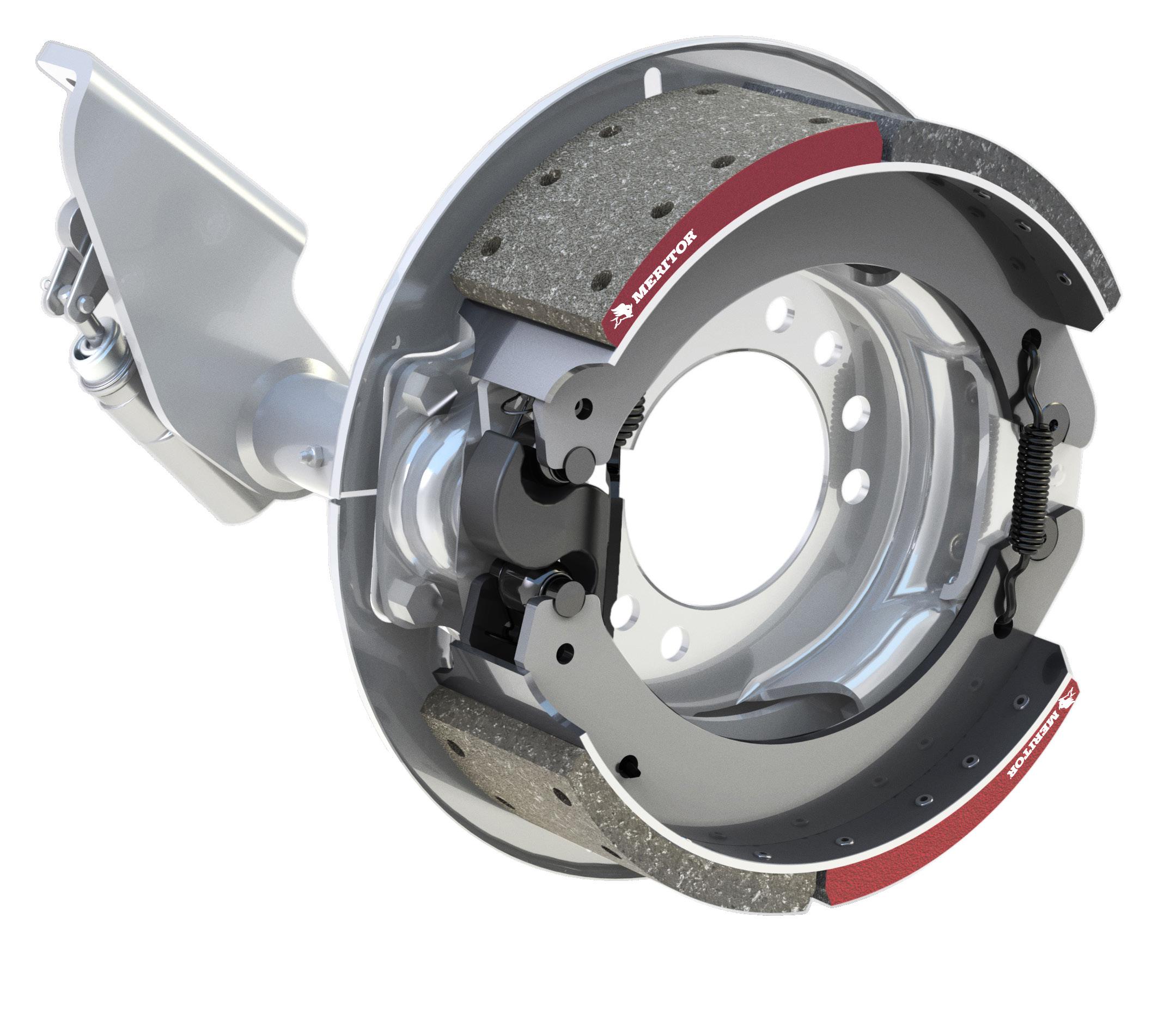














Address: 379 Docklands Drive, Docklands VIC 3008
Phone: 03 9690 8766
Email: editor@bigrigs.com.au
Web: bigrigs.com.au
Accounts: 03 9690 8766
Subscriptions: 03 9690 8766
Classifieds: 0403 626 353
Circulation and distribution queries: 03 9690 8766 info@bigrigs.com.au
EDITOR
James Graham: 0478 546 462
james.graham@primecreative.com.au
REPORTERS
Danielle Gullaci 0478 844 797
danielle.gullaci@primecreative.com.au
Kayla Walsh 0401 551 494 kayla.walsh@primecreative.com.au
DESIGN
Daz Woolley – Art Director
GENERAL MANAGER
Peter Hockings: 0410 334 371 peter.hockings@primecreative.com.au
BUSINESS DEVELOPMENT
MANAGER
Treena Heit: 0403 626 353 treena.heit@primecreative.com.au
CLIENT SUCCESS
Katharine Causer: 0423 055 787 katharine.causer@primecreative.com.au
CONTRIBUTORS
Truckin in the Topics/Spy on the Road:
Alf Wilson, 0408 009 301
David Vile and Graham Harsant.
Big Rigs National Road Transport Newspaper is published by Prime Creative Media. It is the largest circulated fortnightly truck publication in Australia with 22,500* copies per fortnight.
*12 month average, publisher’s claim October 2022
MANY owner-drivers have complained about ‘unfair’ terms in their contracts over the years, says NatRoad.
While there are a variety of laws that deal with unfair contract terms (UCTs) a lot of these are complex, and require owner-drivers to engage lawyers or get involved in expensive court proceedings.
From August 26, the Fair Work Commission has new powers to make orders in relation to UCTs in services contracts, offering remedies accessible to contractors with
limited bargaining power for whom the costs of going to court would probably be unaffordable, NatRoad told its members in a recent bulletin. Here’s what else you need to know about the Closing Loopholes legislation and the procedures for dealing with UCTs that are quick, flexible and informal, said NatRoad.
When do these changes start?
These new changes come into effect on August 26, 2024. The laws only apply to ser-
vices contracts entered into after this date.
When can the FWC make an order in relation to a UCT?
The FWC can make an order if it is satisfied that the services contract includes one or more UCTs which relate to matters like rates, hours of work, termination or disputes. Orders can only be made upon application. In considering whether to make an order, the FWC must take into account fairness between
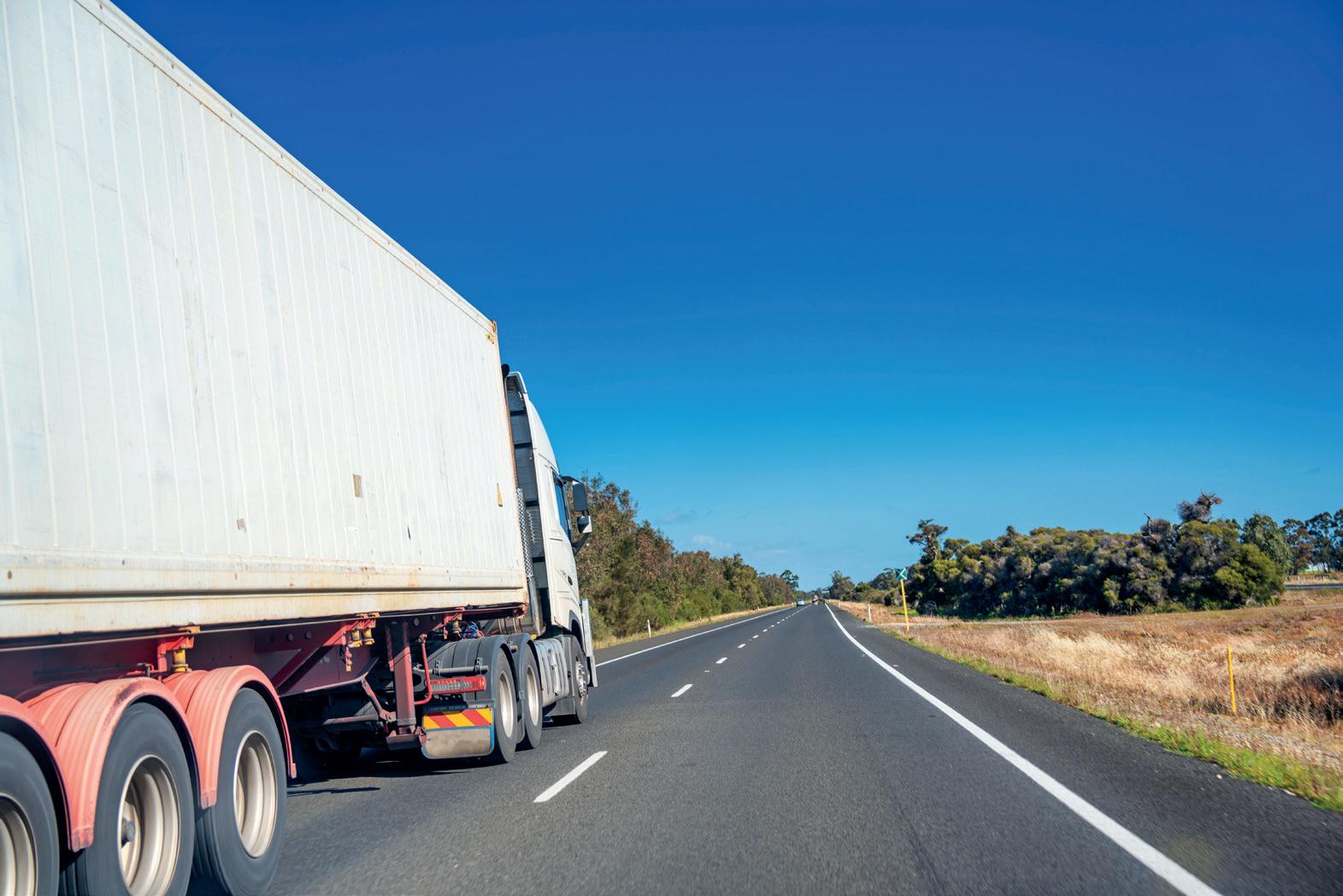
both parties to the contract.
The FWC may also only make an order where the income of the applicant is below the ‘contractor high income threshold’. This threshold has not yet been set, and consultation with the road transport sector and other interested parties is underway.
It is unclear at this point how this figure is to be calculated (eg, net or gross income, or averaged over a period of time), but this, along with the figure itself, will be set out in the yet to be made regulations.
What matters will be considered by the FWC in deciding whether a term is unfair?
In determining whether a term of a services contract is unfair, the FWC may take into account:
• the relative bargaining power of the parties;
• whether the contract as a whole: o displays a significant imbalance between the rights and obligations of the parties; or provides for a total remuneration for performing work that is:
– less than contractors performing the same or similar work would receive under a minimum standards order or minimum standards guidelines; or – less than employees performing the same or
similar work would receive;
• whether the contract term under consideration:
– is reasonably necessary to protect the legitimate interests of a party to the contract; – imposes a harsh, unjust or unreasonable requirement on a party to the contract; and – any other matter that the FWC considers relevant.
What types of orders can be made when a term is found to be unfair?
The types of orders which the FWC may make are:
• an order setting aside all or part of a services contract; or
• an order amending or varying all or part of a services contract.
How will all of this happen in practice?
An application must be made to the FWC by a person who is a party to a services contract, or an organisation representing the industrial interests of a party to a services contract. Note that a ‘person’ can include a company. As discussed above, an application can only be made by a person who earns less than the contractor ‘high income threshold’. The FWC may conduct a conference or hearing in relation to the application.


A call by the Australian Trucking Association (ATA) to split the current MC licence into two divisions has drawn a mixed response from Big Rigs readers.
In a statement to mark the release of the ATA’s plan for truck driver licensing, which was developed with the advice of a Workforce and Driver Training Summit held in June, the ATA said the current MC class should be split into two classes, to reflect the extra skills required to drive combinations such as triple road trains, quads and quins. But when we first posted the announcement on our Facebook page, many readers weren’t convinced the higher
MC2 class was the answer.
“Just more paperwork, more money for small businesses and a pathetic excuse to claim a better driver class on a MC2,” said truckie Marty De Vos.
“Please explain to us how a MC2 is far more superior to a driver who has to navigate through our major capital cities; I’ll wait to hear that response.
“The system is flawed and making a small family business run a driver for weeks with another driver with experience, my question is, ‘who is going to pay for it? Again, I’ll await the response to my question.”
With no set minimum rate
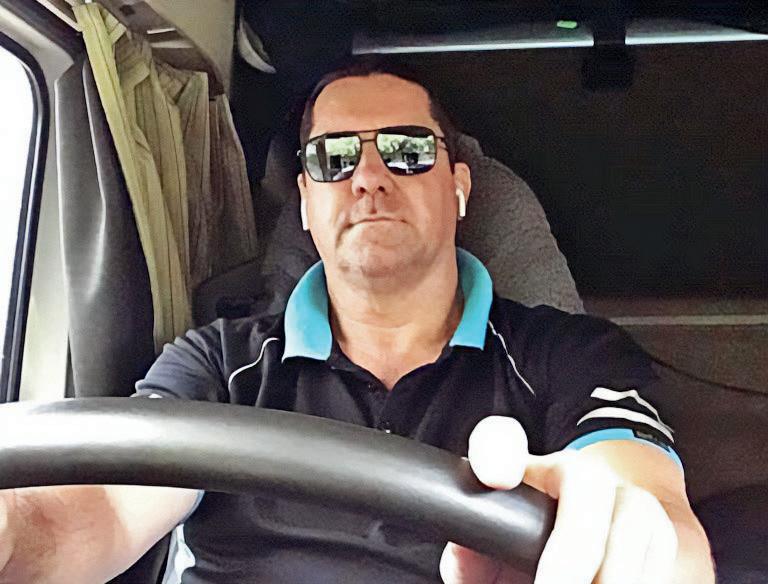

ning up and down the Hume, if they’re not used to those bigger weights.”
In its long-winded review of the Heavy Vehicle National Law, Warner said the Nation-
use your licence and build up your driving skills and experience.”
Austroads has proposed that drivers should also be able to advance through the
ening driver licensing and training would encourage more people to join the industry.
“Truck driving is highly skilled, but the issues with
veloped industry approaches to vocational education, short courses and licensing drivers from overseas. The ATA said it will announce its plans on these issues soon.

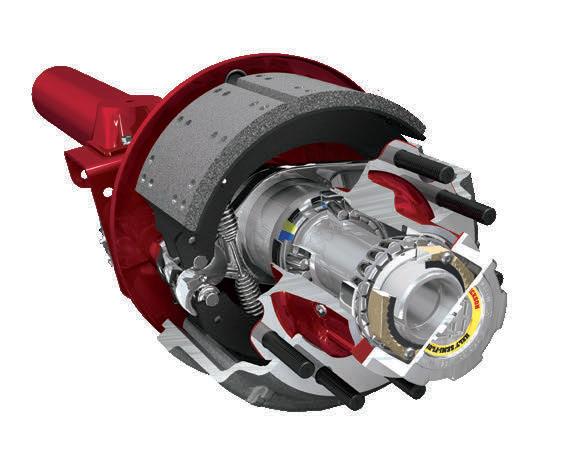

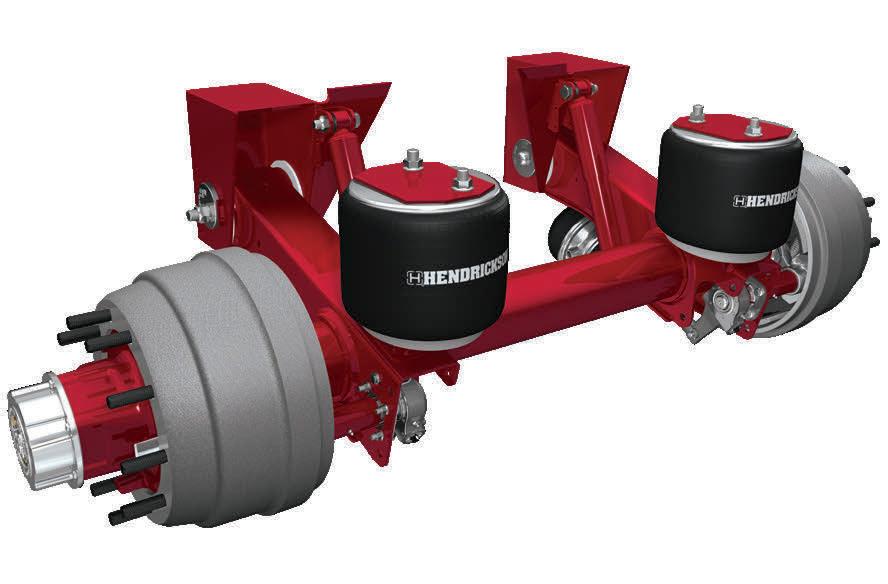


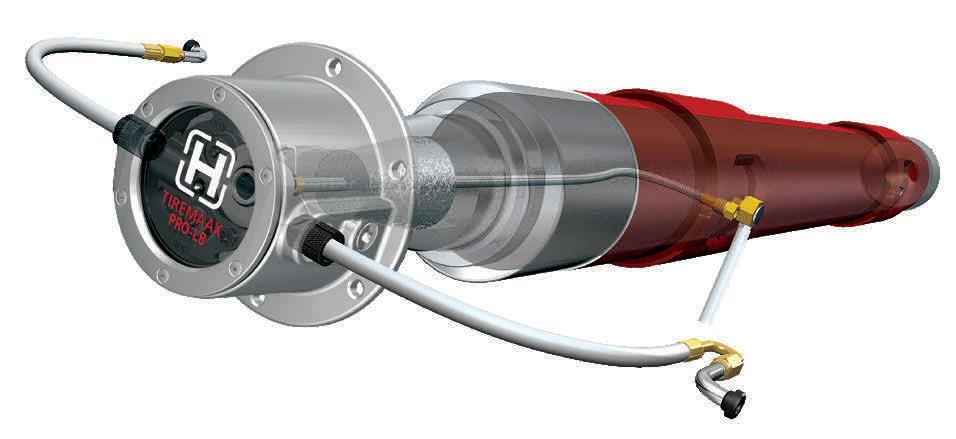

BY KAYLA WALSH
A new transport and logistics hub located at Northam in Western Australia is “very close” to beginning construction, Big Rigs can reveal.
The AvonWest site, which is located on the Great Eastern Highway about 90 minutes from Perth CBD, aims to boost freight efficiency by slashing road train turnaround times.
Leon Key, managing director of Procon Developments Australia, the developers behind the project, said they are ready to start work but have been held up by red tape.
“I had a meeting last week with the chief of staff at a wa-
ter minister to try to resolve the issues with the water main servicing the estate,” he said.
“That went really well, and we are expecting to hear back in the next few weeks.
“The issue is with the planning process and the need to go back to WAPC so that the paperwork aligns between the subdivision approval and the approved scheme amendment. But we’re very, very close to starting on site.”
Road transportation from the East Coast into Western Australia links to Perth via the Great Eastern Highway.
The freight arrives in trucks which are mostly Restricted Access Vehicles (RAV7), and these are stopped from enter-
ing the Perth zone.
Currently, road trains headed to Perth are required to break up at the Road Train Assembly Area in Northam and deliver dog run loads to their final destination in the city, before returning to collect the next load and delivering that, then returning east.
This activity and mandatory rest breaks essentially delays the drivers and linehaul equipment for up to three days at Northam.
“These large vehicles are making up to three return trips per truck on domestic roadways, unnecessarily adding levels of risk, poor efficiency, high carbon impacts and slower speed to market,”
the brochure for AvonWest explains.
“The AvonWest facilities can increase speed to market by up to 48 hours by avoiding the need for cross docking in metropolitan Perth and subsequently reduce turnaround time for back loads, potential-
ly adding an extra 20-25 East-
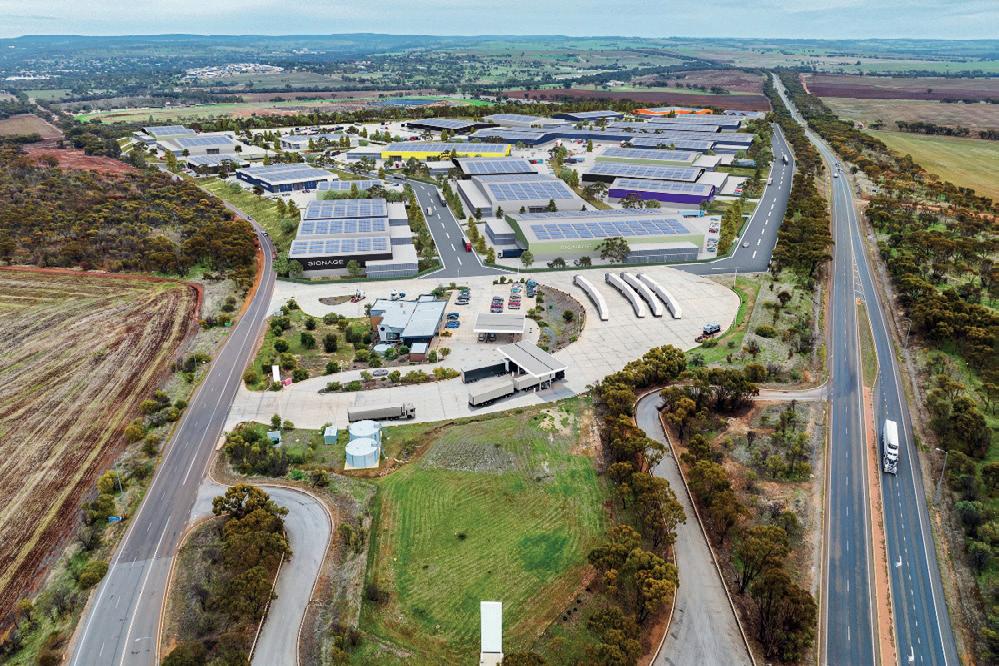
Procon Developments has purchased the existing Main Roads WA Road Train Assembly Area, which is anticipated to double in size to meet growing demand.
The company also plans to
establish container servicing, truck maintenance and tyre serving facilities within the 60-acre estate, to provide a full-service support offering to the transport sector.
Key said the AvonWest site will be carbon neutral, putting practices into place to protect the environment.
“We’re trying to create what will possibly be Australia’s first carbon zero transport logistics hub,” he said.
Next door, the Atlas Fresh Trading Co Northam service station, also owned by Procon Developments, offers a shop, restaurant, toilets and showers, with plans to build accommodation facilities at the location early next year.
BY DANIELLE GULLACI
IT’S been a few months in the works, but the doors have finally opened to an impressive new truckies’ shower block at this popular stop in the west. Located just off the Great Northern Highway near Broome, the Roebuck Plains Roadhouse is one of the major truck stops between Perth and Darwin.
It gets countless trucks stopping by each day, with ample parking space for up to 20 road trains. For the past 12 years, the
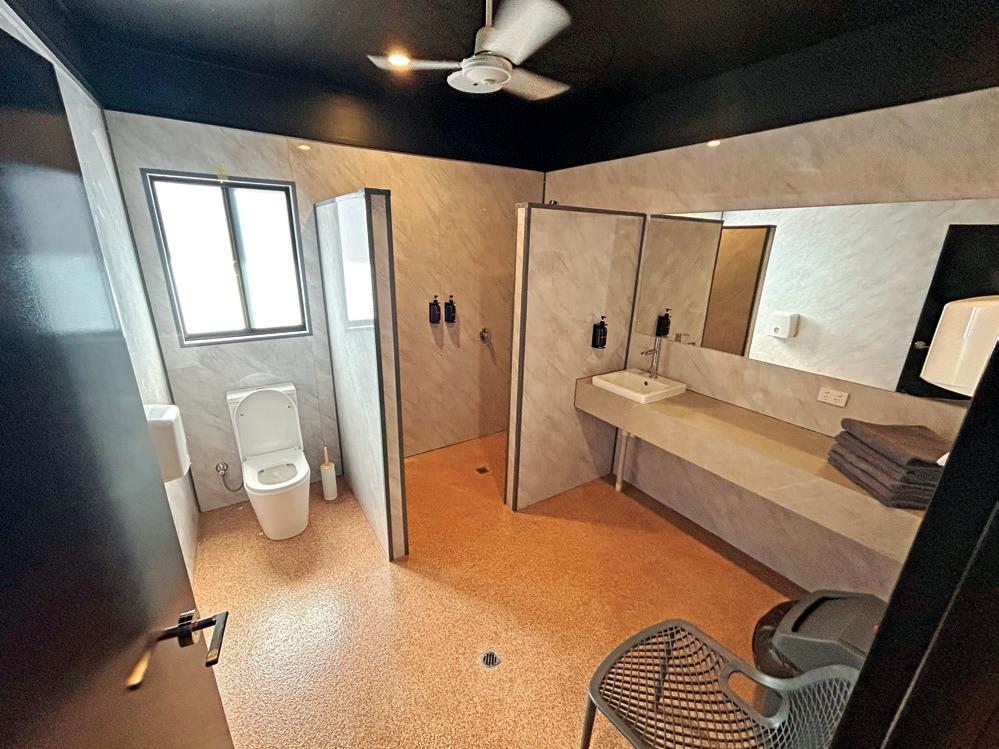
ers Leeland and Matthew Sharpe.
Leeland told Big Rigs that the new truckies’ facilities have been a long time coming, representing a significant investment – and this is just the beginning of what’s in store.
“The updates were long overdue but with Covid and then the Fitzroy floods, it’s taken longer to get these completed than we’d hoped,” said Leeland.
“The new showers have just opened and we had people in there before we’d even had a
chance to take the tape off the mirrors.”
Leeland says the facilities have taken about three months to build, at a cost of roughly “a couple of hundred thousand dollars” and have been designed with truckies in mind.
The new block features four showers, toilets, tea and coffee facilities and even complimentary towels. “They’re self-contained rooms with plenty of space. They’ve been built and done right,” Leeland
added. “We want to look after the truckies.”
The Roebuck Plains Roadhouse was originally built in the mid 1980s and has undergone several renovations since then – with more planned.
“We had seen the poor state of some of the roadhouses and thought we’d like to try and do it better – so we gave it a crack,” Leeland said.
“We’re about to do a massive redevelopment which will make the roadhouse bigger and better again.”
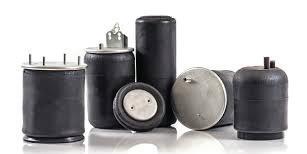
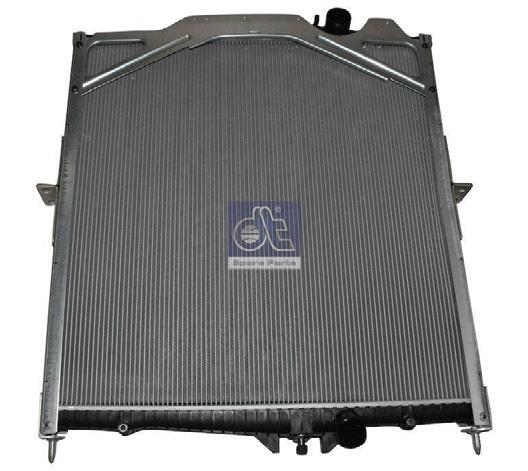
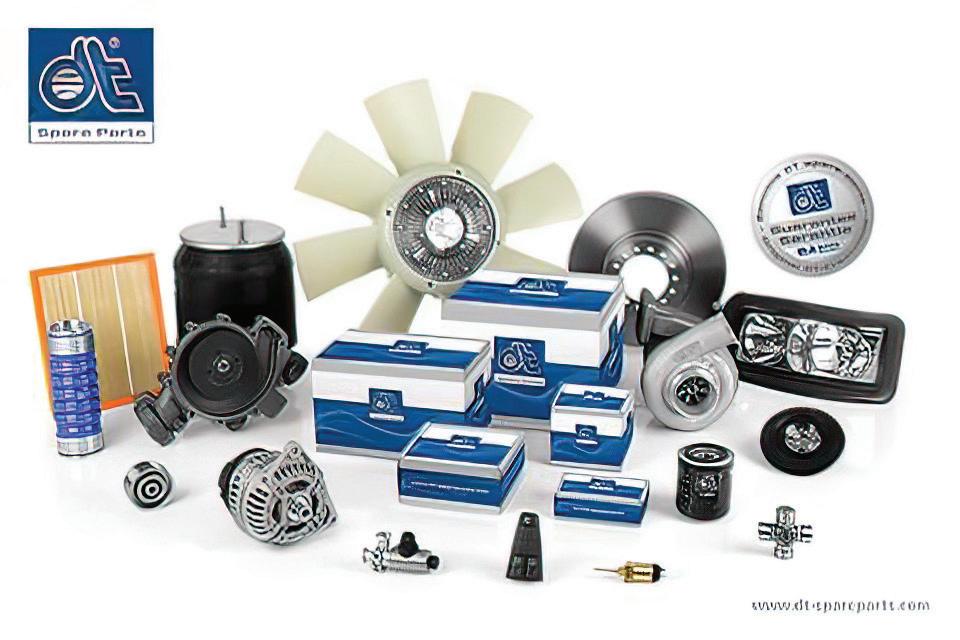
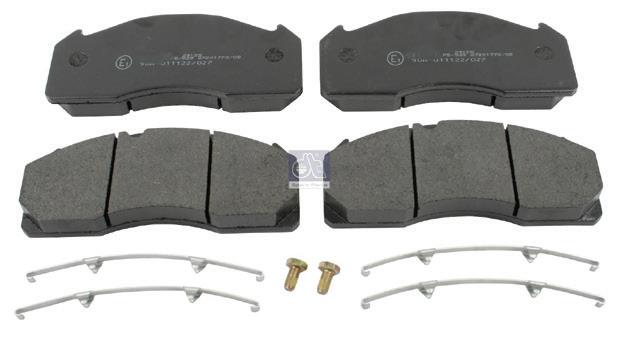
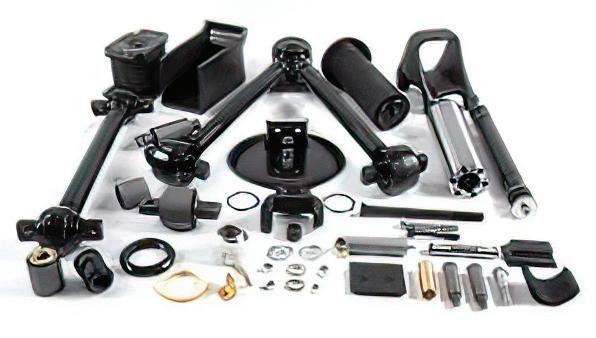
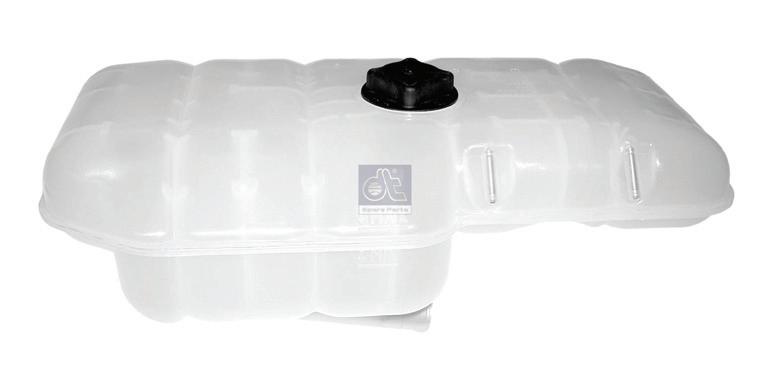
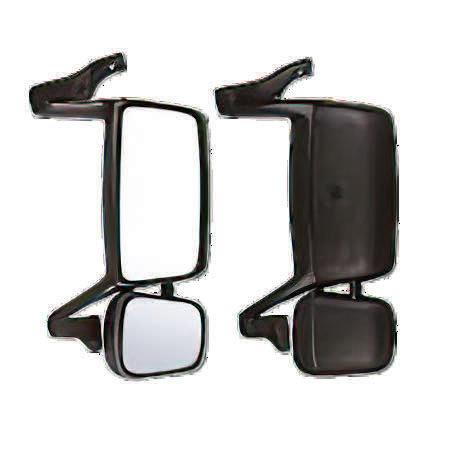
BY KAYLA WALSH
PETER Anderson, the CEO of the Victorian Transport Association, said transport industry representatives should be targeting 18-year-olds as one way to fix the truck driver shortage across Australia.
Speaking at WHG’s recent TechDrive event in Melbourne, Anderson said we need go into classrooms and let young people know about the benefits of a career in transport.
“We need to go to a group of 18-year-olds and say, ‘When you finish school, some of you will go to university, and some of you will get a trade,” Anderson said.
“‘But some of you might want to get into the transport industry, and in two to three months you’ll be earning $60,000 to $80,000 a year.
“‘You could own your first house at 25 and your first investment property at 35. Who would like to come into our industry?’
“I’m sure we’d get more young people building a career in transport, building a lifestyle, building something that they’re proud to be part of.”
Anderson said operators need to make more of an effort to give young truckies a go and invest time in training them.
“One of the issues we have
in our in our industry is that we don’t want to train people,” he continued.
“It’s that age-old idea of ‘if we train them, we lose them’.
“If somebody just got their licence and they knock on your door wanting to drive a truck, they won’t get the job.
“They are told to come back in two years when they’ve got experience, but how can you get experience if you can’t get a job?”
Anderson pointed out that changes to the licensing system are badly needed.
“We don’t think we can train 18-year-olds to drive a truck properly, so we’ve got to wait until they’ve held a car license for 12 months,
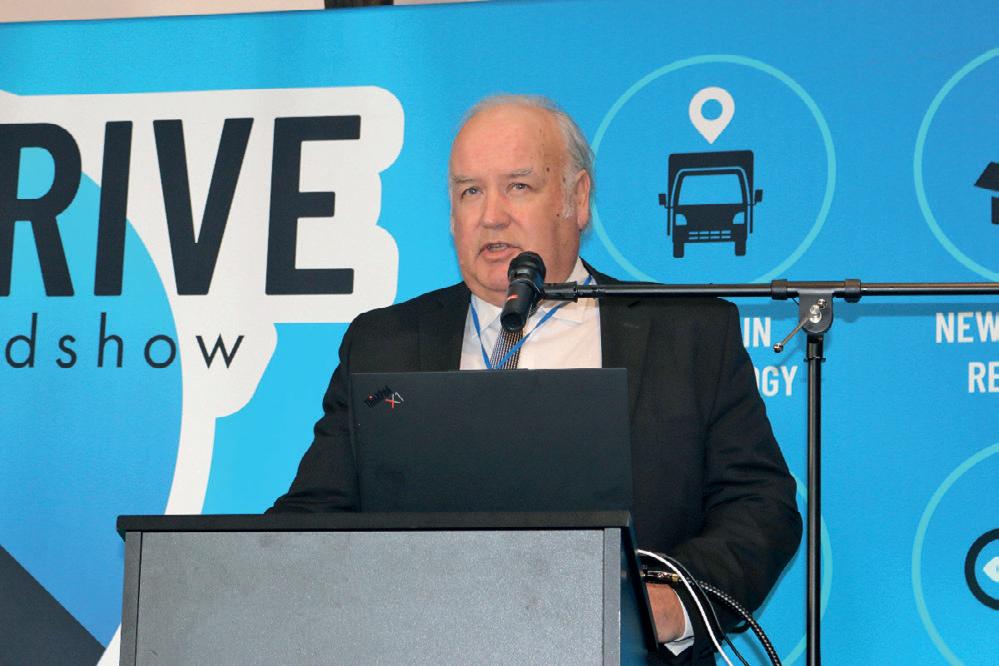
then they can do the graduated process of waiting another 12 months and then waiting another 12 months.
“They may never give a truck in those 12 months, but they’ll be able to upgrade their license as they go.”
He said that no matter how much these changes are talked about, not much tangible progress has been made in the past three decades.
“I’ve got VTA documents dating back to 1996 – a review by the then National
Road Transport Commission on heavy vehicle licensing in Australia.
“In 2013, transport ministers asked for a review of the heavy vehicle licensing system. That review came back in 2017 - nothing changed.
“We had another review in 2020, which was finalised in 2023, and again nothing has changed.
“For over 30 years, this industry has been calling out for licensing review that will actually drive the industry to perform better, to be more accountable, to be more transparent, to attract people - young people to join us.
“Yet we cannot get this out.”
FORMER truckie-turned
WA Labor Senator Glenn Sterle has had gutful of hear ing stories of drivers being fined for simple spelling mis takes in their work diaries.
A fired-up Sterle used his two minutes in the Senate on August 20 to speak on a top ic of his choosing to deliver a stinging attack on the current anomalies in the Heavy Vehi cle National Law (HVNL).
A year earlier he’d raised the same subject in the Senate said he was disappointed to is such a shortage of transport workers nationwide.
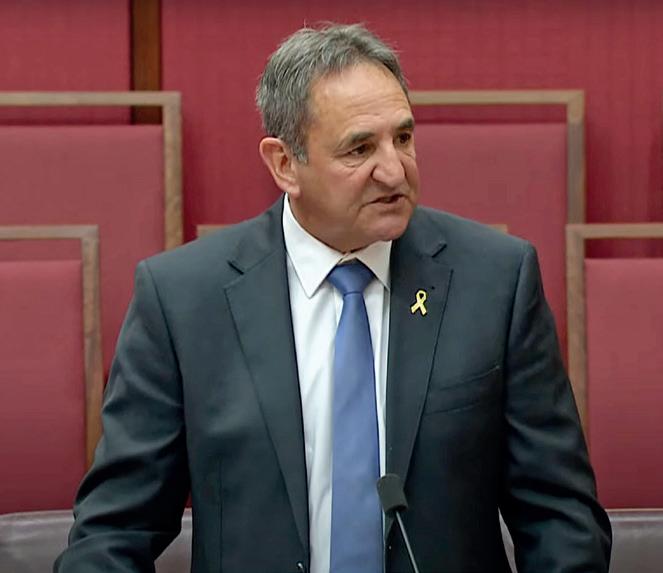
“Truckies are still pursued, fined and prosecuted for simple spelling mistakes in their logbooks, while motorists who break the law and endanger lives face lesser fines,” Sterle told the Senate.
“Fining truck drivers for spelling mistakes does nothing for fatigue management, nor does it drive down the number of accidents and fatalities on our roads, but it does contribute to state and territory revenues. It is a national tragedy that states and
SYDNEY
510 Victoria Street, Wetherill Park NSW 2164 Ph. 02 9756 6199, email: isri@isri.com.au, www.isri.com.au
BRISBANE
territories continue to use minor errors made by our hardworking truckies to raise revenue while there is carnage out on our roads.”
Sterle said road safety must be a national priority, and urgent action is needed from all levels of government.
“Issues like training, licensing, enforcement of safety laws must be a priority nationally. “We have a shortage of 26,000 transport workers. This shortage is particularly difficult to address consid-
ering these enormous safety challenges, alongside the petty and vindictive targeting of truckies for minor errors in their logbooks.”
He also cited several infringement fine examples to highlight how truckies are more harshly penalised. Sterle said that in NSW, motorists who are caught using a mobile phone while driving are fined $362. In SA, driving up to 20km/h over the speed limit attracts a fine of $455. In Queensland, if a driver fails
to give way during a U-turn, they face a fine of $483.
“Truckies that had minor spelling mistakes in their logbook – where they slept last night, for crying out loud –get fined $780.”
Sterle said he’s written to state ministers, police, road safety and transport bosses for a second time hoping “some commonsense” will prevail.
“Enforce the law, make our roads safe, [but] stop pinging truck drivers for a damn spelling mistake.”


3/120 Gardens Drive, Willawong QLD 4110 Ph. 07 3275 2044, email: sales@isribrisbane.com.au, www.isribrisbane.com.au
MELBOURNE
Unit 1/569 Somerville Rd, Sunshine West VIC, 3020 Ph. 03 9311 5544, email: sales@isrisunshine.com.au, www.isri.com.au
MACKAY
110 – 120 Maggiolo Drive, Paget QLD 4740 Ph. 07 4952 1844, email: admin@isrimky.com.au, www.isriseatsmackay.com.au
PERTH
408 Welshpool Rd, Welshpool WA 6106 Ph. 08 9362 6800, email: info@mmtisri.com.au, www.mmtisri.com.au
DARWIN
Mobile Sales and Service
Ph. 08 8927 0986, email: info@isridarwin.com.au, www.isridarwin.com.au
ADELAIDE
TAMDELE, 21 Hakkinen Road, Wingfield SA 5013 Ph. 08 8347 1222, email: sales@gitsham.com.au, www.gitsham.com.au
NEWCASTLE/HUNTER VALLEY
Unit 2/13 Hinkler Ave, Rutherford NSW 2320 Ph 02 4932 0600, email: sales@hvss.com.au www.isri.com.au
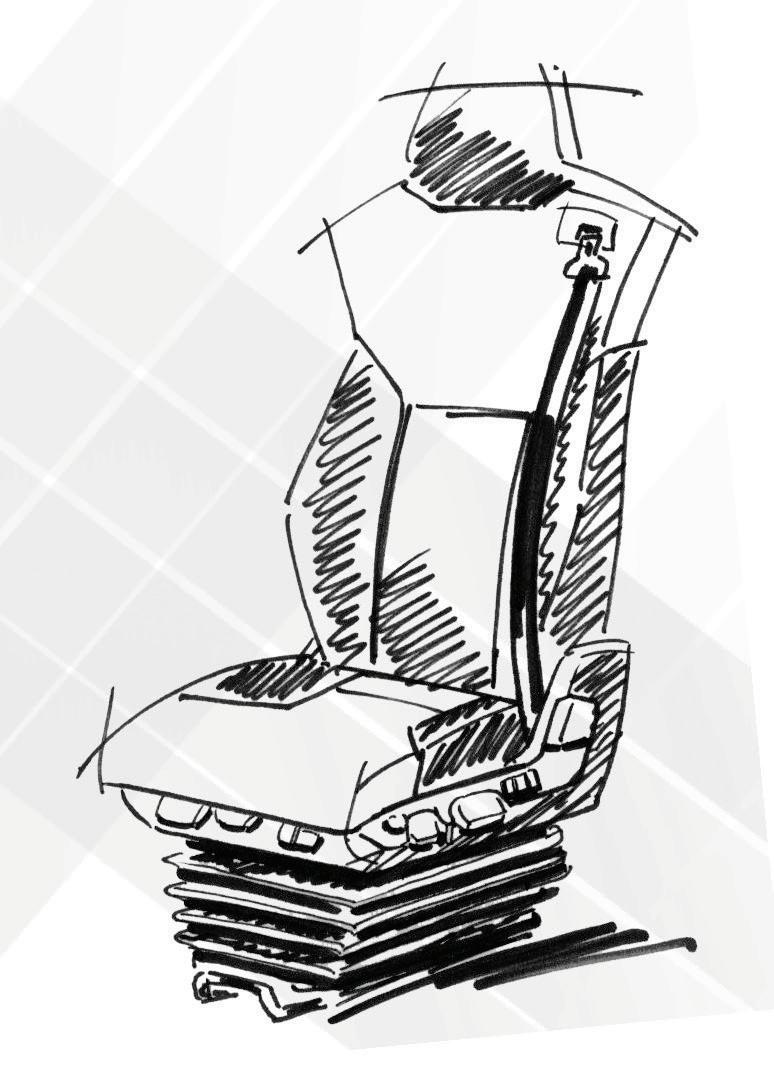
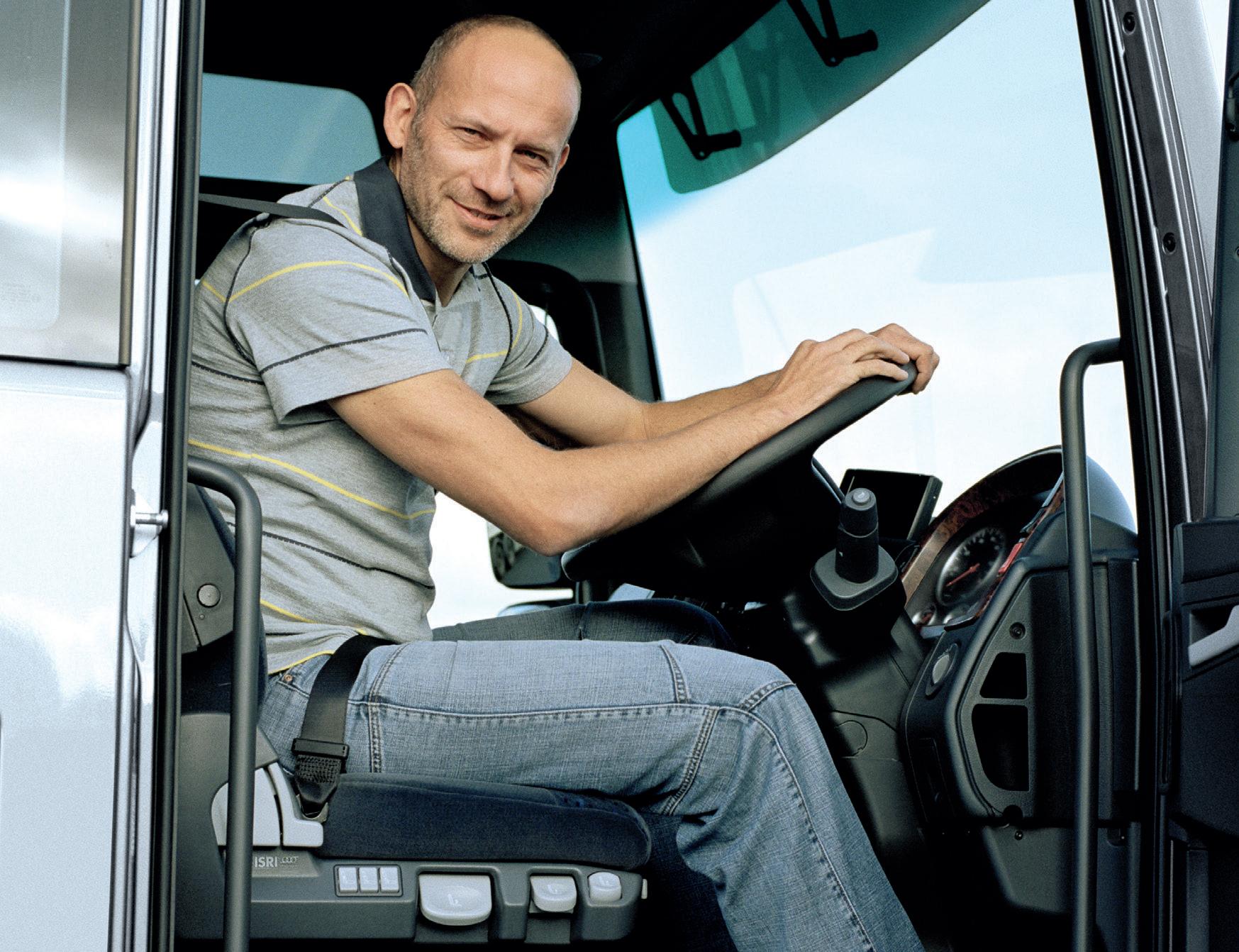


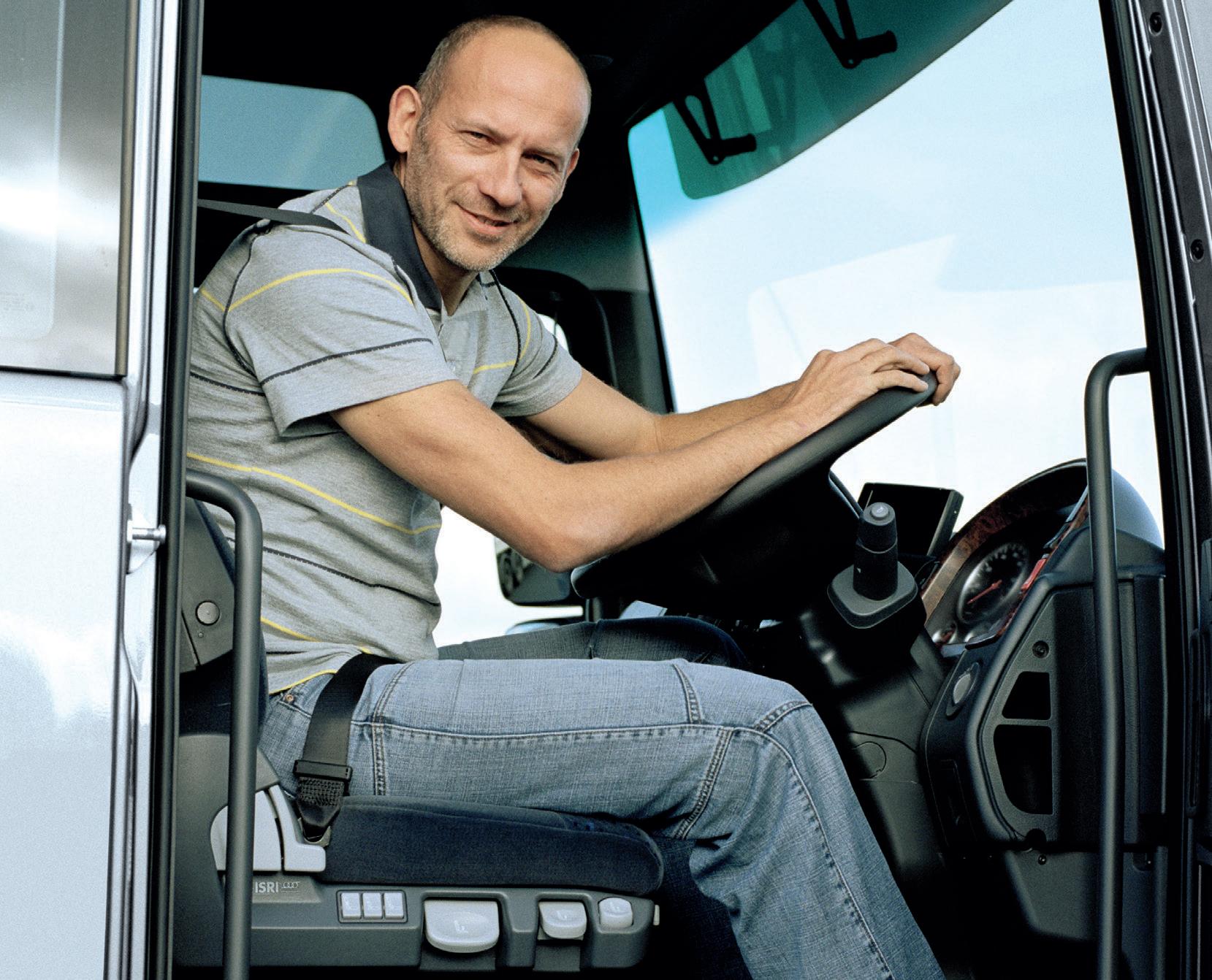








Sam Sali tribute NatRoad has renamed its annual National Young Driver of the Year Award in honour of industry giant Sam Sali. Nominations are now open for the prize, which will be presented at a gala dinner during the NatRoad Connect 24 conference in Coffs Harbour on September 12-13.
The prestigious award celebrates inspiring young professionals (30 years and under) in any part of the road transport industry.
Sali, who passed away in January this year, made a significant contribution to road transport and was a passionate champion for the industry. For more information, visit natroad.com.au.
NewCold’s $293k EU
Global cold chain logistics giant NewCold has entered into a $293,012 enforceable undertaking (EU) to improve safety after a worker’s leg was crushed at its Truganina warehouse in Melbourne in 2021.
According to a statement from WorkSafe Victoria, on July 23 the Werribee Magistrates’ Court heard NewCold had entered into the EU while facing charges of failing to provide and maintain a safe plant, failing to provide a safe system of work, and failing to provide necessary information, instruction, training and supervision.
WorkSafe said it may reinstate the charges if the undertaking is contravened or withdrawn.
Inattention and distraction were found to be the most common causes of crashes last year, in the latest National Truck Accident Research Centre’s Major Accident Report.
According to data from report partner NTI, those incidents were double the rate of any other cause and have increased by 75 per cent since 2022. Over the past five years there has been a 2.6-fold increase.
Mobile phone and wearables use, consuming food or drink, talking with passengers, and looking at infotainment systems or roadside advertising were all flagged as contributing factors.
Convoy to Canberra
A convoy of trucks is set to travel from Perth across the Nullarbor to Canberra in protest of the live sheep ban by the Albanese government. The National Ag Rally will take place on Tuesday September 10, and thousands of truck drivers, farmers, pastoralists, shearers, and others within the agricultural industry are expected to attend.
The protest, organised by the Keep the Sheep movement, is part of a wider campaign aimed at ousting Labor at the next federal election.
Organiser Paul Brown told Big Rigs: “It’s important for our industry to stand up against the continual attacks by the federal government on the agricultural industry.
“We failed to defeat the live sheep export ban, missing by a few votes, so now the second part of our campaign is to defeat the government.”
BY DANIELLE GULLACI
A Sydney-based truck driver has shared his frustration after being fined $1636 for allegedly travelling too close to a truck and dog that he says pulled out right in front of him.
And he has the dashcam footage to prove it, with plans to take the fine to court.
As he plans to dispute the fine – which also comes with four demerit points – he’s requested not to be named.
A HC licensed truckie, he drives a semi fuel truck, making deliveries across NSW and the ACT.
He got into truck driving about five years ago after deciding on a change of career, and says he really enjoys the work. However, he was shocked to receive a fine in the mail for an incident that occurred on June 10.
As he explained, “I was on the Great Western Highway, at Little Hartley in the Blue Mountains, coming back from Bathurst.
“I was coming down River Lett Hill, on my way back to Sydney. It’s 40km/h down that hill, then at the last bend down the bottom, it goes up to 80km/h.”
AT MOST, I WOULD HAVE EXPECTED IT TO BE A CAUTION BUT TO RECEIVE A $1636 FINE FOR IT – IF THAT’S NOT REVENUE RAISING, I DON’T KNOW WHAT IS.”
He continued, “As I was ap proaching, I saw a truck and dog had pulled up to the side. Then he’s pulled out in front of me and I got done for being too close. It was right near a fixed speed camera.
“My boss and I have checked the dashcam footage and you can clearly see he’s pulled out in front of me. It was right where the speed went up from 40km/h to 80km/h.
“I braked as much as I could without putting too much pressure on the truck and ap parently I was still too close. I believe there was still a safe difference.”
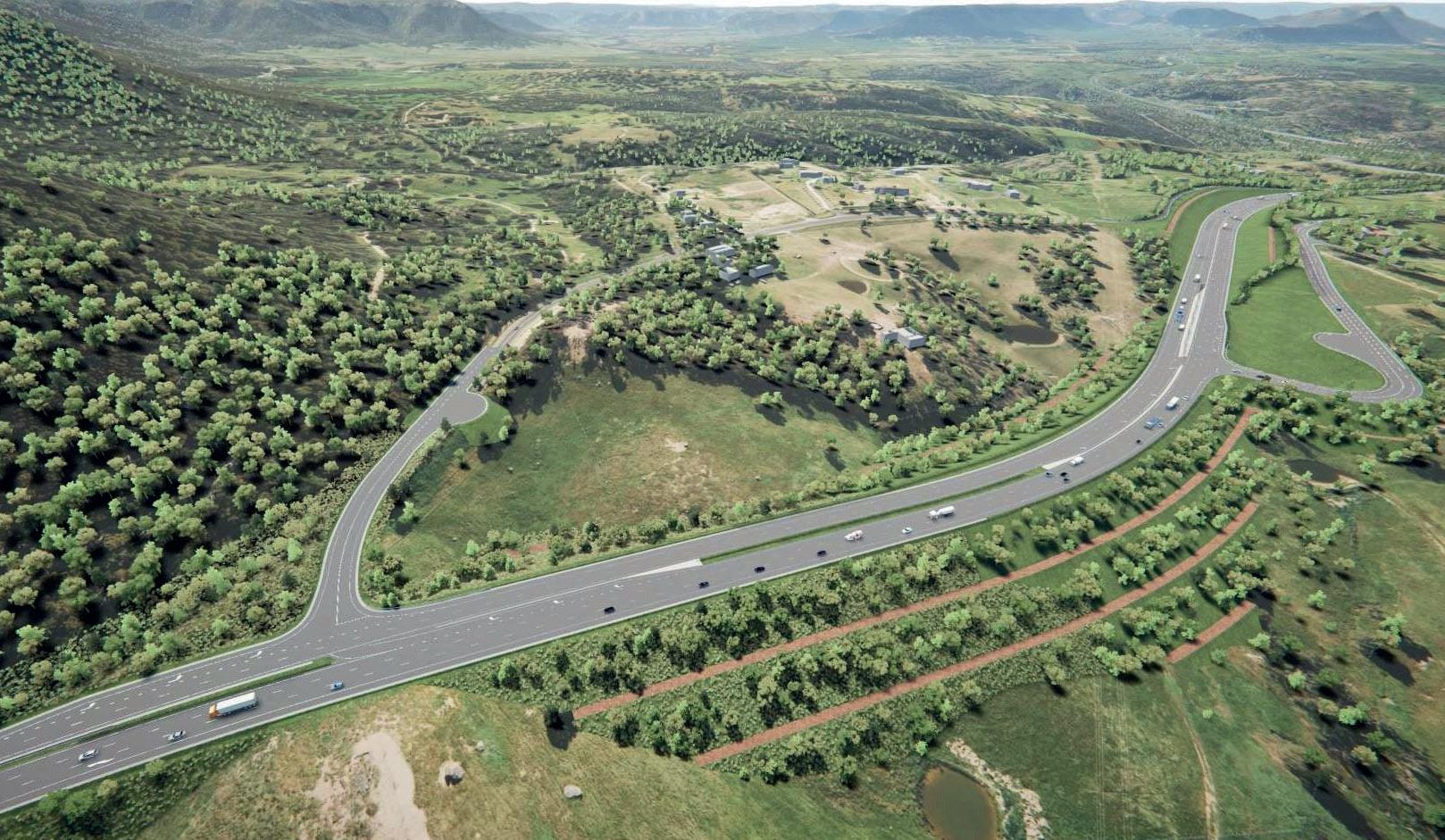
This truckie is no stranger to the area. He says he travels that route on a regular basis and was fully aware of the camera locations.
“Between Mount Victoria and Lithgow, there are four cameras. I travel there a fair bit and I know they’re there. But
gle lane road, for vehicles 7.5 metres and over, you have to have a spacing of at least 60 metres to the vehicle in front of you.
“I got onto RMS and according to them, from my front axle to the back axle of the truck in front of me, there was a 15.99 metre gap.
“My truck is only 13m long,
“A lot of people aren’t even aware this is a rule – the 60-metre gap definitely wasn’t on my test when I did my licence.
“At most, I would have expected it to be a caution but to receive a $1636 fine for it – if that’s not revenue raising, I don’t know what is.
“I have the option to dispute
court.
“I would recommend every truckie have a camera and regularly back it up because it might capture something they can use in future to prove they weren’t at fault,” Cockayne said.
OVER the last three and a half years, 21-year-old Sam Hughes – who many will know as The Travelling Jackaroo – has travelled the length and breadth of the country, to raise money for charities close to his heart.
Steering his trusty old 1957 Chamberlain tractor, Sam travelled to every state and territory, including across the sea to Tasmania, to raise money for three charities: Royal Flying Doctor Service, Farm Angels (formerly called Drought Angels) and Dolly’s Dream.
Departing from his hometown of Maleny on the Sunshine Coast in March 2021, Sam travelled a total of 27,250 kilometres – at a top speed of just 35km/h – before coming home to a hero’s
welcome on August 11, 2024.
The goal was to raise a quarter of a million dollars – and he surpassed that goal, with a grand total of over $260,000 for the charities.
Along with the old orange tractor, he towed a trailer with a motorbike and car inside, and a boat and a plane on top, ensuring he turned heads wherever he went.
Since his journey began, many have been captivated by his travels. He’s shared all of his adventures on his Facebook page, where he’s accumulated a massive following of over 267,000.
Upon returning home, a huge turnout of locals made their way to Maleny Showgrounds to show their support for all Sam has achieved. Here, the Rotary Club of
Maleny also awarded Sam its highest honour, the Paul Harris Fellow, for all that he’s achieved.
After arriving home, Sam told his followers, “To say it’s been an experience would be an understatement, more like an education. When I left home back in 2021 I was a fresh out of school 18 year old with a dream, and now as a 21 year old, I’ve made it be come a reality.”
“But it isn’t something I’ve done on my own, it’s you amazing people that made it possible, all the people who lent a hand when I was having trouble, all those who made a donation, and of course to all my amazing sponsors.”
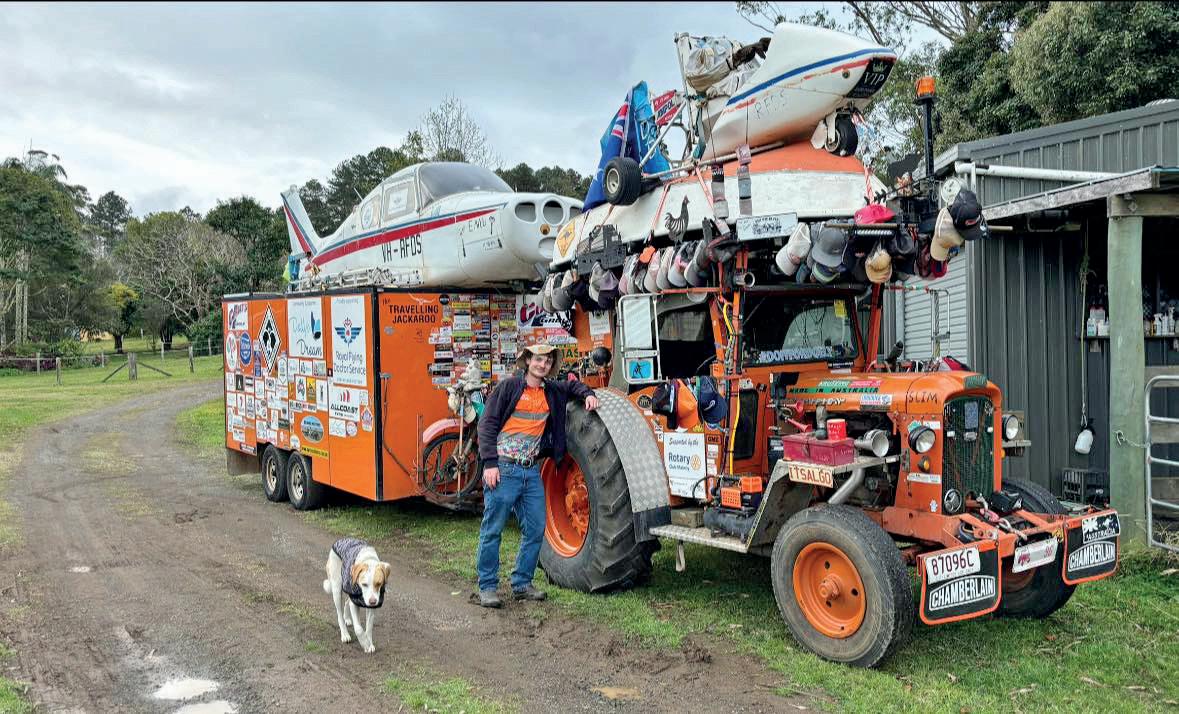
farm before work begins on his next project.
With Sam’s first big adventure over, he’s now taking some time at home on the
He’s purchased a Mack R600 and is planning on building a mobile museum focusing on the people who have helped to shape Australia, including our truckies and the transport industry. Sam plans to start work on the project in coming months and expects it will take about 12 months to complete, before he sets off on his next adventure, taking the museum across the country.
SIGNAGE telling truckies the Nass Road breakdown pad in Charton can be used for longterm storage of trailers and dollies is causing chaos for other drivers, said watchdog Wes Walker.
Walker recently watched one frustrated truckie nab the last park on the busy Queensland site near Toowoomba that he said has rapidly degenerated into a free-for-all depot.
“I’m getting the feedback now that you can’t get a park there at all – a lot of drivers are pulling their hair out it’s got so bad” Walker said.
“The state government is allowing corporate transport companies free storage for any of their equipment for as long as they like at the taxpayer’s expense.”
After the recent closure for
maintenance and repairs, Walker says the site is all “beautifully hot-mixed”, apart from where you’re supposed to park dollies.
“But there’s no dollies there; just a shit load of trailers and storage because of what new sign says.”
Walker said a simple time limit would solve the problem, along with the addition of much-needed lines on the pavement so more trailers could fit.
“They would easily get four more trailers in there if they had lines.”
Walker said truckies face similar issues with the lack of signs and lines at the nearby Gatton breakdown pad.
“You’re allowed to leave your gear here as long as you like now. It’s a free storage yard
provided by the taxpayer of Queensland.”
A spokesperson for the Department of Transport and Main Roads (TMR) told Big Rigs that it closely monitors the operation of the Charlton site, and self-regulated parking at the facility is operating as expected, with no need for additional line marking to assist with maximising capacity.
“As expected, there are normal peaks and troughs with usage,” the spokesperson said.
“TMR encourages users to show courtesy to others when using the facility which includes not using the location as a long-term trailer/dolly parking area.
“TMR doesn’t generally limit the timings on the use of decoupling facilities.
“These facilities are con-
structed for the benefit of the heavy vehicle industry to en able them to get more freight efficient combinations closer to their destination.
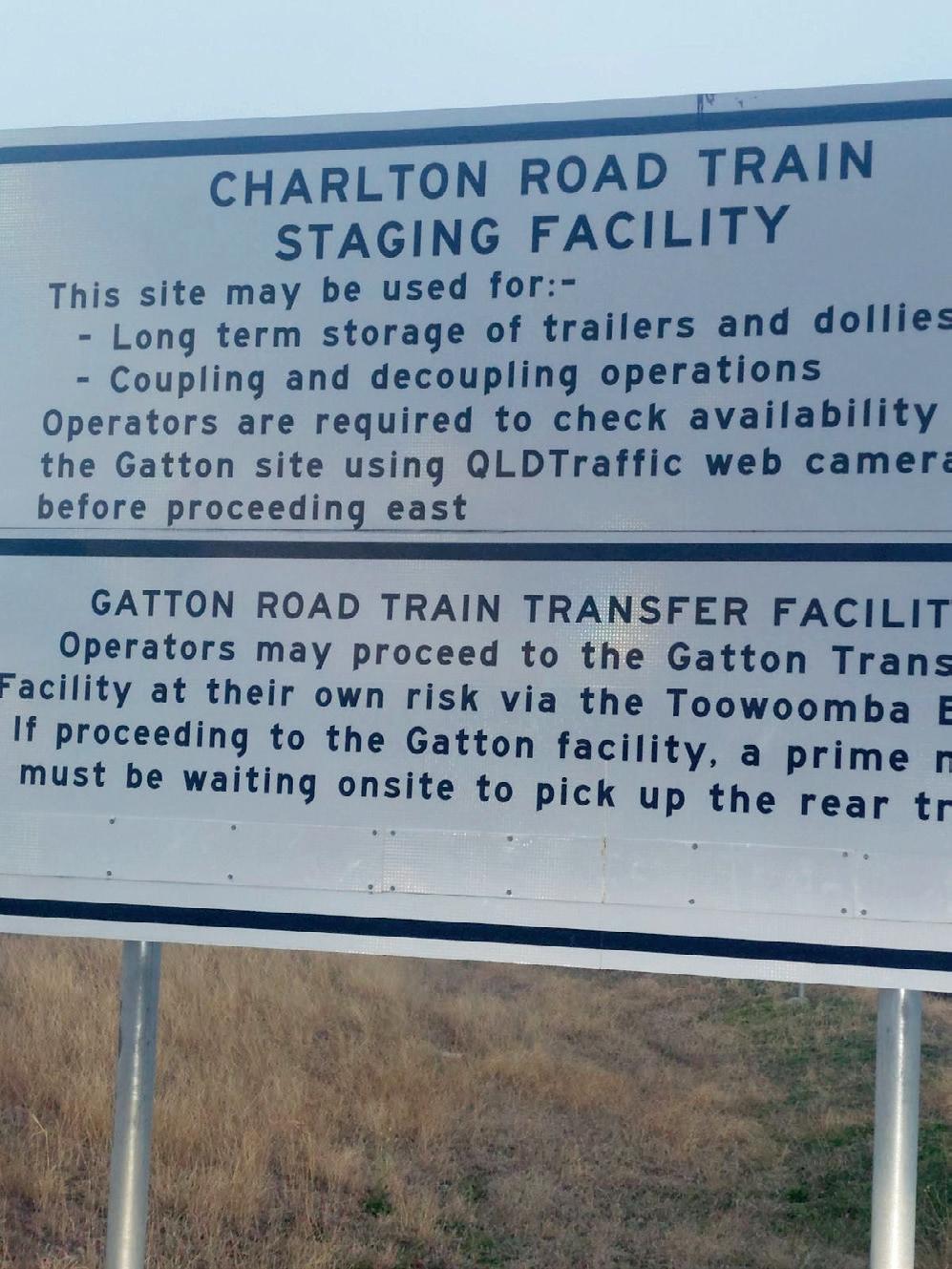
“The need to enforce time limits is not


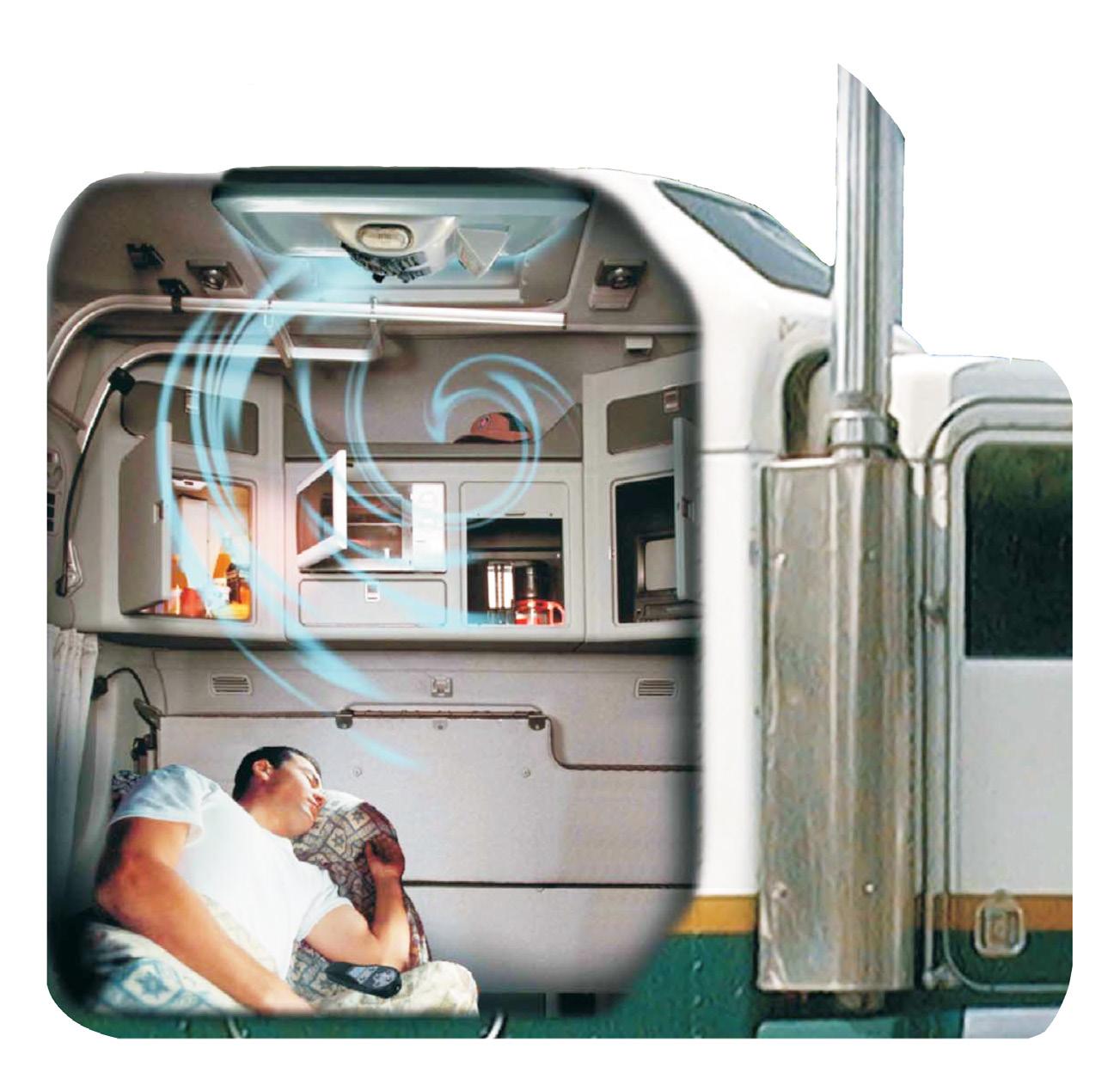

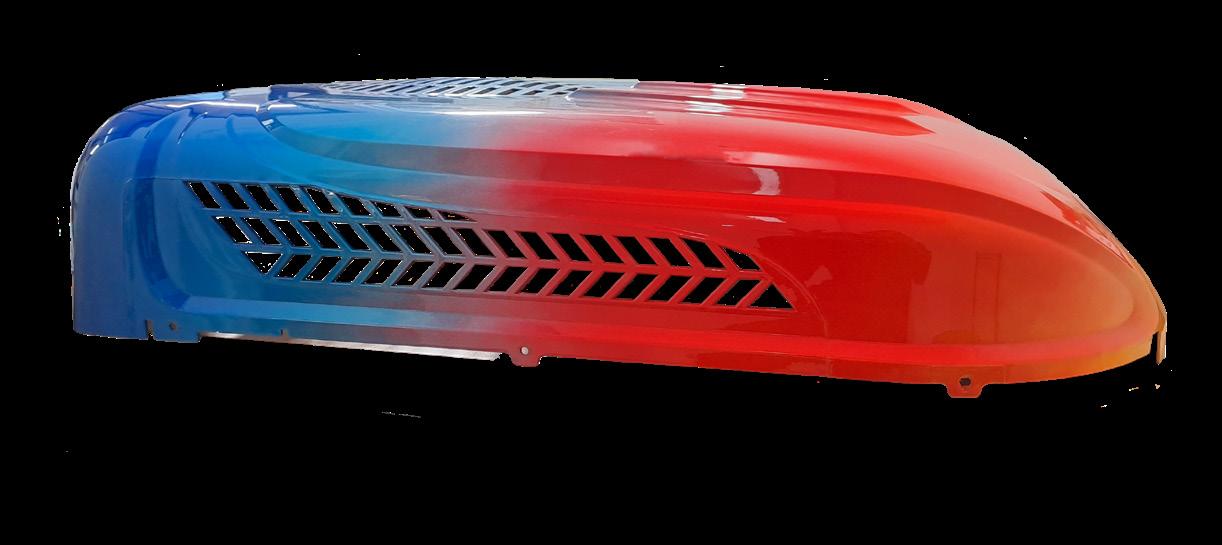


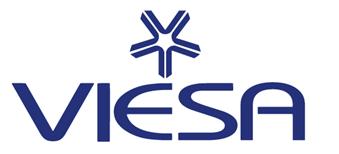
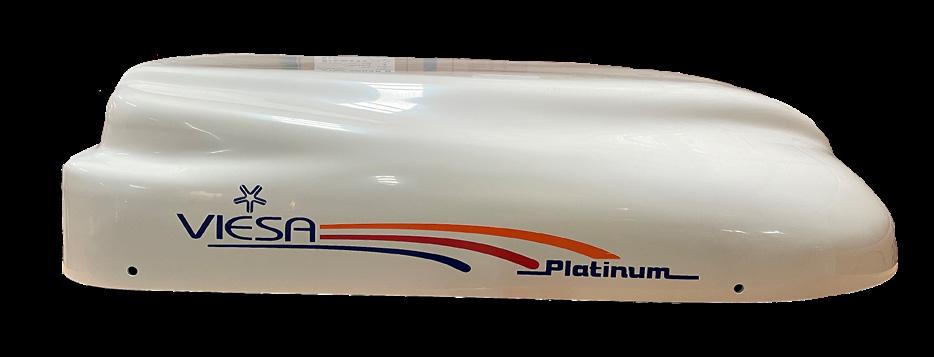
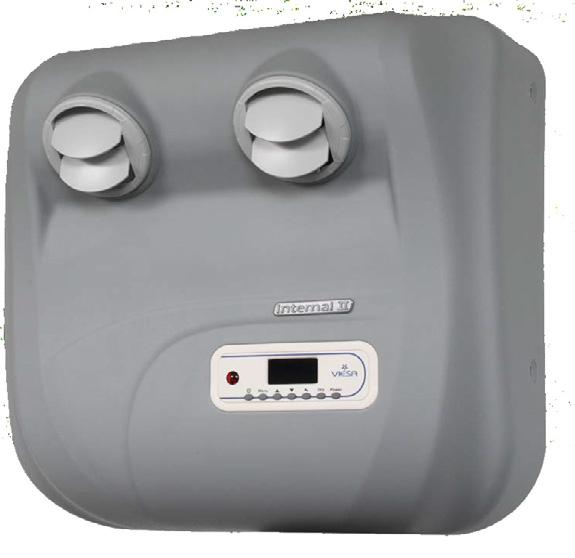

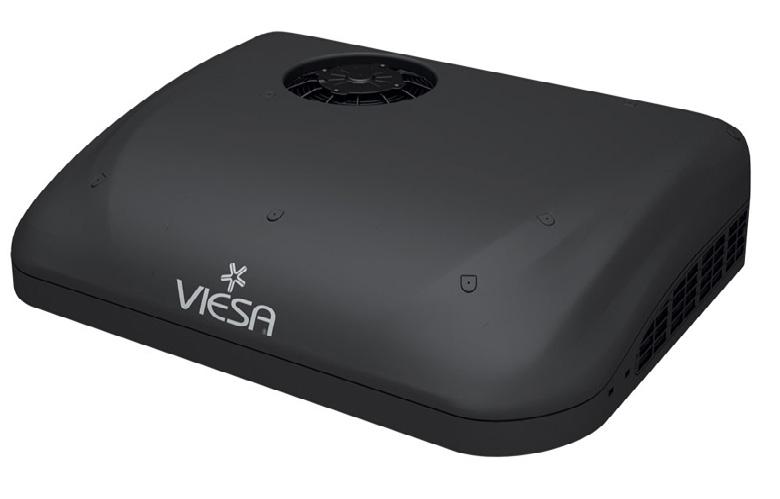

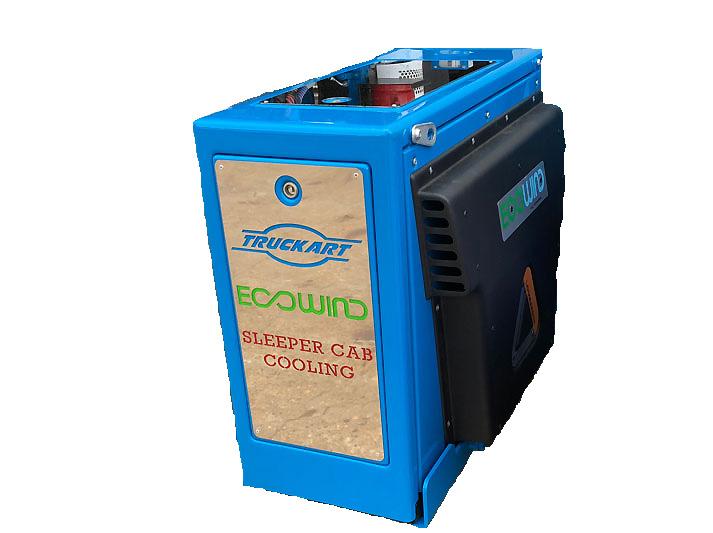

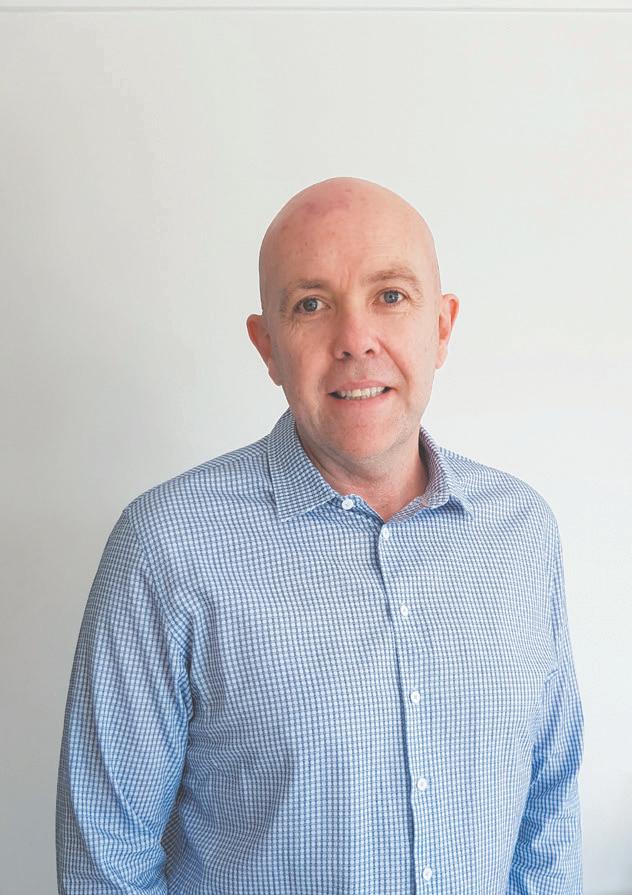
EDITOR JAMES GRAHAM
raiser around Australia, and thrilled to discover that our cartoonist Ryan was eager to honour the achievement with another ripper of a cartoon.
What a massive effort from this never-say-die and incredibly resourceful young man. It really does embody everything I love about this country. If you have a goal and a dream, there isn’t a whole lot standing in the way, if you want it badly enough.
It’s the same spirit that our industry is now tapping into to address the staff shortages hitting some sectors hard. Instead of waiting around for federal, state or local governments to come to the rescue, they’re rolling up the sleeves and solving the problem themselves.
Check out some of those inspiring flag-bearers in our special 12-page careers liftout from page 19.
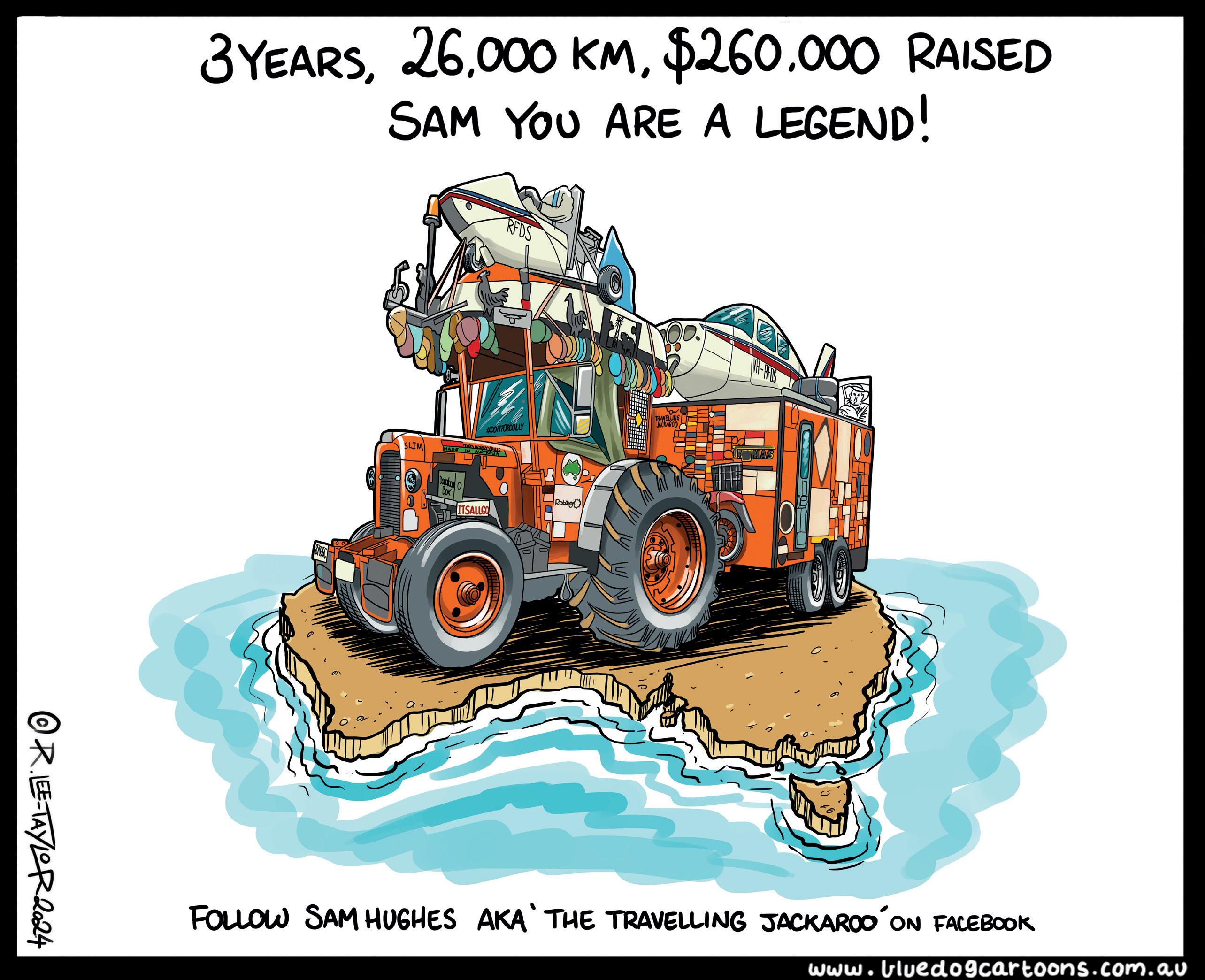
How about we just say,
THE fact is a road train is the new “standard” now. Even AB-triples into Melbourne of over 110 tonnes. Hell, 10 years ago, a B-double was “THE TRUCK” on the east coast.
Experience overall is the biggest issue. You get your 25-tonne rigid licence at 19 years of age, but we need five years of minimum 68 tonne B-double experience for the
broke at the end of the year.
Look at the photos from the 1930s where they lined up at the train station in the country, with two-tonne of handstacked bagged of wheat. That was enough to buy a new car for the family.
Now, you have to cart eight road trains at 56 tonnes for the same result (not including the $800k combination and
east coast and Tasmania.
The last 30 years every time trailer combinations have got bigger major companies have been able to monopolise that. No one is making any more money!
How about we just say for the next 5-10 years, “that’s it, sort it out amongst yourselves.”
Everyone gets the same
- 6 months to approve routes through the NHVR - once approved, route is available on gazette for everyone.
I like to think that I know more than most about truck regulations around Australia, but, I am finding myself more than ever speaking to people with a ‘response’ of “bullshit! when did they change that?”
Roughly a third of what we pay for diesel is tax! Yep, 49.8c per litre, plus the GST on top of that.
It’s been said by Anthony Albanese, that a 15 per cent pay rise will go to childcare worker’s wages, who work within the private sector, at the taxpayers’ expense.
The Queensland government also cut motor vehicle
Steve the Garbo’ up at 4am, or brothers Spiro and Georgio getting produce out of market, before Parramatta Road becomes a bottleneck.
Vic Roads and the Victorian government are billions over budget for tunnels (with an unconfirmed clearance) and some, not built at all.
Whilst the township of Woorinen has had a destroyed road with a “rough surface” sign for over two years.
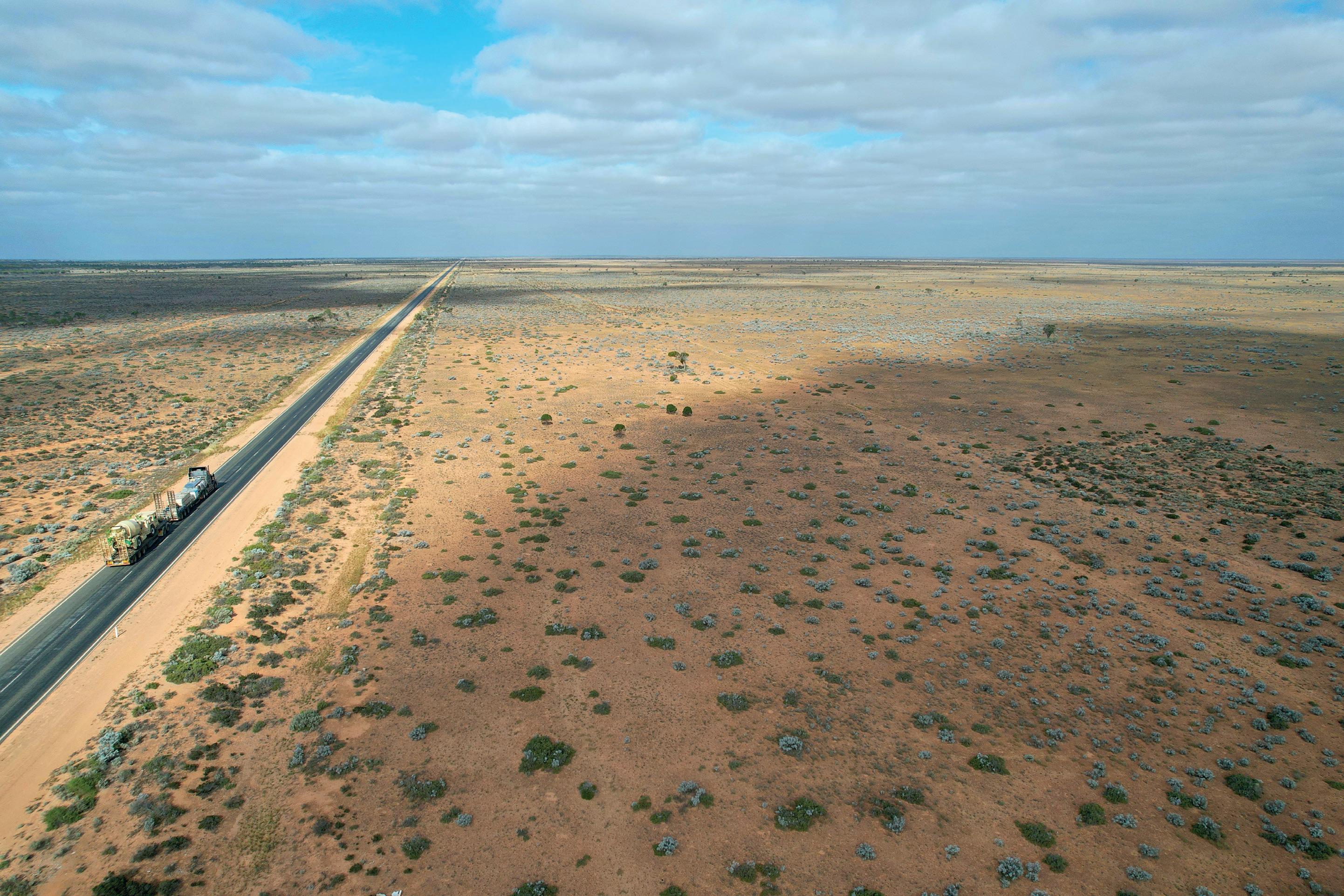
Mallard Gresley
issues like air lines being cut or other mechanical problems—but we all need to take responsibility.
The situation I faced could lead to something very ugly, especially when it takes 30 minutes to get fuel while five trucks are parked at the bows-
Remember, we’re all tired, we all work long days, and we likely have short fuses by now. I urge everyone to show a little bit of courtesy and consideration on our roads.
Together, we can make the highway a more harmonious place for everyone.
Darren Pincini



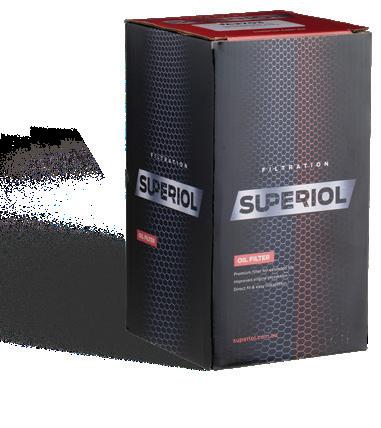
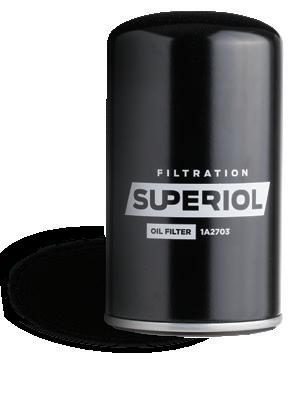
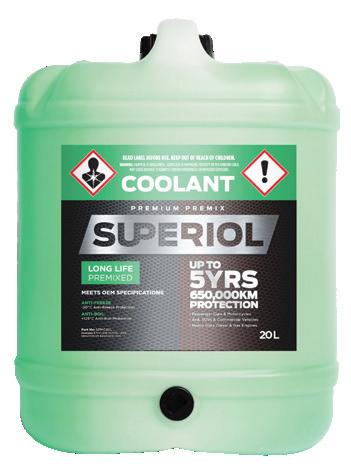
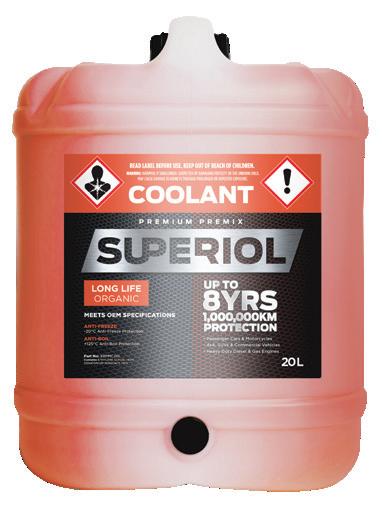
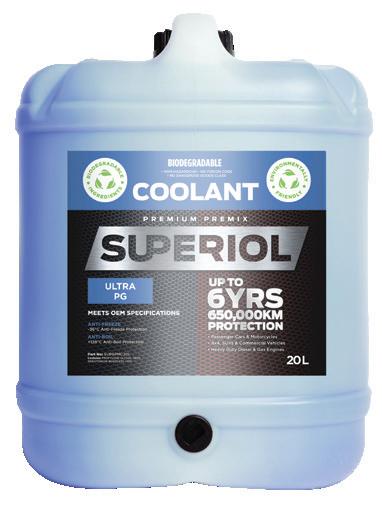
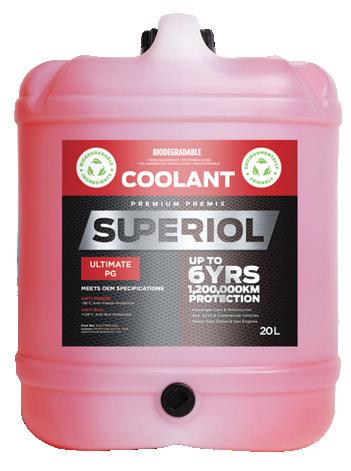
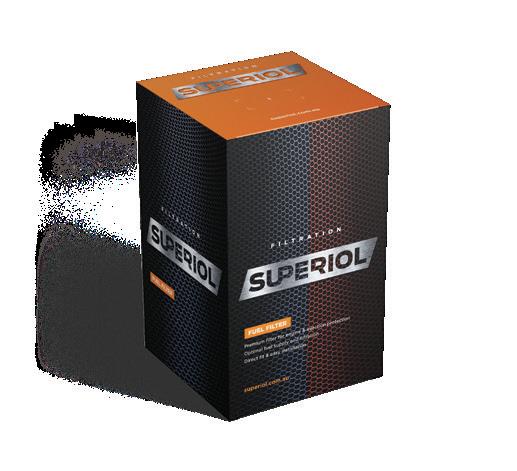
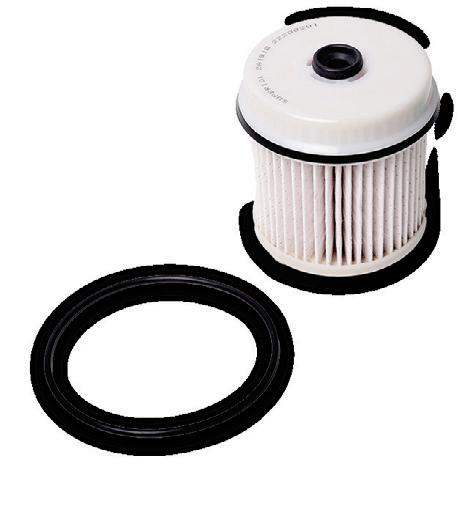
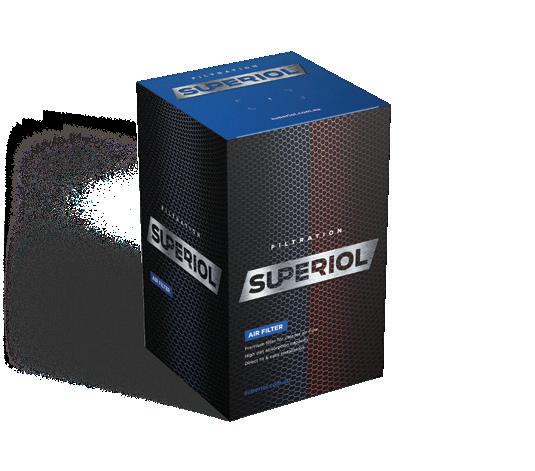
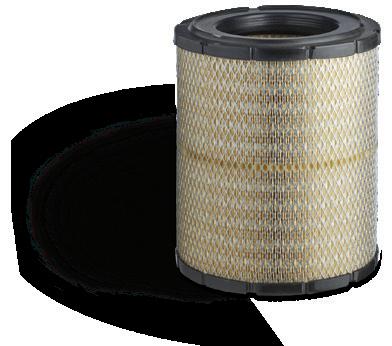
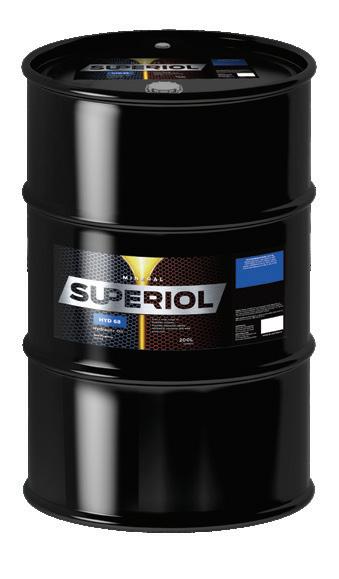
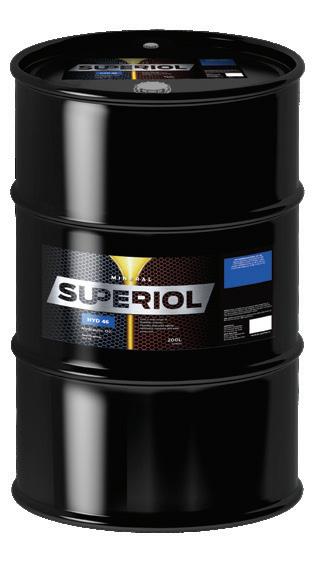
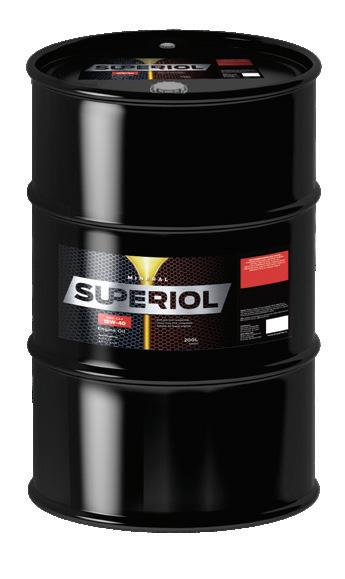
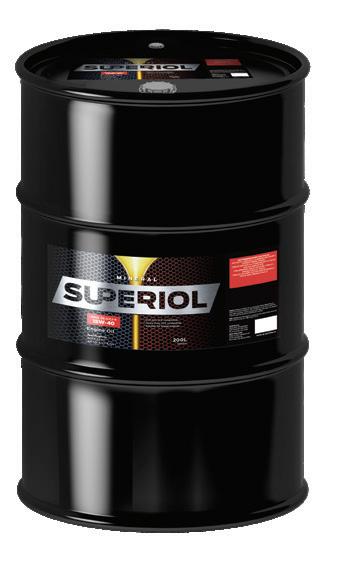
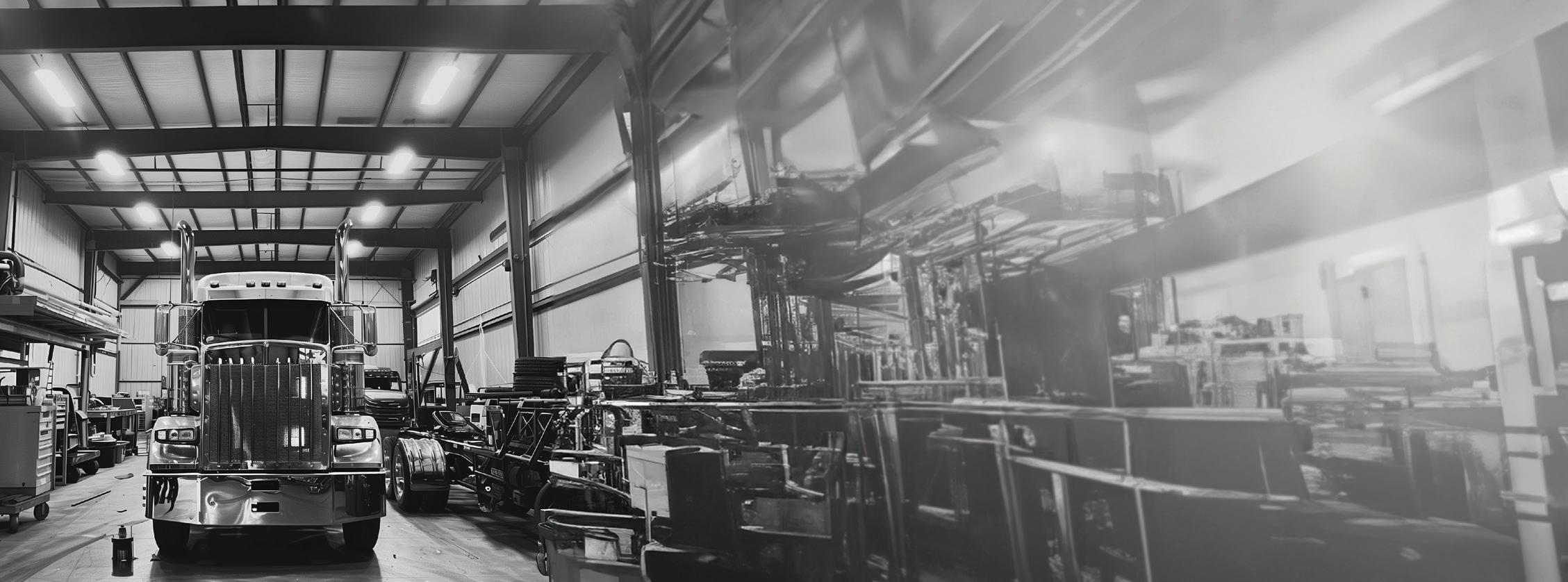

BY DANIELLE GULLACI
THE livestock industry says current road train access restrictions to Rockhampton abattoirs are hampering productivity, driver safety and animal welfare.
Currently, Type 1 road train operators require a National Heavy Vehicle Regulator (NHVR) permit to travel directly to Rockhampton abattoirs.
Even with a permit however, there are operating hours and route restrictions, established by Transport and Main Roads Queensland (TMR).
Queensland is currently home to 10.7 million head of cattle – with Central Queensland’s Fitzroy basin area being the most heavily populated.
The LRTAQ revealed that cattle and calves were once again Queensland’s highest-valued agriculture commodity in 2023-24, contributing $5.71 billion to the state’s economy.
Home to two major red meat processing facilities, Rockhampton has become known as Australia’s beef capital. These facilities alone employ 1400 people and pro-
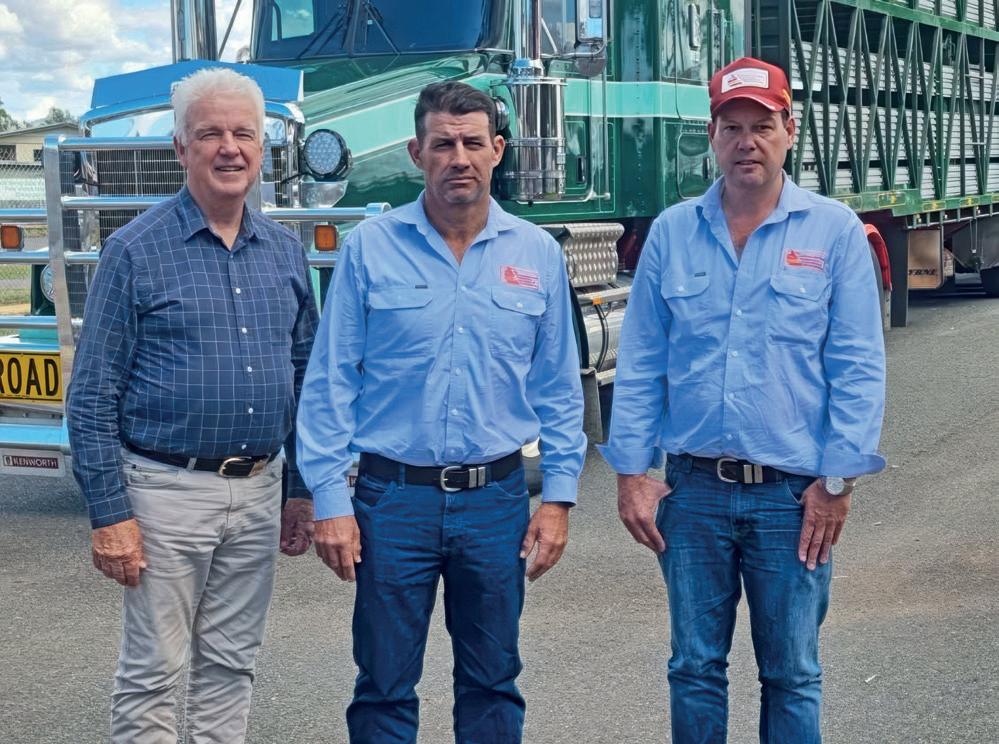
duce up to two million kilograms of red meat a week.
While various PBS vehicles can travel through Rockhampton via the Bruce Highway corridor more freely, livestock operators with Type 1 road trains have restrictions around their movements, including curfews.
The Livestock and Rural Transporters Association of Queensland (LRTAQ) held a roundtable discussion about the issue on Friday August 16, at the CQLX Saleyards in Gracemere, calling for a more workable solution – however TMR declined an invitation to attend.
At the roundtable meeting, Australian Livestock & Rural Transporters Association (ALRTA) vice president Athol Carter told industry stakeholders, “For the past seven years, we’ve been lobbying to gain better access for our high productivity vehicles to the two red meat processing facilities of North Rockhampton with the use of high productivity road trains.
“We have current access from 7pm to 7am but it’s now time to reconnect, rethink and drive animal welfare and driver safety outcomes for an industry that delivers to the
world and allow access.”
For this particular route, Carter says livestock road train operators require three permits a year, resulting in significant compliance costs.
Instead of preventing Type 1 road trains from accessing the abattoirs, the current restrictions just mean the combinations have to be split up, leading to more truck movements.
Carter wants authorities to provide livestock operators with better access to improve productivity, efficiency and safety. Such a move would also help to take heavy vehicle traffic out of Rockhampton’s CBD.
As Carter explained, “They still have to arrive here at the CQLX breakdown pads, split those trailers, decouple, and do two trips to deliver those cattle through the CBD of Rockhampton, and come back here and cross load those cattle.”
From an animal welfare point of view, he said: “We’re leaving animals unattended out here at the saleyards, while we double run those trailers, at a time and a cost of 3.5 hours. For every 3.5 hours that we’re taking to do that, it means less time for the drivers
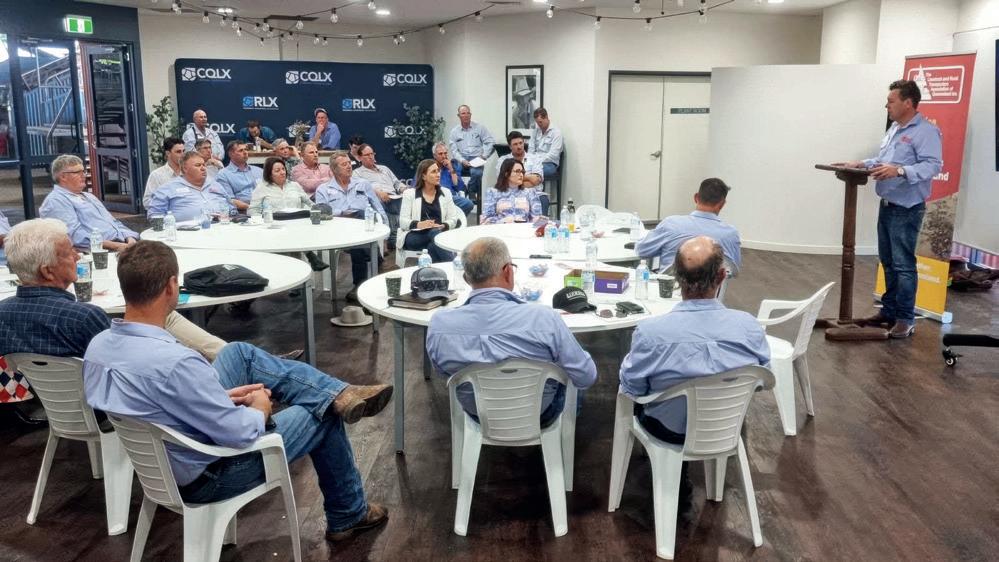
to eat and sleep and perform maintenance on their vehicles.
“So we have a huge increase for driver safety, we have an increase in time and cost to industry. We all know what the cost of living pressure is doing to the Australian community at the moment. And this is only just adding to that through the red meat supply chain.
“It’s also meaning drivers are having to go through town when they should be asleep – and they’re having to work in the dark.
“We are professional, conscious transport operators. This is our living. We’re very heavily invested in this industry and acutely aware of what
our heavy vehicle footprint does.”
The livestock industry is calling for a more sensible approach to the issue, including allowing Type 1 road train access between the hours of 10am and 3pm, and from 5pm to 5am, seven days a week.
“We won’t be in town during those peak times of traffic in the morning and the afternoon with school. Let us get on with the job and let us deliver the freight like we do professionally, all day, every day,” Carter added.
“We’ve also requested a meeting with the minister’s office and will be preparing a factual evidence-based report.”
BY GRAHAM HARSANT
VICTORIA’S peak livestock transporters body is calling for government help in stemming the closure of saleyards in the state. The Livestock & Rural Transporters Association of Victoria (LRTAV) says the closures, and the consequent dearth of bio-security truck-wash bays as a result, has reached a critical point.
“We have saleyards closing down around the state and it’s going to be an ongoing thing,”
said LRTAV president Russell Borchard at the association’s annual conference in Shepparton last month.
“The saleyards say that everyone’s costs are rising and if they’re not getting enough numbers through, the saleyards aren’t sustainable.
“Part of this is attributable to the internet which has allowed sales to go on-line, putting pressure on the smaller outfits and paving the way for bigger, more centralised ones in a commercial environment.”
The subsequent closure of the
attached bio-security truckwash bays is only exacerbating the pressures on operators.
“Bio-security is a big thing, whether it is in the state of Victoria or across Australia,” Borchard said.
“One big problem we have is that the government wants these facilities but they are doing nothing about it; they are not working with us to build these facilities. Governments of all persuasions want it to be a user-pays scheme, set up by private enterprise. That’s just buck-passing to us.”
Maintain your wheels’ renowned shine effortlessly.
Helps to prevent the build-up of brake dust and discolouring.
There is no danger of harming wheels with abrasive cleaners or chemicals.
Ready to use, no need to dilute. Suitable for weekly use.
Tested and approved by Alcoa Wheels. BUY NOW Available online only
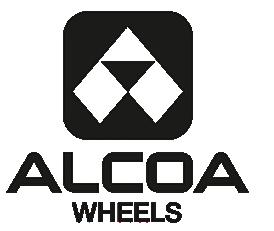

Borchard says all levels of government are saying it’s someone else’s problem.
We don’t want to keep putting effluent on the road for normal road users. We need to be able to wash out. It is animal welfare and driver safety as well. These drivers need to be able to clean their vehicles and work in a clean vehicle. So, it’s biosecurity for everybody.”
Borchard says a biosecurity outbreak would close a town overnight.
“That’s how important a bio-security wash is. We are
trying to get it to the forefront to make governments understand that they need to spend money on this.
“The trucks just have to be clean. We are dropping off and picking up all over the state and, as we speak, some trucks are having to drive up to 300km empty to find a truck wash. The more they shut down the worse it will get.
“This isn’t just about cleaning the trucks out either, this is a big picture on a whole lot on environments. It’s about
cleanliness, safety for the animals, safety for the drivers and safety for bio-security. Our farmers are renowned worldwide for good bio-security practices. We want that reputation to continue - it is vitally important for export, it is vitally important to every town and shire and it is vitally important to our industry. We just want government to listen.”
• For a full review of the LRTAV conference, pick up a copy of the next issue.

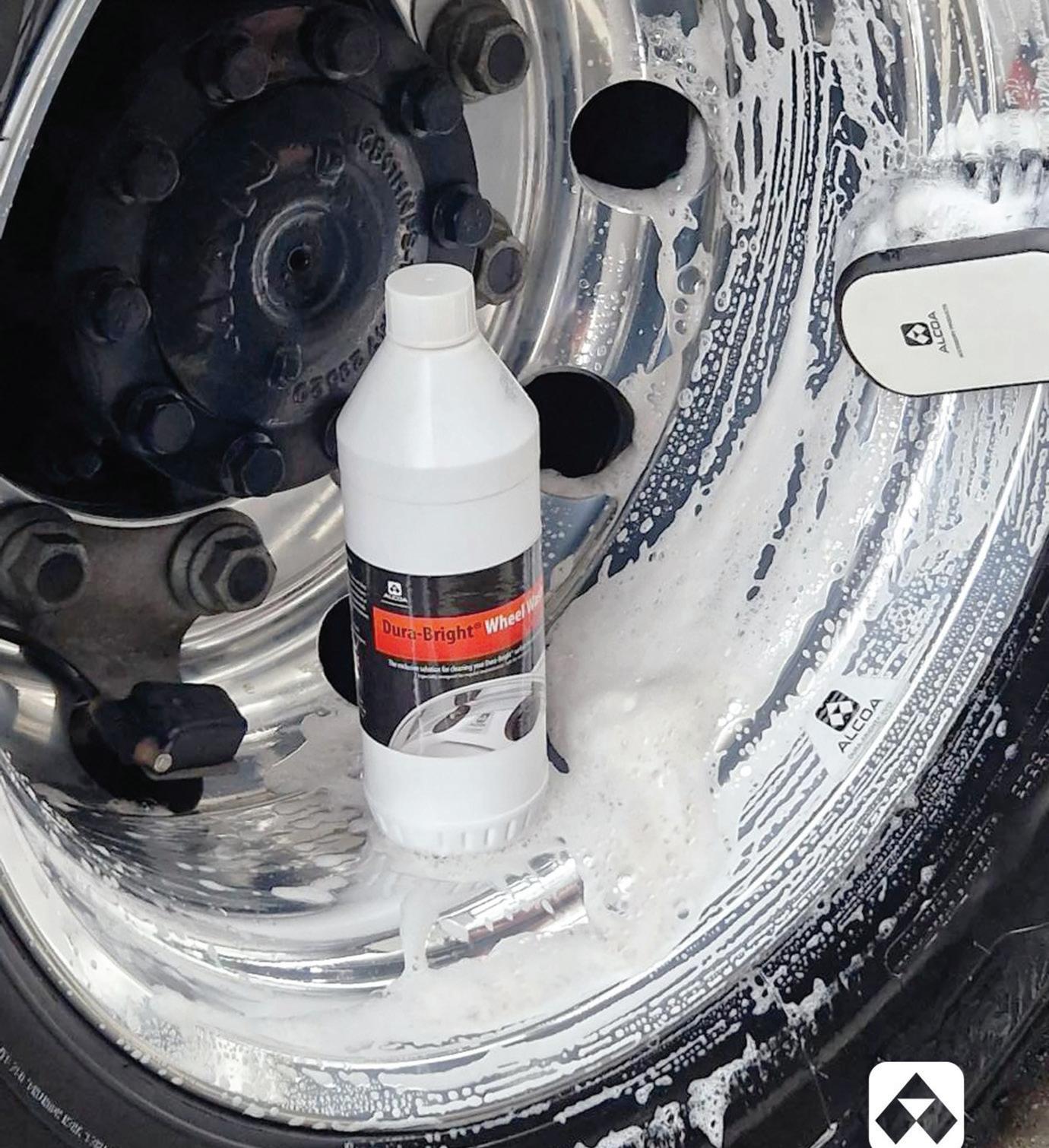
Legacy Parts with Legacy Pricing
For your ISX/GenII/EGR On-Highway Engines
(excluding X15)
Now with updated prices for 2024 on selected parts and kits.
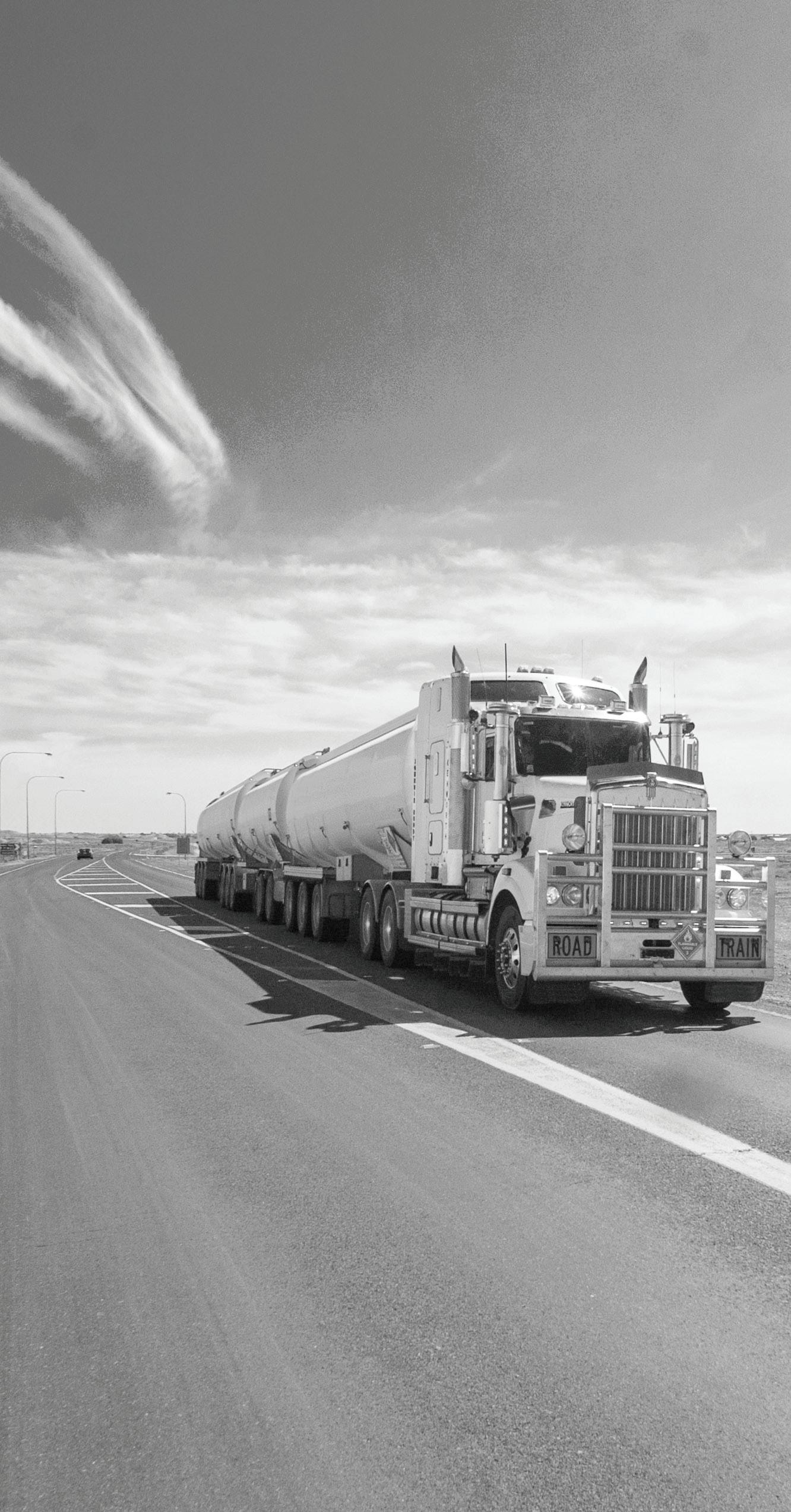
As hit trucking series Outback Truckers returns to our screens, Big Rigs chats to long-time show favourite, outback trucking legend Steve Grahame.
BY DANIELLE GULLACI
IT’S been a long three years since the last season of Outback Truckers aired, with fans eagerly anticipating a return.
Now that wait is finally over, with season 10 being aired on 7Mate on Tuesdays at 8.30pm – following the world premiere on August 27, Produced by Western Australian based Prospero Productions, Outback Truckers has showcased the challenges our truckies face on a daily basis to the world, with the show aired in over 100 countries since its debut in 2012.
While the new season will feature several long-time show favourites, there are plenty of new faces as well.
Outback trucking legend Steve Grahame, aged 72, has been on Outback Truckers from the very beginning, tackling the harshest terrain to deliver to some of the most remote corners of Australia.
And he’s been driving trucks for a whopping 56 years.
Based in Perth, Steve and his seven-year-old German shepherd/kelpie cross named Bella, take viewers along for the ride.
His work takes him into Pitjantjatjara land in northern South Australia, up through the Northern Territory and across the Kimberley region of Western Australia.
“I’m still travelling the same roads, undertaking the same work, the same sorts of jobs and dealing with the same risk factors,” said Steve.
He drives a 1994 model Kenworth C501. “The clock has been around over four times now, so the truck is getting up towards five million kilometres – but the only bit that’s original is the cab and the chassis rails. Everything else has been replaced at some point,” said Steve.
“Though I have been dragged kicking and screaming into the 21st century. I’ve fitted a new engine to my truck, which is run by not just me but also a computer. If something breaks, I’ll have to call a helicopter,” he laughed, adding that the new Cummins X15 600hp engine has been in the truck for about 10 months, having done around 110,000 kilometres so far.
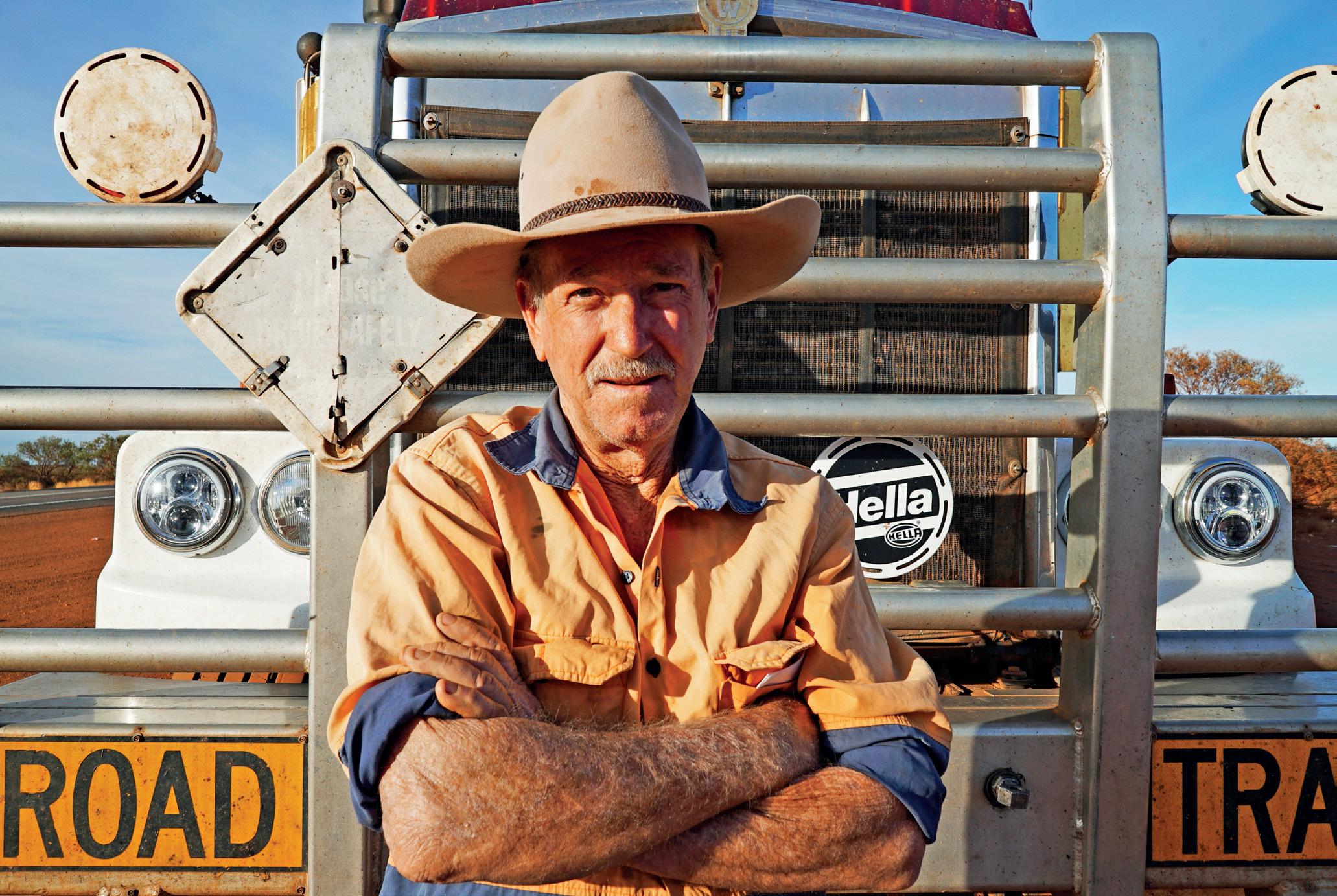
When Steve chatted with Big Rigs, he had just returned from the Great Australian Amethyst Mine in the Pilbara.
“I’m still doing all the longer stuff and Bella still loves coming in the truck – though she’s got to a stage where I’ve had to make a ramp for her to get in and out of the truck now,” said Steve.
Having been on Outback Truckers for so many years, Steve believes the show has had a positive impact in more ways than one – improving the perception of truck drivers and the industry among the public, showcasing what Australia’s vast and varied
“I think the show has helped create a lot more acceptance for what we do. You get to see the industry, warts and all,” he said. “It lets people see what we are like, what we go through, how involved the work is and how handson it is from a mechanical
an eye opener, showing that trucking really is a skilled trade. There’s a lot of knowledge truck drivers have to have these days – about the braking system, the trailers, customer and client liaison.
“The good news is, I’ve found we’re getting more accepted by other travellers on the road. We’ve been shown with our families and our
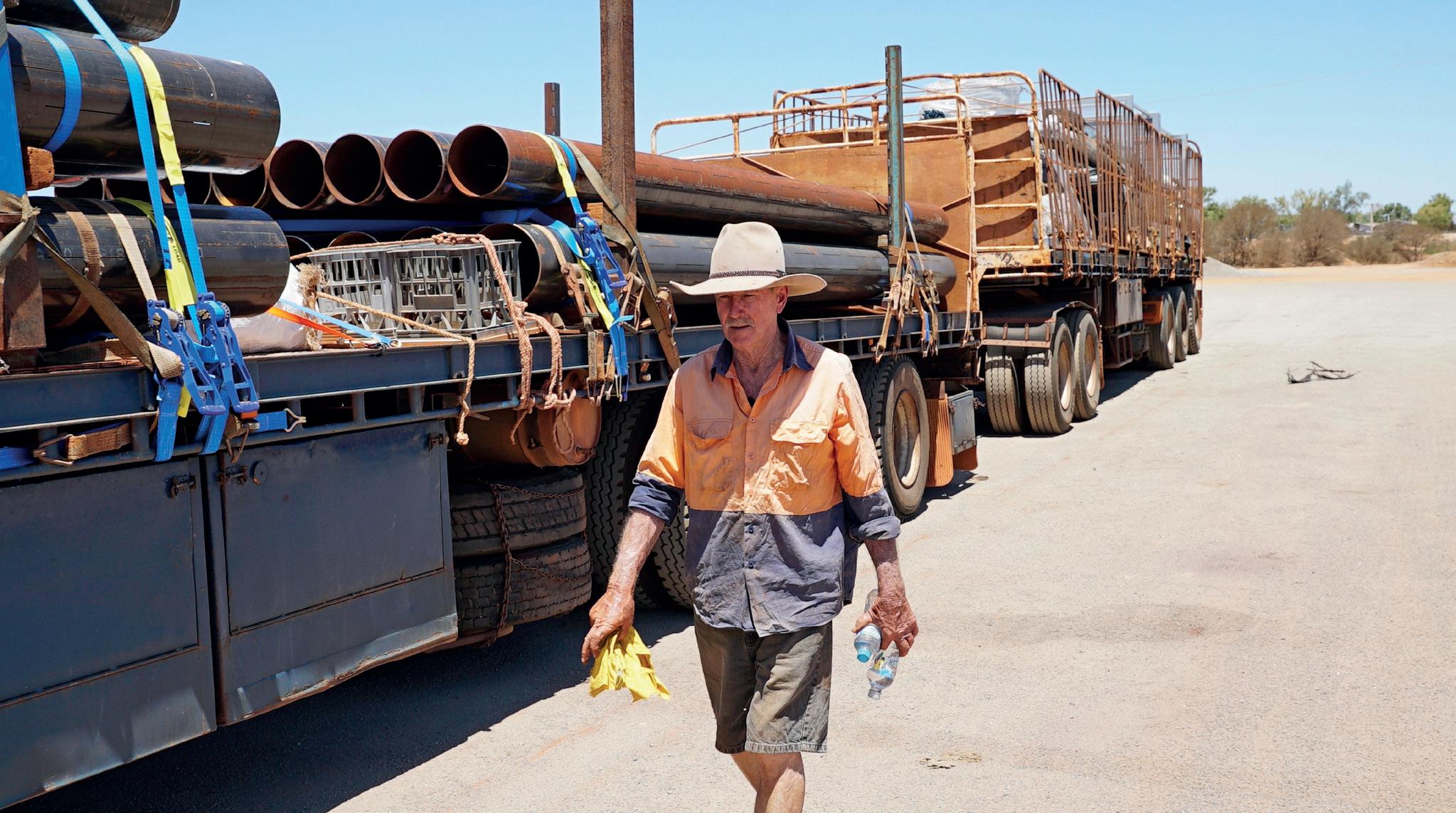
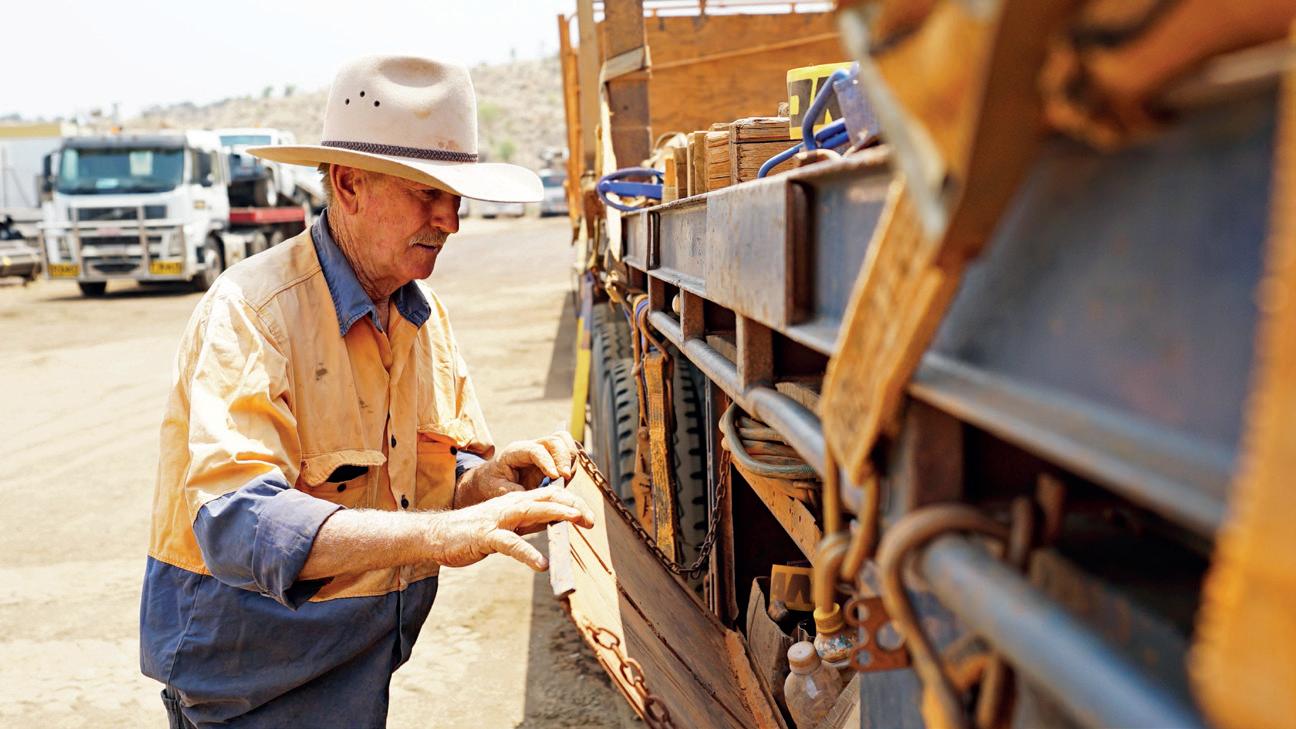
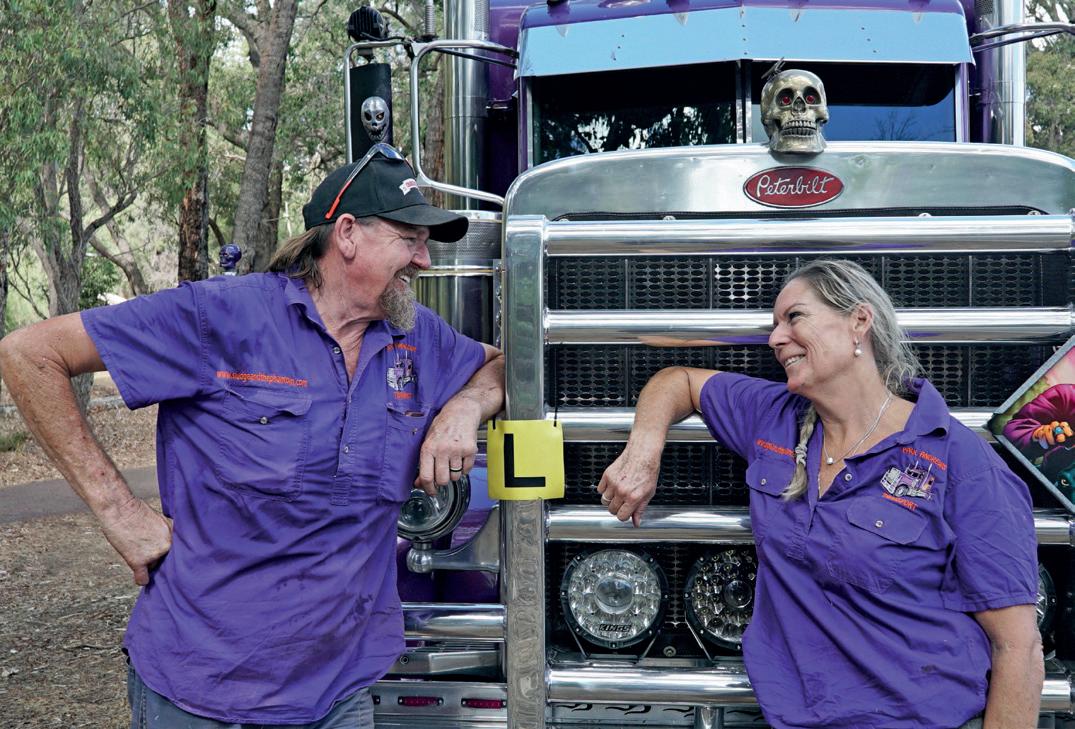
dogs, and people can see that we’re just like everybody else.”
For Steve, he says he’s proud to be featured on the show, alongside Bella. “I’m proud of the fact that Outback Truckers has showcased Australia the way it has. My phone number is on the side of my truck and I’m surprised at how many people call from overseas to say how much they’d love to come and visit.
“It’s been good being able to showcase this wide, big, huge country of ours and the advertising has been pretty handy too. For me as a small contractor, I’ve definitely had jobs and contracts as a direct result of being on the show. I wouldn’t have thought a small contractor like myself would gain much from that sort of advertising, but I have.”
For some time, the future of Outback Truckers had been hanging in the balance. The team at Prospero Productions worked tirelessly to get Season 10 off the ground, overcoming several hurdles before finally getting the green light late last year.
As per previous seasons, Season 10 will feature 13 onehour long episodes.
Steve said he’s pleased to see the show make its return, revealing the production crew had joined him on a recent trip as they’re now filming for season 11.
Prospero Productions is also currently casting for Season 11 of Outback Truckers, with filming of new episodes to continue through to February 2025.
“They’re looking for anyone in the industry that’s prepared to put up their hand. Long distance is always interesting, but if you’re doing linehaul off a wharf you could show the stress and frustration of the working environment there too,” explained Steve. For any truckies considering applying, Steve’s advice is simple: “I’d say just do it, without hesitation,” he said, while also thanking Big Rigs readers for all their support along the way.
*If you think you have what it takes to star in the next season of Outback Truckers, contact rachael.s@prospero.com.au or c.falkiner@prospero.com.au.
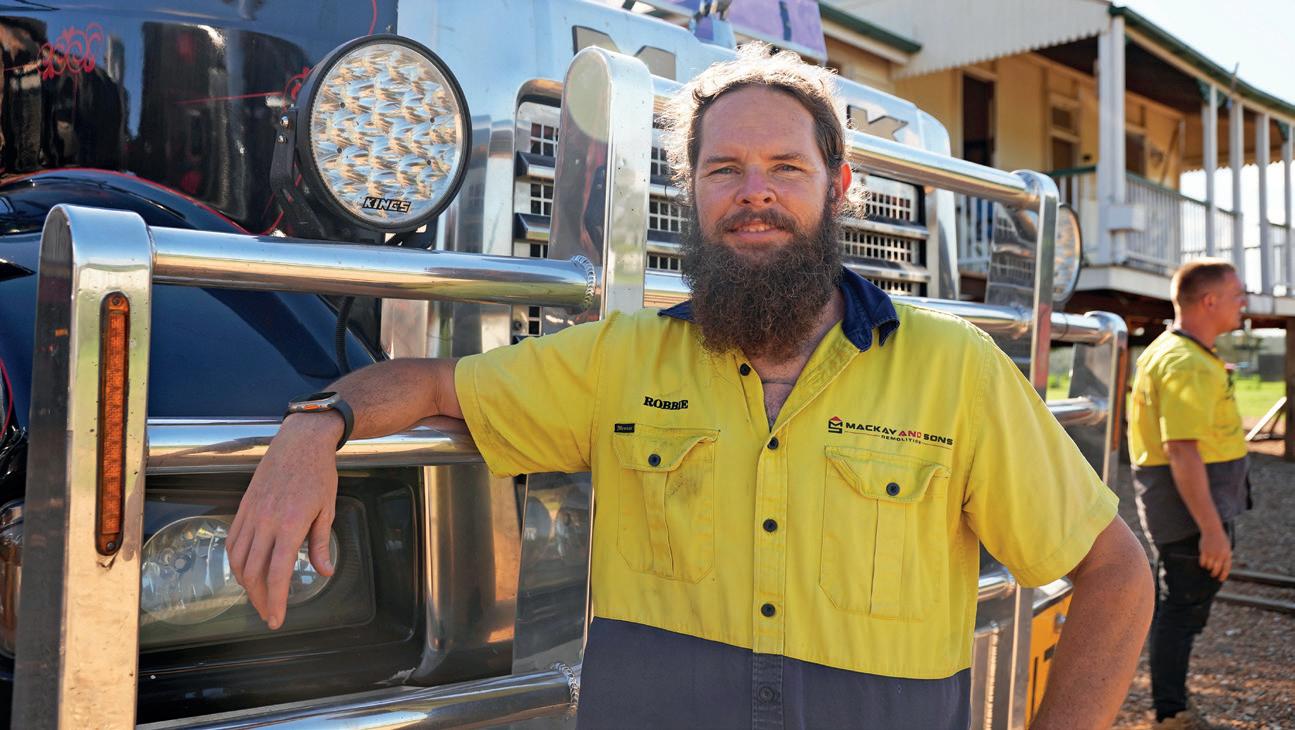

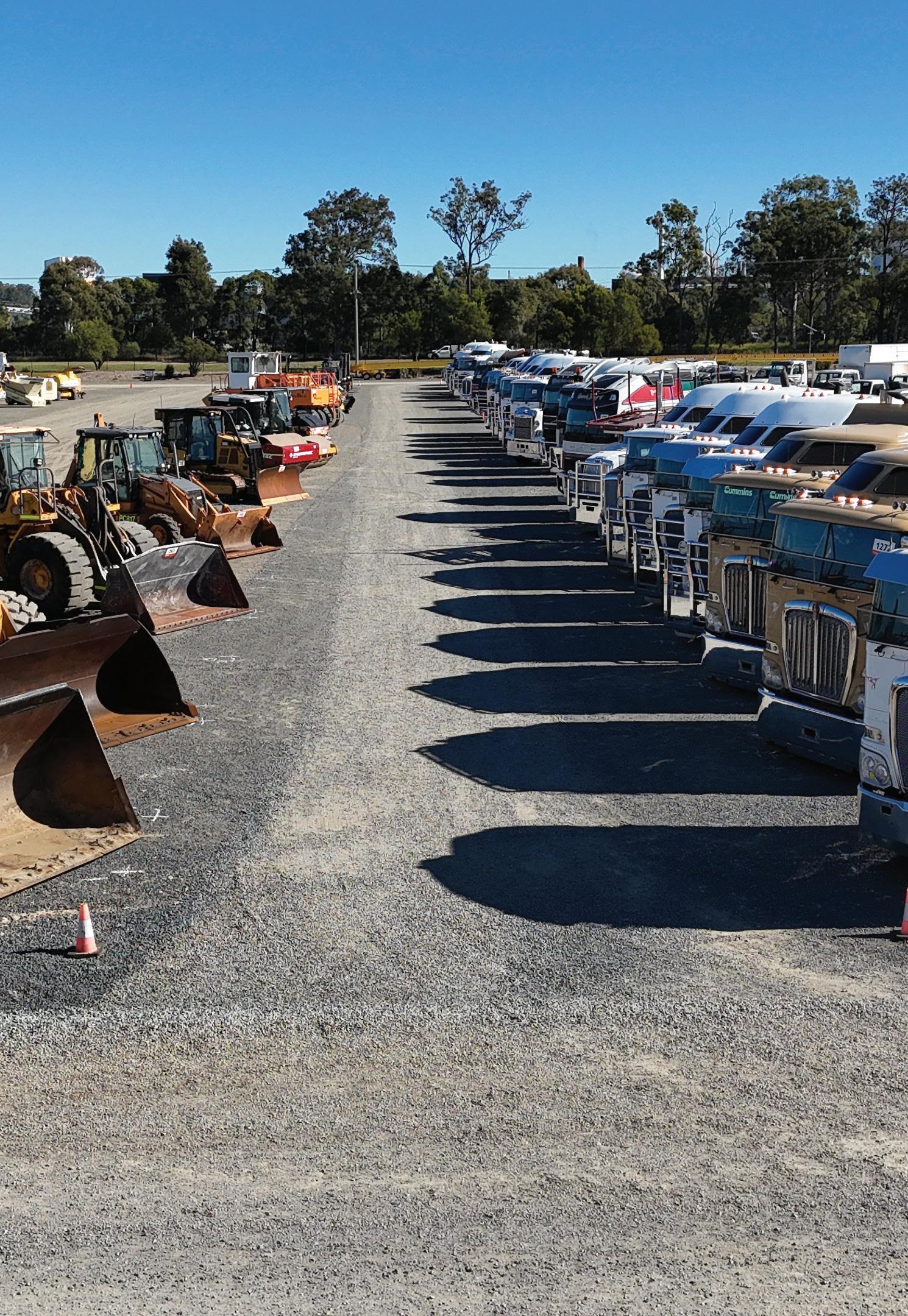
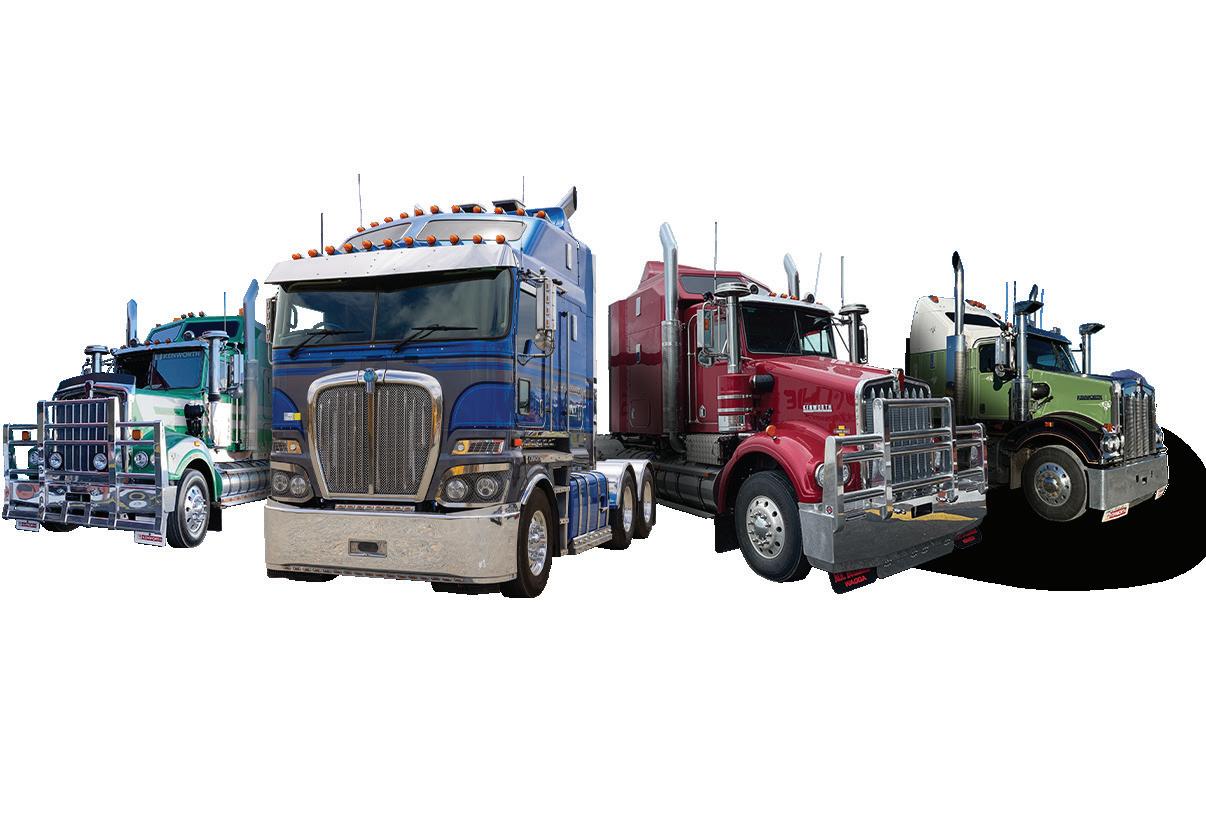
Travelling across Australia, this new Mack Super-Liner is helping to get the conversation started around men’s mental health.
BY DANIELLE GULLACI
NAMED Muttley and adorned in TradeMutt’s colourful ‘Razzle-Dazzle’ print, this new Mack Super-Liner definitely stands out in the crowd – and that was always the intention.
The newest addition to the Martins Stock Haulage fleet, it hit the road earlier this month in support of mental health group TIACS.
TIACS (This is a Conversation Starter) is a professional mental health counselling service for tradies, truckies, farmers and blue collar workers. It was founded by TradeMutt, known for its range of eye-catching workwear, aiming to get people talking about mental health.
Martins Stock Haulage was started in 1958 by Gordon Martin when he began carting pigs and calves in the Singleton and Maitland areas of Queensland. From that first truck, the business has now grown into one of the country’s largest livestock carriers – with a fleet of 85 prime movers and around 270 trailers, travelling right across Australia.
While Gordon is still very much hands-on in his business, his son Jason Martin took the reins as a company director in 2018.
For many years, the company has been known for its vibrant yellow trucks, with all new prime movers coming into the fleet sporting the well-known Martins livery. With the delivery of this new Superliner, it’s only the second time the company has deviated from its usual colours.
The first time came when Martins took delivery of its very first new Mack in August 2023. The pink Super-Liner, named ‘Pink Diamond’, was designed in support of women in the industry. Now, 12 months later, ‘Muttley’ joins the fleet, adding another pop of colour.
tionally been all Kenworth –including Martins’ milestone
350th Kenworth purchase, which came in the form of a Legend SAR, one of three of the same model delivered earlier this year – Martins has also been adding several Macks into the mix too.
Purchased from Western Truck Group, the Mack lineup is now made up of four Titans and eight Super-Liners.
“Both Kenworth and Mack produce a very good product. We originally started looking at Macks through Covid.
Western Truck Group have been very good to deal with – it’s a very well-oiled outfit,” said Adam Ross, general manager at Martins Stock Haulage.
Adam joined Martins Stock Haulage 16 years ago as a truck driver, eventually working his way up through various managerial roles and into his current position. Prior to that he had spent several years as a truck driver.
“I’ve always had an interest in trucks,” he said.
Martins Stock Haulage now operates from three depots: its main headquarters at Scone, along with Oakey and Dubbo. While its main operations are centred around cattle and sheep transport, it also has a dangerous goods division too.
Muttley is based at Oakey and is being used to transport cattle all over Australia. Featuring a 58-inch sleeper cab, it’s a true workhorse, pulling a mix of B-doubles, B-triples and triple road trains.
Company driver, Aaron Girdler, is behind the wheel of the new truck. He took it out on its maiden run in mid August, heading up to the outback town of Tambo, before loading up with cattle and heading back down to Dinmore in Ipswich.
Due to the recent heavy rains in Queensland however, it returned covered in mud!
“It definitely came back ready for a wash,” said Adam. “Aaron absolutely loves the new truck and he’s right on board with its message. All of
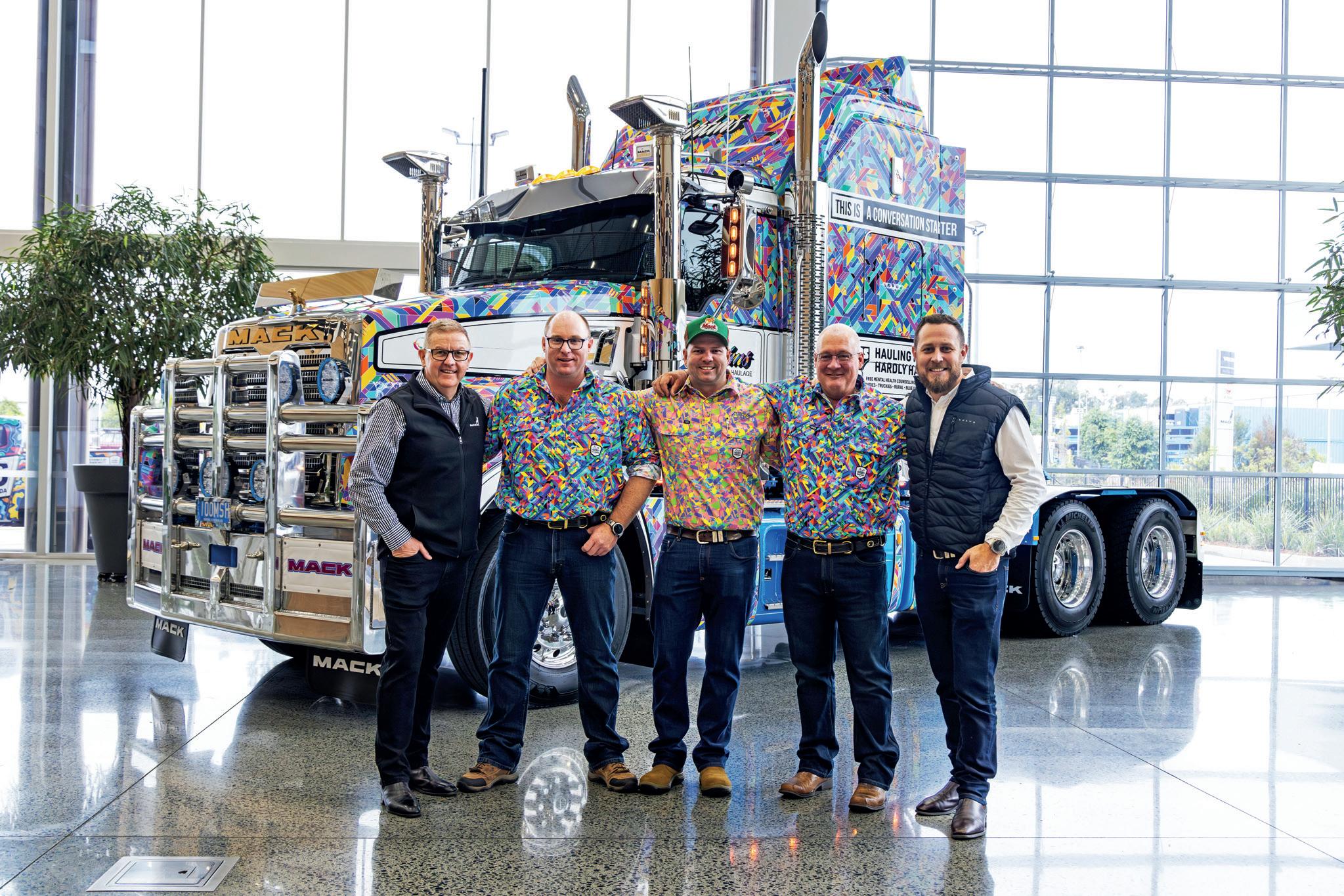
Fittingly, the whole idea around the theme of the new truck came about by simply starting a conversation.
“Men’s mental health is something that has always been important to Jason, so this truck is his baby,” explained Adam.
“We’re a family owned and run company. All our staff are part of that extended family. A lot of men have difficulty talking about things that are going on in their lives, and this is particularly true of drivers, who are often away from home for periods and spend a lot of time alone in the cab. Jason’s seen a lot of this over his career, and we want to make sure we look after our people. Mental health’s a big part of that.
“After we did the pink truck, we wanted to do something around men’s mental health.
At the Dalby Stock Horse Show, we ran into the team from TIACS and floated the idea, and that’s how it all came about.”
Ed Ross of TIACS and
sold and we were having a beer to celebrate when we were introduced to Jason. He was telling us about the pink Mack Martins did last year, and he asked us if we’d be interested in doing something similar… We jumped at it.”
While there are many mental health organisations out there, Adam says TradeMutt and TIACS was a perfect fit for the new truck and the message the company wanted to spread out on the highways.
“We did a fair bit of homework and found that the boys at TradeMutt and TIACS have an open book policy, so you can see where all the money they raise is spent,” Adam added.
“It all goes back into their business, supporting guys through tough times. They’re so passionate about what they do and we thought, what can we do to help? So we got on board with this truck, to spread the message that it’s okay to ask for help.”
Prior to the new truck, Martins Stock Haulage had al-Mutt for some time through
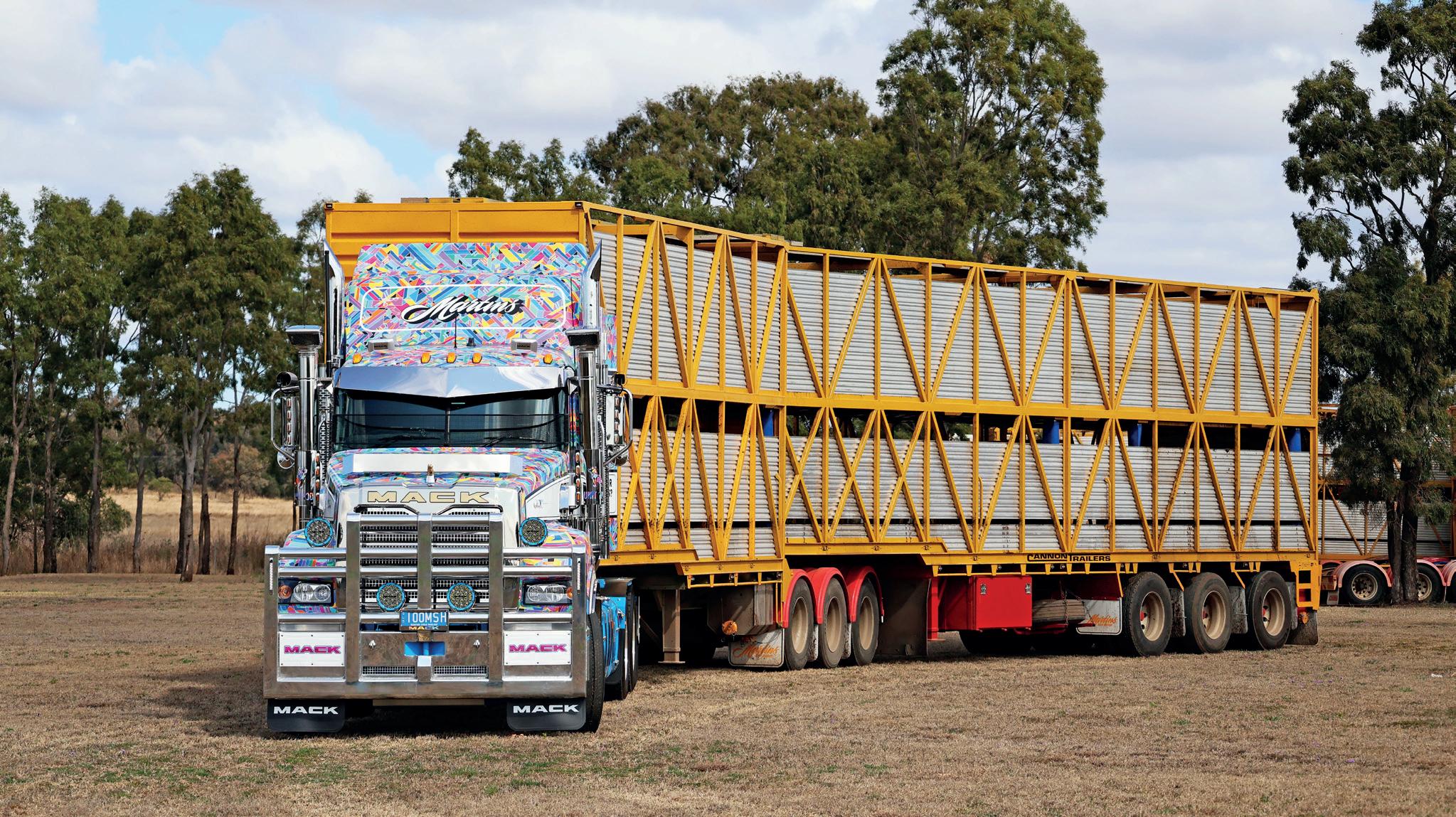
“That Razzle Dazzle print is the same as the shirts we wear on Fridays, so that’s how we chose that print. We thought it would look pretty cool on a truck. On Fridays, anyone who comes to work not wearing the shirt donates $5 to the charity. But all our staff are on board and absolutely love wearing them,” said Adam.
Vice president of Volvo Trucks Australia, Tom Chapman, was behind the idea, with Ben Dare of Western Truck Group coordinating it all.
Bailey Print Group was tasked with wrapping the truck. Though they were more accustomed to wrapping vehicles on a smaller scale, as this was the first time wrapping an entire truck – Martins couldn’t be more pleased with the result.
The Bling Man for some fin
ishing touches.
“The truck looks brilliant,” said Adam. “We’re in love with it and couldn’t be happier with how it’s turned out.
“When we approached Bailey Print Group, we just told them to make it look cool and didn’t give them any restrictions. We also swapped out the grey interior for blue. It looks spectacular – and in the sunlight, it looks even better!
“The new Mack definitely stands out and starts a conversation. On its first run, our driver Aaron had so many people pulling him up, wanting a photo with the truck and wanting to know what it’s all about.”
If you or anyone you know would like to access TIACS and speak to a professional mental health counsellor, text day to Friday (8am to 10pm
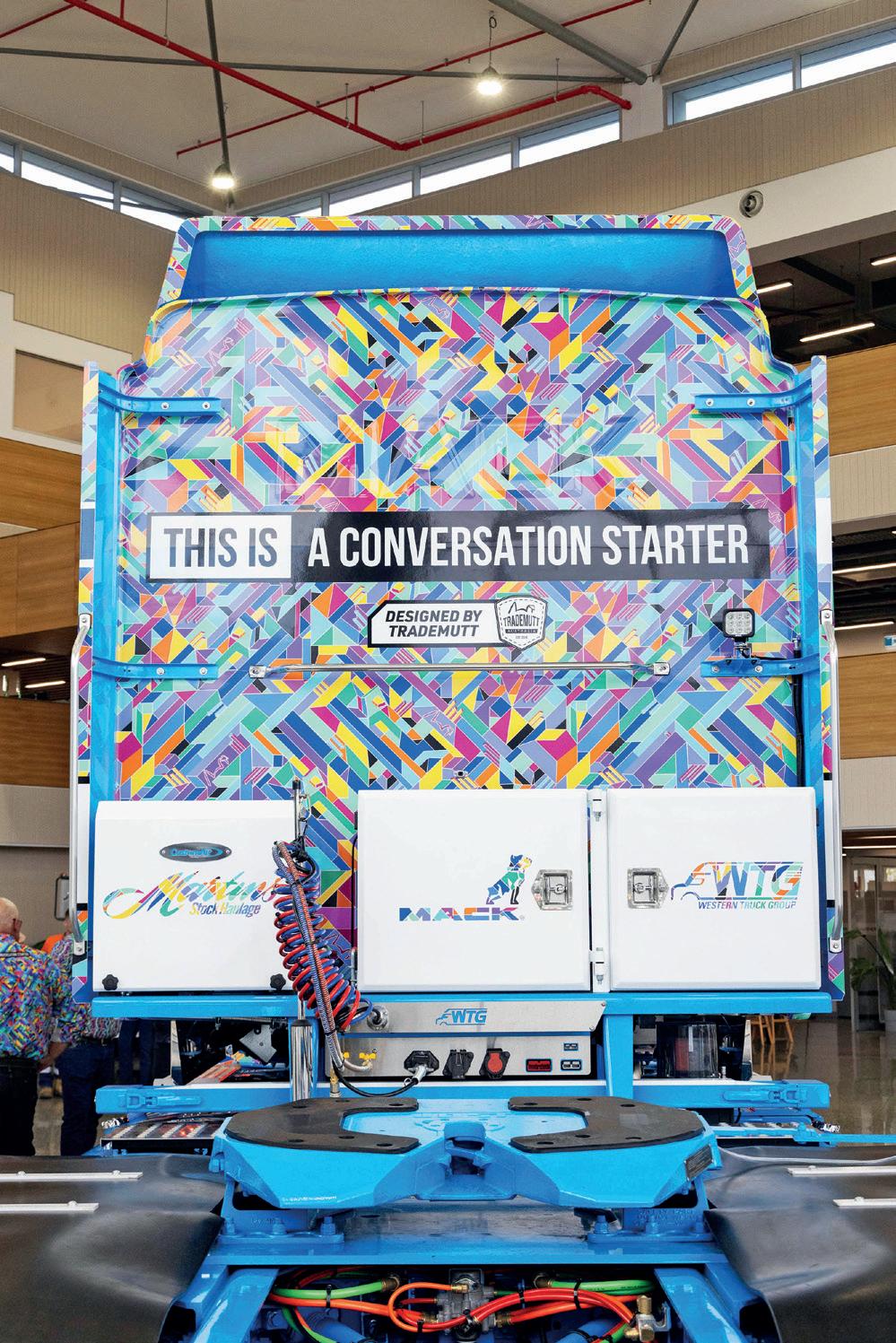
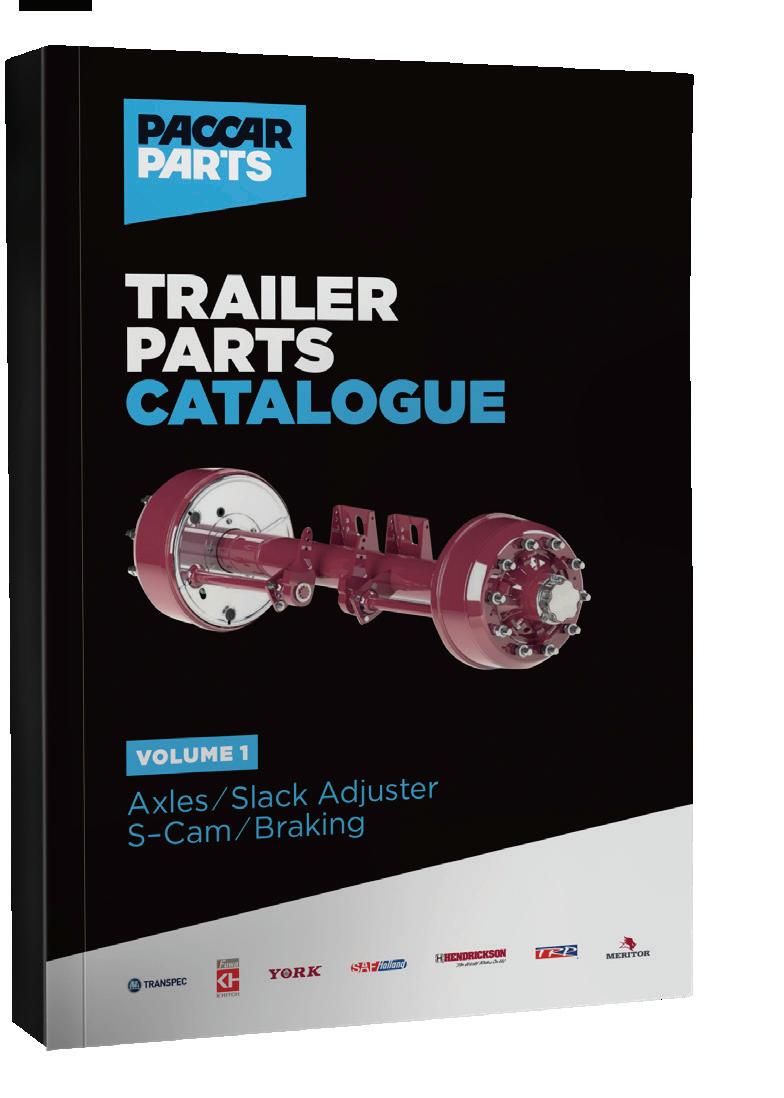

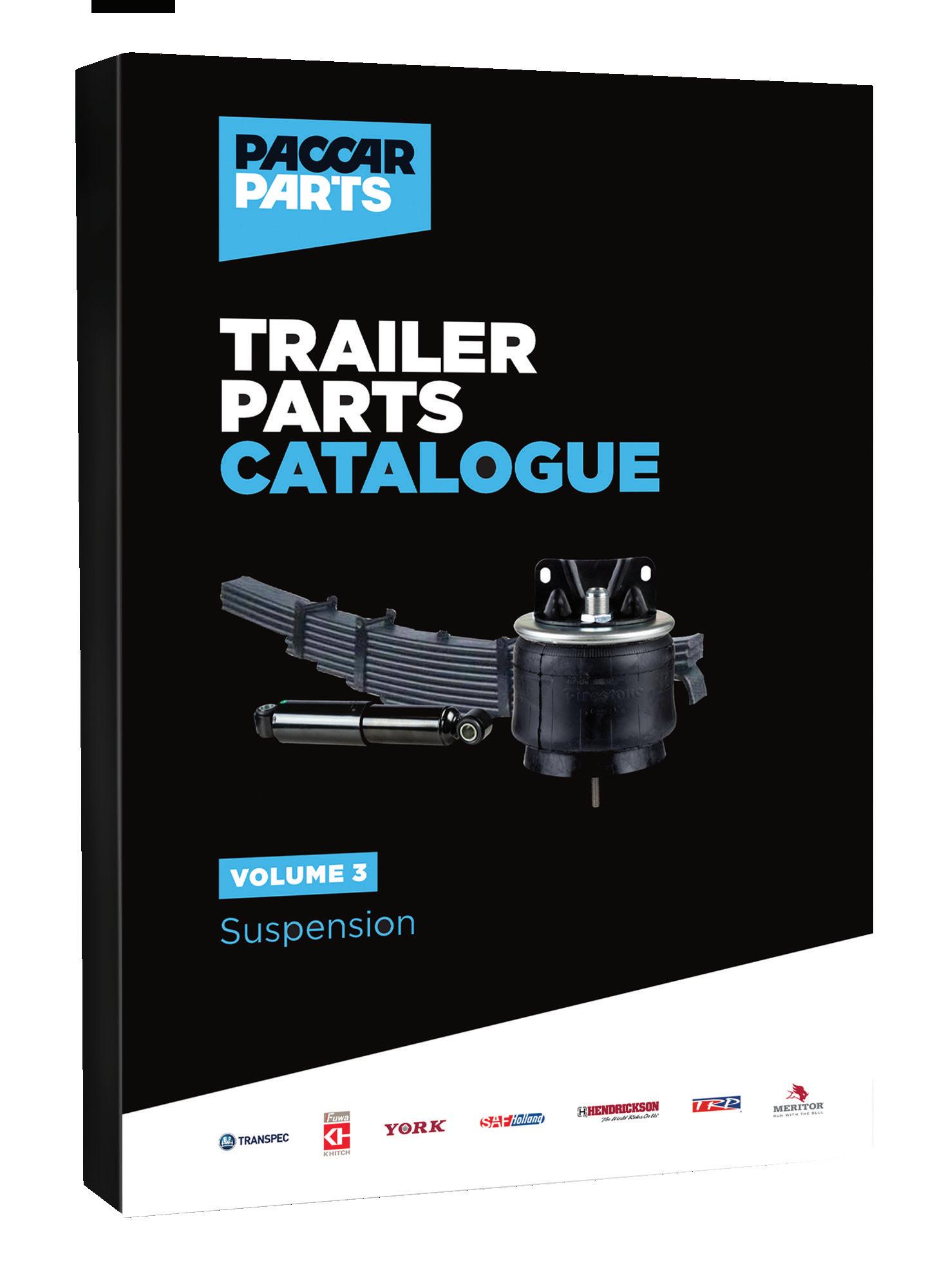

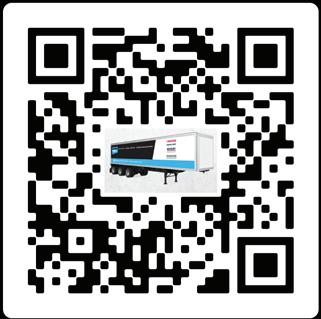
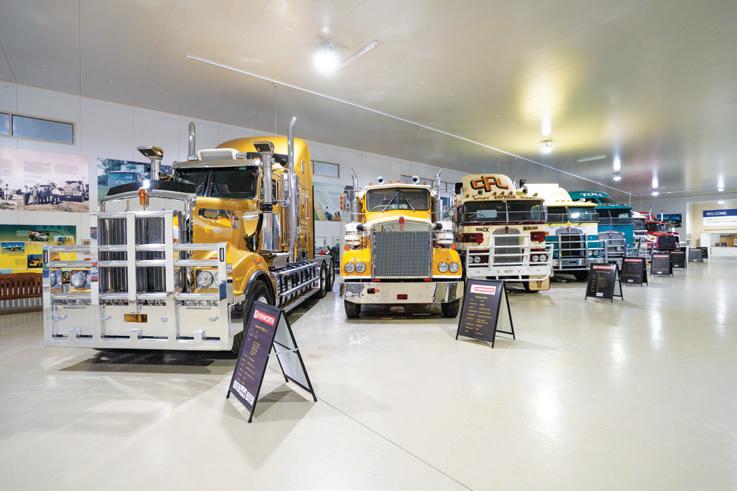
In celebration of Father’s Day on September 1, this proud daughter pays tribute to the many sacrifices her dad made for his family over the years.
BY AINSLEIGH BILATO
THERE would have been Order of Australia Medal recipients less proud than my six-year-old self, leaving school early to accompany my dad on a trip in the truck. It wasn’t about skipping times tables or because I’d get to trade the apple in my lunch-
At 10 years old, my classmates would talk about their dads who fixed things, who helped others when they were hurt, who worked with cattle, who cooked incredible meals, who made sure people were following the rules. I remember being unimpressed.
My dad was a truck driver. He did all of that and more,
would make to sit on my bed at 4.30am every morning to have a quick chat before heading off to work.
When, at 16, I needed help with my maths homework, Dad never hesitated to give up his evenings. He brought with him a level of patience that I don’t believe many others could muster after a 14-hour day spent in the Alice Springs heat. Although he was facing the many pressures that come with managing a transport business, Dad never made my frustrations feel small.

Waving goodbye to Dad on my first day of university, I knew that I wouldn’t have this opportunity had it not been for the years of sacrifice he had made, ensuring that his family always had everything they needed. Today, I understand just how impressive his story is.
My dad, Franco Bilato, made his start in transport long before he legally held a licence, helping out his father, Dino. Dino, a first-generation Italian immigrant, relied on the help of his children to keep his small fleet of Fodens on the road.
“Dino didn’t discriminate between boys and girls in our family; workers were workers, Franco explains.
Dino believed that, provided his sons could read, write and do basic math, there was
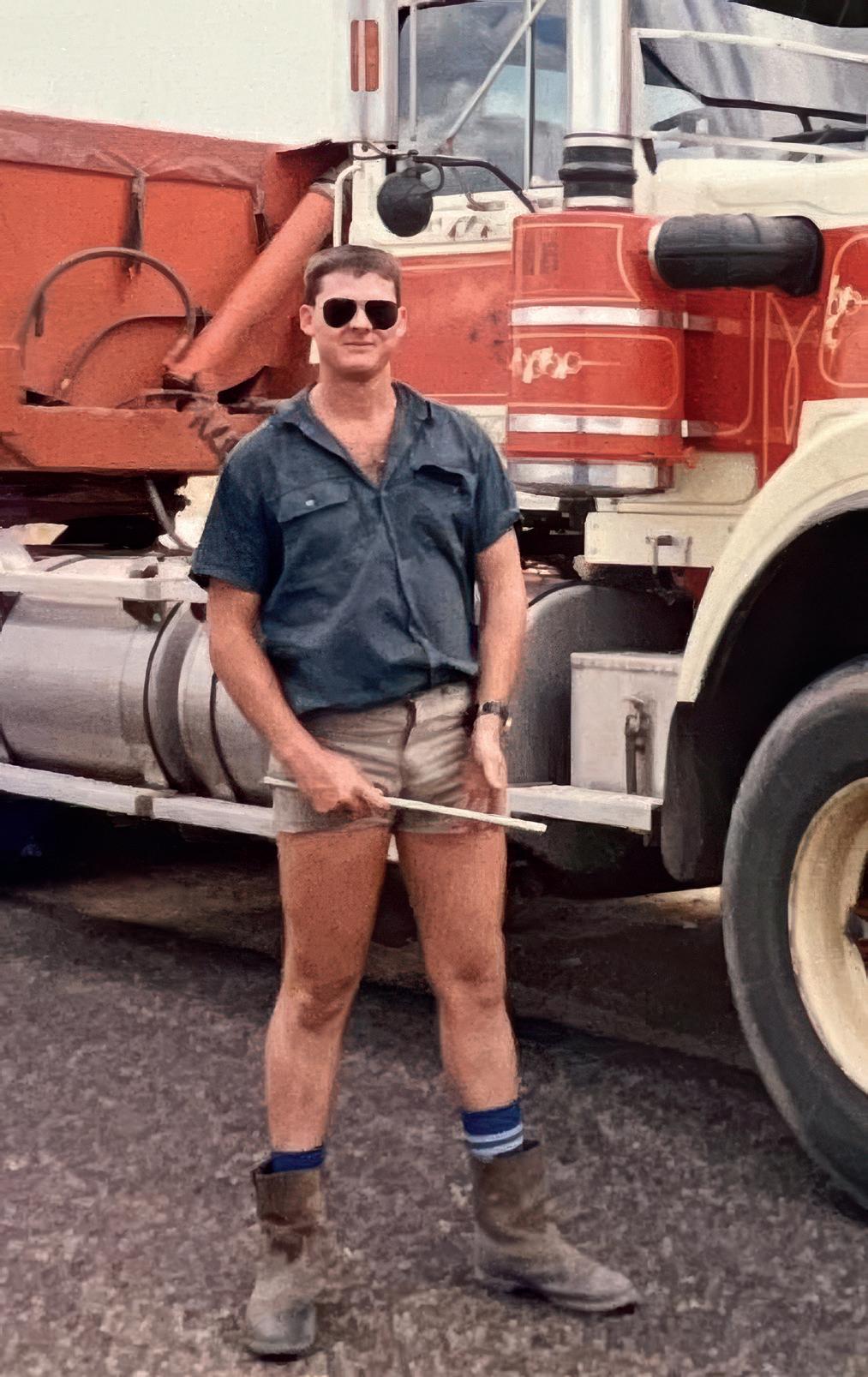

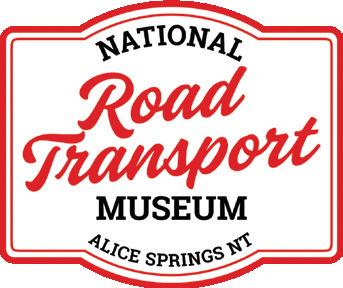
When Dino passed away, he cautioned his children against following in his footsteps in transport. The risks were high, and the rewards were few and far between.
Franco, heeding his father’s advice, earned his trade as an electrician and worked in this field for five years before the pull of the transport industry proved too great.
In 1989, a 22-year-old Franco started at Gulf Trans port, carting diamond ore from Argyle Diamond Mine in Jim Cooper’s old Autocar.
From here, Franco was tasked with hauling lead and zinc concentrate from Cad jebut Mine to Wyndham Port. A 1200km round-trip each day, the drivers were meant to work five days a week with a service day on Saturday.
The reality was that they were driving seven days a week and were responsible for maintaining their trucks enough to keep them on the road.
“We gained a hell of a lot of experience fast back then,” Franco remembers.
From 1994, Franco, want ing to stay close to home as he and his wife welcomed their two children, was appointed the depot manager for the business at Woodcutters mine and, later, operations manager for the business.
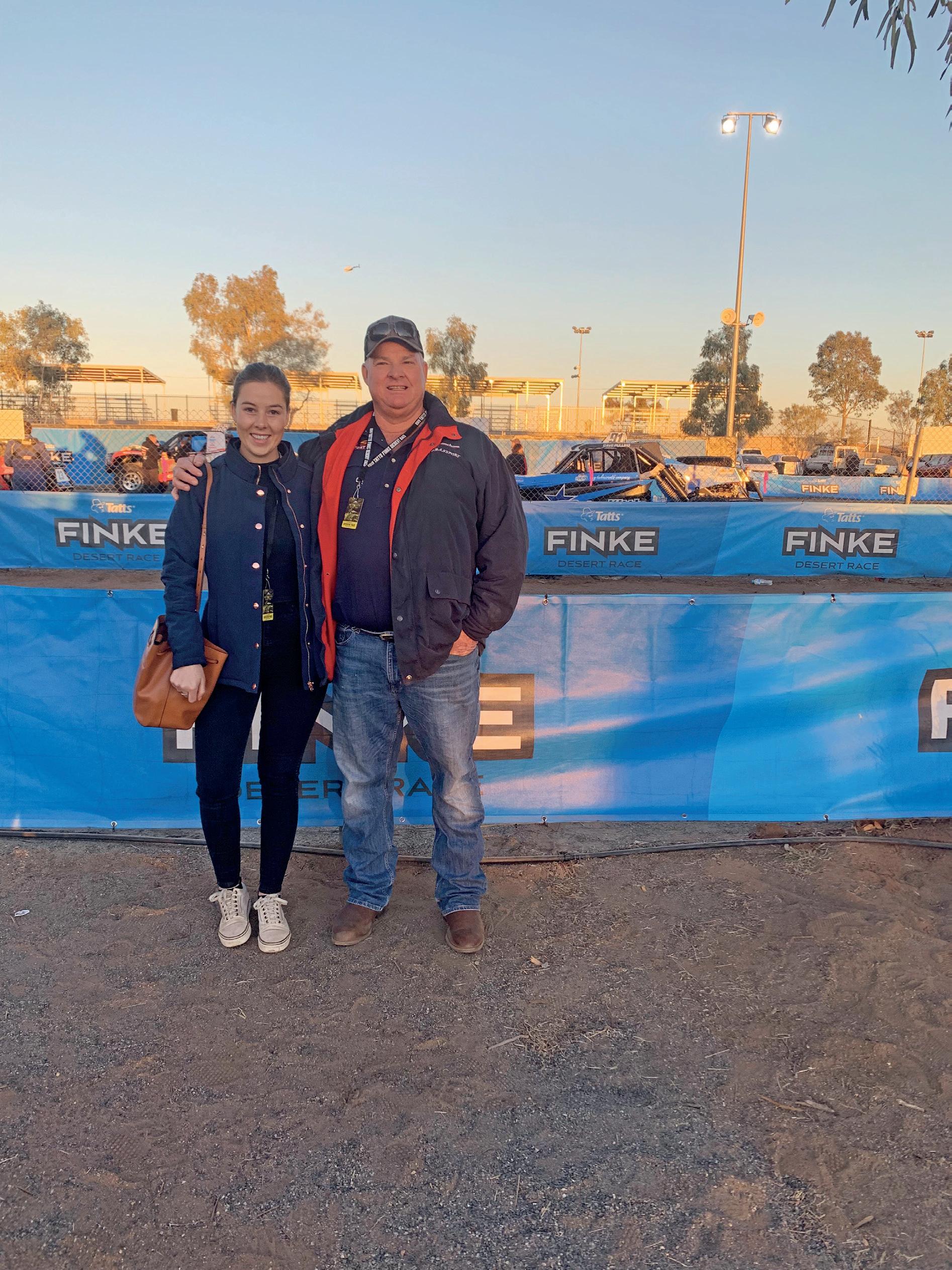
bad luck.”
In these early days of the business, the aim was not to turn a profit so much as it was to survive.
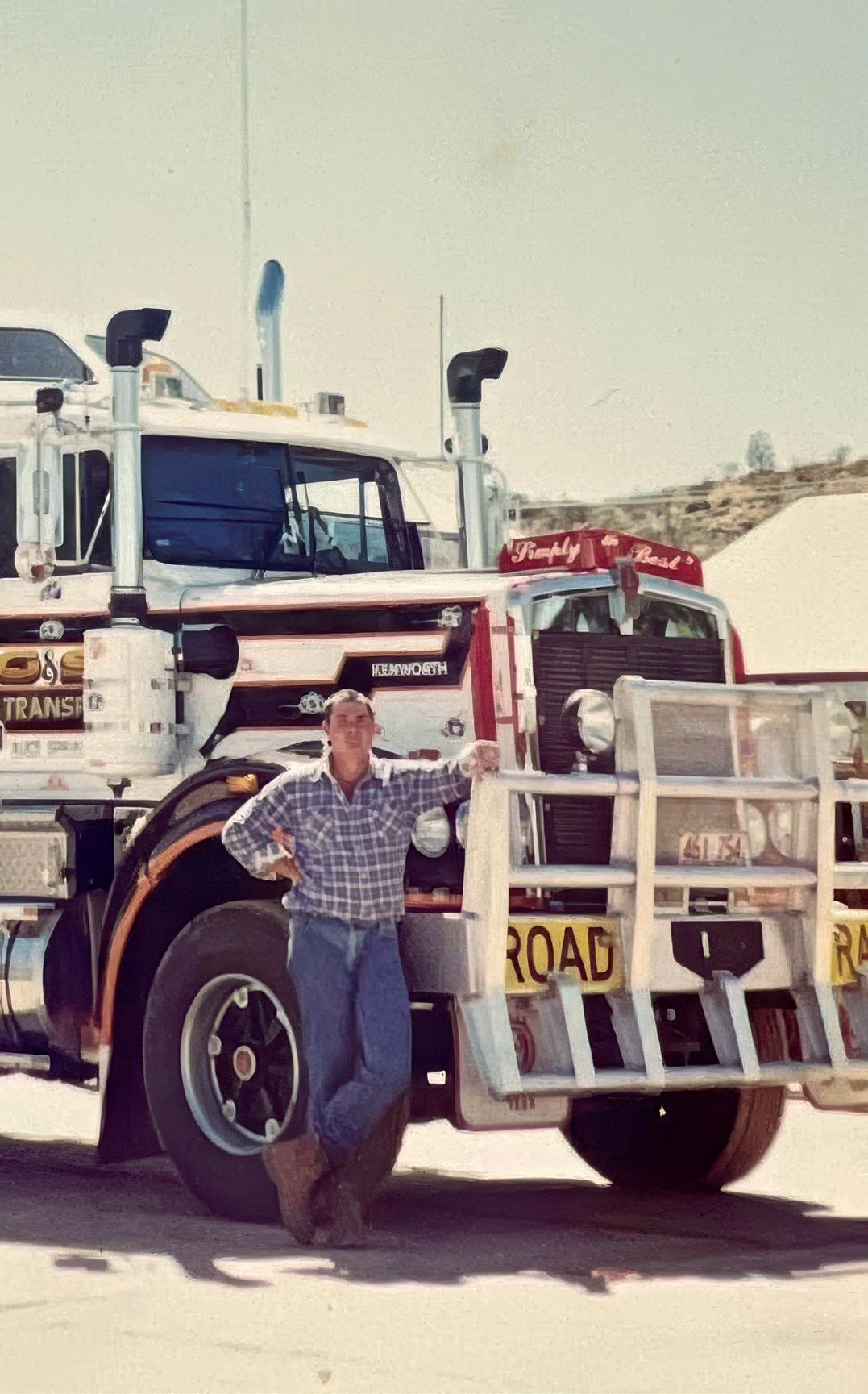
“If you wanted to start a business and stay in business, you had to break the rules. We kept the rates low; we worked too many hours and we did a their dedicated drivers, many of whom have worked with the brothers for 20-plus years.
“Long-distance drivers are very independent people. Once they drive out of the front gate, it’s all on them,” advises Franco. “Because we’ve driven just as much and still work beside them, you talk to your drivers like
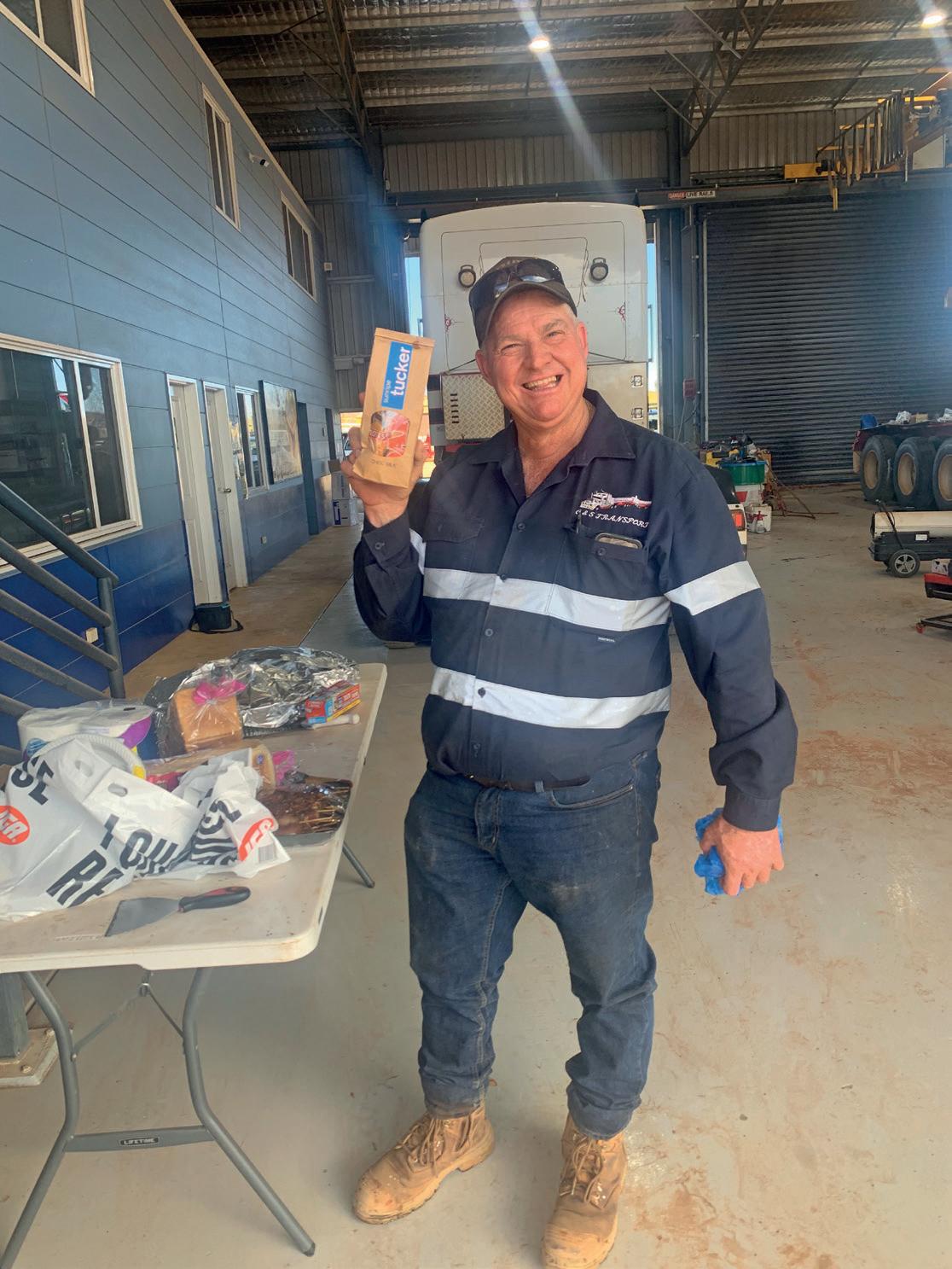

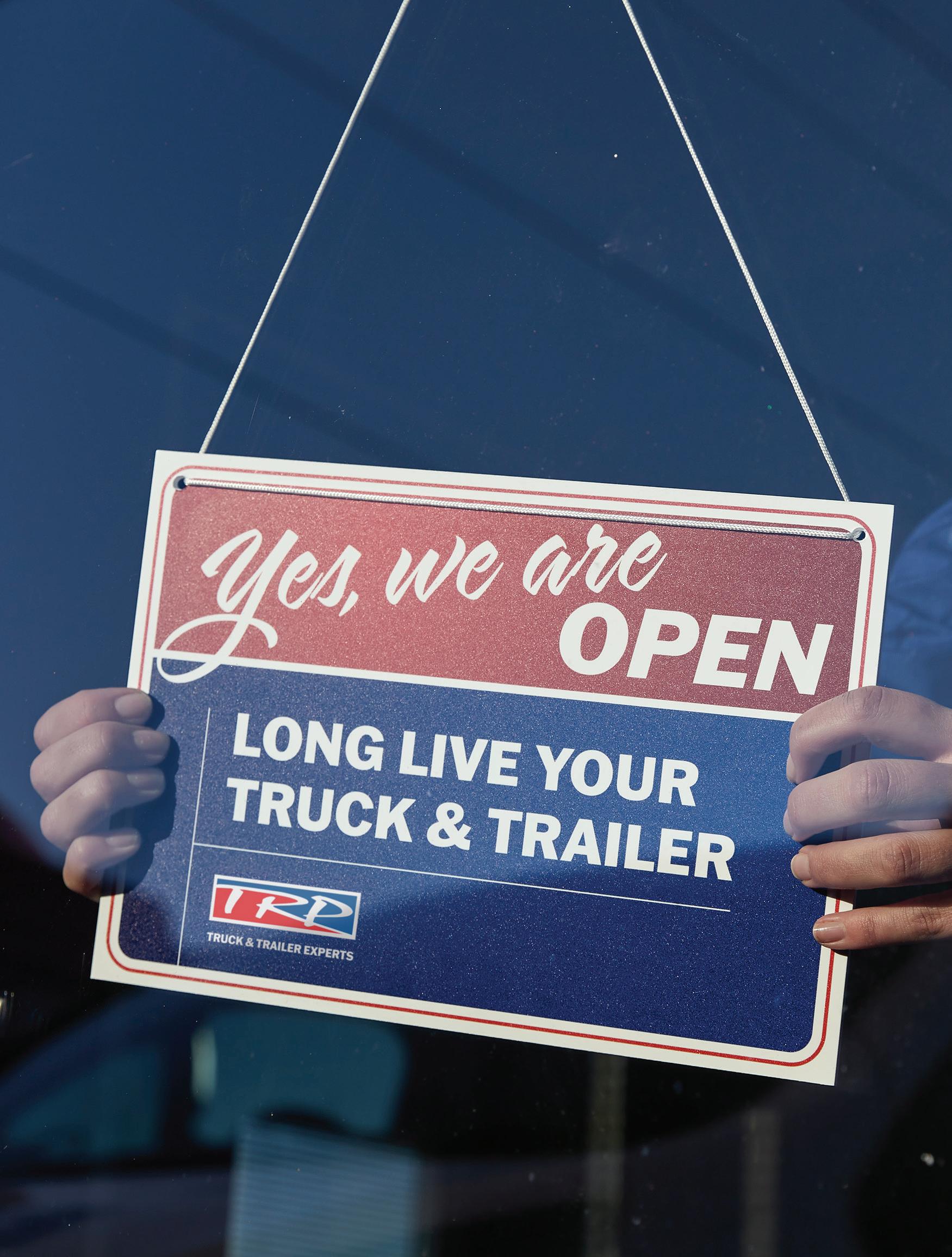
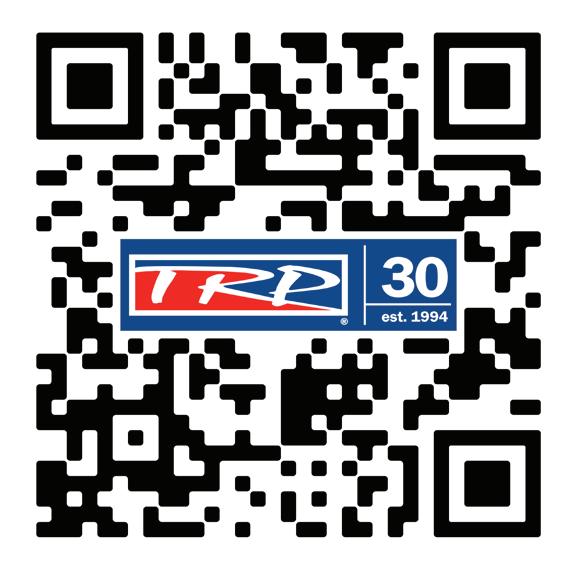
After dad caught the truck racing bug, his two boys were quick to jump on board and the trio is now a force to be reckoned with.
BY DAVID VILE
“I just woke up one morning and had the urge to drive fast trucks! I have got tip trucks, and so forth, and I just thought I would try something different.”
Having that urge back in 2015 has led Rob Fern, from Silvan, Victoria, to now be the lead pilot in the #23 Volvo-White Super Truck which competes in the Hi-Tec Oils Australian Super Truck Nationals.
Rob and his MLC Racing team were braving the chilly north-east Victorian weather for round two of the series recently, with Rob’s sons Lachlan and Riley also hitting the
track in the light truck racing category.
The Volvo-White is the only one of its type in the Australian Championship, battling out on the track against a number of Kenworths, Macks and Isuzus.
European built, the truck had been through the hands of a few different owners, claiming the Australian Championship multiple times before coming into Rob’s possession.
Under the bonnet sits a twin-turbo Cummins Big Cam III which has been set to around 1400 horsepower, coupled with an Allison HD750 automatic transmission.
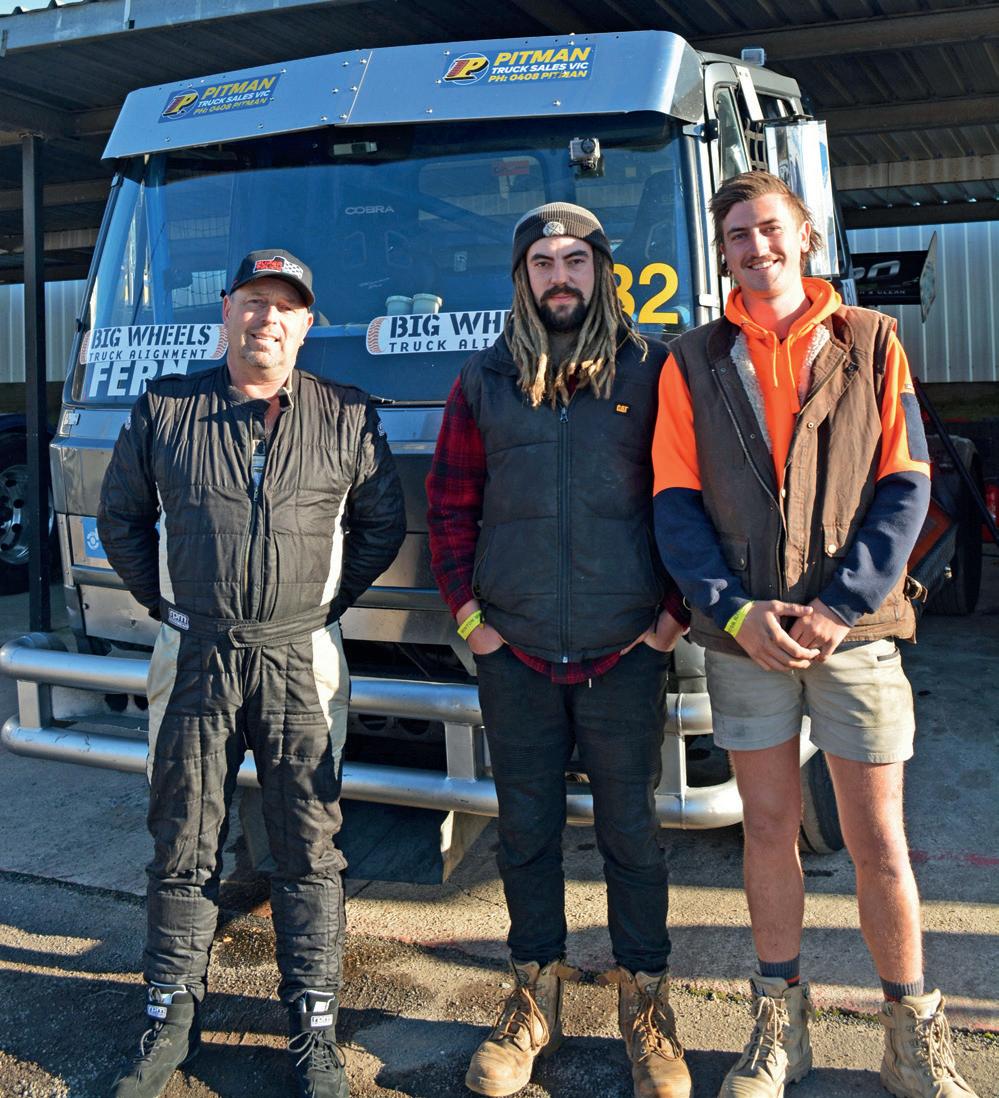
From page 16
TRAVERSING the most remote parts of Australia, Franco has seen many incredible sights, some he says he wouldn’t believe if he had not been there himself.
He recalls one night, when travelling north of Alice Springs, passing a car that had no bonnet or windscreen.
“The fuel pump must’ve
Having not been involved in other categories of motorsport such as car or bike racing prior to buying his race truck, Rob had a steep learning curve.
“About all I could do was get in it and drive it. The previous owner had de-tuned the engine when I bought it, which was pretty helpful.
“At the start it was just a matter of following the other guys around the track, watching and learning and we slowly bought the fuel back on and increased the horsepower,” he said.
“I got some advice from some of the other competitors and away we went learning how to handle it. I don’t use the brakes a lot, I am not a brake wearer as such normally, and that didn’t help me as the faster I got the more I flew off the track on the corners as I wasn’t using them.
“That goes against everything I normally do. The truck is extremely hard on brakes to the point they are glowing red but it’s the only way to get six tonne around a 90-degree corner.”
Also working against Rob to some extent was the fact that the Volvo-White is the only left-hand drive truck in the field, and sitting on the opposite side of the cabin was initially an issue, especially on tracks such as Winton which predominantly feature righthand corners.
“One of the other blokes came up to me and said, ‘you have no idea where the truck is on the track; you’re leaving us a metre (width) and we will take it’. I had to really concen-
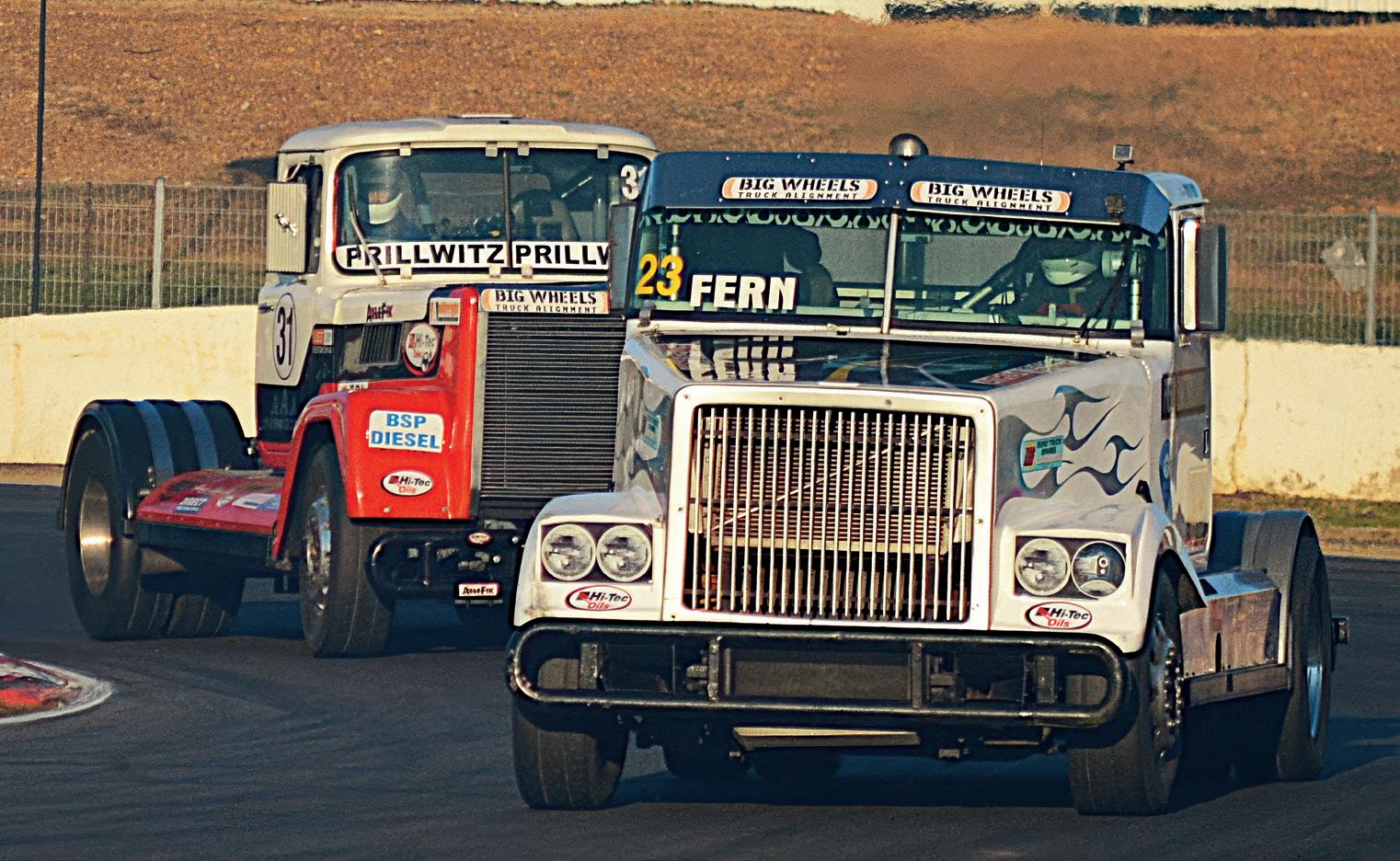
trate on keeping it tight on the corners.”
Working on his race craft and building its competitiveness started to bear fruit, sealing second place in the championship in 2019. Around this time Rob’s son Lachlan also hit the track, initially piloting an Isuzu in the light truck category, and also moving across to the Volvo-White in the teams racing category.
“Lachlan got into that when he was 16 but he soon went quite well with it. The Isuzu still had a manual box. He would jump out of the righthand drive Isuzu with a sixspeed manual into the lefthand drive auto super truck and he just picked it up, driving it really well.
“My other son Riley was about 19 when he thought he might like a go, so he went really well also and came third in the teams championship last year, so he has got the hang of it pretty good too.”
The race truck and all the equipment is hauled to the track by an International Transtar which also has an on-board workshop. Once the chequered flag drops all the competing teams help each other out to keep their trucks
one-on-one time
been buggered because there was a bloke sitting in the engine bay with a five-litre oil can and a fuel line. This thing has got no lights, so the passenger is holding one of those big Dolphin torches.
“They were uppa though!”
Franco laughs, “the driver gave us a wave like nothing was wrong.”
Other times, it was Franco
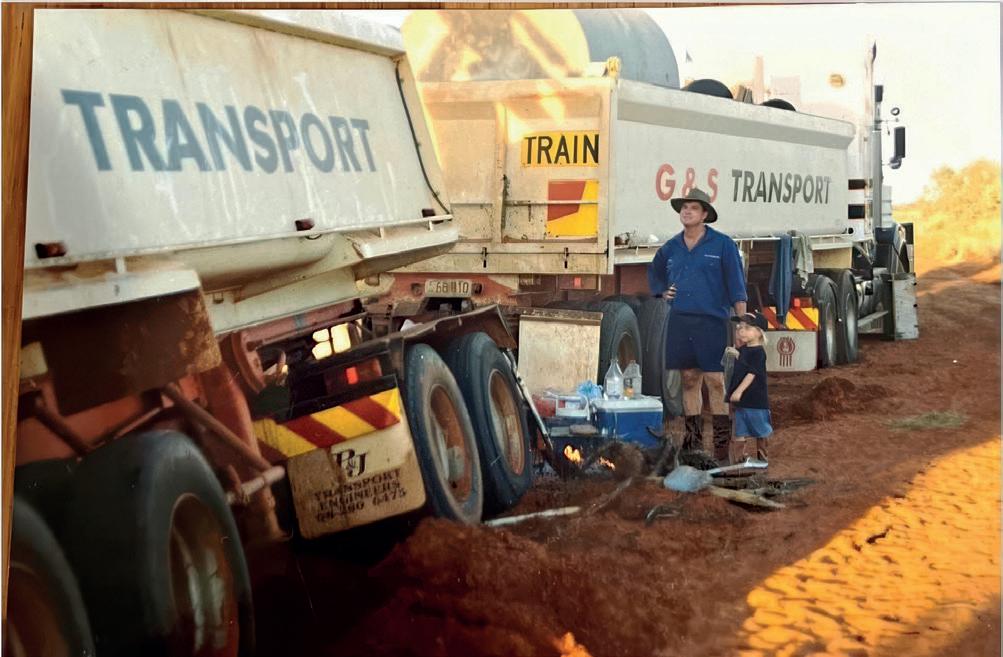
who was responsible for unravelling a tall tale. Having been warned by a fellow operator of the presence of a panther in the area, Franco was quick to pull over when he spotted it in his mirror.
“It was black with a long tail, and it was sleeking along,” describes Franco. “I realised pretty quickly that it was just a weird looking dog.”
To the credit of those who had falsely identified the dog, Franco says, “you could make a panther movie and cast that dog”.
Franco considers himself fortunate to have been able to share these sights with his children, who often accompanied him on the road.
“Because I missed out on so much of the kids growing up, it gave you one-on-one time with them.
“I think the time my kids spent with me in the truck taught them to be observant. I’d tell them, ‘Look at the
tracks, look at what is grow ing around you, look at what is flying around you’.”
Franco’s son, Ryan, cred its this time spent with his dad as his driving force to become a diesel mechanic.
Helping his dad diagnose and problem-solve as early as five years old, Ryan “was always amongst it”.
Franco is incredibly proud to have served, and to con tinue to serve, the transport industry for as long as he has.
“Whether the rail goes out because of weather, or there’s going to be a cyclone, or during Covid, who picks up the slack?
“It’s always the truckies who have to lift.”
In his role as the chair of the advisory committee for the Road Transport Historical Society, Franco advocates strongly for more recognition, not only within the industry but from the wider community.
circulating out on the track.
“If someone is broken down, we make sure they are out there for the next race,” Rob said. “It’s all hands-on deck with tools and so on. We have a pretty decent on-board workshop with the Transtar, so everybody comes and helps themselves, if someone is here at night they come and help themselves and lock it up when they’re finished.”
Back home at the MLC HQ there are a couple of new trucks in the works to help both Lachlan and Riley along and also bolster the numbers in the championship.
“We wanted to build Lachlan a super truck and we are in the middle of that now. It’s an International Eagle which
will have a Detroit in it, and we are looking at replacing the Isuzu with a smaller International S-Line 4300 we have bought out of America. We are going to put a 6.7-litre Cummins in it which we will run in the light truck series.”
The recent trip to Winton was a successful one, with Rob taking out third and Lachlan fifth overall. The big bangers will return to Winton Raceway later again this year, and no doubt the MLC crew will be in the thick of the action.
And finally, for those who may be wondering what ‘MLC’ refers to, Rob Fern replied with a smile: “Midlife crisis….my wife came up with that.”
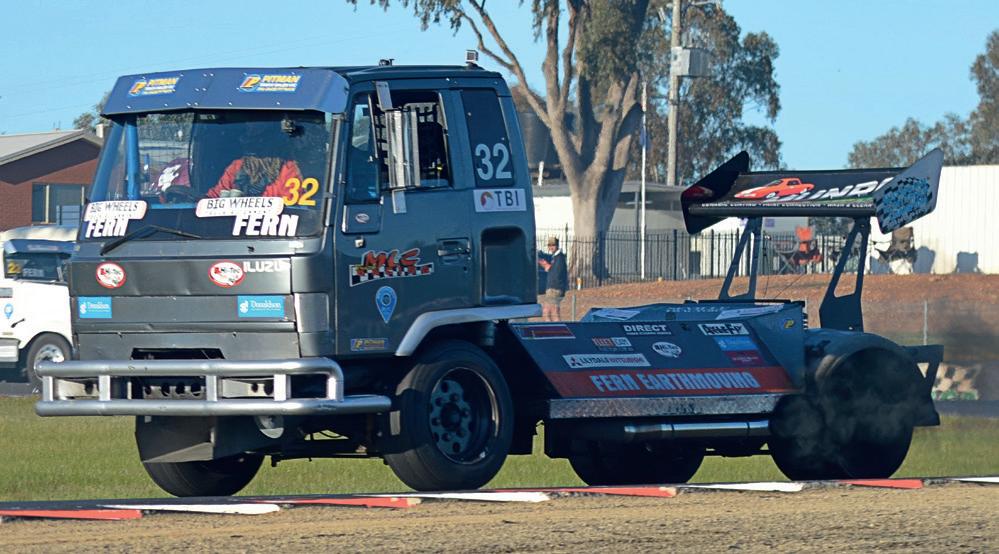
children

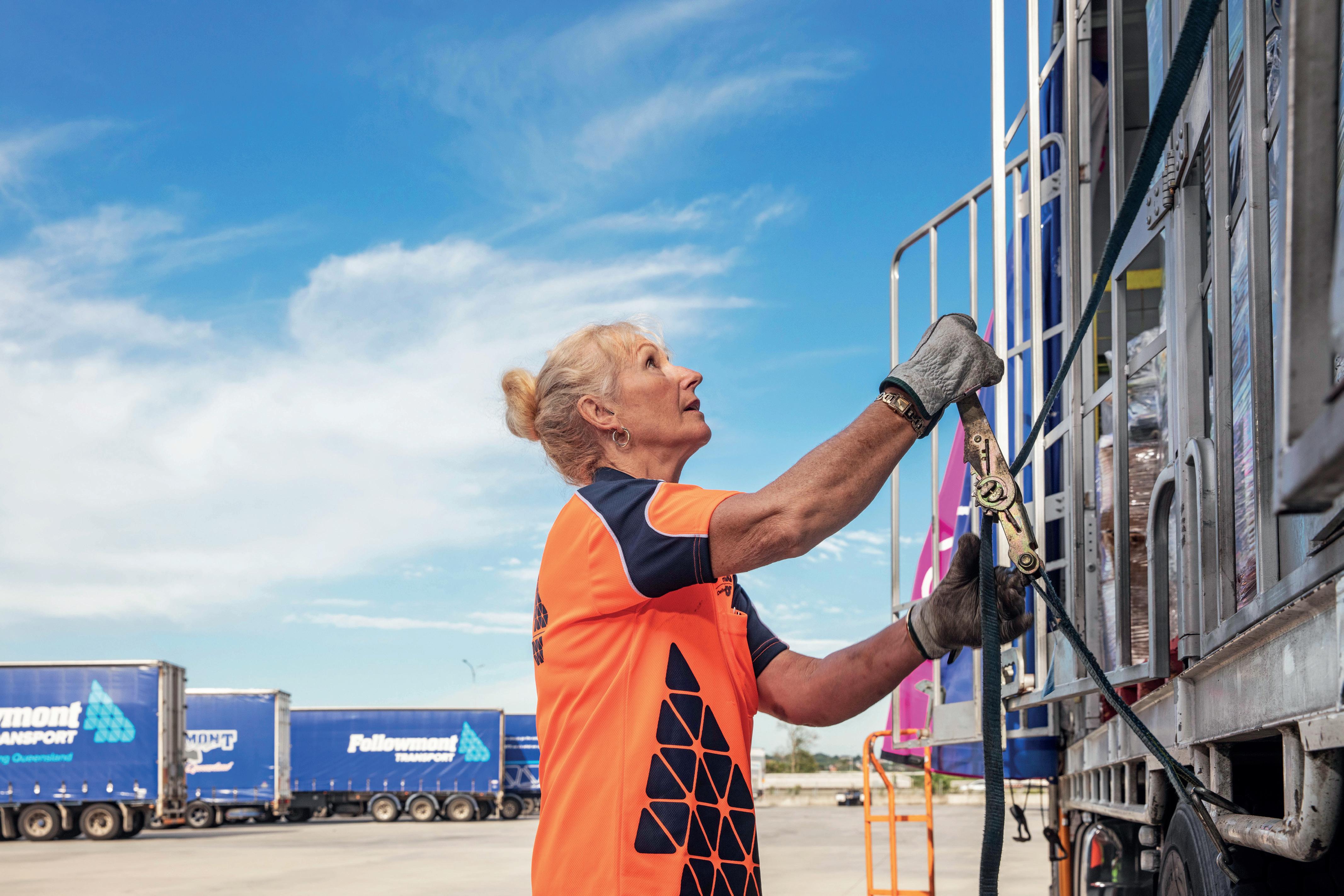
12-page
Careers & Training Special
• Women embrace challenge
• Fostering family network
• Training program success
• Showdown for top technician
• New roles for MC drivers
Pages 19-30
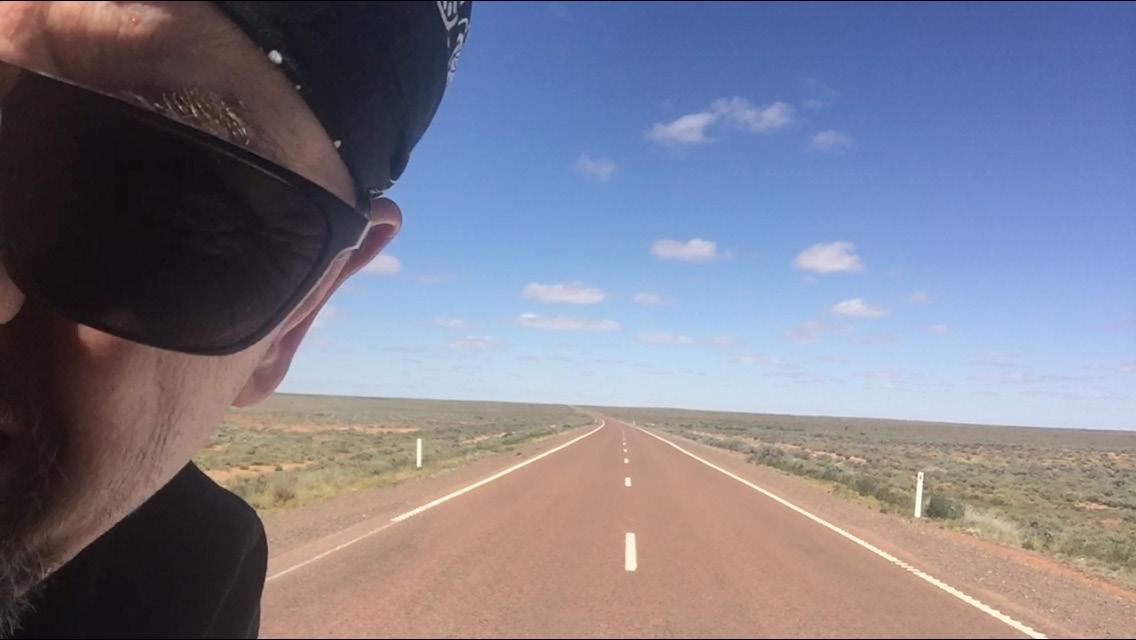





BY KAYLA WALSH
QUBE’S Outer Harbour transport manager Matt Newman has a crew of 17 drivers on the afternoon shift in Adelaide, moving containers from the yard to the Flinders Container Terminal for export.
It’s not a long run – only about 200 metres – but it’s not easy work either, with 16 or 17 trips per driver and about 100 containers in total being moved in eight hours. Still, it’s nothing too out of the ordinary – apart from the fact that 40 per cent of Matt’s team are women, quite a bit higher than the national average of 2 per cent.
To recruit these drivers, Matt has teamed up with Women in Trucking Australia, with WiTA’s CEO and Qube driver Lyndal Denny stepping up to help supply suitable candidates.
“I think engaging with WiTA to recruit drivers has been the best thing I ever did,” he told Big Rigs.
kids aren’t coming out of school wanting to enter it.
EMPLOYERS NEED TO RECOGNISE THAT WOMEN DON’T NEED ANY SPECIAL FAVOURS, WE JUST NEED THAT RESPECT AND TRAINING, AND FOR THE WORKPLACE TO BE FAIR AND EQUAL.”
LYNDAL DENNY
come and work with us for two weeks and it’s not what they want to do, and they’ll leave.
“Drivers aren’t exactly a dime a dozen, so working with WiTA has turned out really well for us.”
Lyndal runs the Foot in the Door program, a collaboration between WiTA and the NHVR which helps women get a start in the transport industry or advance their careers with further training
them up, so she deserves a lot of credit.”
Lyndal said that not everyone who is interested in the Foot in the Door program makes it through.
“They go through a rigorous assessment,” she said.
“Sometimes they are not quite ready, so we talk to them about that and they can try again at a later stage when they meet certain criteria.
“They need to have the right attitude to pursue truck driving as a career.”
Matt is very happy with the standard of drivers Lyndal has supplied to Qube.
“The PM shift have got a pretty big job,” he said. “We’re relying on them to move 90 per cent of our exports to Flinders.
“When they are moving 100 containers in eight hours I can’t complain – they are a great team.”
He shared an example of one driver in particular, 49-yearold Gail Ritchie, who has come a long way since she
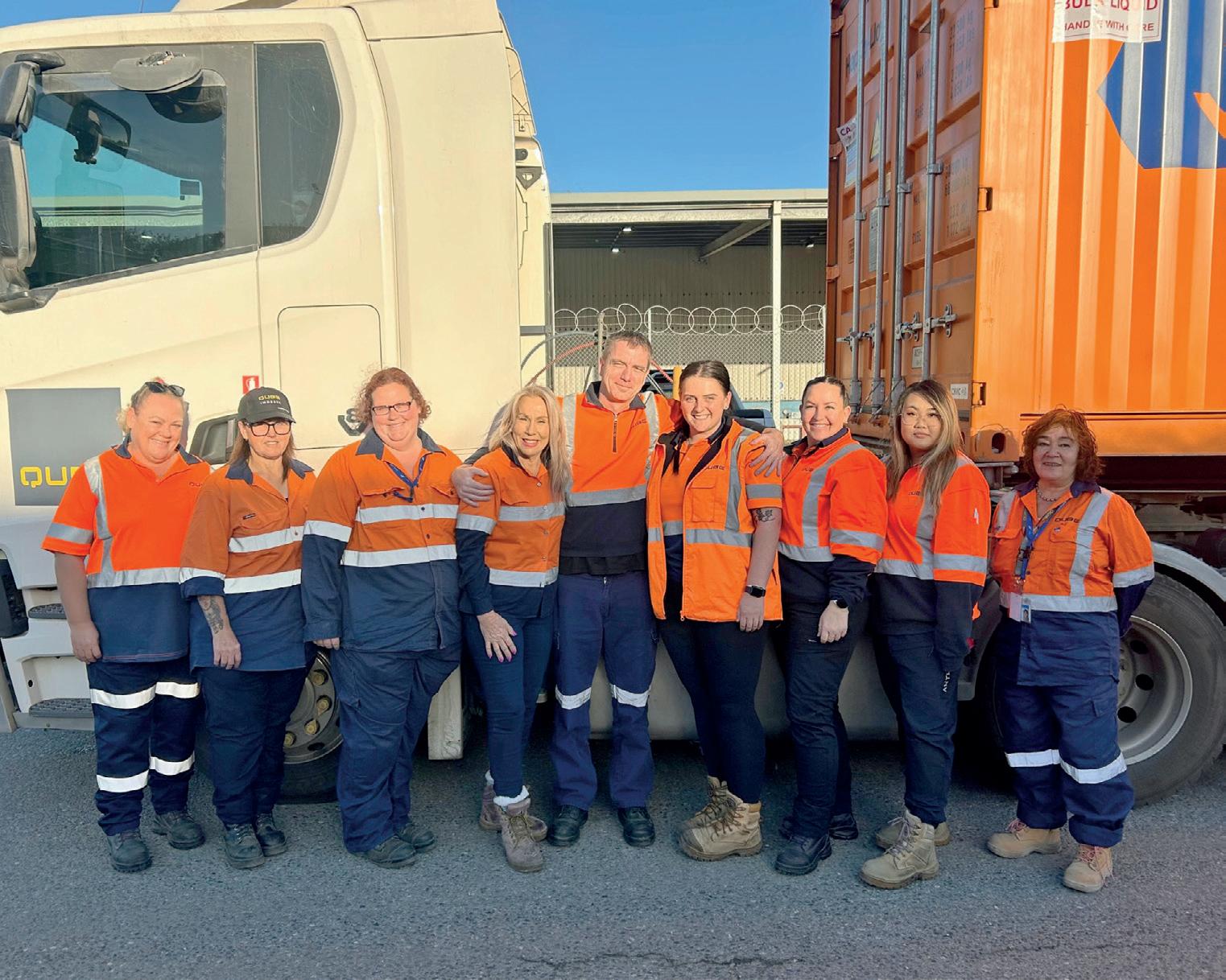
Gail was also very complimentary of Matt when she spoke to Big Rigs recently.
“Matty Newman at Qube is wonderful – he’s given me a great opportunity,” she said.
set and I was off doing that myself.”
with the number of deaths on the roads.
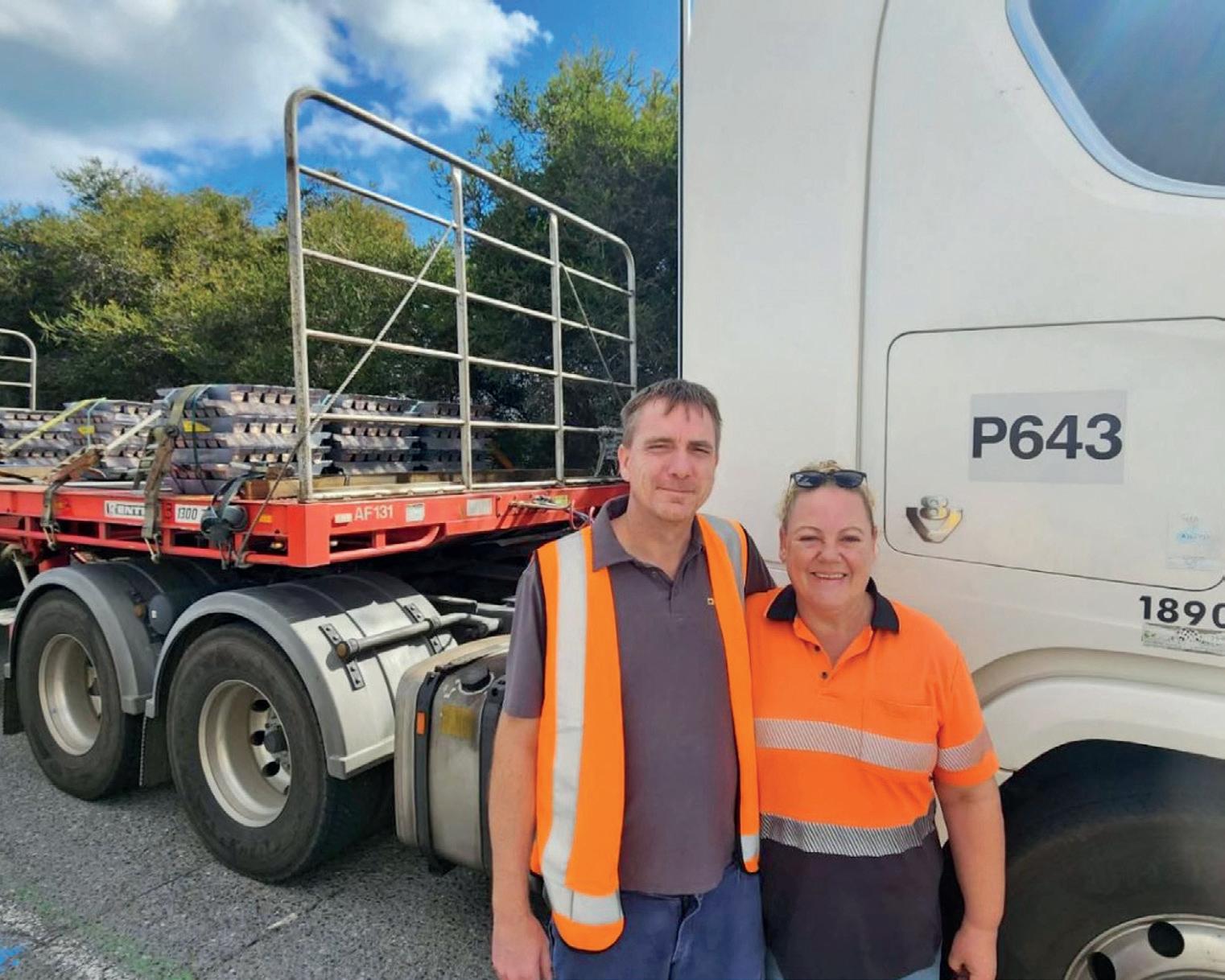
“He’s a very fair boss and he actually listens. He’s been the make or break for me in getting into this industry.
“She came to us as a HC driver with no experience,” heples every night of the week.”
“I told Matty I was interested in doing the lead run to Port Pirie, so he sent me out as a passenger.
“Then I had my own trailer
Although Lyndal is vocal about her goal of achieving gender parity in the transport industry by 2050, Matt has a simpler approach.
“I just need bums on seats and trucks moving, mate,” he said.
“You’re only as good as your staff, and I’ve got great staff.”
At this, Lyndal chimed in:
“With the freight task increasing as it is, there are issues
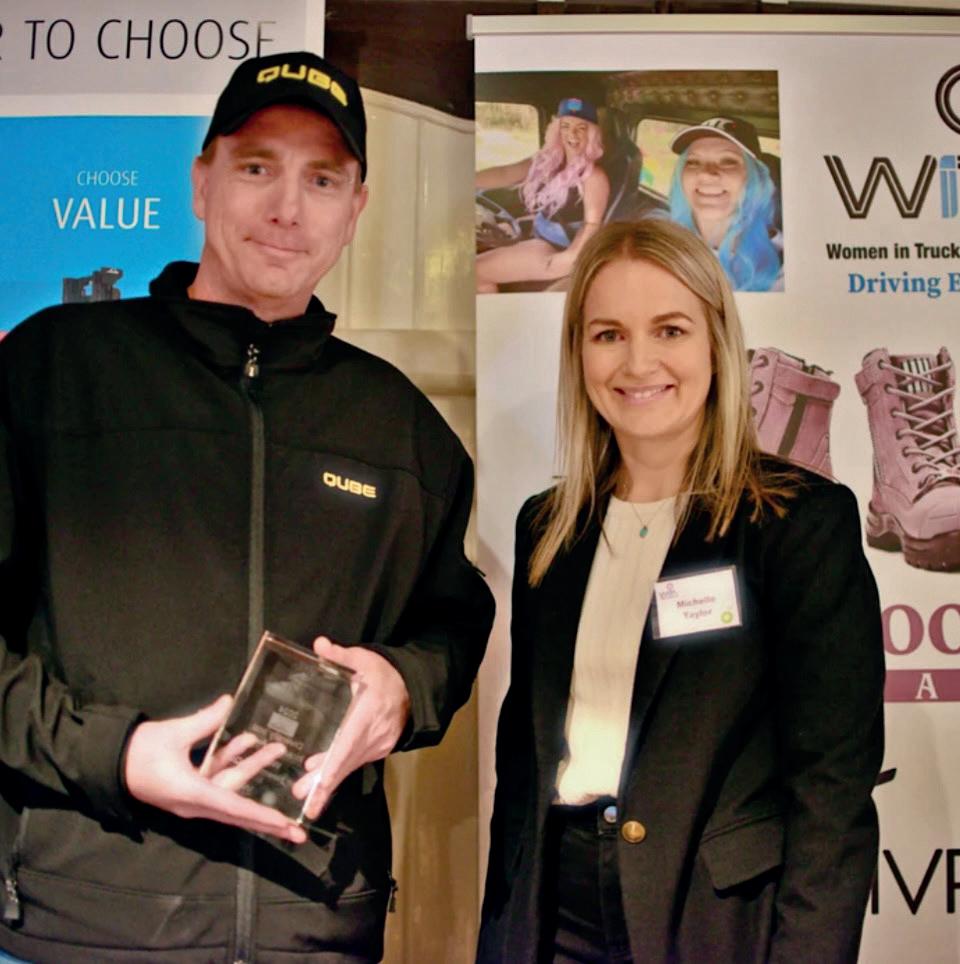
BY KAYLA WALSH
THE world of finance might seem like a far cry from trucking – but swapping banking for bitumen turned out to be just what Shannon Fallows needed.
Shannon was living in Sydney, working as a customer excellence associate at ING Australia, when he decided he wanted a change.
“I’m from Adelaide and I wanted to move back home, so I resigned from my job and relocated,” he said.
“When I was looking for a new job, I wanted something different. I didn’t want to be sitting in an office all day, I wanted to be outside.”
Shannon applied for a few different roles, including one at a train company and the defence forces.
But when he was offered a traineeship with Hanson Australia, he jumped at the chance to get behind the wheel of a truck.
THIS SORT OF PROGRAM GIVES PEOPLE LIKE ME - OR YOUNG PEOPLE, OR PEOPLE RETURNING TO WORK AFTER A BREAK - A GREAT OPPORTUNITY TO JOIN THE TRANSPORT INDUSTRY.”
SHANNON FALLOWS
Now he drives a concrete agitator, delivering concrete from the Hanson plant to customers throughout the Adelaide metropolitan area – and he’s really enjoying it so far.
“I like being on the road, and being in the truck by myself,” he said.
“You don’t really know what each day will entail until you’re doing it, so there’s a lot of variety.”
Shannon had never driven a truck before.
So Hanson paid for him to
get his licence as part of their trainee driver program.
He was paired with one of their drivers for four weeks as he learned the ropes.
“At first, they would only let me drive with an empty truck, like when we were on the way back from a job,” he said.
“Then as my confidence grew and they could see that I was able to drive safely, they would let me drive with a smaller load and gradually I built up to driving with a full load.
“In my last week I was paired with someone who assessed me and signed me off as competent, and they put me in a truck by myself.”
Shannon said the trainee program was a great way for him to improve his skills under supervision.
“In trucking, some mistakes can be life-threatening, so you have to be really careful,” he said.
“The people I was paired with had years of experience.
“One of them had 30 years behind him. They would stop me straight away if I did something that might be dangerous, and they might take over or help me.
“We would debrief at the end of the day and go through areas where I might be struggling, and they would give me guidance.”
Shannon thinks trainee programs like Hanson’s are a fantastic way to recruit more drivers.
“I’m 43 – most people, when they get to my age, might feel like they are stuck in their careers and can’t change.
“This sort of program gives people like me - or young people, or people returning to work after a break - a great opportunity to join the transport industry.”
To learn more about the current traineeship opportunities at Hanson, visit hanson.com.au or contact one of the company’s regional offices.
“We need professional drivers who have been trained correctly, and I truly believe that female heavy vehicle drivers are the answer to that.
“A lot of these girls are coming from farms and rural areas, they are happy to get down and dirty and muck about with diesel.
“They are quite resilient even before coming into the industry and employers need to recognise that women don’t need any special favours, we just need that respect and training, and for the workplace to be fair and equal.”
As a token of appreciation for his work, Matt was awarded the first ever Diversity and Inclusion Award at WiTA’s Toots Awards in July.
“I was quite happy and proud to get that award,” he said. “And I never say I’m proud of myself!”
Lyndal added that male allies like Matt are key to boosting female driver numbers and making women feel welcome in the industry.
“We can’t do what we’re doing without the boys,” she said.
“That’s the bottom line.”
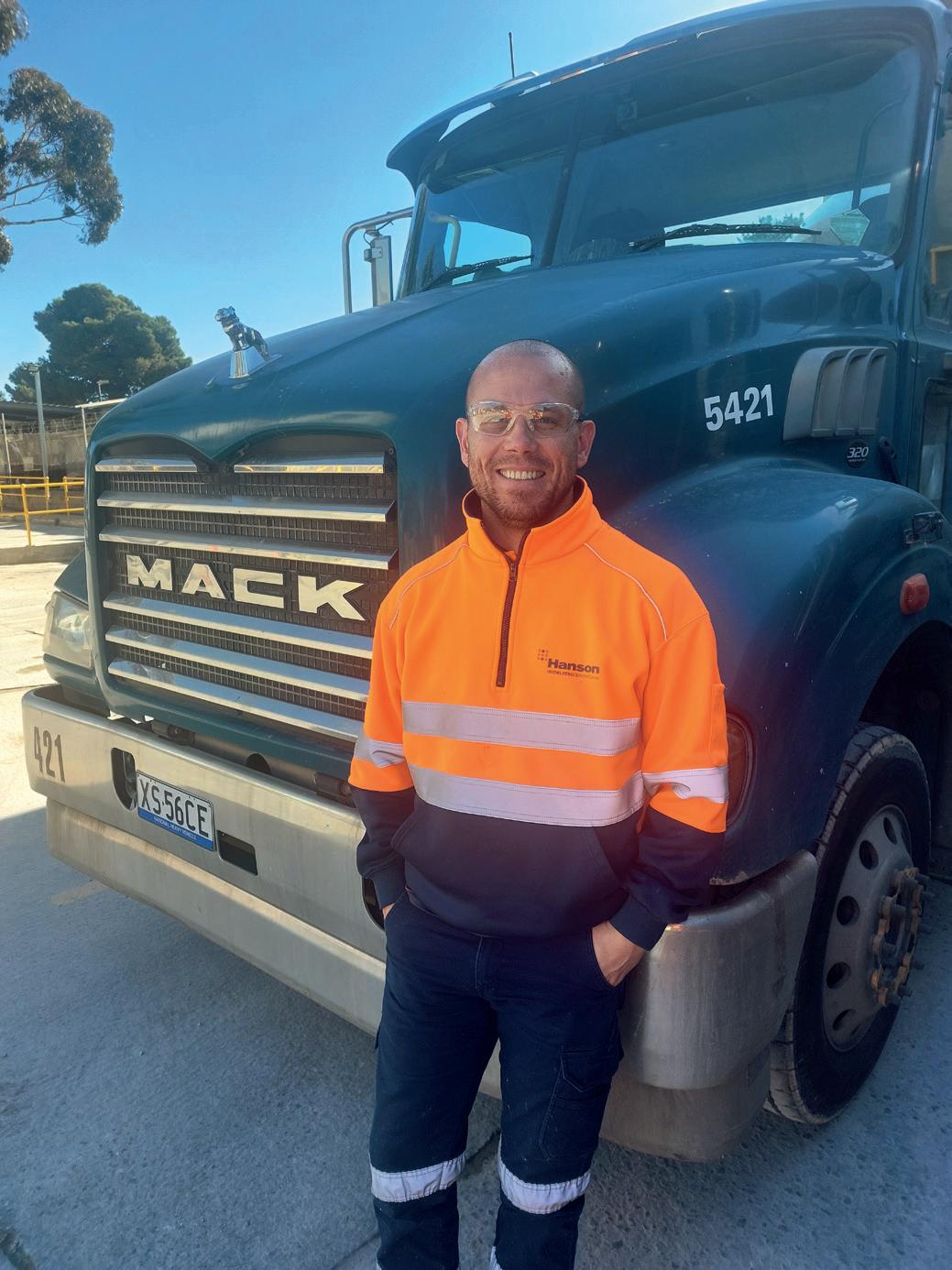
MORE than three years since its launch, the TAFErun Heavy Vehicle Driving Operations Skill Set course continues to lead the way in recruiting new faces into the industry in WA.
The six week-long, fee-free program, the brainchild of the Western Roads Federation (WRF), boasts an impressive 79 per cent completion rate.
In the Perth metropolitan area alone there has been 1091 students sign up and, at the time of writing, that equates to close to 800 new employees (75 per cent of whom are drivers), says course director and WRF consultant, Neil Savage.
“That primarily comes from the Western Roads Federation’s links back into industry,” Savage said.
The state government-backed course has been so successful it has now been replicated across the state, from the southern region to the north.
Savage said demand from industry for recruits continues to grow.
“If you go on to Seek for an HR job in Perth, or WA, there’s about 2500 jobs a day available,” Savage said.
“We can’t get enough drivers. If you’re willing to work, Western Roads Federation can definitely get you a job.

“I have employers asking, ‘Have you got graduates ready? Where could I use them? Have you got anyone that might be suitable for this? I need to upskill someone, who can I have?
“We’ve created that pipeline at the other end now.”
As an example, Savage cited the course underway at the time of writing at Muresk. He’s already fielded 10 job offers for the 18 students before they’d sat their first test.
“It can be anything from a hotshot driver to a ‘dumpy’.”
Savage said the only fees that students need to pay are for the licences; $90 for the forklift, and $83 for the HR auto.
“They also get six units which take them from a ‘no-experience’ driver to probably a foundational employee.”
Salvage stresses however, that standards are very high when it comes to passing the HR program which consists of eight units, down from the original 18.
Only half of each intake will pass the units on the first attempt.
Working closely with the Transport Workers’ Union in the state, the course also now has a safety-first focus, concentrating squarely on what
Savage calls the foundational employment skills.
“So, chain of responsibility [CoR], fatigue management, work, health and safety in the workplace, looking at loading and unloading a truck.
“Also we provide training for a forklift licence.
“How it works is that if you don’t pass your HR, we get you into a ground level job.
“They can either come back and do some more lessons, or they can go to a private RTO [registered training organisa tion].”
Savage stresses that the course isn’t just about pro viding a truck licence.
“We are trying to make them understand their place in the CoR and their respon sibilities within the chain.”
Savage is also proud of the fact the course appeals to a wide demographic, from those looking to break into the job market for the first time, to others looking for a completely new career change.
“If you look at the way transport industry histor ically got its employees, it was because your dad was a driver, or your brother was a driver, but that stops, right?
“No one goes out to Year 9 students and says, ‘do you want to be a transport driver?’
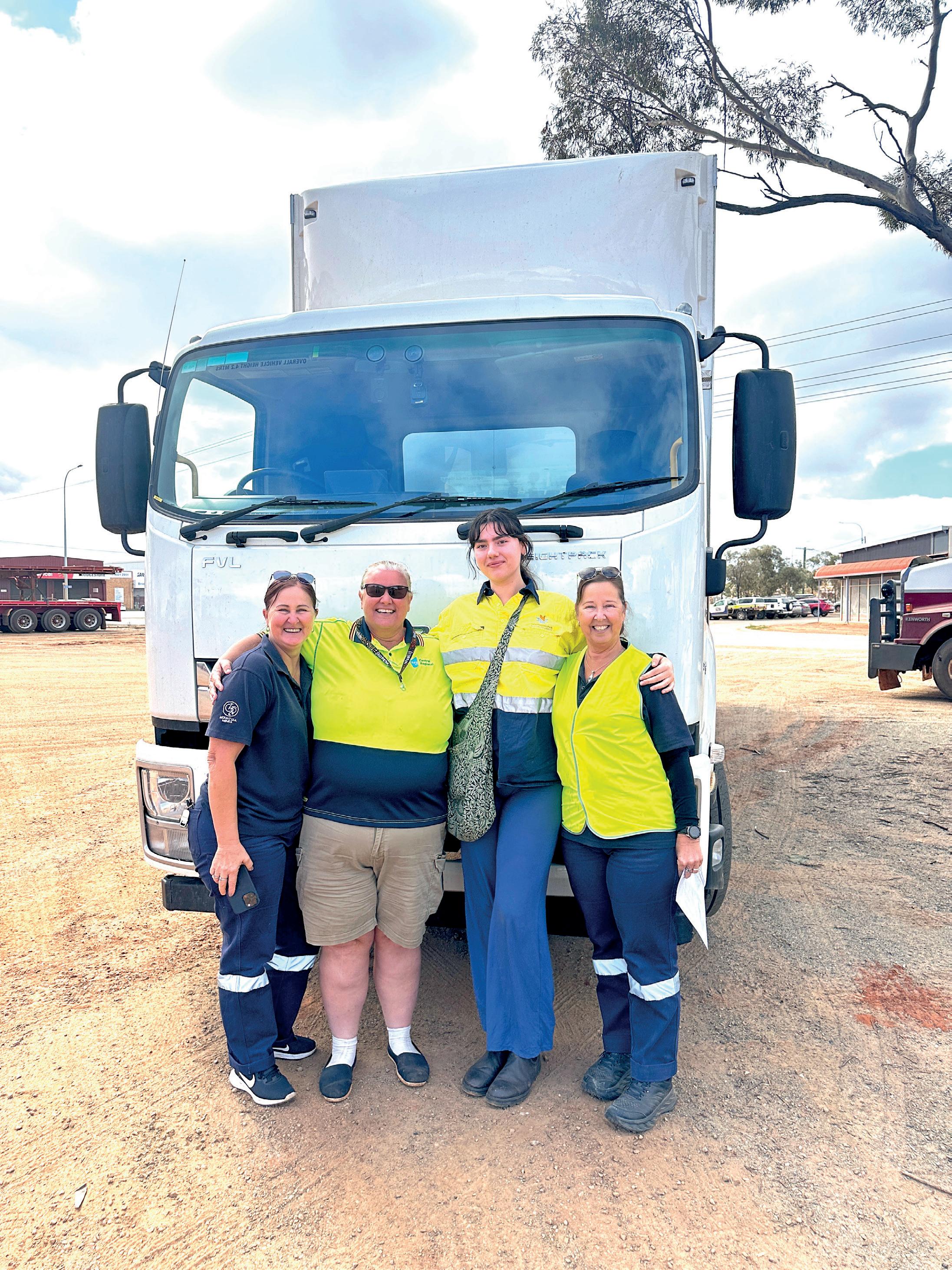
73 Formation St, Wacol
Easter Group, located in Wacol, provides time sensitive road transporting solutions to many companies throughout Queensland, New South Wales, South Australia and Victoria.
We are a family owned business, operating since 1976. We currently have the following positions available:
(Brisbane based only)
You will be required to work on a rotating roster including Days-Nights-Weekends Previous Operations experience preferred.
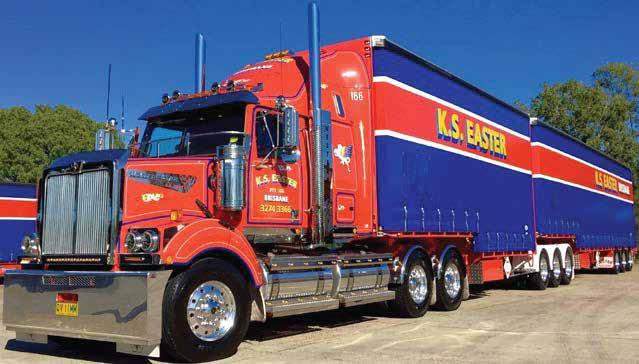
(Brisbane, Sydney, Melbourne and Adelaide Based)
Come and work for us as we are committed to:
• Training and further education
• Your safety
• Maintaining an impressive Fleet
On offer are permanent full time and roster positions including paid leave entitlements and public holidays. Drivers will need to be available to be scheduled for work falling across the 7 days of the week.
The successful Applicant will:
• Hold a current MC licence (minimum two years)
• Have knowledge of the HVNL and Load Restraint
• Be professional
• Be reliable
To apply for the Operations/Driver positions please contact Operations Manager or by emailing your resume to
(Brisbane based only)
To apply for Mechanic positions please forward your resume to Workshop Manager via email to employment@kseaster.com.au

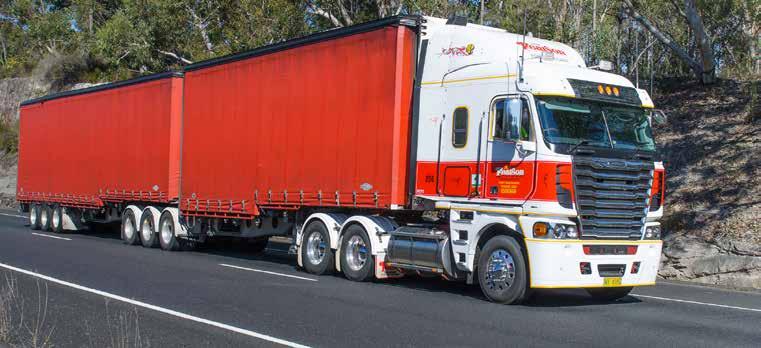


BY ANDY HUGHES
MY grandfather was a fantastic role model, he taught me how to think, and he had a knack of cutting through the BS. He always said you should keep things simple. I’ve generally struggled with this principle, but I’ll give it a crack.
Driver training is fundamentally a road safety issue. Enhanced driver training
safer roads. However, there will be a bottleneck due to a shortage of professional educators – trainers who understand the industry, possess strong communication skills, and are eager to pursue further study. We need to work together across jurisdictions to identify and support the development of more highly skilled driver trainers to help fill the gaps.
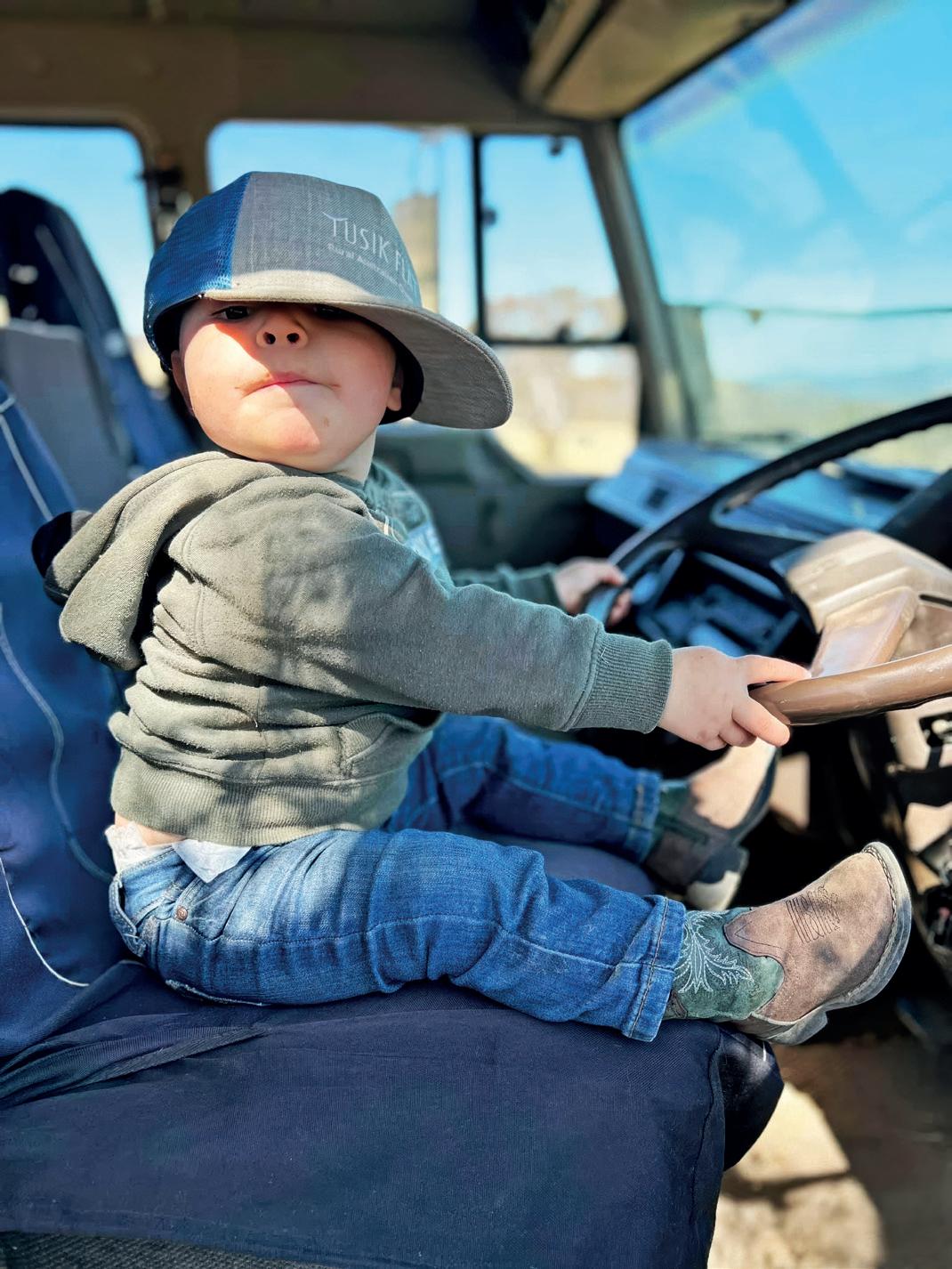
about driver shortages, training standards and an increase in dangerous driving behaviours. As a nation, we need to re-evaluate heavy vehicle training and licencing on three fronts: lifting minimum standards, harmonising training and assessment standards across jurisdictions, and promoting a culture of competence over tenure.
Quantifying the return on investment of enhanced driver training policy and programs is challenging, but its importance is undeniable. It builds workforce capacity, keeps freight moving, and saves lives. Win, win, win.
Pop used to say, “Get your facts right before you start flapping your lips,” so here goes:
• Demand for road freight and public transport is increasing greatly: Australia’s road transport activity has grown over the past 35 years resulting in an eight-fold increase in road freight. And road freight is projected to grow by 77 per cent to 2050 (NFDH Navigating Australia’s Freight Future).
• Australia’s highways and busy city streets are very dangerous places to work, and therefore require a special skillset: Transport (truck drivers), postal and warehousing accounted for 7.8 fatalities per 100,000 workers in 2020. It’s one of the deadliest sectors in Australia, (Safe Work Australia, 2023).
• The human factor is the most common cause of
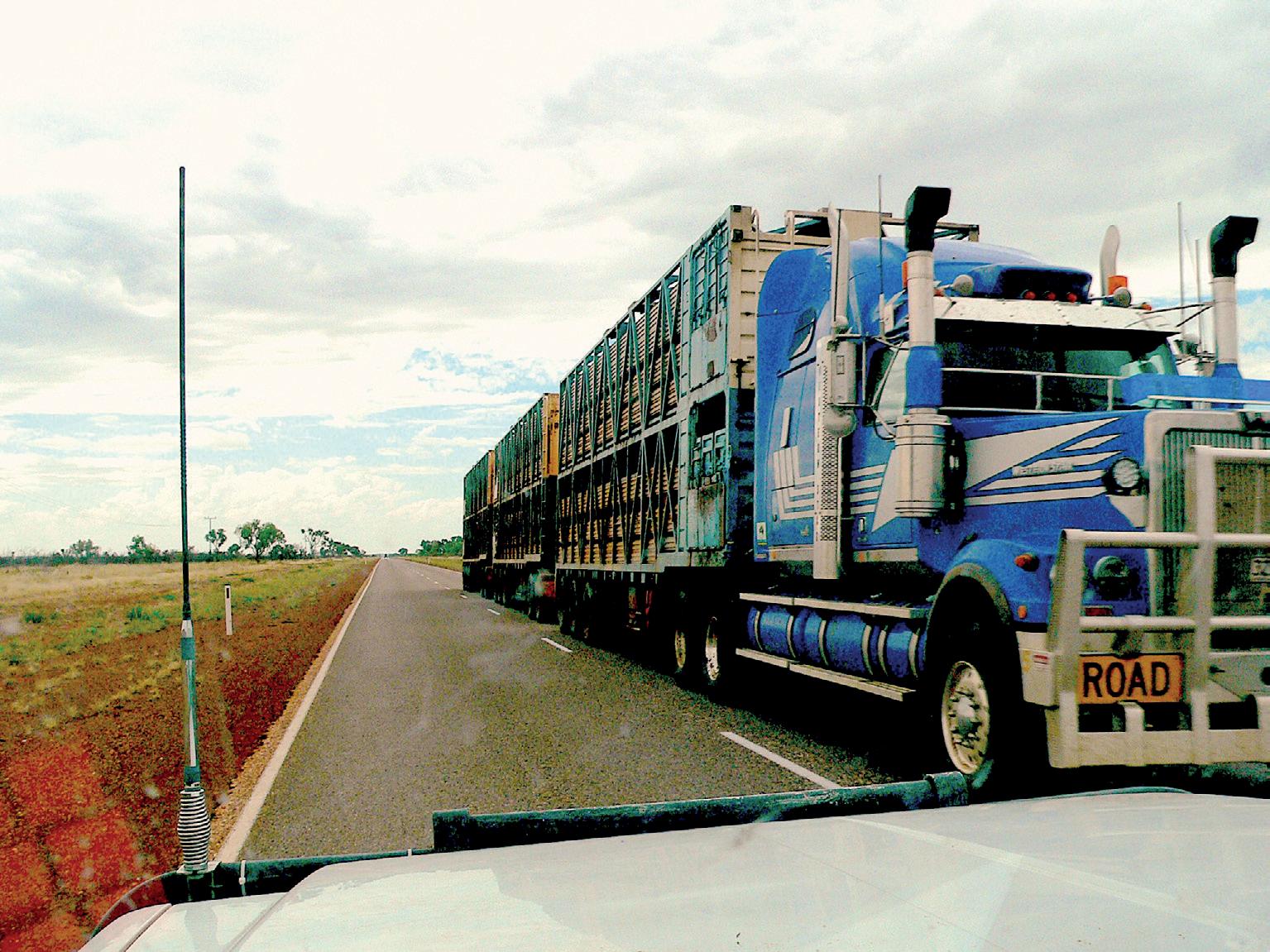
road-related incidents. Risky behaviour, fatigue, poor attitude, and driver distraction are the worst offenders: The proportion of serious crashes attributed to human-factor related causes increased to 63.5 per cent of all losses (NTI, NTARC Major Crash Investigation).
• We need an army of job-ready truck and bus drivers to keep Australia moving: Over 26,000 drivers are needed to fill the current gaps. This is not just a crisis for the trucking industry, it’s a crisis for the national economy (IRU and NatRoad, 2024).
• Competency based assessment should be prioritised over a tenured licencing pathway: Heavy vehicle licensing should
prepare applicants by ensuring that they receive adequate behind the wheel training (VTA, Prioritise training over experience, 2022).
Potential candidates are hard to find. Heavy vehicle driver training and assessment requires a specific mindset, a couple of Certificate IV qualifications, a clean police report, an understanding of adult learning principles, and extensive industry skills and experience.
My grandfather would proudly say, “Nobody taught me how to drive, I worked it out myself.” I suspect I’m lucky to be here as a result.
Providing someone a truck licence offers them a career opportunity, and comprehensive training equips them with the extra knowledge and
skills required to survive and thrive.
I don’t claim to have all the answers to the issues that I’ve outlined in this editorial, but I do know that becoming a driver trainer is the most rewarding career choice I’ve ever made.
If you’re interested in becoming a truck or bus driver trainer, we can provide advice and support. Contact us at hughestraining.com.au.
Andy Hughes is the director of Hughes Training Group Pty Ltd. With Diplomas in Vocational Education and Training, and over a million kilometres driving heavy vehicles all over the country, he is well placed to help you become a professional driving instructor. He also has years of truck (and bus) driver training experience.
AS many industries including transport cry out for waves of new workers, TAFE Queensland is doing its part to attract and train the next generation of the workforce by providing pre-apprenticeship training to high school students to drive them towards a trade future.
Transport faces one of the most critical challenges for
workforce development, given the older demographic of its workers, as it looks to fill not only vacant roles but soon-tobe vacant roles.
Technicians to keep heavy automotive fleets on the road are crucial to the ongoing success of Australia’s transport industry, and apprentices will play a key role in supporting this side of the sector.
As the largest training provider in Queensland and the Large Training Provider of the Year at the 2023 Australian Training Awards, TAFE Queensland is doing everything possible to increase the number of apprentice candidates for the industry.
TAFE Queensland – SkillsTech business manager of Heavy Automotive Training
David Jenkinson said that in addition to training more than half of the state’s heavy commercial vehicle apprentices, TAFE Queensland is driving high schoolers towards the industry with pre-apprenticeship TAFE At School training.
“TAFE Queensland is the provider of choice for the heavy automotive and transport industries, and as the largest training provider in the state we also want to help provide a pipeline of workers for the industries we service,” David said.
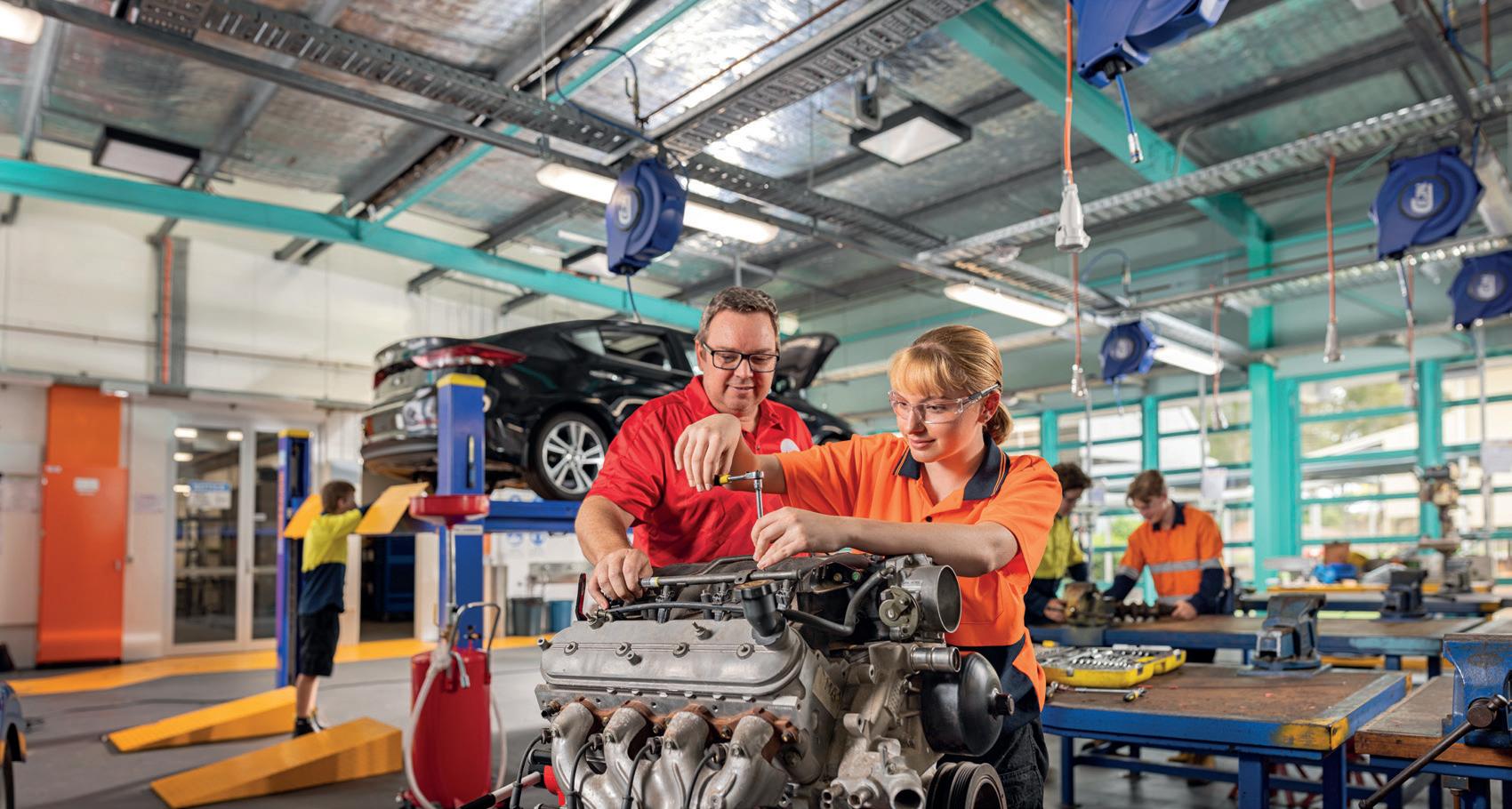
“For TAFE At School students, we are offering the Heavy Vehicle stream of the Certificate II in Automotive Vocational Preparation (AUR20720) across many of our campuses, including our largest at Acacia Ridge.”
“This gives students experience and skills working on heavy commercial vehicles, and often is the first time they have considered pursuing a career in this side of the automotive industry,” he said.
There are more than 80
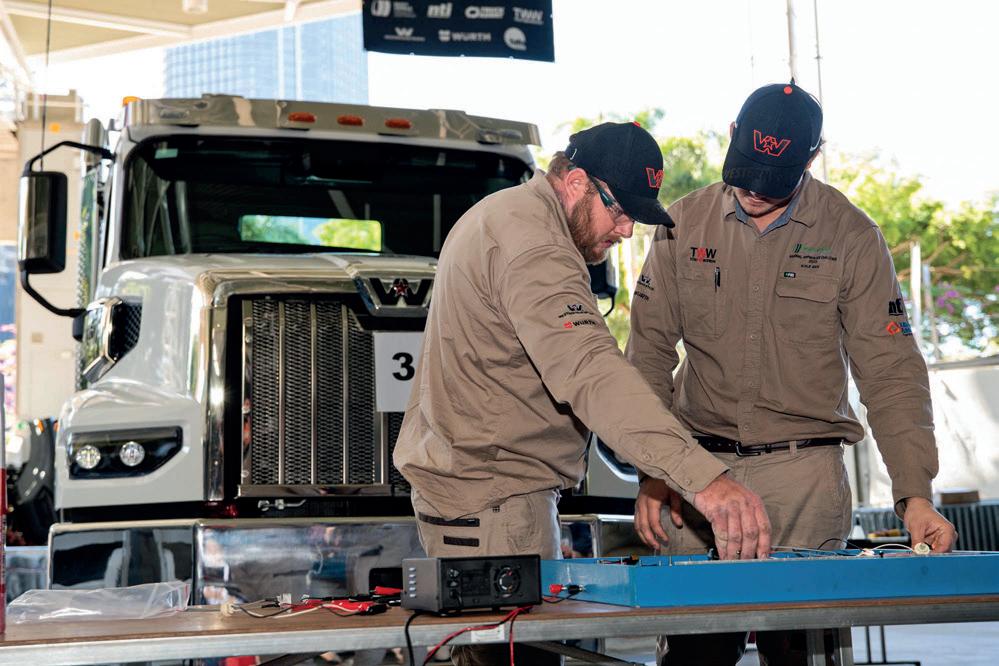
TAFE At School students enrolled in the heavy vehicle pre-apprenticeship at TAFE Queensland’s flagship trade training facility at Acacia Ridge, and many more across Queensland that are taking the first steps to joining the transport industry as heavy vehicle technicians.
Pre-apprenticeship training at TAFE Queensland provides students with the basic knowledge needed to hit the ground running in their industry and with hands-on
experience that helps them decide if this is the career for them before embarking on an apprenticeship. TAFE Queensland also offers training for those further along in their career, with many post-trade courses on offer for various industries to help specialise or progress into new and exciting roles. For more information about pre-apprenticeship training, visit tafeqld.edu. au/pre-apprenticeships or call 1300 308 233 today.
AT Followmont Transport, we believe that every journey matters, not just in the distances we cover, but in the relationships we build and the communities we serve.
Founded in 1984 as a two-man, one-truck operation, we’ve grown into Queensland’s largest family-owned transport company, employing over 1000 people across two states. But despite our growth, our commitment
more than just a job, Followmont might be the family you’ve been searching for. A place where you’re valued, supported, and encouraged to grow. Our success is driven by the dedication and hard work of our team – people who live and breathe our core values of Service, Unity, Passion, Integrity, Innovation, and Care. These aren’t just words on a wall; they guide every-
you’re an essential part of a team that works together to deliver life-saving medication, essential household goods, and more, to every corner of Queensland and New South Wales.
We’re proud to operate 24 owned depots in major cities and rural towns, ensuring that our service is always reli able and close to the commu nities we serve. This extensive network allows us to offer our drivers stable, consistent work with the opportunity to be part of something bigger –helping to keep the heart of our communities beating.
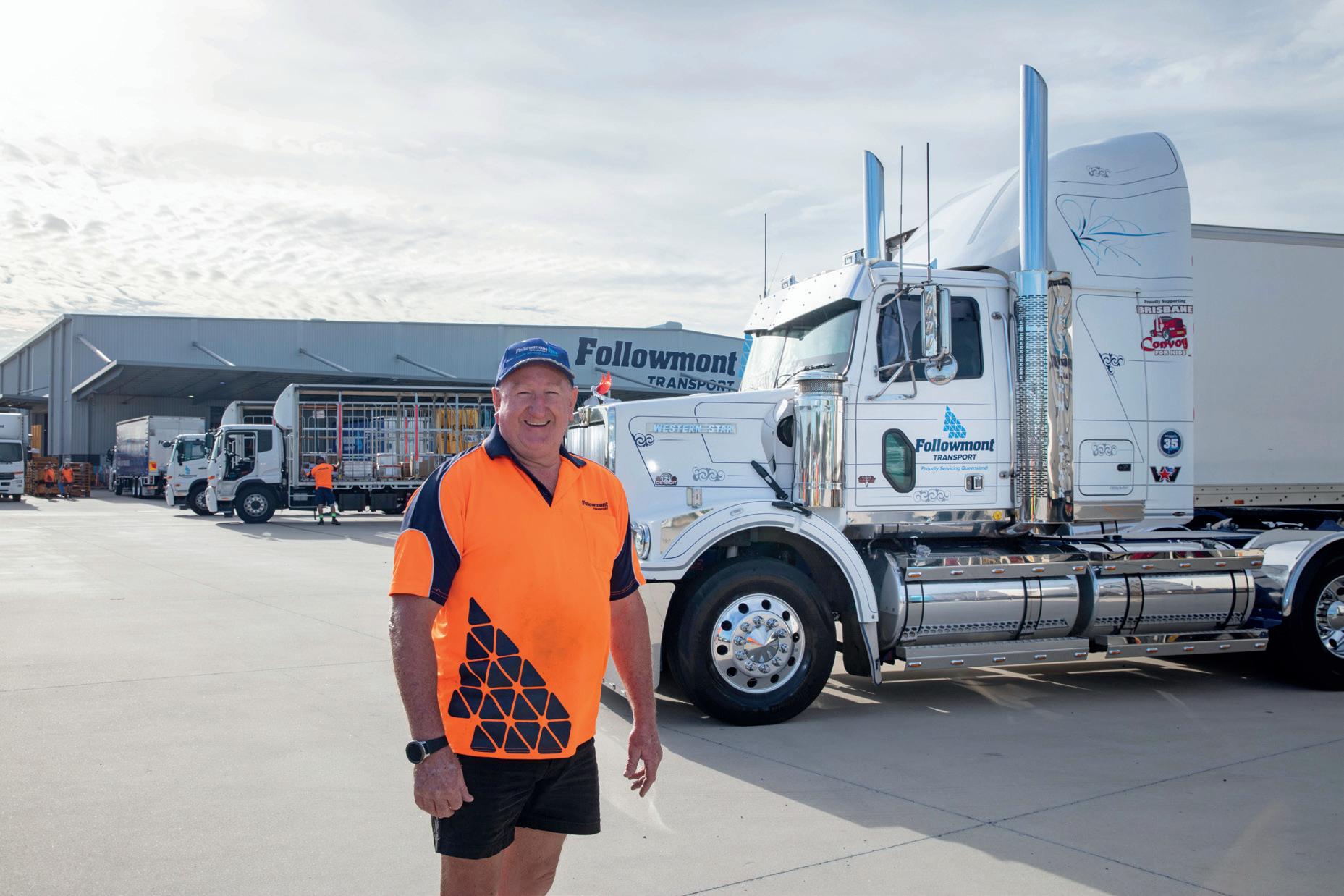
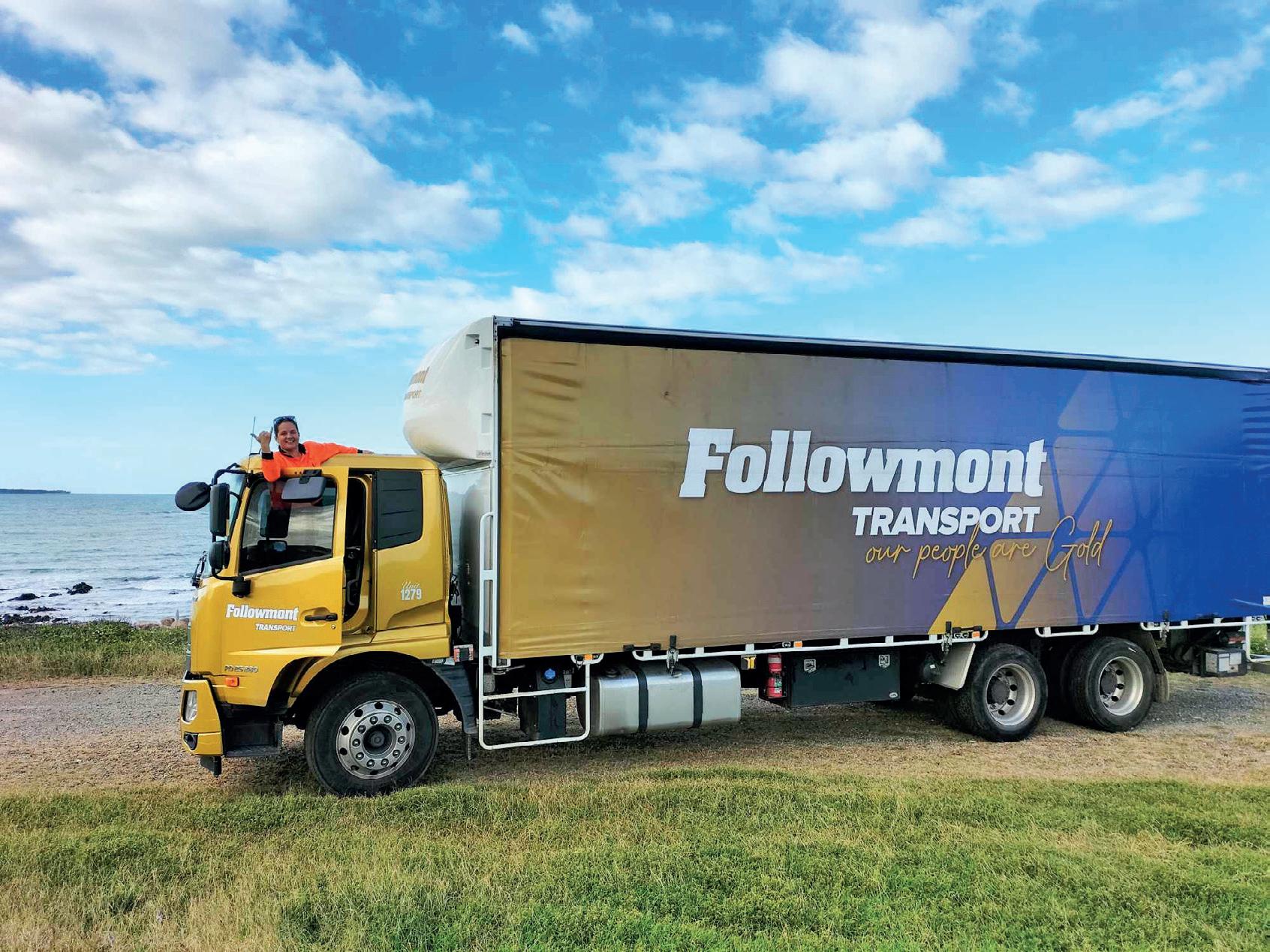
At Followmont, we un derstand that our people are our greatest asset. That’s why we’re committed to recognis ing and rewarding the hard work and dedication of our team. Whether it’s celebrat ing anniversaries, presenting Recognition Awards at every depot, or acknowledging outstanding actions, we make sure that our team feel appreciated and valued for their
But it’s not just about recognition; it’s also about growth. We offer a range of training and development programs designed to help our team advance their careers. From leadership programs to safety training, we equip our team with the skills and knowledge
to continuous learning means that whether you’re just starting out or have years of experience, there’s always room for growth at Followmont.
Joining Followmont means becoming part of a close-knit family where support is always available.
We believe in open communication and teamwork, ensuring that everyone feels connected, no matter where they’re based.
Our managing director, Mark Tobin, regularly up-
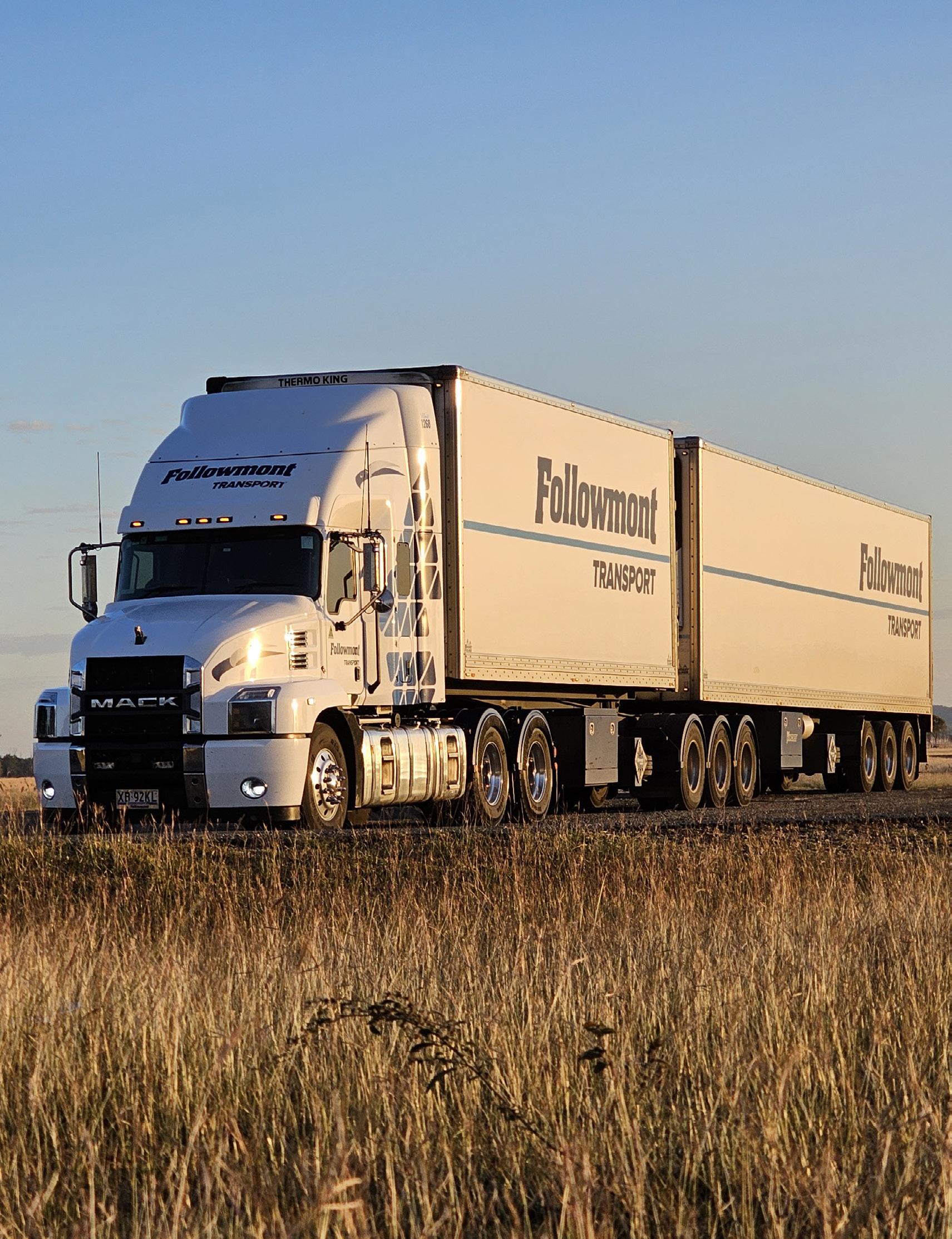

knows they’re a valued part of our journey.
In addition, our commitment to safety is unwavering. We’ve developed industry-leading programs and practices to ensure that every member of our team gets home safely at the end of the day. This culture of care extends beyond the workplace, with benefits and programs designed to support our team and their families in every aspect of life.
ber, you’re part of a family that values your contribution, supports your growth, and celebrates your success. With us, you’ll find a stable, rewarding career in a company that truly cares. Join the Followmont family and help us continue to deliver excellence, one mile at a time. For a full list of current opportunities, contact our Talent and Attraction Team on talent@followmont. com.au, (07) 3608 4900 or visit followmont.com.au.

•
•
•
•
BY KAYLA WALSH
A promising young mechanic is gearing up to represent Australia at the WorldSkills International Championship in Lyon, France from September 10-15.
Thomas Bevan from Iraak, Victoria is just 20 years old but has already achieved so much, winning the gold medal at the WorldSkills Australia National Championship last year.
Thomas is hoping to do the country proud on the world stage as he showcases his talents in the Heavy Vehicle Technology category.
“We had a practise competition in Melbourne in July with China, Austria and Korea and I ended up placing second,” he told Big Rigs.
“That was a bit of a confidence boost, so I’m feeling less nervous and more excited now.”
The WorldSkills International Championship takes place over four days, with young “Skillaroos” competing across a wide range of disciplines, from bricklaying to bakery.
Thomas will be put to the test across six modules, including engine disassembly, machine undercarriage inspection and more.
“For the first module you’ve got to pre-deliver a truck or a machine, and they don’t really tell you what it is in advance,”
Thomas explained.
“So, you can’t practise too much – you’ve got to know your stuff.”
When he’s not competing, Thomas works as an apprentice with the Mildura Truck Centre.
Although he’s barely out of his teens, he has impressed his
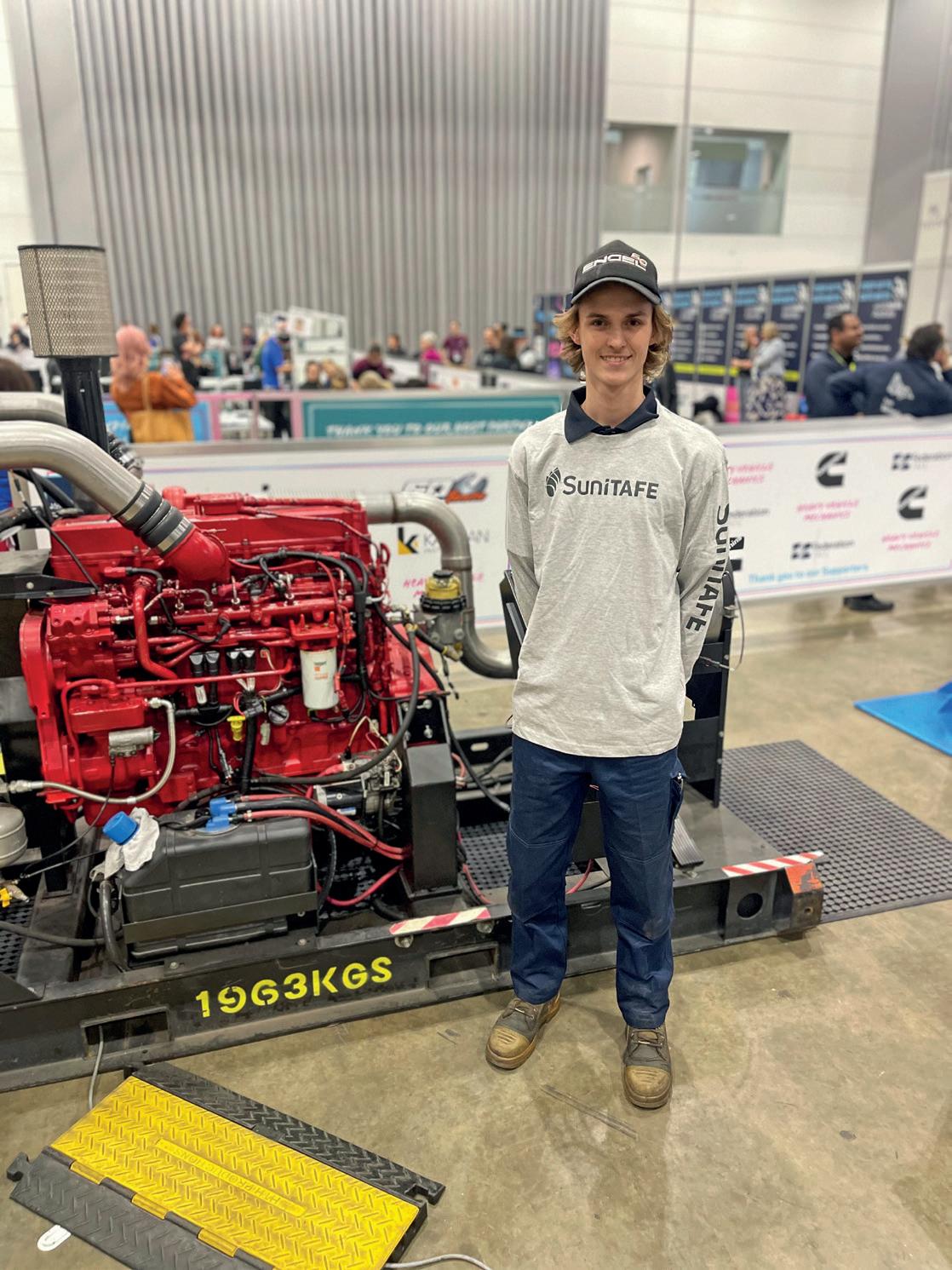
employers so much that he’s been looking after the centre’s on-call, after-hours service for the past two years.
“What I do on a day-to-day basis is pretty advanced for an apprentice, I’d say!
“With the on-call work, sometimes you’ll get told minimal information and the customer might be hours from Mildura.
“You have to suss out what you need, organise everything and try to make it all happen.
“Sometimes I’ll get stuck without a part I need, but most of the time, I’m able to make it work and the customers are happy.”
Thomas is grateful to his bosses for giving him so many opportunities to learn, as well as for their support as he gets
ready for the WorldSkills competition.
“They have been really sup portive, and anything I need, they have made sure they get it for me.
“Some of the modules in the competition focus on earthmoving and agricultural equipment, but we don’t do much of that at work.
“So, they sent me to Cater pillar and I’ve done hydraulic training in Melbourne and Tasmania, which has been re ally valuable.
“I have learned new skills and knowledge which I can apply to my day-to-day job as well.”
Thomas has completed a four-year TAFE course in mechanics and will officially qualify in November.
Another huge source of support has been his TAFE teacher Will Sharpe, who was quick to recognise his protégé’s talents.
“Will suggested nominat ing me for WorldSkills and I didn’t really know what it was at the time, but I agreed to it,” said Thomas.
“Since then, he has been the main person helping me.
“He’s travelled to be there for different competitions and training camps and he’ll be coming to France with us as well, which is great.”
As a teenager, Thomas wasn’t sure what direction to take – working part-time at a KFC while washing trucks for a local transport company.
“I’ve always had an interest in trucks and machinery,” he said.
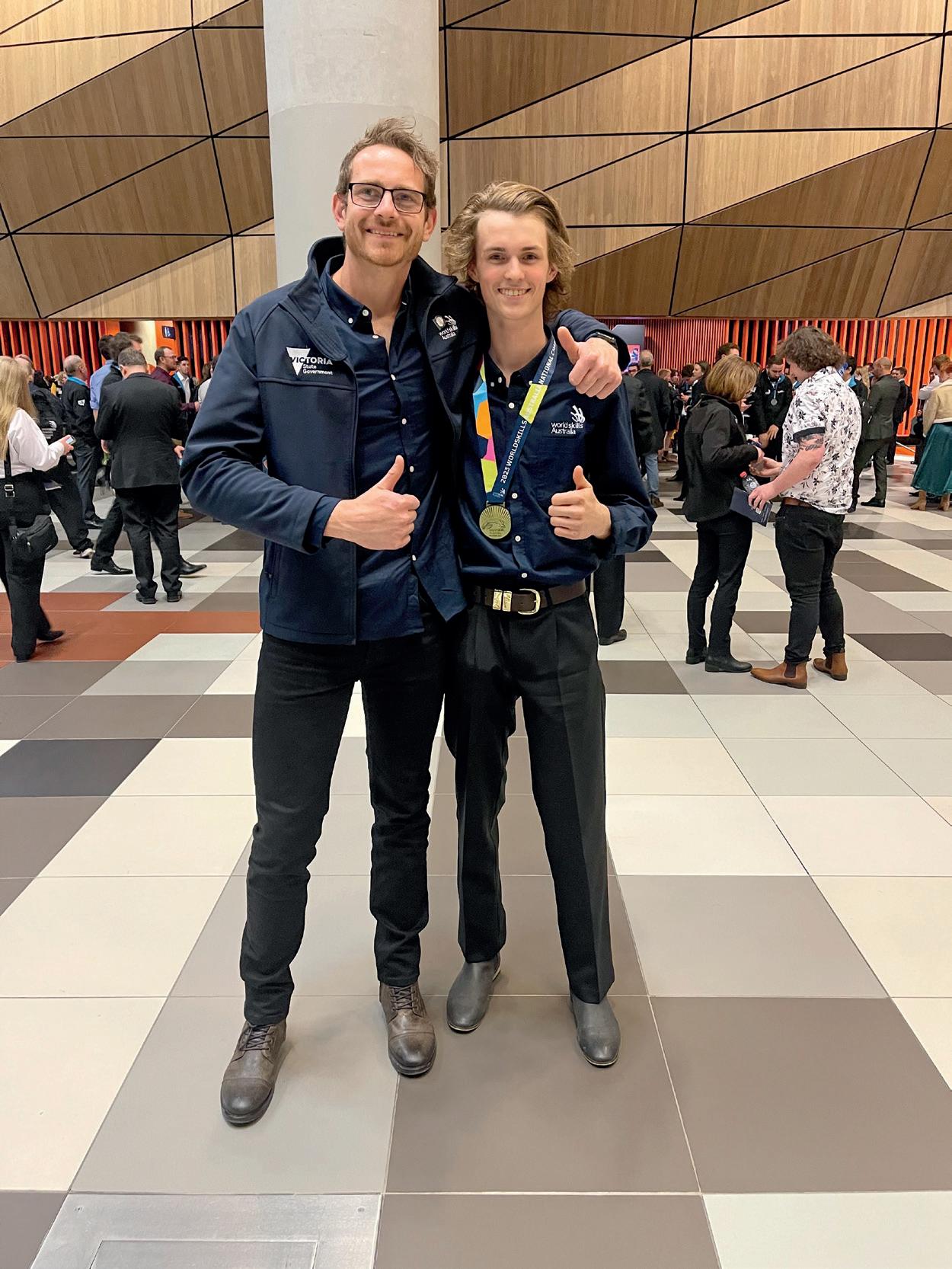
BY KAYLA WALSH
RHANI
Meriton from Wagga Wagga has loved trucks ever since she was a kid.
With her dad running an earthmoving business, Meriton Earthworks, she developed a fascination with the biggest vehicles on the road – and decided that one day she wanted to become a truckie.
At 18 years old, she’s already achieving her dream, delivering frozen produce for Farey Transport on her HR licence.
“Farey have started me off with a little Fuso, and I do local deliveries to supermarkets, restaurants, delis, butchers and the hospital,” she told Big Rigs.
“Then occasionally on the weekends I’ll go out of town, to Young and Gundagai.”
Rhani enjoys the longer trips, as she gets to see more of the country, and one day she would like to become a linehaul driver.
“With Fareys, I’d love to be a linehauler for a couple of years, but my absolute end goal is to do oversize haulage,” she said.
“Everyone always talks about a big K200, and I’d love to drive one of those!”
Although she’ll have to wait to drive the big stuff, in the meantime she takes great pride in her Fuso.
“I definitely take pride in keeping my truck clean,” she said.
“I like driving around in something that’s clean and smells nice.
“Maybe it’s the girl in me, but it’s a nice feeling!”
Rhani is the only female truckie in her workplace, but said all the blokes on the team have made her feel at home.
“When I was younger, my dad would let me go in the truck with him but he never thought I would become a truck driver,” she said.
“I was a bit nervous starting
with Fareys, but they are like my big brothers in there.
“They all look after me and I’m mates with them all.”
She said the team at Fareys have also been great at teach ing her everything she needs to know about trucking, from pre-trip checks to ways of doing things faster and easier.
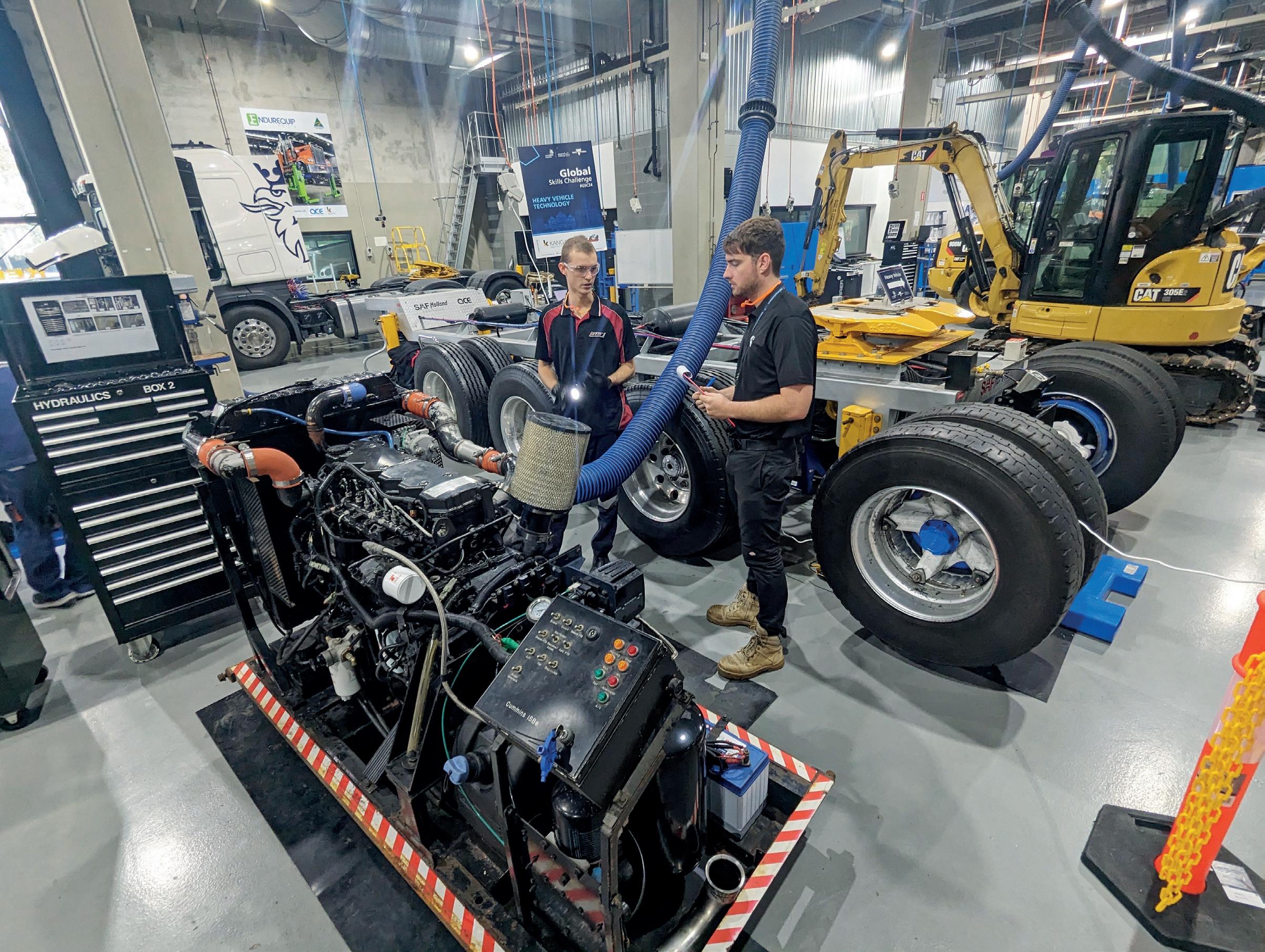
“They’ve shown me tools I can use when something is too heavy for me to lift,” she said.
“They’ve even got me reversing a truck and trailer in the yard.
“I definitely need more practise but I’m getting better, so I’m excited about that.”
Despite getting so much support from the men at work, she would love to see more female truckies around too.
“I’m seeing more female truckies on the road now than when I was younger, but I’m still the only woman in my workplace,” she said.
“That inspires me to encourage more women to join me!”
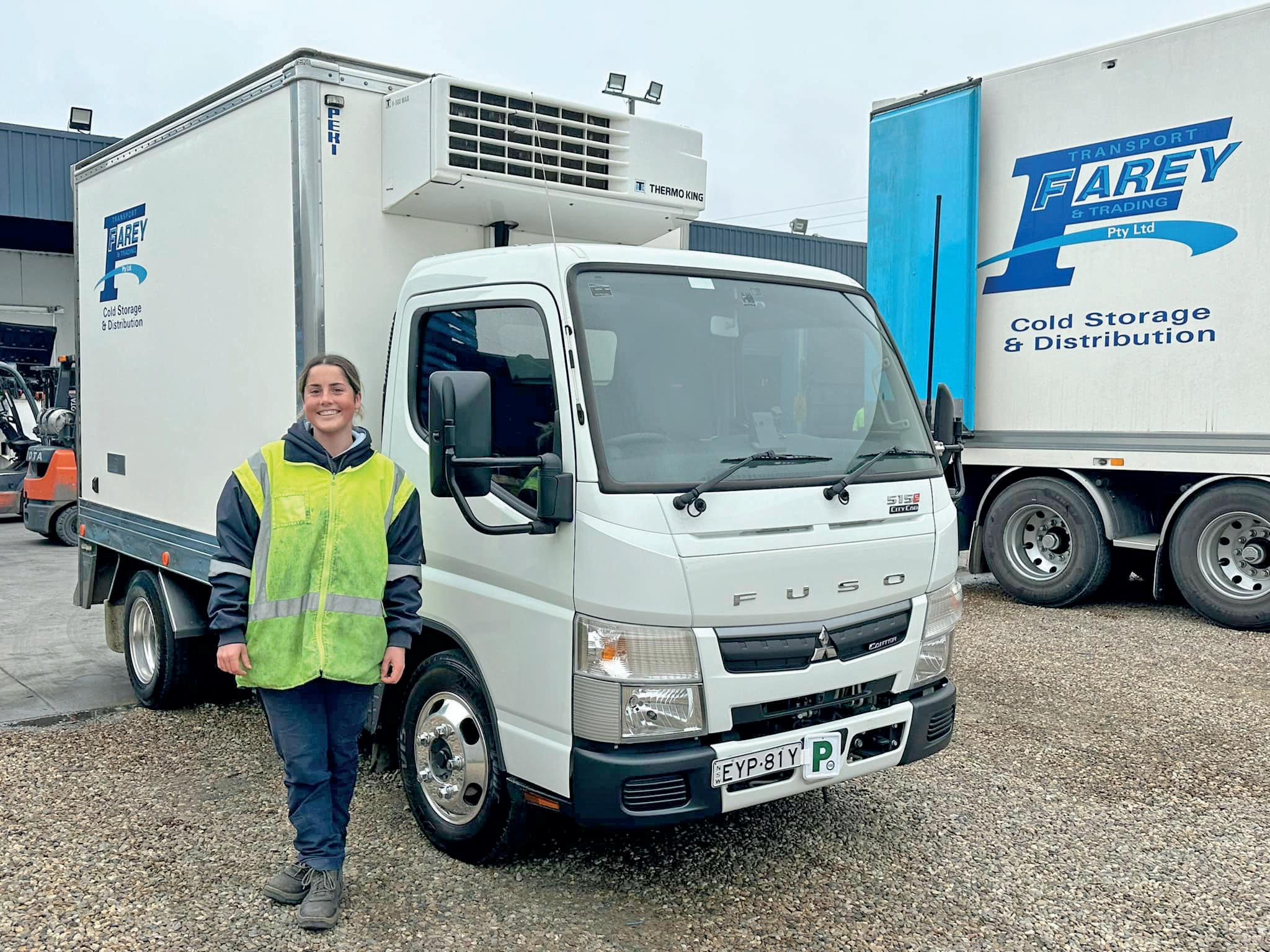
NORTH Queensland’s transport and logistics sectors are facing a critical shortage of skilled workers, with the lack of truck drivers and logistics personnel becoming a growing concern. As the demand for freight services surges, especially in the rapidly expanding Townsville region, the industry is struggling to keep up. This shortage is not just a local issue but a nationwide challenge, threatening the efficiency of supply chains and the timely delivery of goods across Australia.
The QTA Driving Townsville’s Future Program, funded by Jobs Queensland through the Grow Your Own Regional Workforce Program, is a timely initiative designed to tackle this pressing issue head-on. Supported by the Queensland Government’s Good people. Good jobs: Queensland Workforce Strategy 2022-2032, this program is set to create a vital pathway for new entrants into the transport and logistics industries.
Creating opportunities through targeted training
The QTA Driving Towns-
ville’s Future Program is an accelerated pre-apprenticeship and traineeship initiative aimed at equipping participants with the skills and qualifications necessary to succeed in the transport and logistics sectors. The program offers accredited training units from the Certificate III in Driving Operations (TLI31222) and the Certificate III in Supply Chain Operations (TLI30321). These qualifications are highly regarded within the industry and provide a strong foundation for a
tions or supply chain management.
One of the program’s standout features is its emphasis on real-world application. The course includes units such as TLIF0009 – Ensure the safety of transport activities (Chain of Responsibility) and, for eligible participants, additional training in TLIC1051 – Operate Commercial Vehicle. The QTA are partnering with Saltera Training who will deliver the training competencies. These units are critical for ensuring that new drivers and logistics
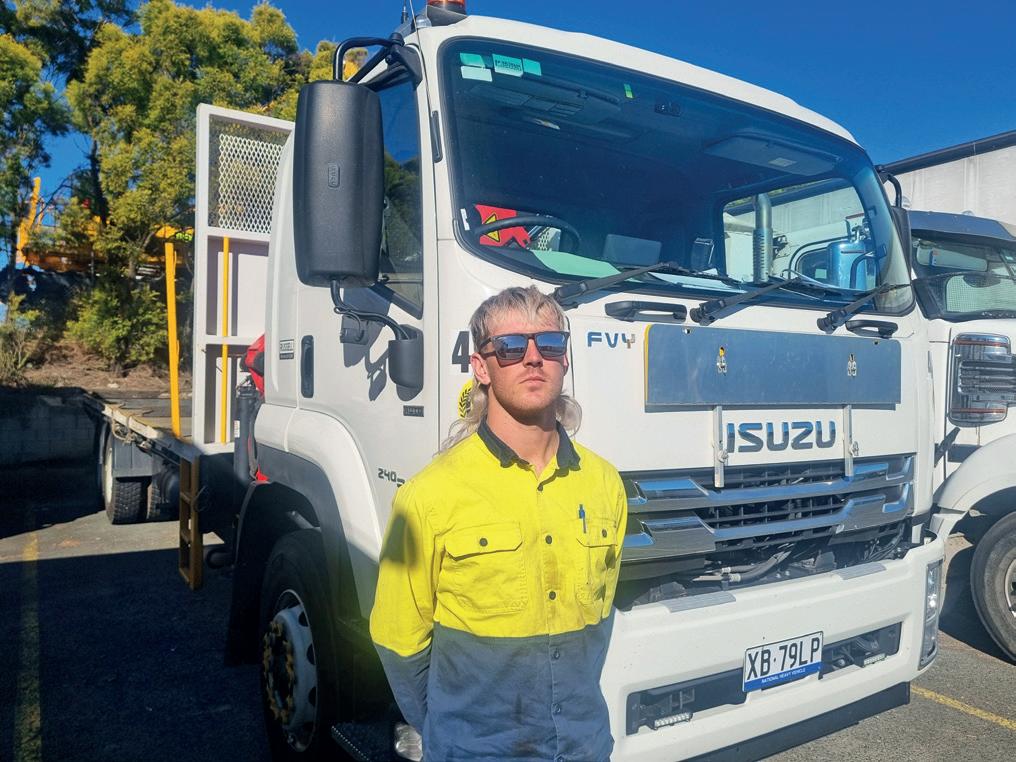
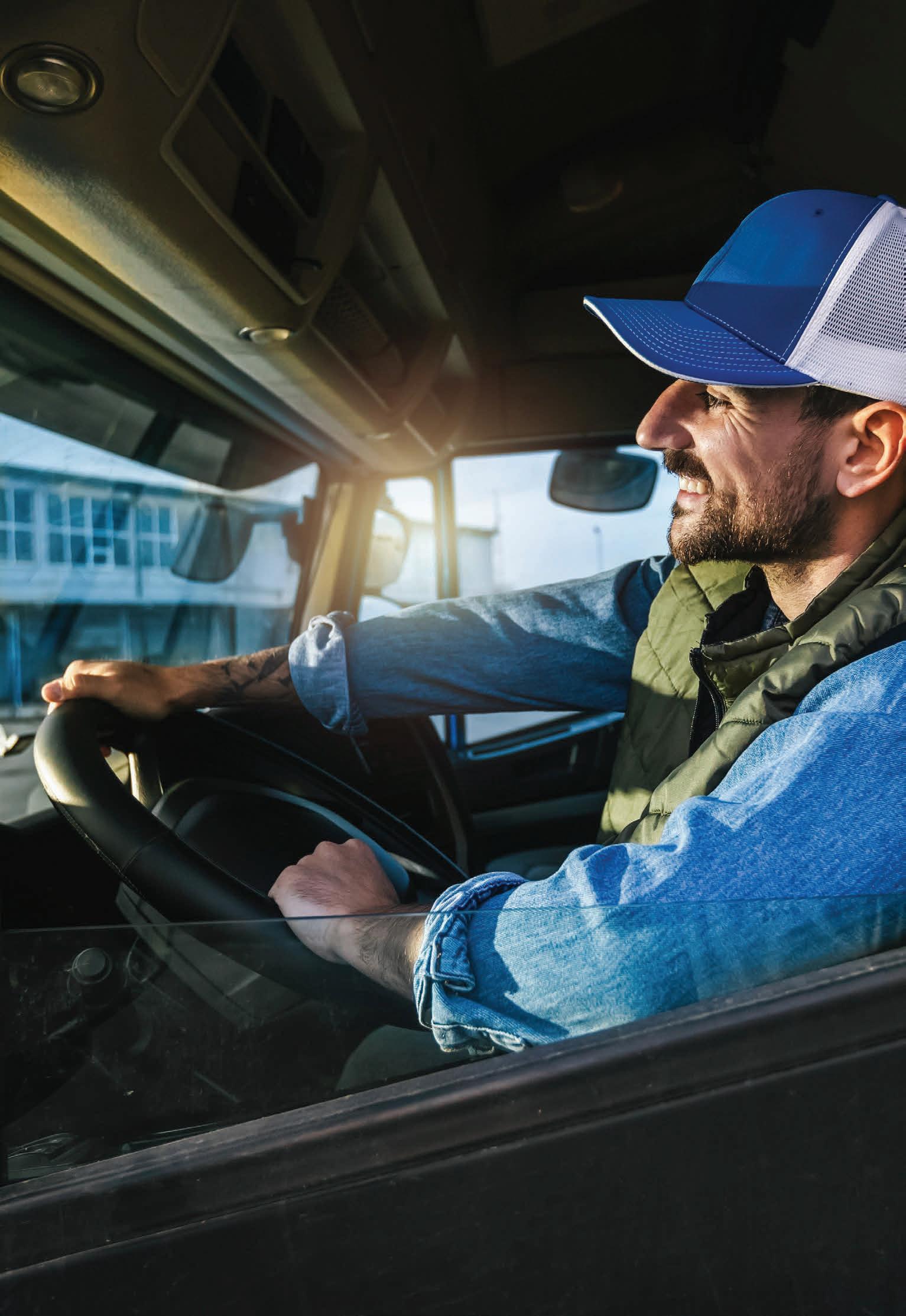
workers not only understand the theoretical aspects of the job, but are also prepared for the practical challenges they will face on the road and in the workplace.
The development of this program is a direct response to the insights gathered from road freight operators and fleet owners in the region. Their feedback highlighted a significant gap in entry-level training opportunities, which has contributed to the current skills shortage. By offering a structured pathway into the industry, the QTA Driving Townsville’s Future Program aims to increase the number of job-ready candidates who can immediately contribute to the workforce.
For employers, the program is an invaluable resource. It allows them to enrol new entrants or upskill existing employees, ensuring their workforce is equipped with the latest industry knowledge and job ready skills. This will not only support employers to start building a pipeline of new entrants into
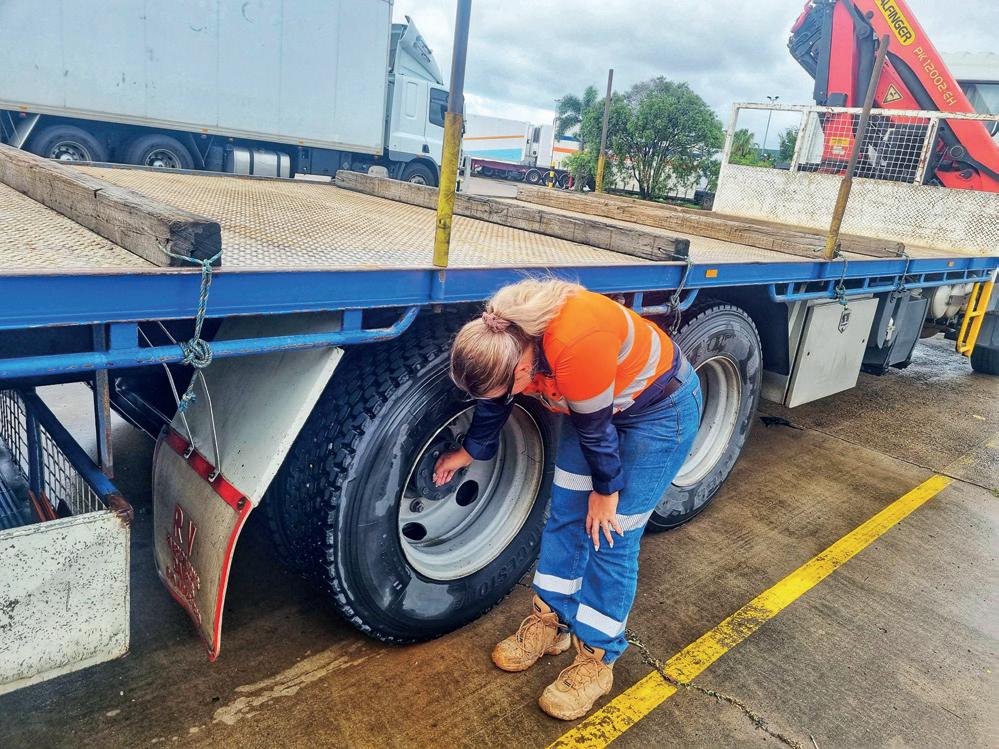
their businesses, but also help to build a more resilient and capable workforce in North Queensland.
Whether you are an individual looking to start a career in transport and logistics or an employer seeking to strengthen your team, the QTA Driving Townsville’s Future Program offers a unique opportunity. Participants will need to meet certain eligibility criteria, including the ability to work in Australia and pass necessary screenings, but the rewards are significant. Don’t miss this chance to be part of a program that is not

only shaping careers but also driving the future of Townsville’s transport and logistics sectors.
For more information, head to qta.com.au/driv ing-townsvilles-future or contact Angela Mottram at angela@qta.com.au or 0401 712 516.
*Note: Participation in this program requires a commitment to meeting the employment standards and expectations set by employers. Financial investments for medical screenings may be required, and participants must have their own transport options to attend the training and work experience.
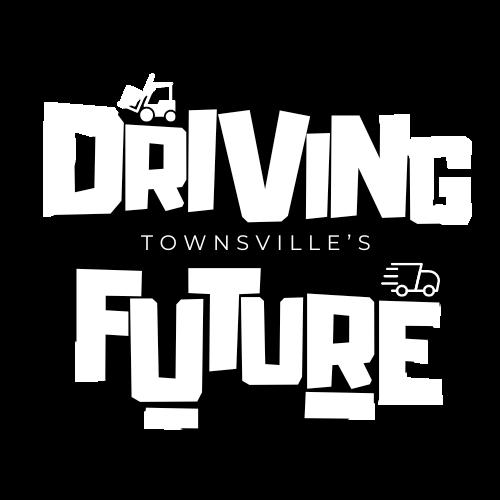




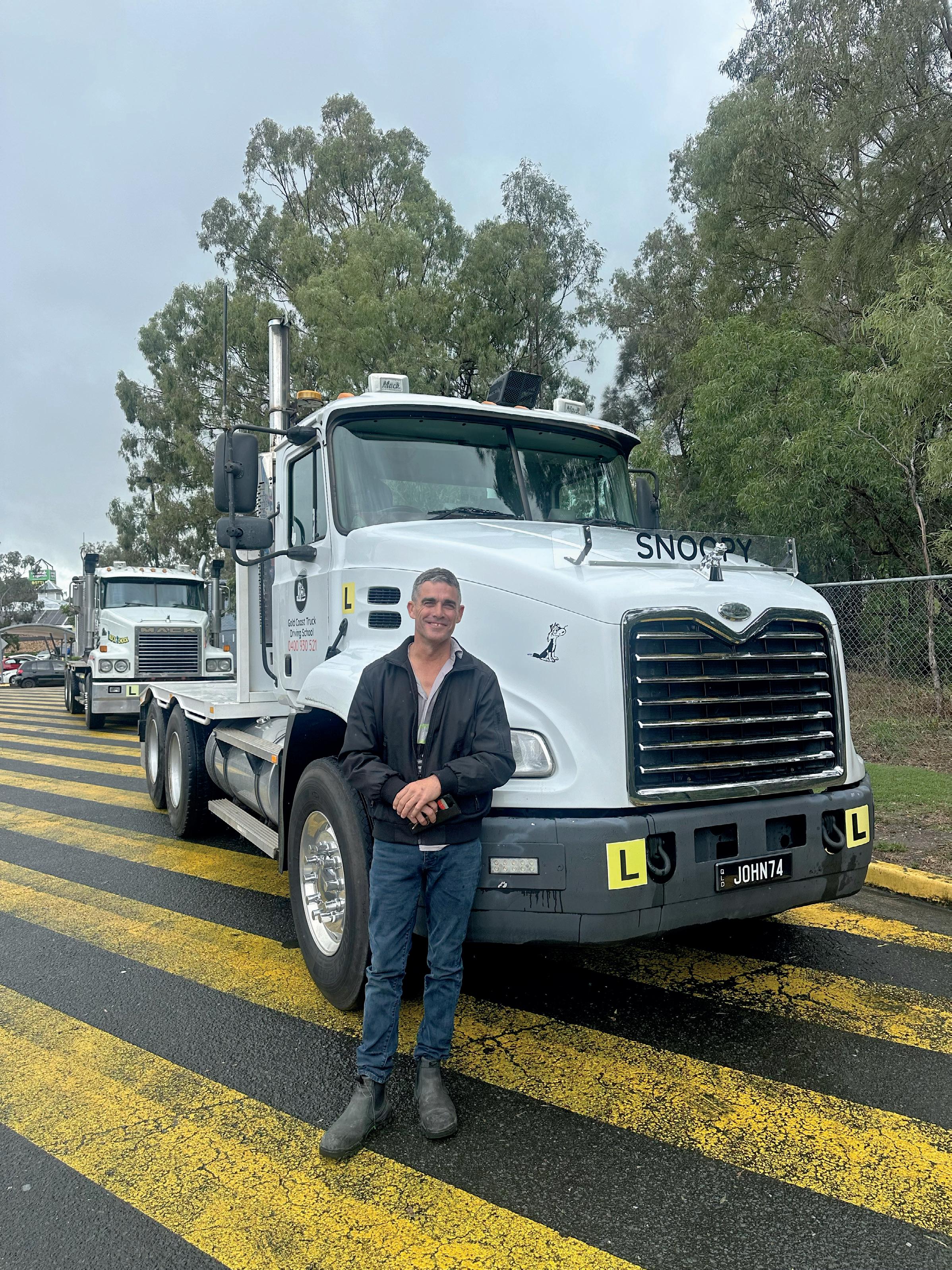
people a week, across various licence classes.
Lee is among the students to have recently secured his HR licence after training with John. He said the train ing he received was: “Thor ough, meticulous and most importantly experienced. This is the sort training that the industry needs.”
John’s decades of real-world experience as a truck driver means he can impart that knowledge onto his students.
As he explained, “When I came into the training in dustry, I guess I was sort of pushed in that direction. Over the years, while do ing interstate, if I ever saw someone struggling, I’d al ways jump in and give them a hand.
“People would often com ment that I was good at training other people, so when I had to give up the long distance driving, be coming a driver trainer was the perfect fit.
“Once I started in the train ing industry, I realised that there are a lot of trainers out there without the real-world experience. Because I’ve been around trucks for so long, training others comes really naturally to me.”
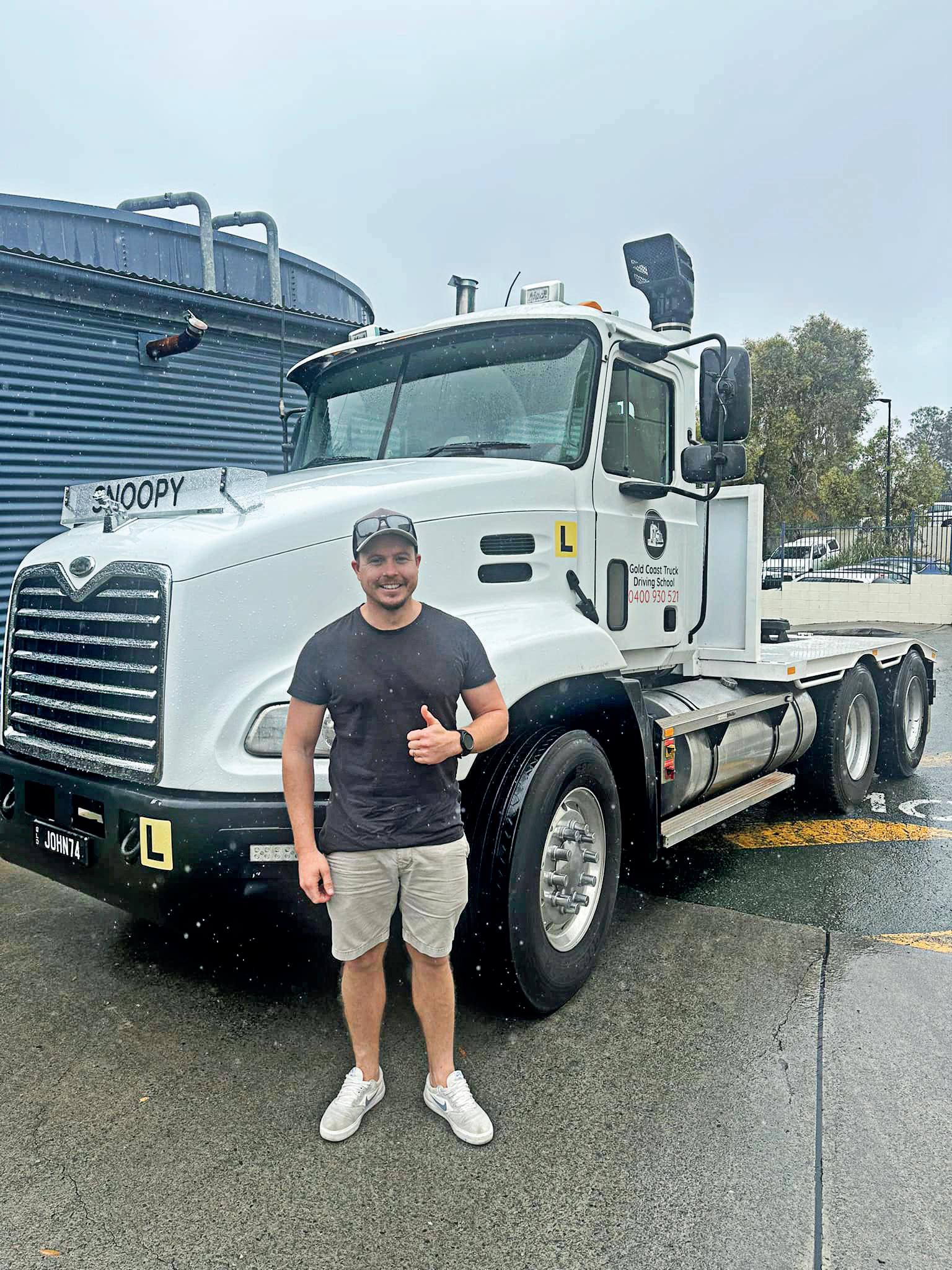
different techniques and approaches to teach different people. ranger on Facebook. Most of the videos average about 15,000 views, but some of
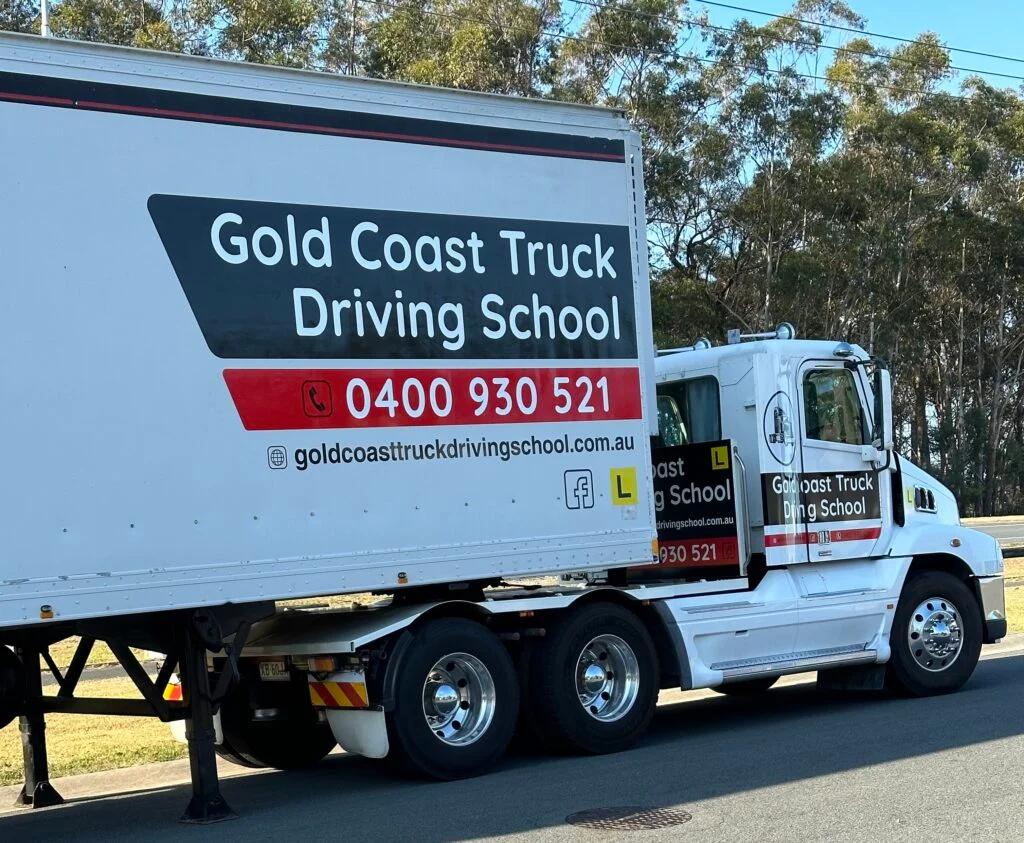
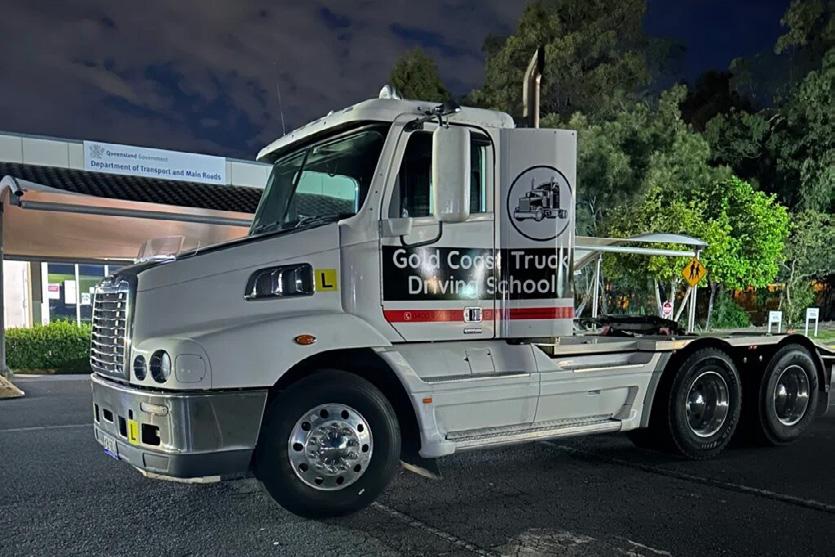
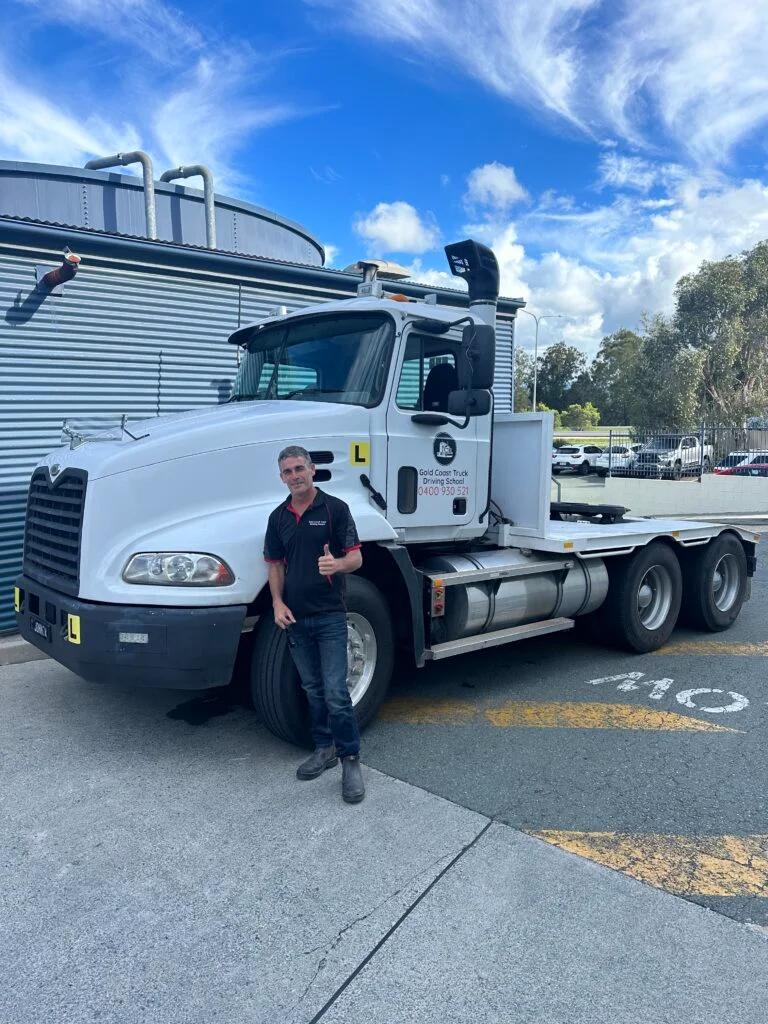
John says a lot of his stu dents come to him through word of mouth. “With about 80-85 per cent of the stu dents I have coming through,
address the skilled worker shortage, Remondis Australia is thinking outside the box, launching a training program that provides opportunities for those who are long term unemployed.
Remondis’ Industrial Services Pathway was launched at the company’s specialised liquid processing plant at Henderson, south of Perth, in July.
The conclusion of the threeweek program has seen 10 recruits receive intensive hands-on training and obtain industrial services tickets and licences across areas including health and safety, high pressure water jetting, forklift opera tion, gas testing and working at heights and in confined spaces. These recruits are also work ing to obtain their heavy rigid (HR) truck licences.
The program guarantees lon ger-term employment, with participants staying on in fulltime capacities for at least 12 months. That involves initially being buddied with experienced operators so participants meet competency and compliance requirements to obtain full operators’ licences.
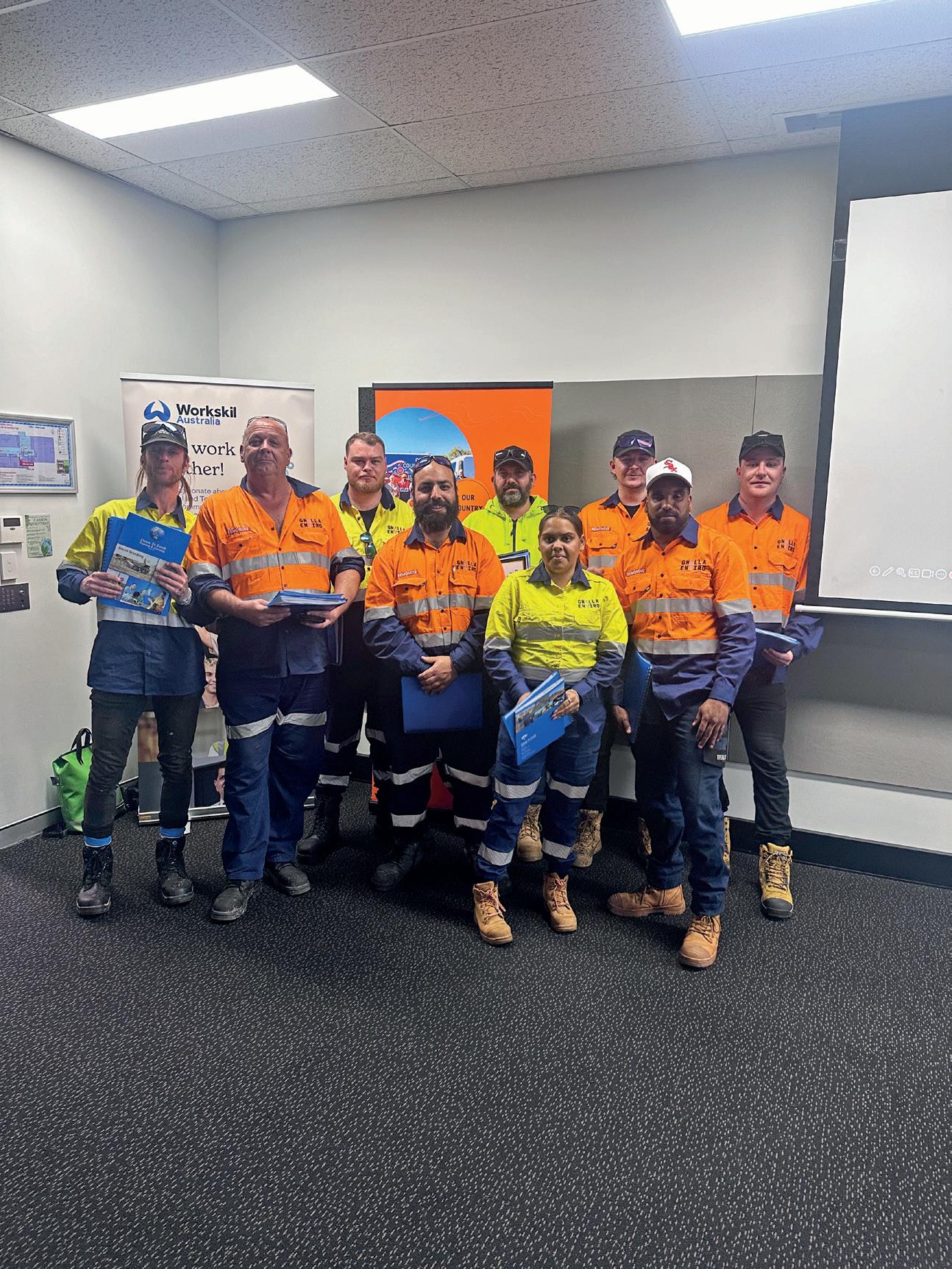
ourselves and develop skills that match our needs.
The program was designed and delivered by Gnalla Enviro, an Aboriginal owned and managed company specialising in commercial and industrial waste. Not-for-profit employment services provider Work-
“The intensive three-week training is just the start. The program leaves the door open for full-time employment and mentoring, enabling each participant to take their skills and qualifications further.
“In a very short timeframe we’ve produced a fresh cohort of workers chomping at the bit to contribute and grow. It’s a win for each worker and a win
time options.
“I’ve achieved tickets and licences I never thought I would or could obtain.
“The support and encouragement from everyone involved has been great, leaving me feeling that I can have a long-term future in the industrial services sector.”
Remondis is now planning to run similar programs across its many other divisions nationally.
QUEENSLAND-based operation FCN Storage and Distribution is on the road seven days a week, serving a range of markets from fresh food to animal feed to civil construction.
Business is going well, with so much demand for their services that their fleet has now grown to 16 prime movers and 42 trailers, with another A-double on the way.
Of course, with this increased workload comes a need for more drivers – and FCN is on the hunt for some reliable men and women to put behind the wheel.
“We are looking for good multi-combination drivers with some experience,” said Terry Cubit, FCN Logistics director.
“We are not gender-specific, we’d be happy to take on female drivers as well as male.
“We can train where we need to, so if people are looking for a job and they have the basics, we can work with them to get them up to speed.”
FCN compensates its drivers well, paying above award rates
as well as penalty rates.
“We pay 12 per cent above award rates, and we pay penalty rates, loading and unloading, overtime etc.” Cubit added.
The family-owned business, which was founded in 2017, is based in Ormeau and specialises in container, refrigerated, scheduled linehaul and bulk liquid work.
Cubit said the company is flexible where possible, working with its drivers to make sure they are happy with their role.
“Some of our drivers are purely linehaul, they do interstate work or intra-state, like to Townsville for example,” he continued.
“Some are purely local, they do our containers and our tanks, off the rail, onto the rail etc.
“Then we have some drivers that are happy to do both. They do local work but if something happens and we need a linehaul driver, they are happy to jump in the truck and help us out.
“We want to be flexible with
our drivers and we really ap preciate when they are flexible with us too.”
FCN runs a well-main tained, modern fleet of mostly Scania and Mercedes-Benz trucks.
“We’ve got one truck that’s a 2005 model, that’s our yard truck,” Cubit said.
“Everything else is in the realm of two months old to six or seven years old.
“All of our equipment is on full maintenance contracts with the manufacturer so if something goes wrong with them, they are taken back to the manufacturer and fixed directly.
“Those contracts go up to 800,000 kilometres, so thankfully we have very few issues.”
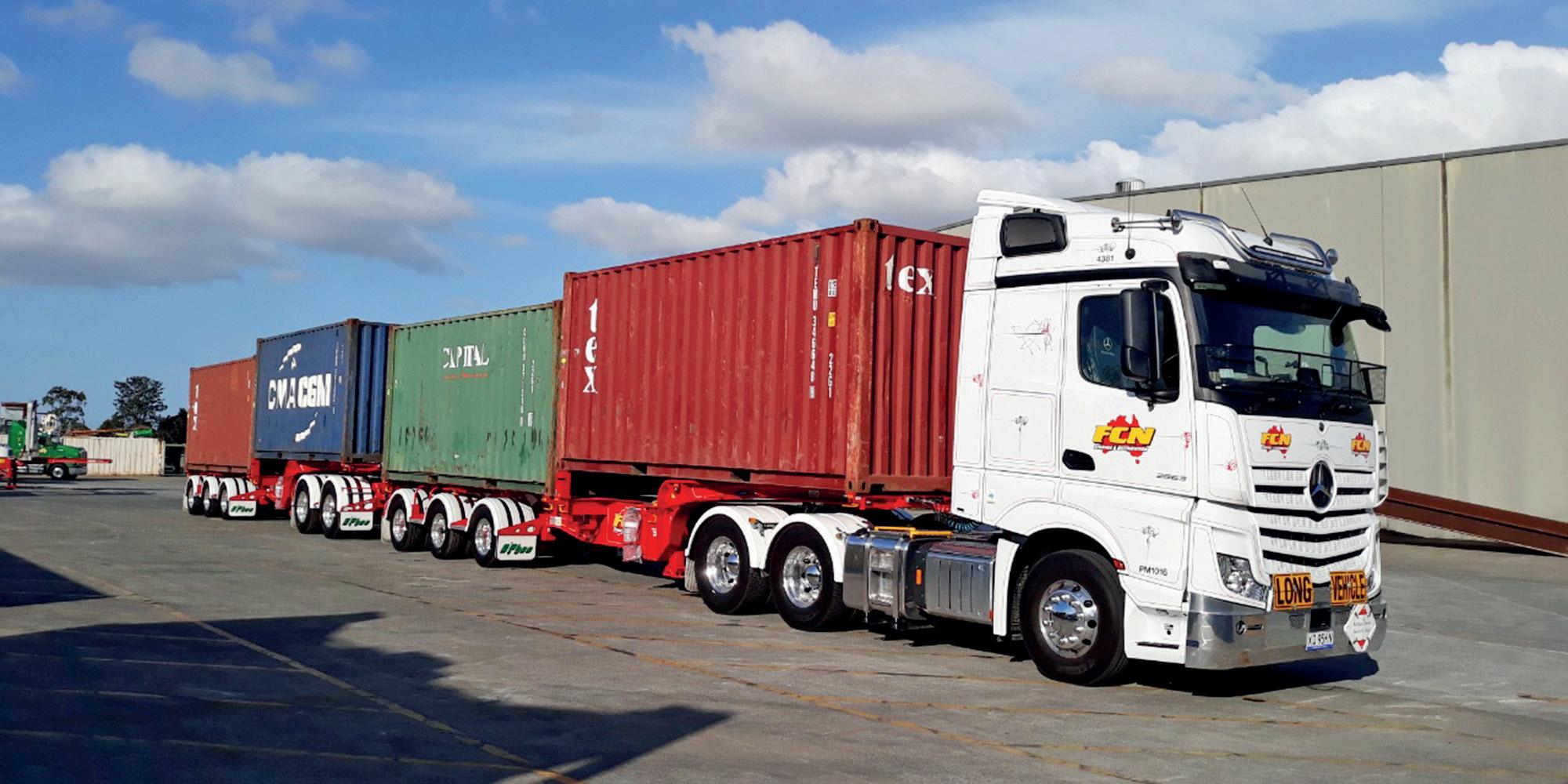
Safety is also a major priority for FCN, which has implemented new technologies to protect its drivers.
“We have a strong safety culture, and we have installed cameras in nearly all of our trucks,” Cubit said.
“One of the things we found was when we put the camer
as on, if we got a complaint from the public about our drivers, we were able to check the footage and see that our drivers weren’t the problem, it was actually the member of the public!”
Ideally, FCN is looking for MC drivers who already hold a Dangerous Goods Licence and a Maritime Security Identification Card.
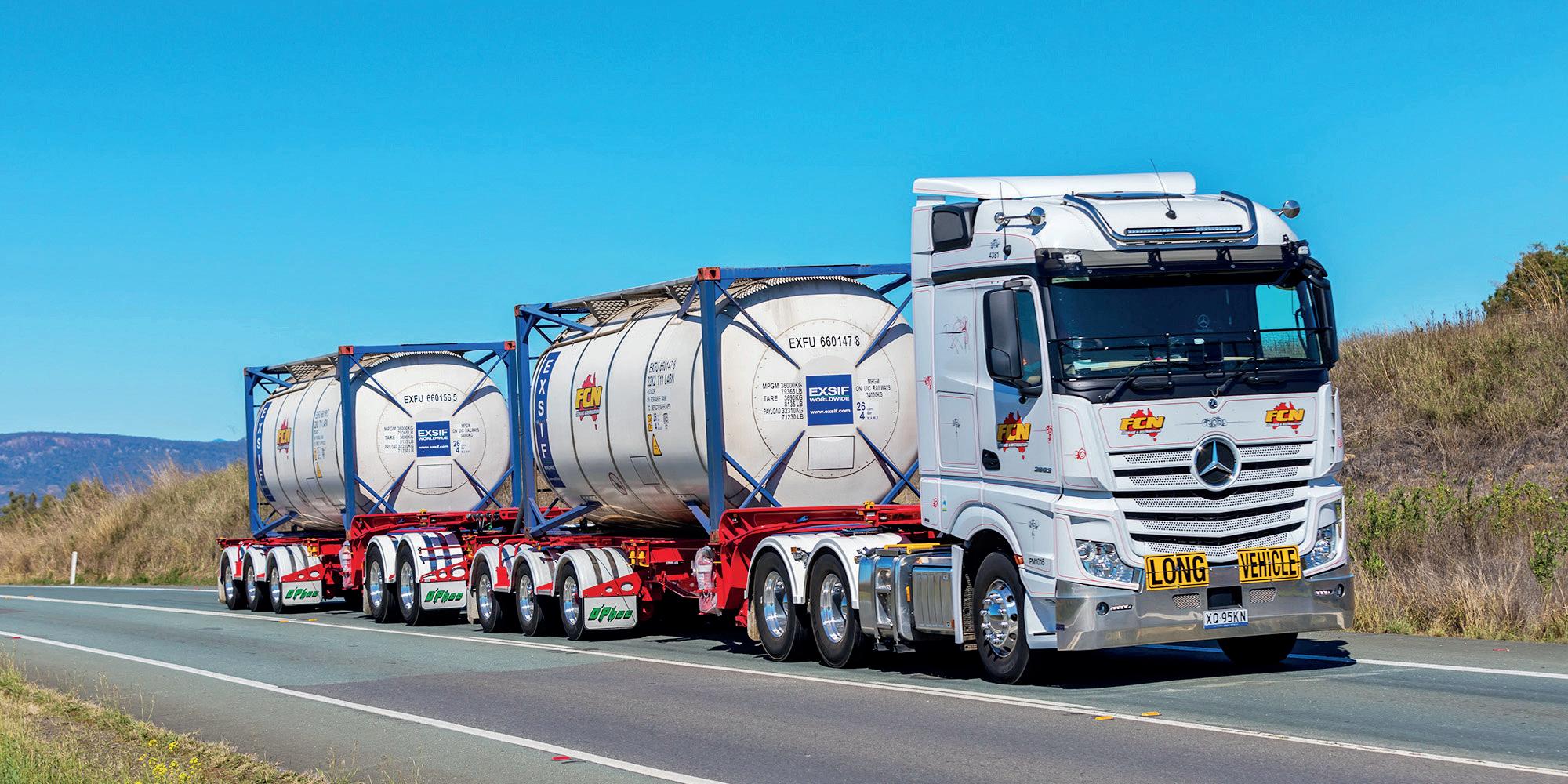
A $7.5 million upgrade to the Ooralea Trade Training Centre in Mackay sees the doors open to a new Heavy Automotive Training Facility.
Funded by the state government, under the Big Build of TAFE, the facility will offer training in diesel fitting, mobile plant operation, and heavy vehicle maintenance, with many students undertaking their qualifications under the fee-free TAFE initiative.
Courses delivered in the new facility will include:
• Certificate III in Engineering – Mechanical Trade (Diesel Fitting)
• Certificate III in Mobile Plant Technology
• Certificate III in Heavy Commercial Vehicle Mechanical Technology
Apprentice numbers in the region for these qualifications have grown by 26 per cent in the last 12 months, with strong demand for training places.
The top five VET disciplines in the Mackay region (in
terms of student numbers) are Business, Electrical, Mechanical, Fabrication, Mobile Plant Technology and Plumbing.
It’s hoped the Heavy Automotive Training Facility will help to boost the number of qualified heavy automotive professionals for the region.
“This upgrade is making high quality training more accessible in our region and creating pathways to good local jobs,” said Member for Mackay Julieanne Gilbert.
“Final year apprentices will be able to complete their training right here in Mackay, instead of traveling to Rockhampton or Emerald for specialist training.
“Boosting training capacity will create a pipeline of qualified heavy automotive professionals – crucial to keeping our growing region’s industries operating and keeping jobs local.”
The new centre features modern specialty training equipment including an air brake simulator, hydraulic
training stations, transmission training simulators, diesel engine benches and an air suspension training stand for trucks – allowing apprentices at all stages of their training to build their skills using the latest technology and equipment.
Vice-chancellor and president of CQUniversity Professor Nick Klomp, added: “We are delighted to celebrate the opening of this new facility and to now provide local apprentices in the region with a purpose-built facility that houses the latest technology and equipment.
“Using state-of-the-art resources and equipment will ensure our apprentices are being trained with the latest and best tools, better preparing them for their future careers and the needs and expectations of industry.”
The major infrastructure upgrade has also doubled the size of the existing CQUniversity Trade Training Centre at Mackay Ooralea.
“Having a DG licence and a MSIC is an advantage for applicants, but we can organise those things if they don’t have
“For the right people, we
will help to get it all happening.”
FCN operates an open-door policy, encouraging employees to speak out if they are unhappy about something.
“Communication is the biggest thing,” Cubit said. “If there’s a problem, we want our drivers to call us – it doesn’t matter if it’s 1pm or 1am.”
Cubit bought his first truck over five decades ago, so he has plenty of experience under his belt, which he hopes has made him a good employer.
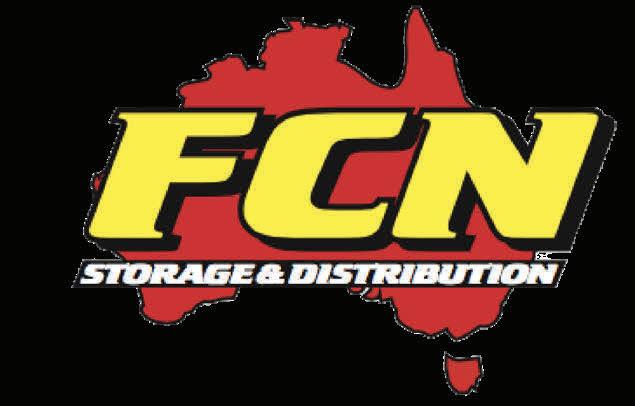
“I’ve had on-road experience and managerial experience in a lot of companies, and I think that’s why we’ve been able to hold onto a fair number of drivers for a long time,” he said.
“Those long-serving drivers are very positive with their feedback, whether that’s about the job, the equipment or the customer.
“We’ve also got very stable management – they have been here since day dot.
“We’ve got a great crew now and we’re always looking for people to join us!”

BY TIM GARNETT Manager, Freight Industry Training
SINCE the launch of the latest Driver Delivery Program, the Victorian Transport Association (VTA), in partnership with the Victorian government, is continuing to attract new heavy vehicle drivers to the industry.
It is widely recognised that the quality and content of both the five-day and eightday heavy vehicle training courses, far exceeds what is more widely available to people wishing to pursue a career in transport.
The Driver Delivery Program has already received more than 700 expressions of interest from prospective candidates wishing to become
part of the program. The program delivers up to 60 hours of behind the wheel training which in turn helps create the next generation of welltrained, safe, and low-risk drivers.
To date, we have successfully trained and helped place into employment more than 400 new heavy vehicle drivers. Additionally, from the current program graduate cohort, 25 per cent are women.
The VTA remains well supported by its members and the wider transport community by offering employment opportunities to new graduates. These dynamic working partnerships with forward thinking organisations, provide welcome employment pathways for our industry’s newest workers.
The feedback received from participants on these breakout paragraphs highlights some of the benefits from a graduate’s perspective.
The VTA has several practical programs to welcome new employees to the transport industry. Among the most vital is the development of skilled warehouse operatives, who seek a rewarding future in the transport and logistics industry. The VTA’s training and education programs aim to enhance our industry standards through quality and relevant training.
The VTA has several practical programs to welcome new employees to the transport industry. Among the most vital is the development of skilled warehouse operatives, who seek a rewarding future
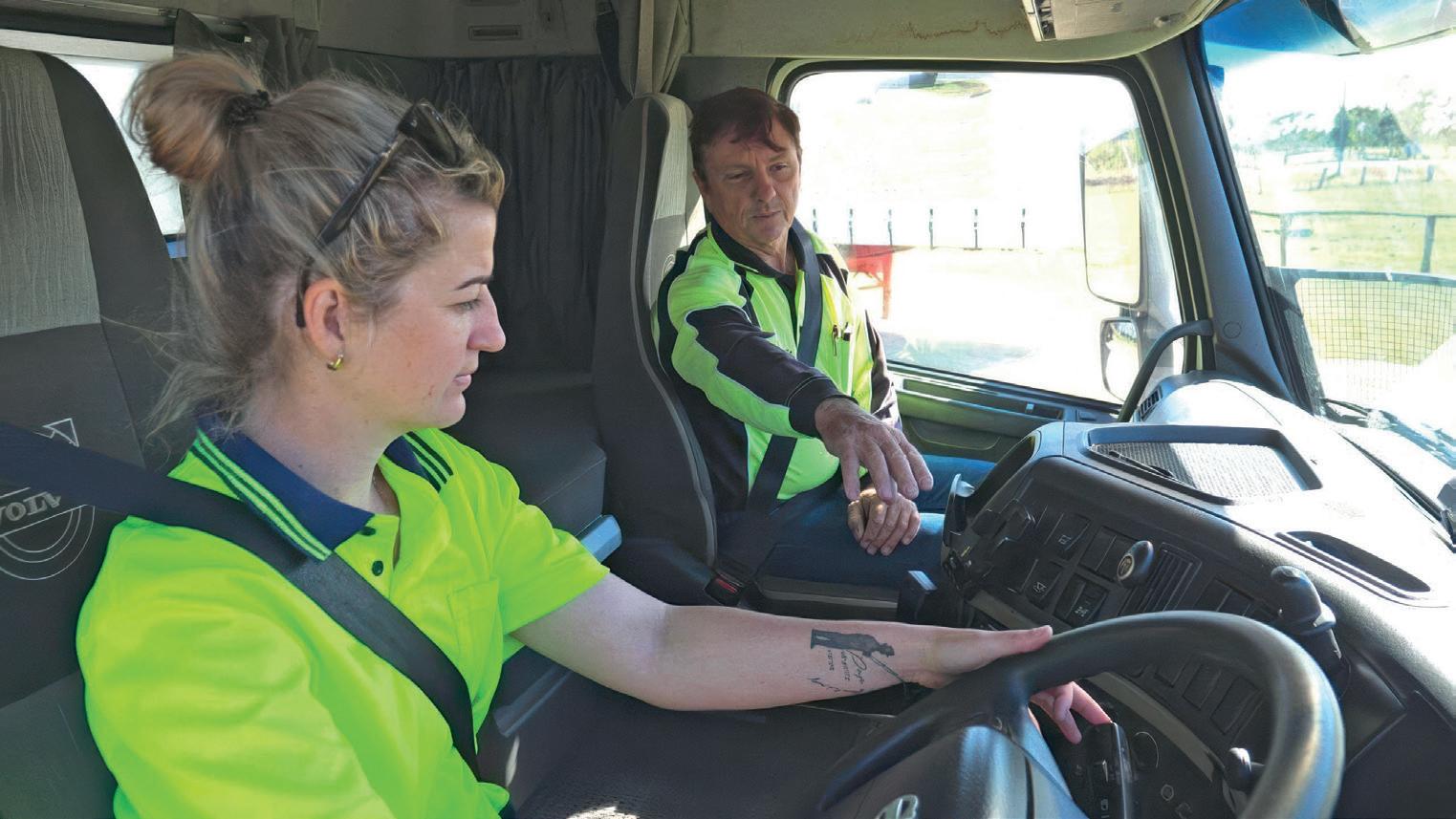
in the transport and logistics industry. The VTA’s training and education programs aim to enhance our industry stan dards through quality and rel evant training.
The transport and logistics industry is complex and has many components, but central to its conduct is the presence of well trained and competent workers, who have a profes sional outlook towards their own behaviour and recogni tion of achieving employer and customer satisfaction.
The VTA’s ‘Warehousing Today’ program will prepare people new to the industry to become a skilled and valued member of a warehouse team, with a complete understanding of industry practices and expectations.
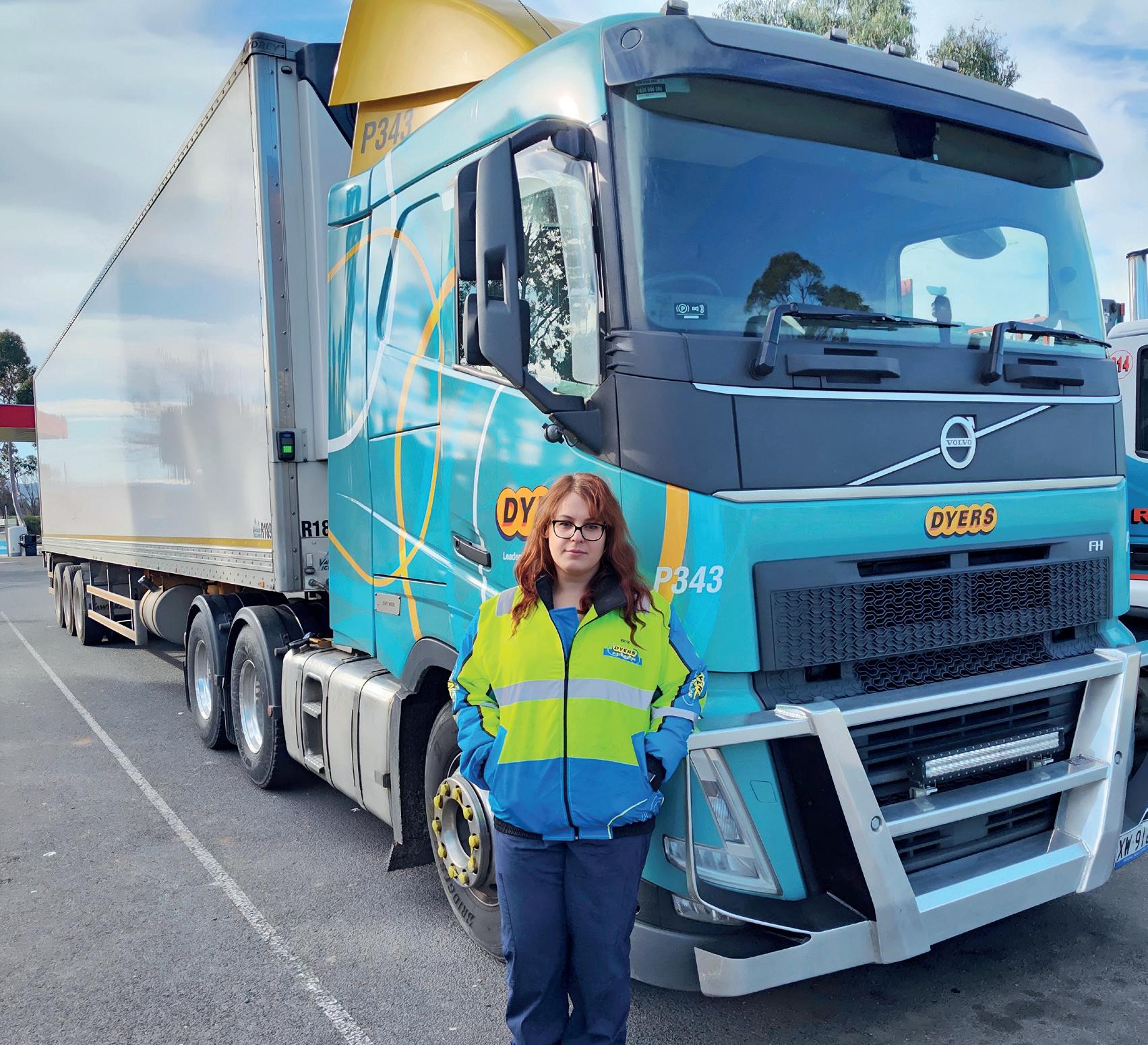
an enjoyable and collaborative training environment.
For more information on the VTA’s Driver Deliver Program or
Graduate testimonials
The industry needs professional and well-trained workers and the pathway to their new career could be as close as participating in this warehouse training and industry transition course. Logistics companies can also use this program to support the training and on-boarding of their new employees.
Warehousing Today participants will achieve a solid foundation of industry relevant skills, confidence, and the competency to work in the industry knowledgably, efficiently, and safely.
With breakout exercises, group discussions and practical assessments, the Warehousing Today course aims to deliver
With the Australian freight task on track to triple by 2050, the road transport industry is busier than ever. We need motivated, competent, young people to join the industry, with a satisfying and rewarding career as a transport professional available to the right people.
The Victorian Transport Association’s Driver Delivery program is an intensive eight-day course that trains participants in this highly skilled profession, and then puts them in paid employment with a transport operator. Participants will achieve a solid foundation of driving skills, confidence and the competency of operating heavy vehicles safely.
Specific training is provided in:
• Occupational Health & Safety
• Cabin Drills
• Load Restraint
• Road Craft
• Fatigue Management
• Loading Docks
“The Driver Delivery Program helped me greatly; I gained knowledge and skills that help me to be a better and safer driver and it gave me a greater understanding of the industry.”
– Bryn Jeffrey, MC truck driver, Dyers Transport
“I wanted to say a big thank you for giving me the opportunity to change my job and be able to work for JJ Richards. Because of the training through the VTA, Armstrongs and their wonderful trainers, I am now able to work and drive safely every day. I haven’t had any incidents at work which my company is very happy with.” – Jelisaveta Ene (Lizzy), HR truck driver
“I really appreciate that I’ve been trained well during my course. Thanks to Tom my trainer, who enabled me to become a safer heavy vehicle driver, which has benefited my integration into the transport industry.”
– John Marinas, HC truck driver
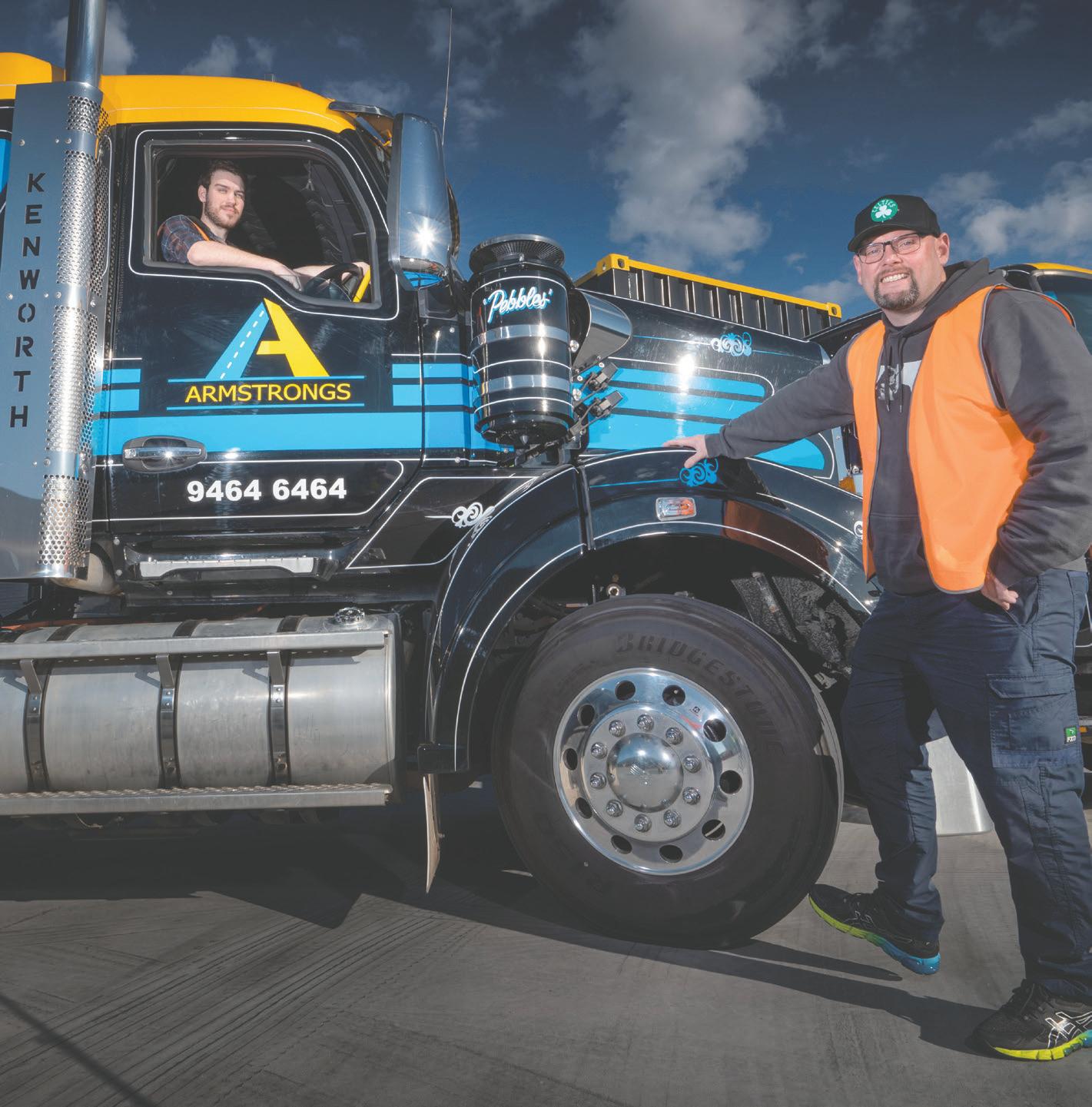
Metropolitan Driving
Rural Driving
Risk Reduction Techniques
Vehicle Inspection
Chain of Responsibility
Driver Delivery is supported by the Victorian Government, with tuition fully subsidised. Upon successful completion, the VTA will facilitate interviews with transport operators to help secure employment.
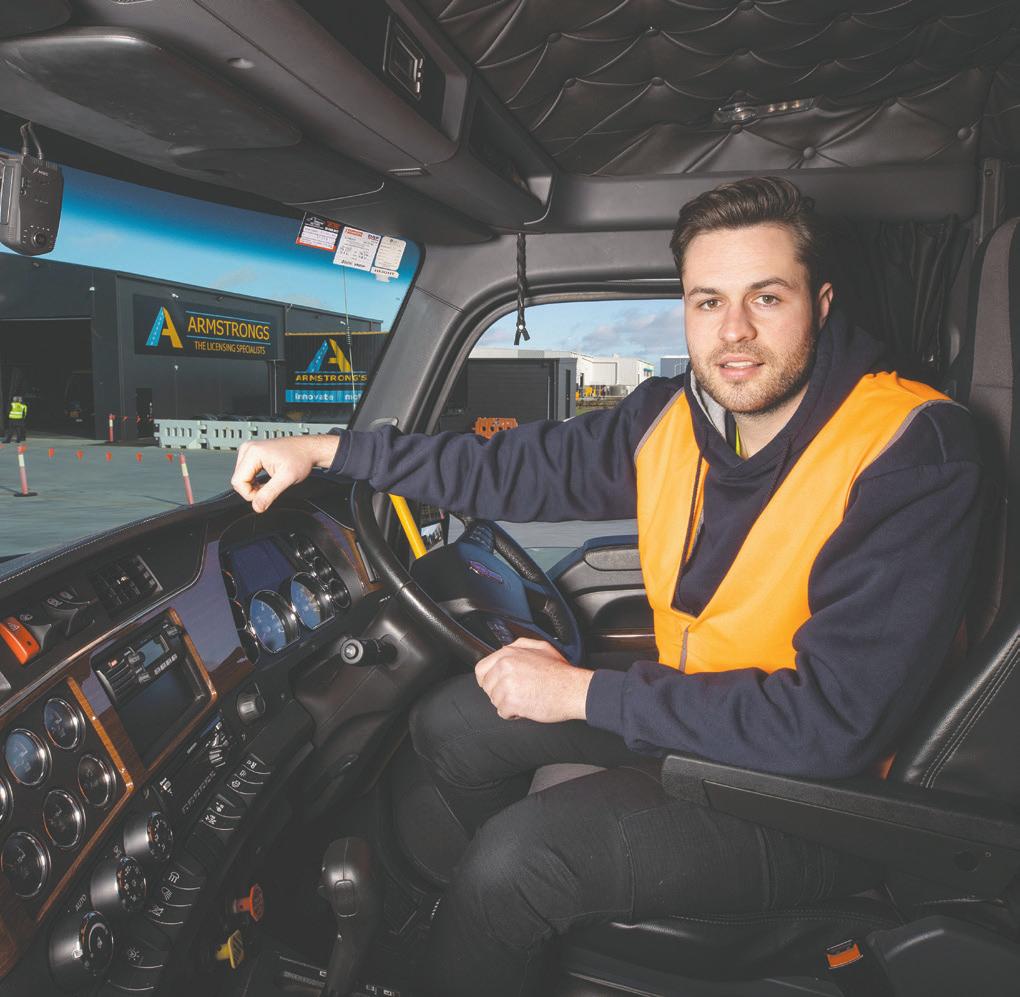
BASED in Canberra, with a capacity to travel interstate or internationally, Sutton Road Training Centre (SRTC) is a driver and transport industry education and technical training centre.
With 30 years of experience in the training space, SRTC is committed to providing the highest standard of training and assessment for profession-
a self-watering purpose built skid pan, a purpose built 4WD track and eight classrooms.
Here you’ll find a dedicated team of trainers and administrators who are focused on achieving the highest of standards in the learning outcomes of all participants.
SRTC delivers training with an added sense of fun, while
are presented with a safe driving model that can be adopted to all licence classes.
SRTC also offers a broad range of nationally accredited courses for the transport industry.
Whether your employer required you to enhance your expertise or you’re hoping to improve your capability and employability, SRTC is here
to Transport Dangerous Goods by Road
• TLILIC0024 Licence to Operate a Vehicle Loading Crane (capacity 10 metre tonnes and above)
• 10929NAT – Dangerous Goods Road Transport Emergency Recovery Op erations
In addition to this, SRTC also offers a range of other
For those about to embark on a caravan adventure, safe travel – and a safe return – is
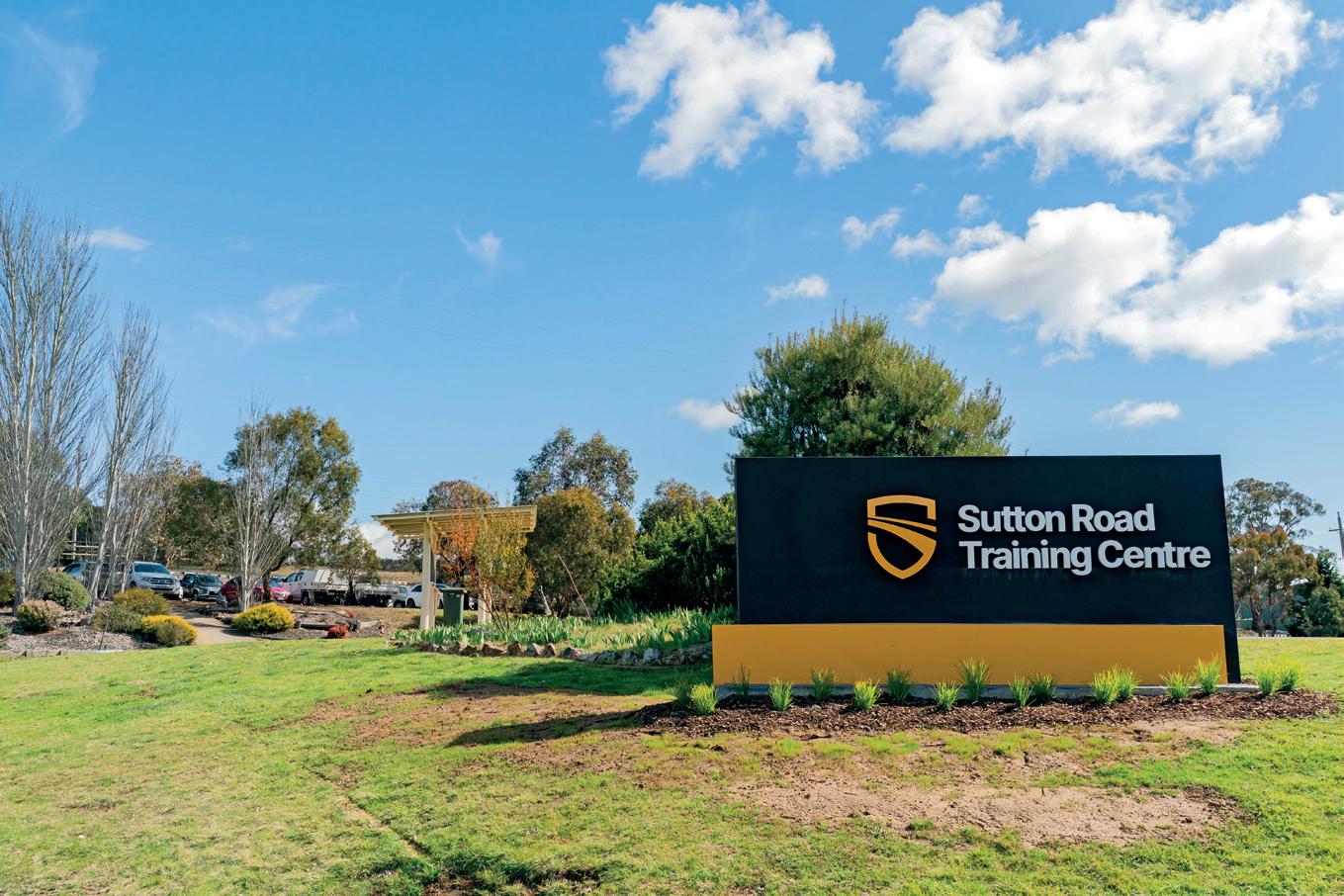
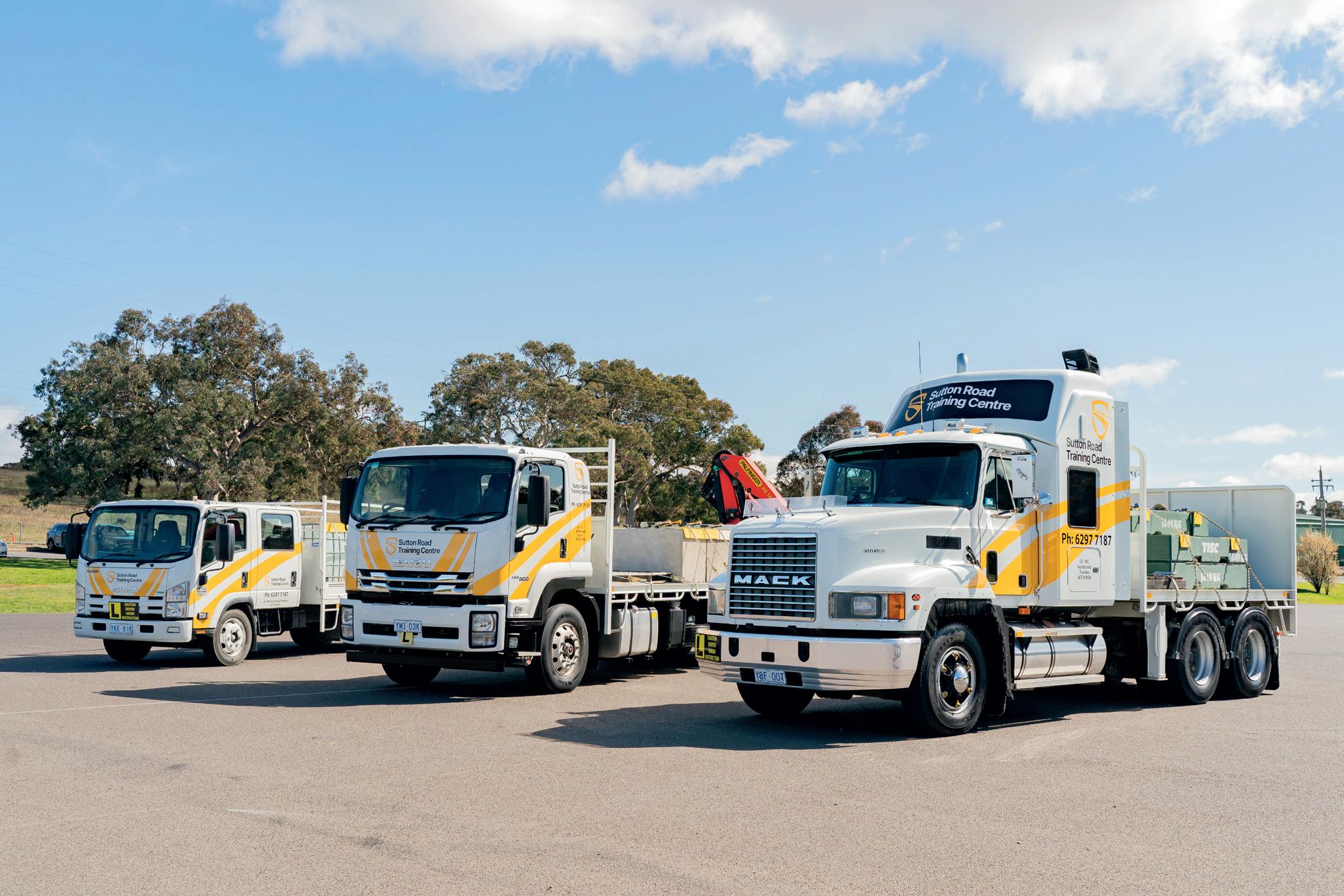
In order to achieve this, you could consider reducing your risk and having piece of mind by having your caravan set-up weighed by one of our professionals while completing the AURTGA001 Drive and Manoeuvre Trailers course.
Or if you love the outdoors and four wheel driving is your thing, consider adding to your existing knowledge with specific skills by attending SRTC’s one, two or three day four wheel drive courses. This will have you ready for your trip or work mission, knowing you have the mindset and skillset to accomplish the task safely. The four wheel drive courses on offer are:
• FWPCOT3325 Operate Four Wheel Drive Vehicle on Unsealed Roads
• FWPCOT3326 Recover Four Wheel Drive Vehicle
• FWPCOT3329 – Per-
form Complex Four Wheel Drive Operations
SRTC, along with its industry partners, envisages being in a position to provide training and support across the transport sector, well into the future. It seeks to grow a culture and mindset of safety for all transport operators.
For those who consider themselves keen to contribute to road safety and would like to educate others, becoming a heavy vehicle driving instructor may be on the cards. For those interested in using their expertise, find out how you could join SRTC or help grow your company’s training capabilities.
For more information, visit suttonroad.com.au or call 02 6297 7187.
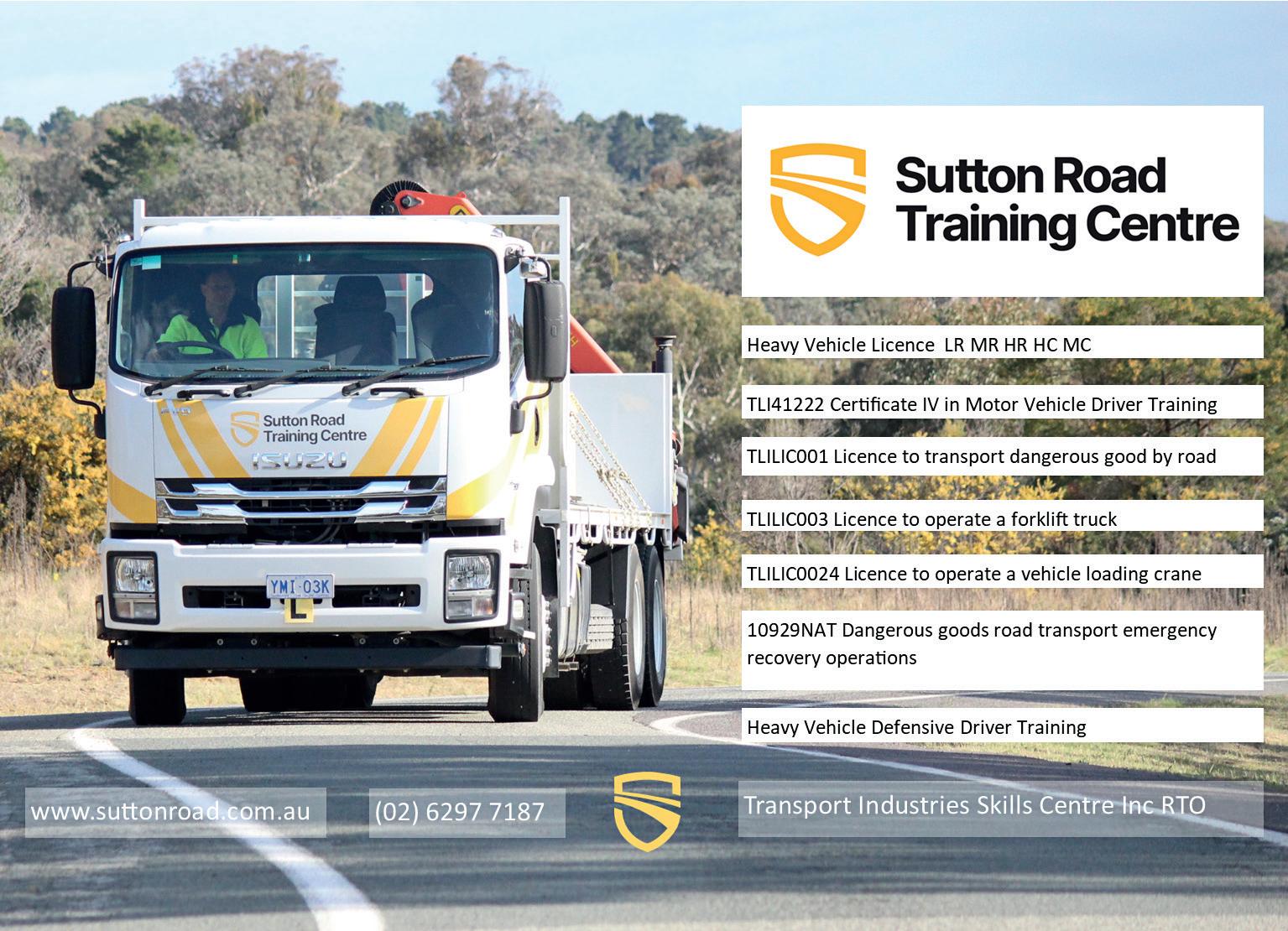

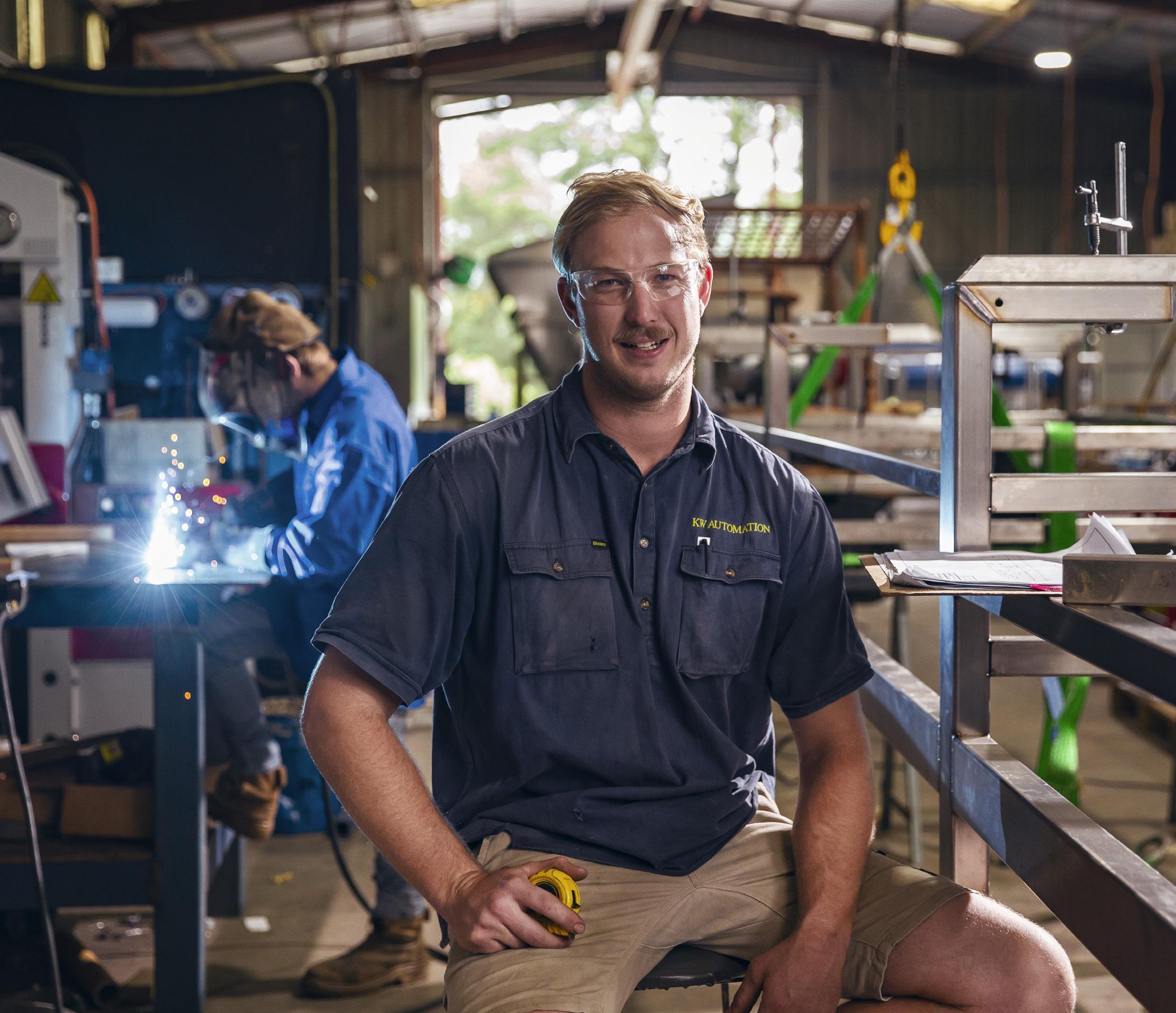
TAFE QUEENSLAND’S POST-TRADE QUALIFICATIONS SET YOU APART FROM THE CROWD WITH ADDITIONAL SKILLS EMPLOYERS WANT, AND ARE OFFERED IN VARIOUS DELIVERY MODES. SCAN THE QR CODE TO FIND OUT MORE TODAY.
Take the guesswork out of finding an apprentice or trainee with TAFE Queensland’s Find Your Apprentice service. This free service will match you with applicants who are job-ready and keen to start an apprenticeship in your industry.
The best part is they’ve often already completed pre-apprenticeship training through TAFE Queensland. That means your new apprentice will come with an existing skill set including essential occupational health and safety training. They’ll also have a foundation level understanding of the job so you can rest assured they’re as passionate about your industry as you are.
Visit the TAFE Queensland website and search ‘Find an apprentice’
Clancy’s Truck and Trailer has taken the top prize in the combined Penske Australia and Cummins-Meritor promotion, winning a Toyota forklift valued at $37,000.
FAMILY owned and operated, Clancy’s Truck and Trailer is a truck repairs, servicing and spare parts specialist, located in the New South Wales suburb of Penrith.
Its story started in 1976, when the late Bob Clancy began working as a mobile truck mechanic and just two years after operated out of a workshop in Kingswood, which marked the start of the company as we know it today.
It was in 1985 that Clancy’s moved to its current location on Batt Street, which paved the way for further growth, with Bob and his wife Sheila Clancy continuing to drive the business forward.
Tragically, in 1999, Bob passed away suddenly. Determined not to let everything he had worked so hard for fall apart, Sheila pushed through the toughest of times and continues to lead the business to this day. More recently, she’s also had her son Scott Clancy by her side, serving as workshop manager and now the next generation coming through with her grandson in his third year as an apprentice diesel mechanic.
Under Sheila’s leadership, Clancy’s became an authorised Western Star and Detroit maintenance, parts and service dealer for Penske Australia, stocking a full range of parts, including Cummins-Meritor.
The workshop carries out minor and major mechanical work such as customer and fleet servicing, replacement of clutches, brake and suspension work, engine rebuilds, and electronic engine diagno-
WE HAVE A LOYAL CUSTOMER BASE – AND MANY OF THEM HAVE BEEN WITH US FOR A LONG TIME, THANKS TO SHEILA AND THE TEAM’S HARD WORK AND DEDICATION.”
DEAN RIXON
sis. The experienced team of workshop staff carry out work on any brand of truck, from their well-equipped multiple bay workshop. Clancy’s also has a large variety of genuine and Allmakes parts on hand to support their long term loyal and growing customer base.
Clancy’s spare parts manager Dean Rixon said, “In the 15 years being with Clancy’s the team have contributed to a large amount of growth in our workshop, repairers, and retail customer base and it’s been rewarding to witness first-hand. There’s a few major fleets we look after, as well as the owner operators too. We have a loyal customer base –and many of them have been with us for a long time, thanks to Sheila and the team’s hard work and dedication.”
Dean added that what sets Clancy’s apart is a dedication to customer service and getting the job done right, the first time, every time. “It’s about listening to customers and what they want; and having that knowledge behind us so we can ensure customers
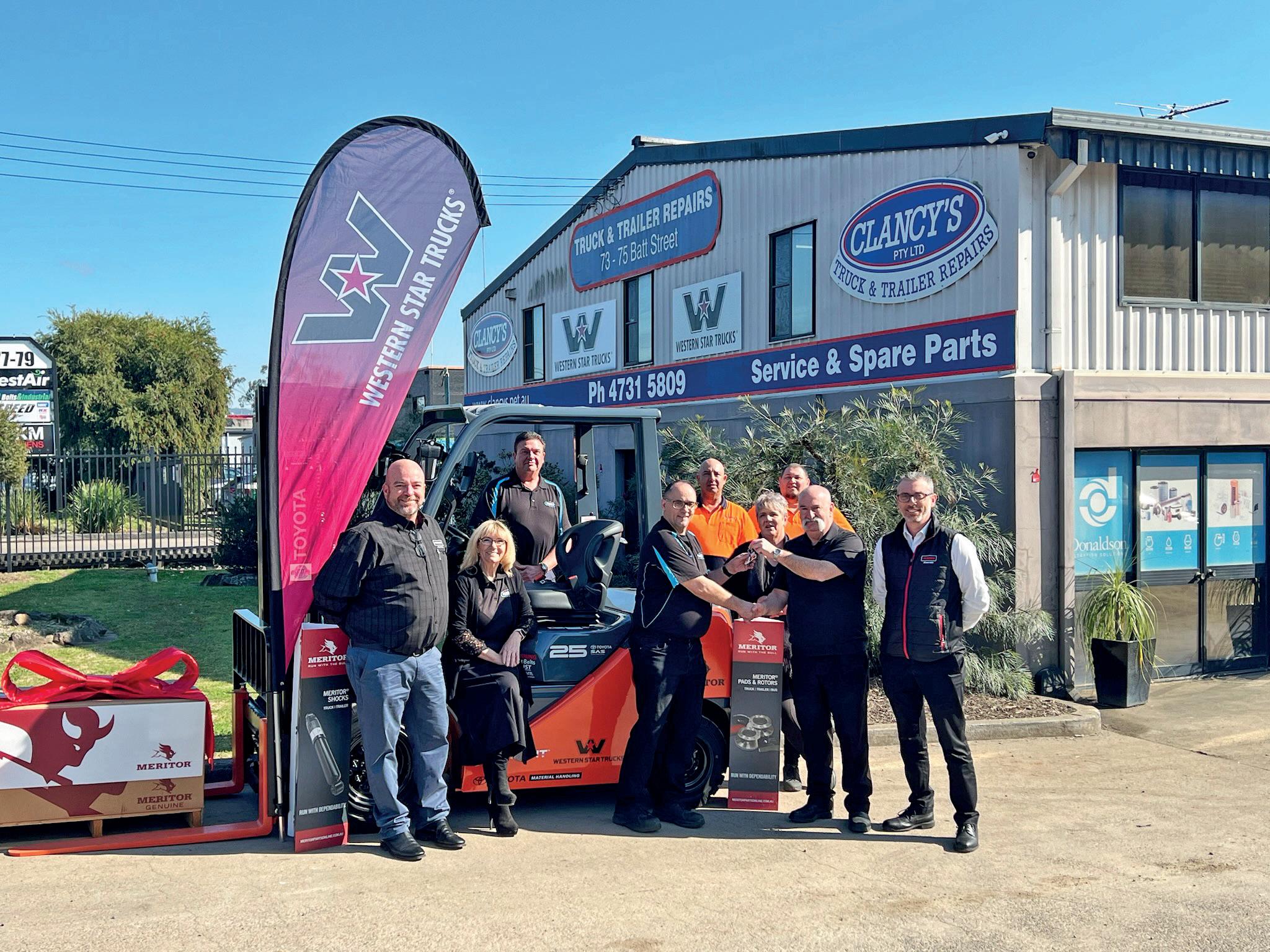
Dean says he’s also seen greater demand for the Cummins-Meritor range of parts, which helped Clancy’s secure the win in the recent Penske Australia and Cummins-Meritor Lift Off! promotion, where a $37,000 forklift was up for grabs. The competition was open
ships across the country.
As Penske Australia’s product manager – aftersales marketing, Phill Corpe, stated: “Clancy’s was a very deserving winner, this fantastic prize was awarded based on highest growth in Cummins-Meritor purchases compared to the same period the previous year, in which Clancy’s far exceed-
“Penske Australia greatly ap preciates Clancy’s efforts, and we congratulate them on winning the major prize.”
Sheila Clancy added, “I would like to personally thank all our loyal customers for their continued support which assisted us in achieving this fantastic result, culminating in taking out the prize of
ward to putting it to good use servicing your needs in our workshop and spare parts department.”
For your Western Star Trucks, Detroit and Allmakes requirements, Clancy’s Truck and Trailer Repairs can be contacted on 02 4731 5809 or parts@ clancys.net.au.
IT has been happening forever and it definitely won’t be changing any time soon: Consumers tend to take a price-conscious approach when purchasing items. It happens in the trucking industry where genuine parts can be expensive, seemingly overpriced compared with non-genuine parts.
So, is there a difference between genuine and non-genuine parts? Is it really worth shelling out the extra dollars purely for genuine parts?
Powering more types of equipment in more markets than any other engine company, Cummins warns there is a difference and that non-genuine parts can have potentially
serious consequences in terms of an engine’s lifespan, resulting in a blow-out of whole-oflife costs.
“When you look at the R&D put into the design and manufacture of Genuine Cummins Parts, the non-genuine suppliers don’t do that, so the risks are obvious,” said Travis Lloyd, aftermarket director for Cummins Asia Pacific.
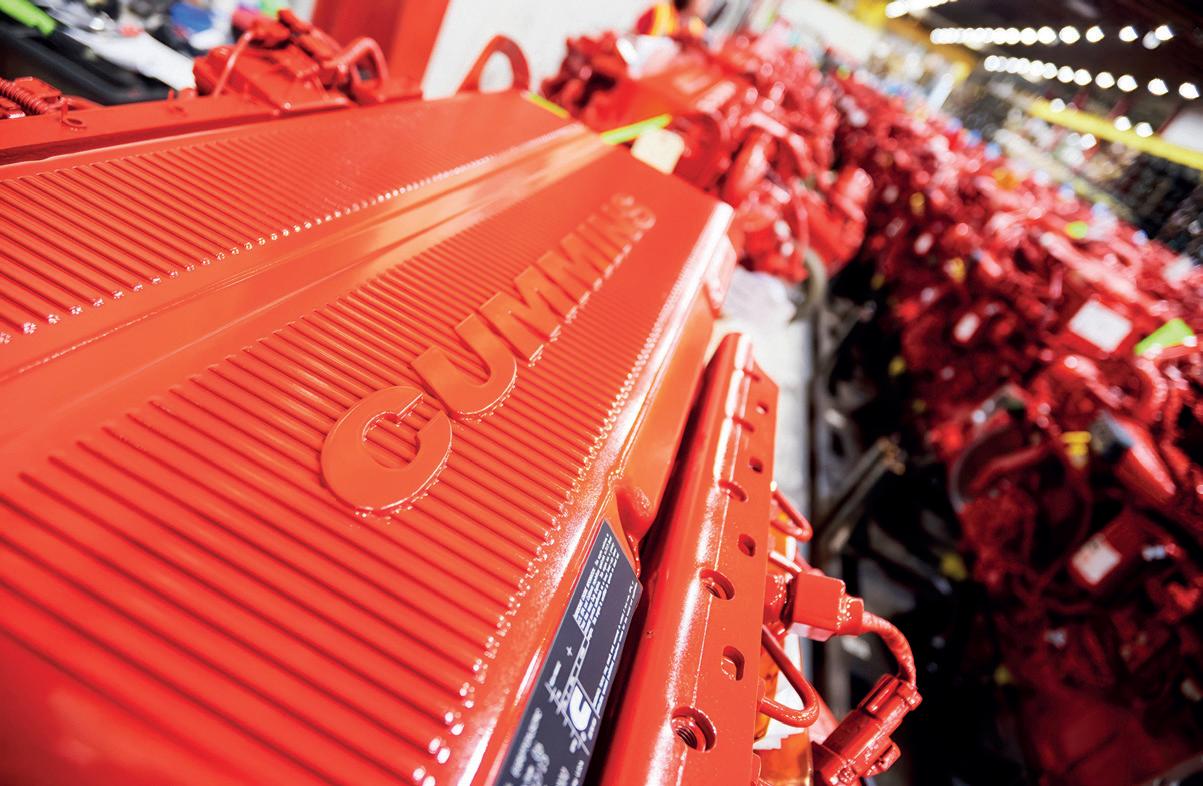
He points out that Cummins engineers conducted lab analysis and destructive testing on over 300 non-genuine overhaul kit components for ISX and N14 engines, including pistons, piston rings, piston pins, cylinder liners, main bearings, connecting rod bearings, head gaskets and injectors.
Of the over 300 non-genuine parts tested, none met all Cummins Design Specifications.
“Non-genuine parts are usually reverse-engineered with poor quality materials
NON-GENUINE PARTS ARE USUALLY REVERSE-ENGINEERED WITH POOR QUALITY MATERIALS AND LOOSE SPECIFICATIONS.”
TRAVIS LLOYD
and loose specifications,” said Lloyd. “They are not designed or tested to Cummins’ exact ing engineering and quality standards and this can lead to rapid wear, poor reliability, high fuel and oil consumption, excessive emissions and even engine failure.
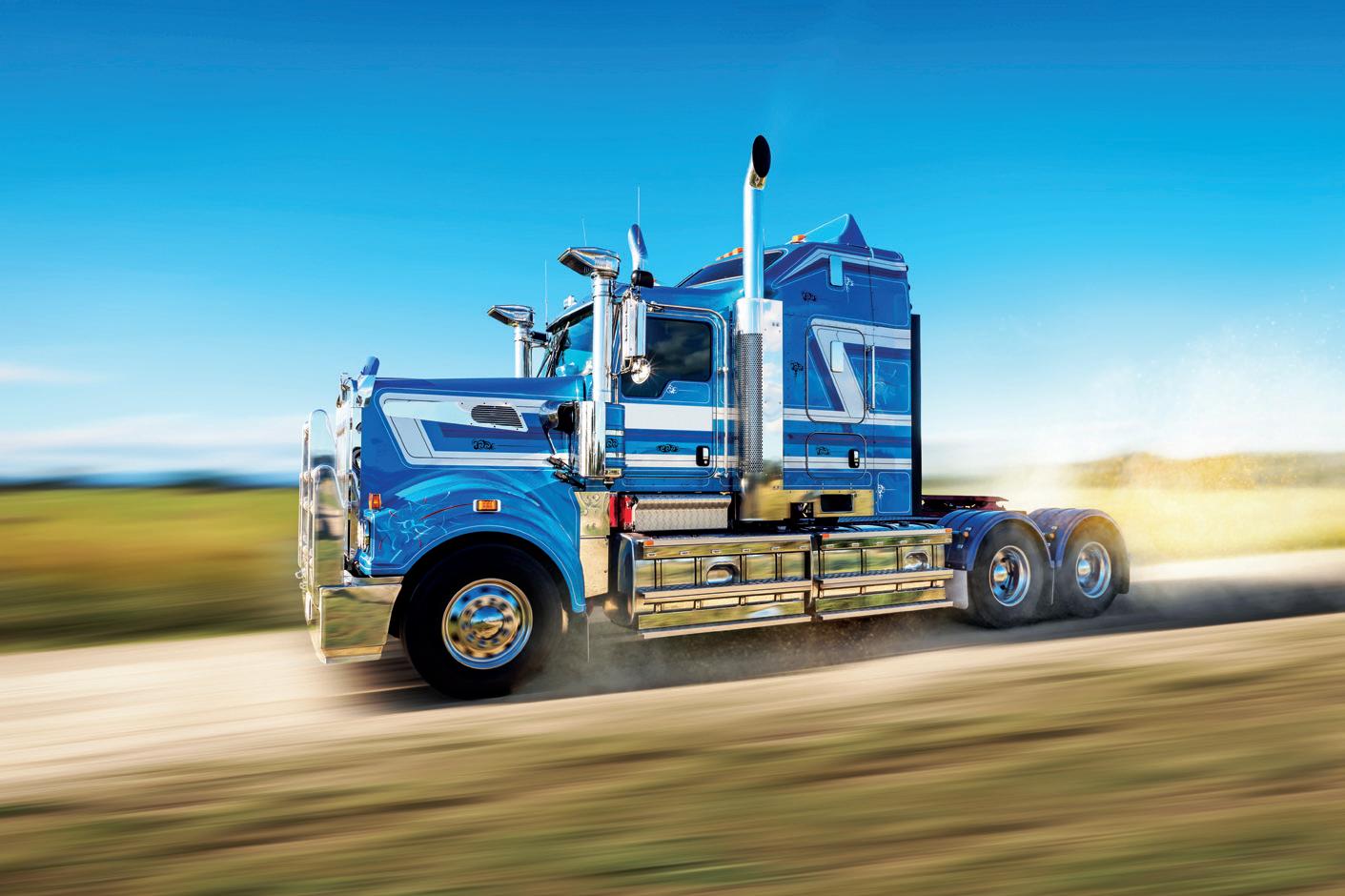
“Non-genuine parts can also pose a safety risk if they are poorly produced or made of substandard materials. For example, fire risk or electrical failure may result from faulty components.”
He points out that while manufacturers of non-genuine parts may claim their products will work in a Cummins
engine, the fact is they are not fit for purpose. Only genuine components are built to meet the original factory specifications while using the latest materials, component designs and manufacturing techniques.
“With
and reliability of the parts. In the event of failure, Cummins takes responsibility in providing warranty.”
STARTED nearly 30 years ago, when it imported the first TATRA off-road truck into Australia, this family owned and operated business continues to go from strength to strength.
Following the passing of its founder Larry Gill a few years ago, the team at Offroad Trucks Australia is continuing his legacy – led by his daughter Amber Gaden, who serves as owner and managing director.
She joined the business early on and was by her father’s side every step of the way, as the business grew and evolved.
With a new purpose-built premises and new truck mod-
is the exclusive importer of TATRA’s range of off-road vehicles. Manufactured in the Czech Republic, TATRA is known throughout the world for its reliability, even in the most challenging of extremes.
TATRA Trucks was founded in 1850 and is one of the oldest vehicle producers in the world. Its origins lie in military use however it’s now become an established leader in the world of off-road trucks.
With the ability to customise vehicles to suit varying needs, in Australia, TATRA branded vehicles can be found working in industries as diverse as mining, defence, fire and emergency services,
to stand up to the most trying conditions make TATRA vehicles well suited to the Australian landscape.
As Amber explained, “Offroad Trucks Australia definitely started out as a very small family business. It was Dad who single handedly got it off the ground and then I came on board very early on. From the two of us and a mechanic in the beginning, we now have 35 staff,” said Amber.
“Since Dad passed two and a half years ago, the company has continued going from strength to strength, and that speaks highly of our team. Everyone has really rallied
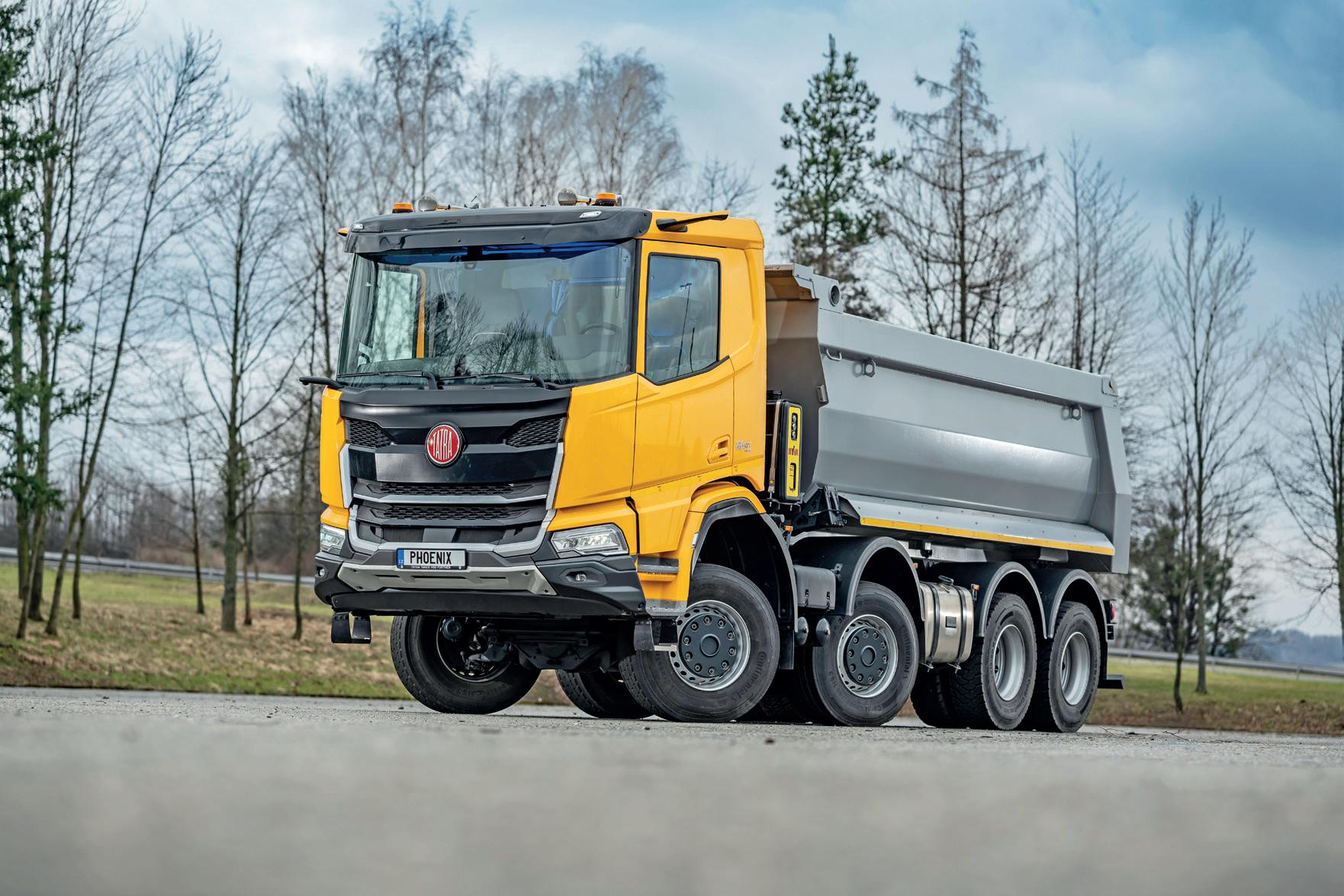
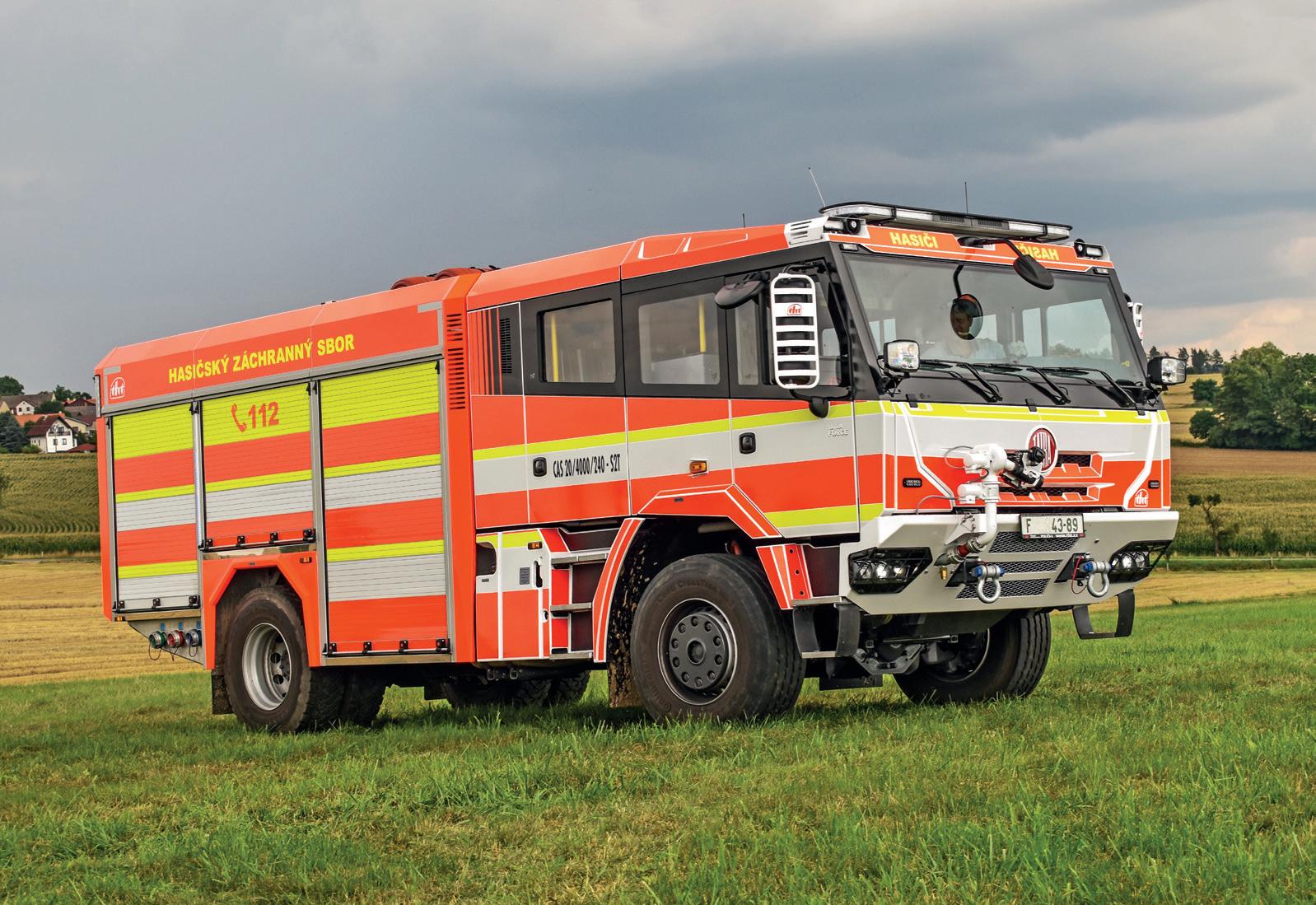
The last few years at Of froad Trucks Australia have been marked by exponential growth and expansion, as the company has tapped into new markets. While Offroad Trucks Australia has traditionally focused on the mining industry, its vehicles are now found working in more and more different fields.
Offroad Trucks Australia moved into its new facility just this month. Located in the Perth suburb of Forrestdale, the site comprises a 10-bay workshop and 2000 square metres of spare parts warehousing, as well as extensive office space.
“The business was at its previous site for over 20 years. With the growth we’ve had over the years, we tacked on
another building here and another warehouse there. The goal of the new facility was to bring our whole team together again under the one roof,” she said.
Along with importing TATRA vehicles, Offroad Trucks Australia carries a full range of spare parts for the three TATRA models currently on offer.
“At the warehouse, we carry about $9 million worth of spare parts stock. With two new Euro 6 TATRA models coming to Australia next year, we’ll need even more spare parts in order to service them, so this new facility ensures we have plenty of room for growth,” Amber added.
From the new models, Amber says, customers can
expect to see a range of im provements. “They will feature modernised cabs with a more luxurious fit-out, added creature comforts, more modern technology and Euro 6 compliance – but they’ll also feature our robust suspensions and independent axles that give us our name and our offroad capability.”
The first of these Euro 6 models is due to arrive later in the year for in-field testing before being rolled out for serial production in 2025. “Before they hit the market, we’ll really be putting these vehicles through their paces. We’ll be testing them in Australian conditions, taking them out bush, to the tough red dirt roads, in some of the harshest terrain.”
AS one of the country’s largest family owned and operated transport companies, Wickham Freight Lines takes a great deal of pride in the presentation of its trucks.
Operating out of depots that include Warwick, Brisbane, Sydney, Melbourne, Bundaberg, Glen Innes, Albury, Armidale and Tamworth, Wickhams transports refrigerated meat, farm produce, general and express freight across the east coast.
Wickhams was started by Peter and Angus Wickham in 1978, after they purchased their first brand new Kenworth to transport potatoes from their family farm.
Today the business is run by Graham Keogh and Darren Eather, who have both served as company directors since 2000.
Though Graham’s history with the company goes back much further. He joined Wickhams in 1980 at just 18 years of age, starting out as a truck driver – following in the footsteps of his father, grandfather and uncle. From behind the wheel of a Kenworth K125, he would transport potatoes to supermarkets in Brisbane.
Eventually Graham worked his way up to operations manager in 1993 and seven years later into the role of director.
As Graham explained, along
with providing exceptional service, the company’s trucks need to look the part and be able to “do the business” too.
“For us, the presentation of our trucks is paramount. It’s your brand – it has to be right and it has to look right,” he said.
“With the presentation of our equipment, we try and make sure it’s always 10/10.
That’s why Heavy Boys Detailing fits into our program fairly well.”
Wickhams came across Heavy Boys Detailing almost 12 months ago after hearing about the business through word of mouth.
Started by Rhys in June 2022, Heavy Boys Detailing is completely mobile, offering a full range of interior and exterior detailing and polishing services, for all makes and models of trucks and heavy machinery.
Though the business is based in Logan, it travels as far as Warwick, the Sunshine Coast, and all the way down to Tweed Heads.
Wickhams has been using Heavy Boys Detailing for trucks at its Warwick and Brisbane sites.
“Heavy Boys Detailing do our aluminium polishing and cap detailing, and also detail any trucks before they go to auction,” said Graham.
“They might come out to
Warwick and work there for a whole week or do days here and there in Brisbane.”
For Graham, the flexibility offered by Rhys and his team has also been a winner. “We’ve been using Heavy Boys Detailing for a while now. They’re good at what they do and work in with when the equipment is available. Whether it’s a Saturday or Sunday, they’re very flexible in accommodating our needs. That’s a big thing for us – and they’re mobile, so they come to you.
“Anyone who is any good in the industry knows who they are. Truck detailing is a pretty small industry when it comes to who is good and who isn’t!”
Graham adds that the quality of work offered by Heavy Boys Detailing is excellent.
“They’ll always give us a quote as an indication before we start and then if something changes or the job gets bigger, we discuss it and go from there, so it’s a pretty open approach.”
When it comes to keeping the company’s trucks looking their best, Graham says: “Heavy Boys Detailing are a pretty important partner in the whole process.”
For more information about Heavy Boys Detailing and its range of services, or to book, call 07 2103 5865 or email heavyboysdetailing@ outlook.com.
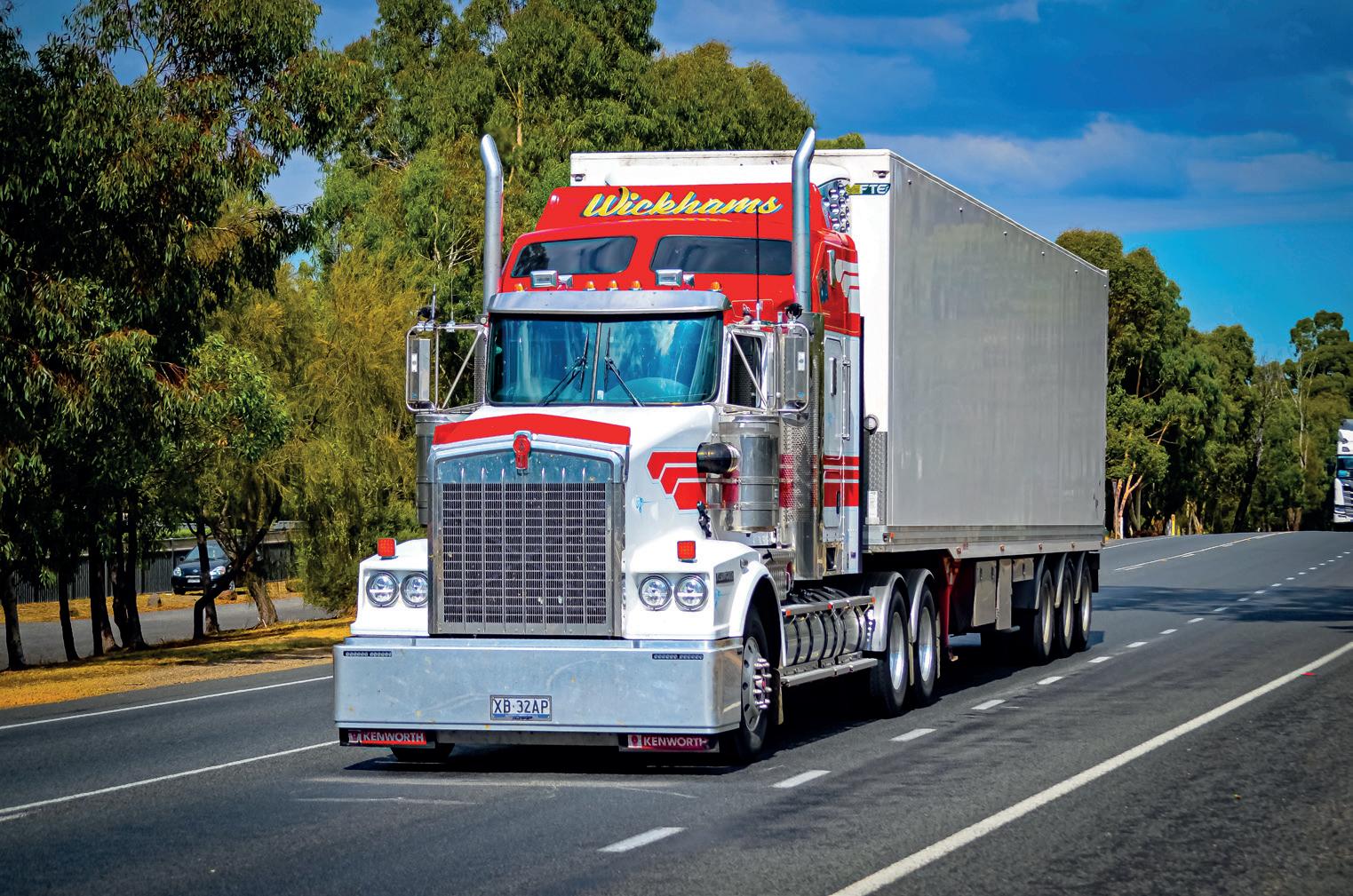
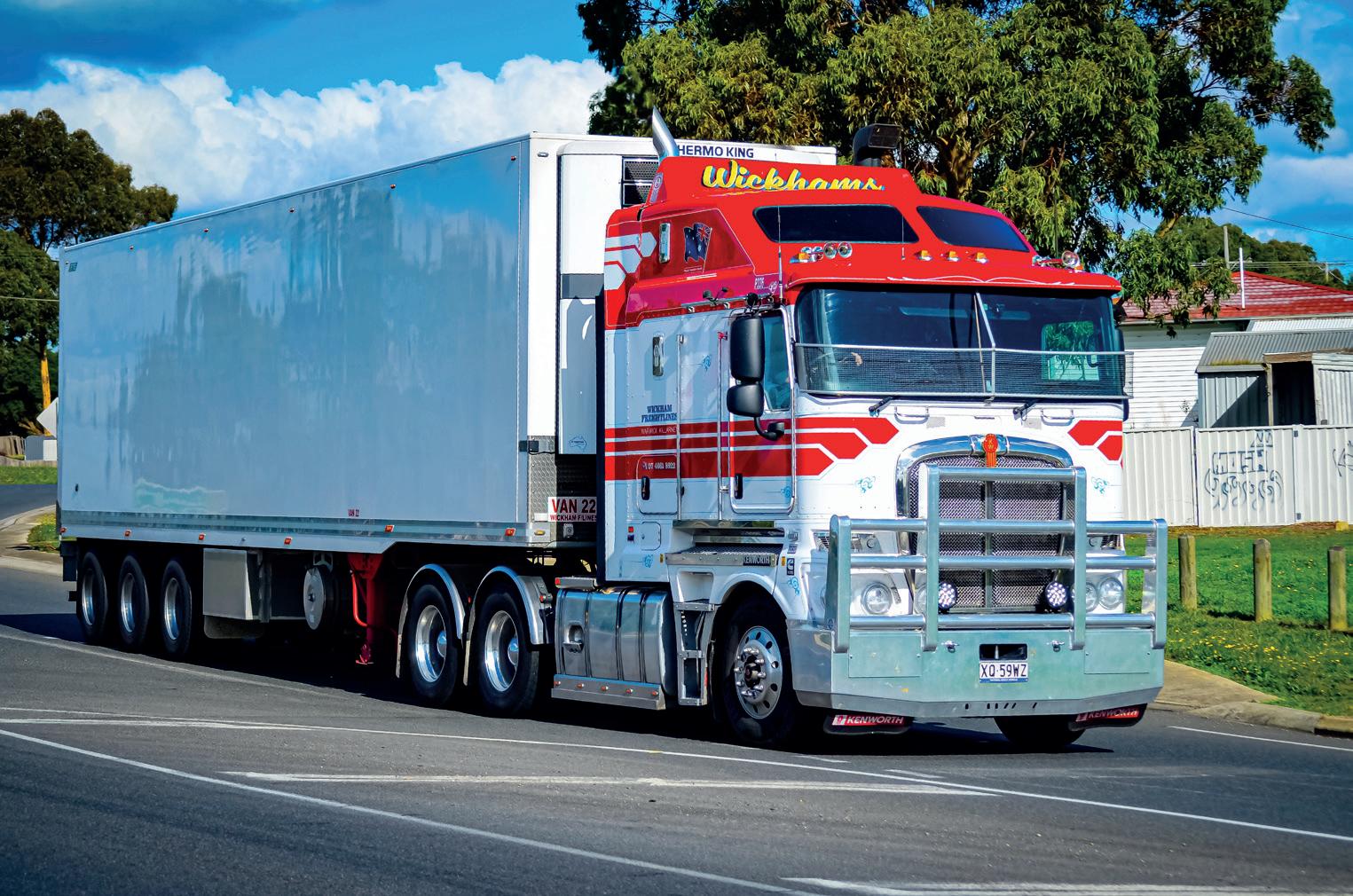
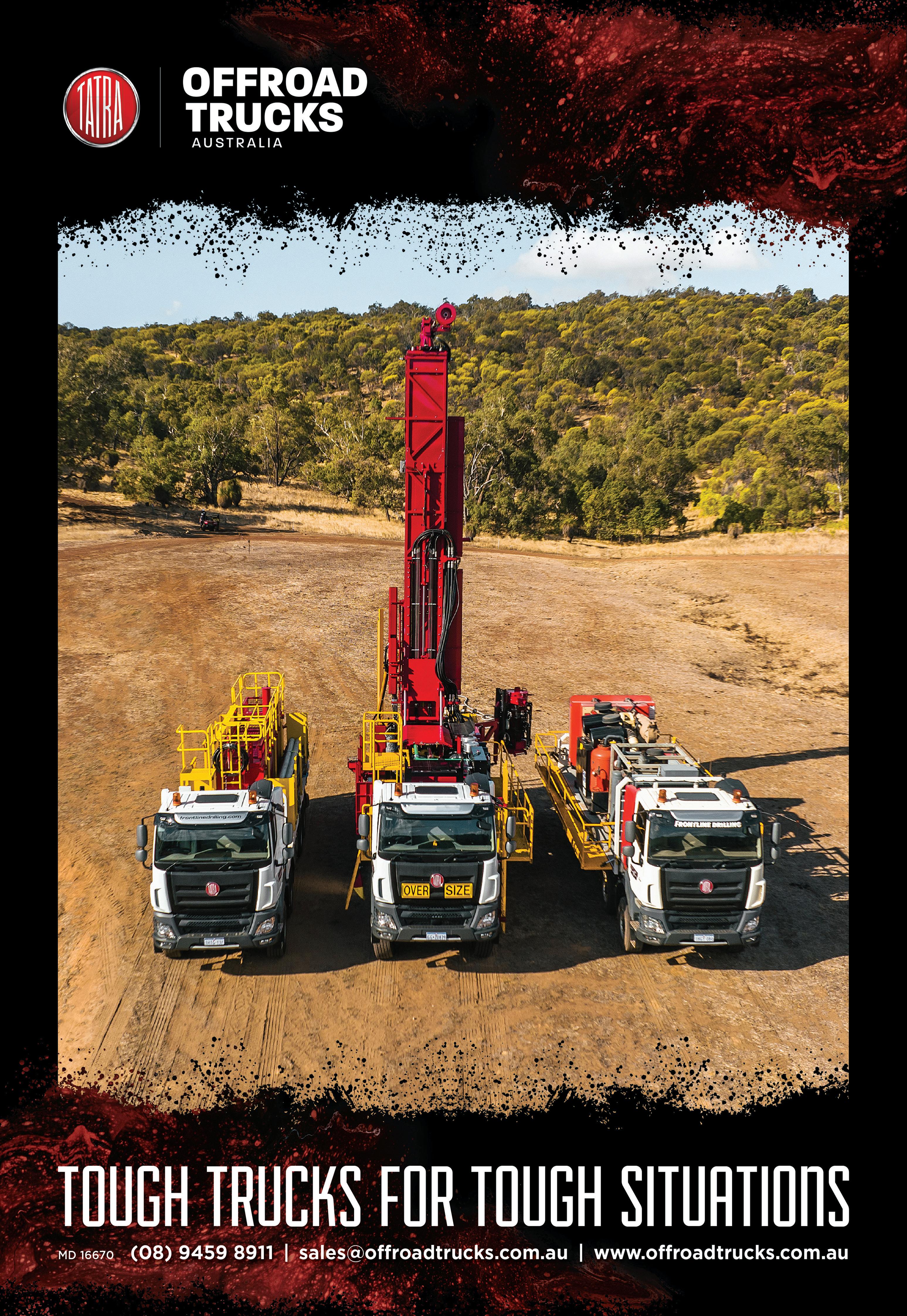
BY DANIELLE GULLACI
T HE Lowood Truck Show celebrated a triumphant return on Saturday August 17, with the small Queensland town abuzz for the popular event.
Though it was a nervous few days in the lead-up, with heavy rains threatening to derail plans, the clouds disappeared, making way for clear blue skies.
Organised by veteran truckie Rob Liston, this marked the 14th edition of the Lowood Truck Show, which was back after a one-year hiatus.
The day began with the popular parade, where hundreds of trucks made their way through a 6km loop of the town, including through Main Street, before culminating in their entry into the Lowood Showgrounds, where visitors enjoyed a jampacked program of events and entertainment.
“It was an awesome day with a great atmosphere and a massive turnout of over 6000 people and 422 trucks,” said Rob.
“There was about 40mm of rain in the few days leading up to the show. The rain only stopped on the Thursday morning, so it was a bit iffy as to whether we would be able to use the showgrounds, as it’s all grassed,” he revealed.
“We didn’t want to damage the Showgrounds by having all these trucks driving on there so we assessed it on the Friday morning and were given the thumbs up. Luckily it all dried up really well.
“Ison Haulage from Chinchilla arrived on the Friday afternoon with a whole heap of gear including floats, super tilts and a new set of AB triple side tippers. They had the heaviest equipment at the show and it didn’t do any damage to the grounds, so we
knew we were okay for the main event.”
Ison Haulage also took out the coveted ‘Lead Truck’ in the parade. The hotly contested spot was awarded to the highest bidder, with Ison Haulage placing the winning bid of $6300, leading the long convoy of trucks with their Kenworth C500.
“The streets were lined with people. Lowood is only a small town. The Lowood Truck Show is even bigger than the Lowood Show. It gets a lot of community support, they love the event,” said Rob.
Each year, the Lowood Truck Show chooses a charity to partner with. This year all proceeds were donated to Dementia Australia.
Though general entry and truck registration is free, people are invited to make donations. Stall holders – of which there were around 50 this time around – aren’t charged a fee either, but instead are asked to make a donation, with many choosing to donate goods for the Truck Show Auction, which again raises money for the chosen charity partner.
As Rob explained, businesses throughout the community get on board to help raise further funds too. “The local coffee shop donated $1 for every coffee sold, so they get right into it. And the hardware store and hotel donate to the show too. The Lowood Truck Show brings so many people into the town, so the community really gets right behind it.”
Another highlight are the awards presented on the day, with the major trophy being Truck of the Show. This year that honour went to Warren Ahern at Ahern Haulage for his immaculately restored 1985 Kenworth W-model.
“Warren is from Minden, about 12 kilometres from Lowood. He’s been to the
show a few times and not long ago finished restoring this truck,” said Rob.
“Warren has rebuilt it from the ground up and it’s a real credit to him. He’s maintained that ‘old school cool’ look with this truck. Anyone who knows Warren, knows he does a great job when he rebuilds a truck. He also has a 1984 Kenworth SAR ‘Nugget’, which is at the Queensland Transport Museum in Gatton, so he couldn’t get that one out for the show.”
The other major award presented on the day is the Charity’s Choice Award, which was this year presented by Dementia Australia. It went to Steve and Tracey Armstrong at STA Trucking for their striking near new black and pink Ken worth T909. Just a few weeks earlier, that same truck won the award for Best Custom Paint at Casino Truck Show.
Rob explained that some additional awards were in troduced for this year. “We did a special award this year, Top Support for 2024. It went to Scott Wilson. He’s a truck owner and has been to every Lowood Truck Show since we started – and he always puts his hand up to help on the day too. He never fails to turn up and show his support so we gave him this award, which really blew him away.”
With the Lowood Truck Show done and dusted for an other year, the date has been announced for 2025 – Satur day August 16. “We’re hoping it’s going to be even bigger and better,” said Rob.
Though in the meantime, he has plenty more on his event calendar too. “We were invited to jump on board with Meatstock in Toowoomba next March, so we have a truck show we’ll be organising as part of that event. We’ll also be launching our first Chinchilla Truck Show. That will happen around April/May.”
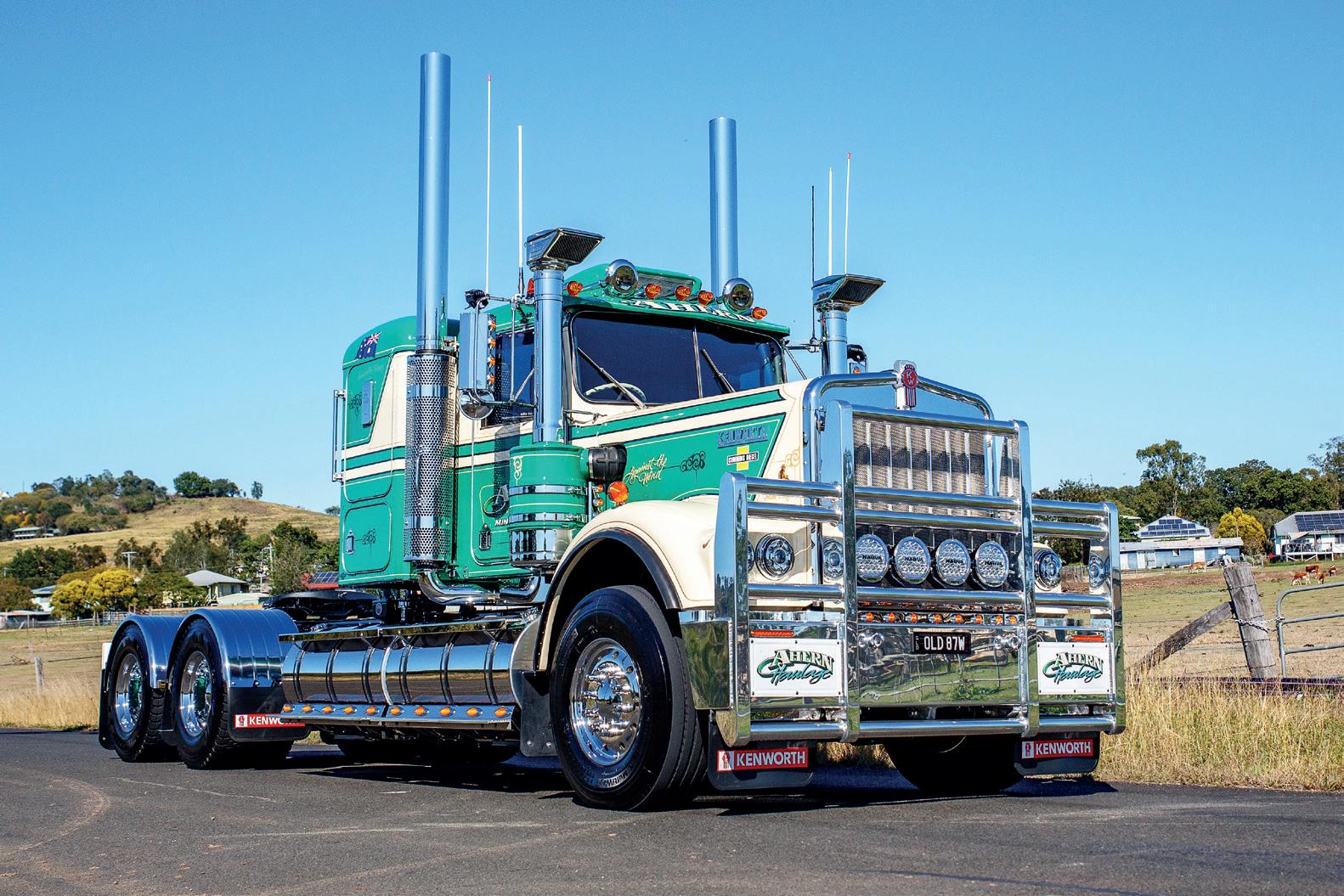
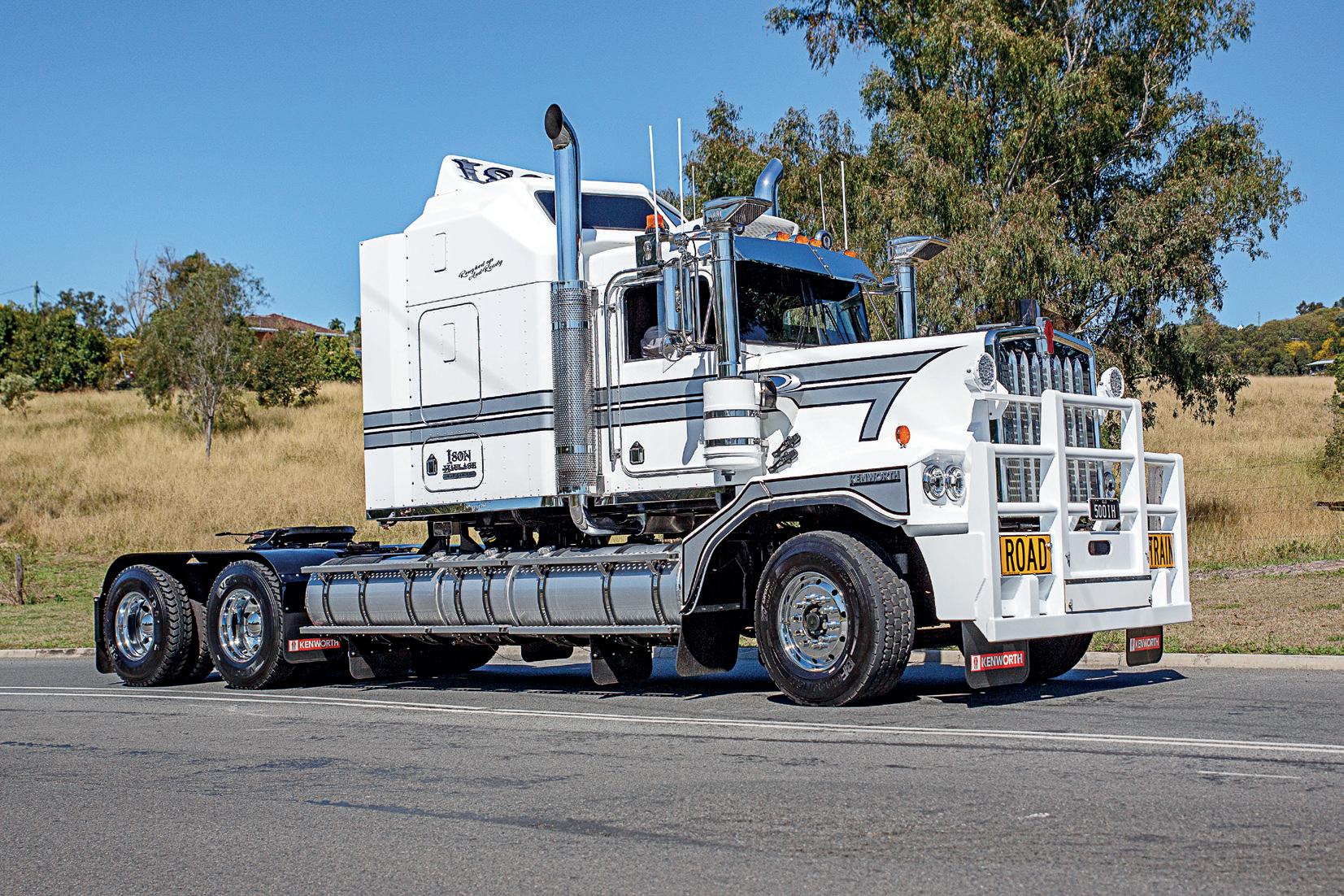
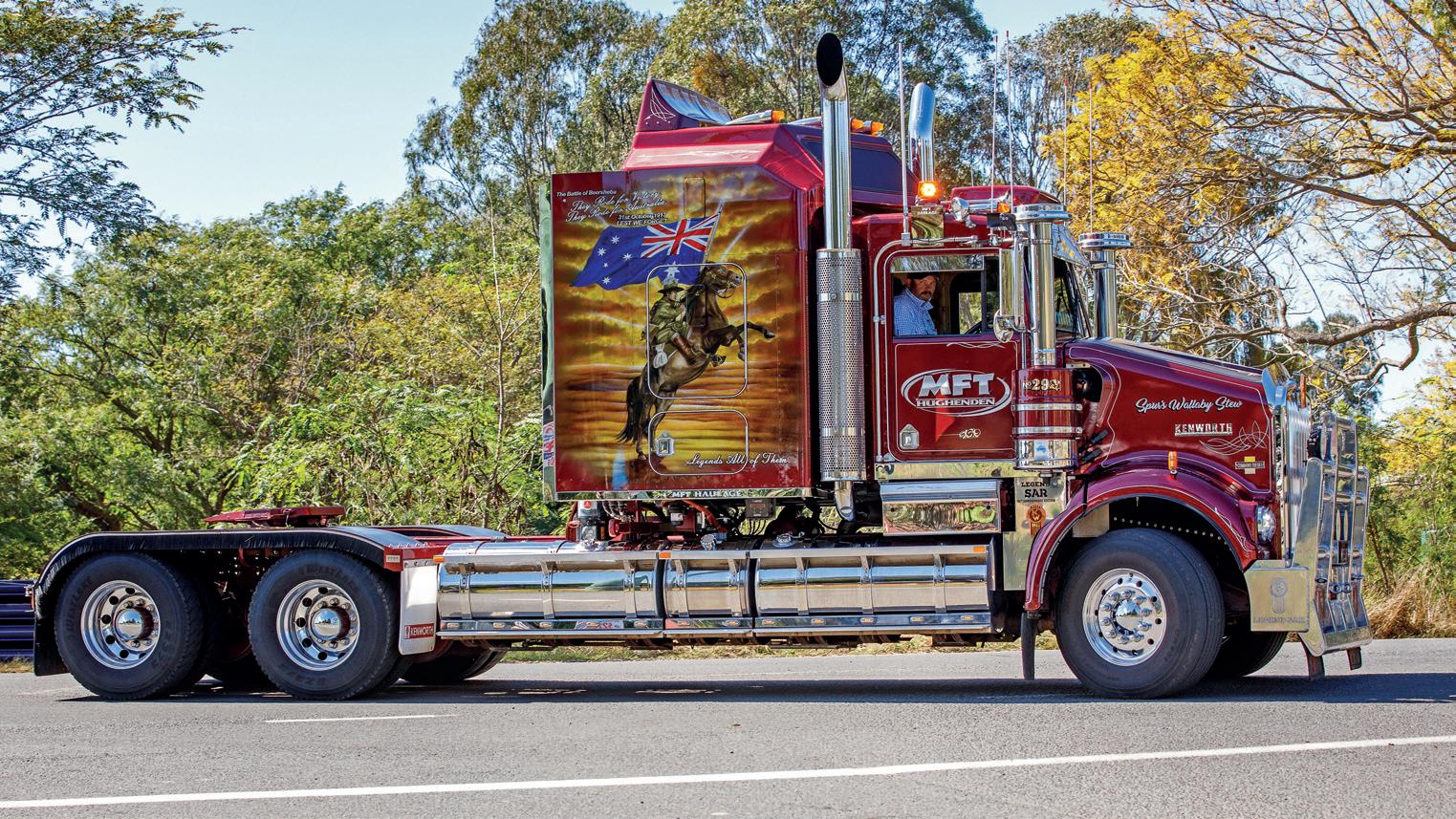
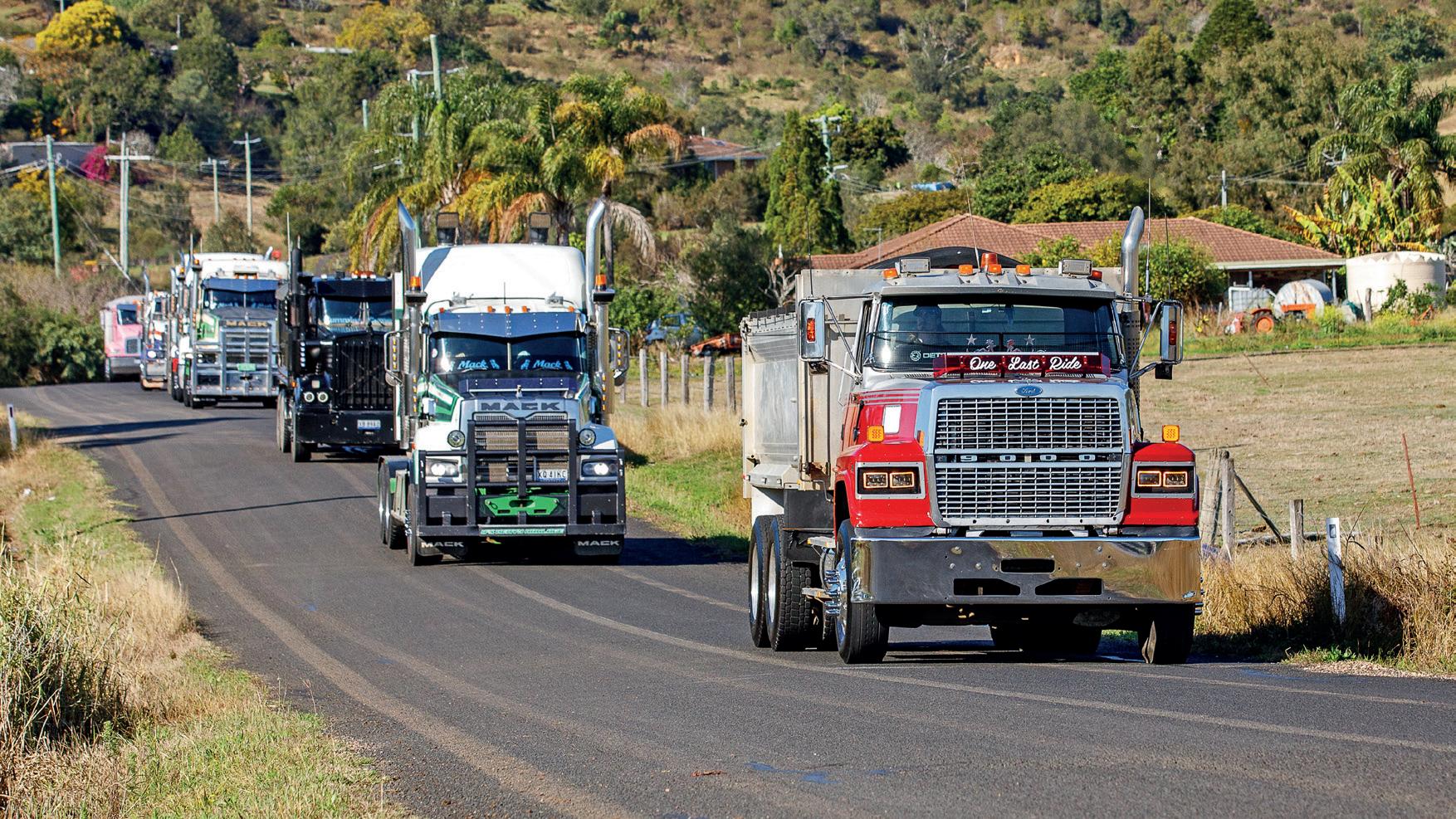
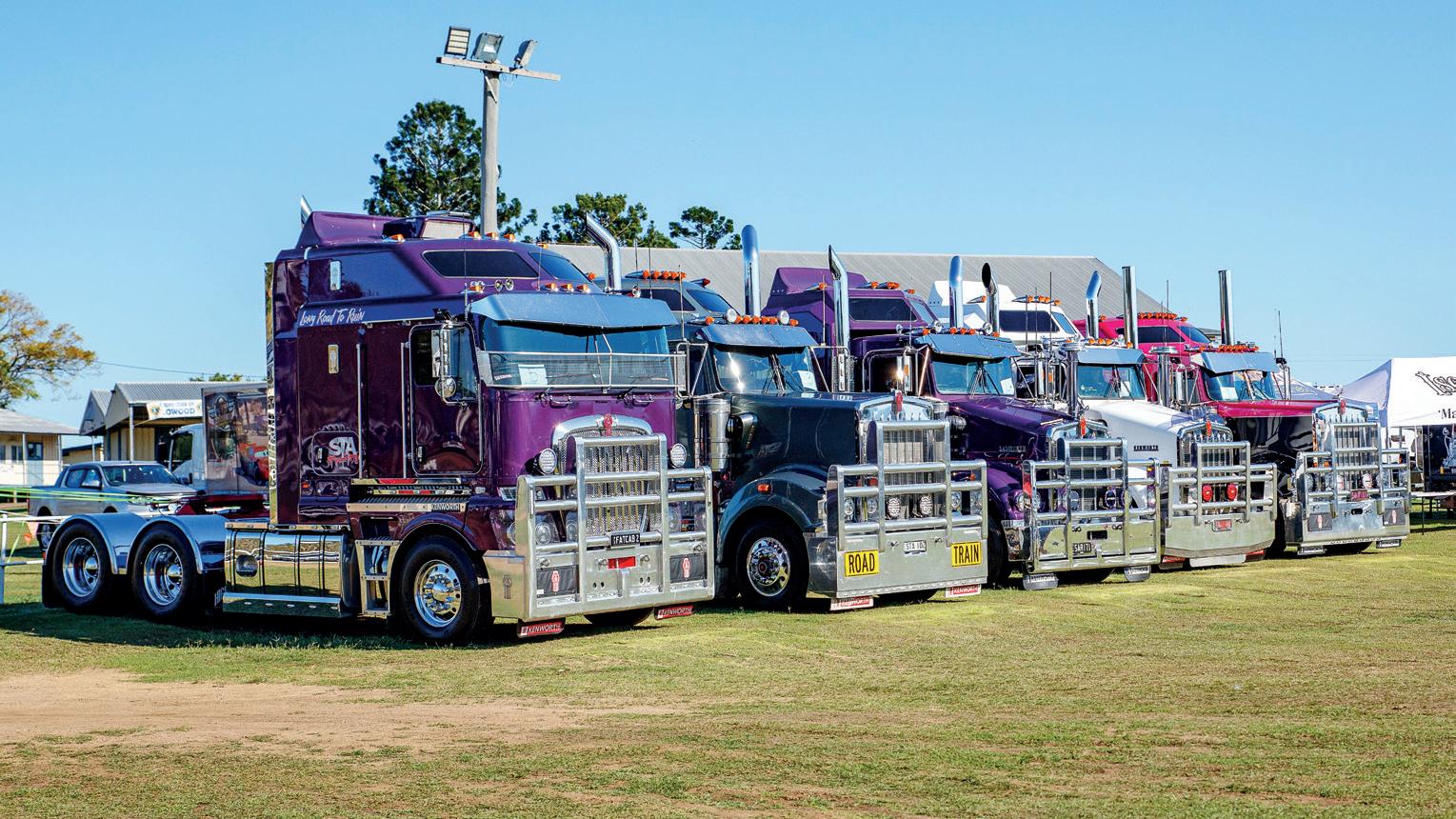
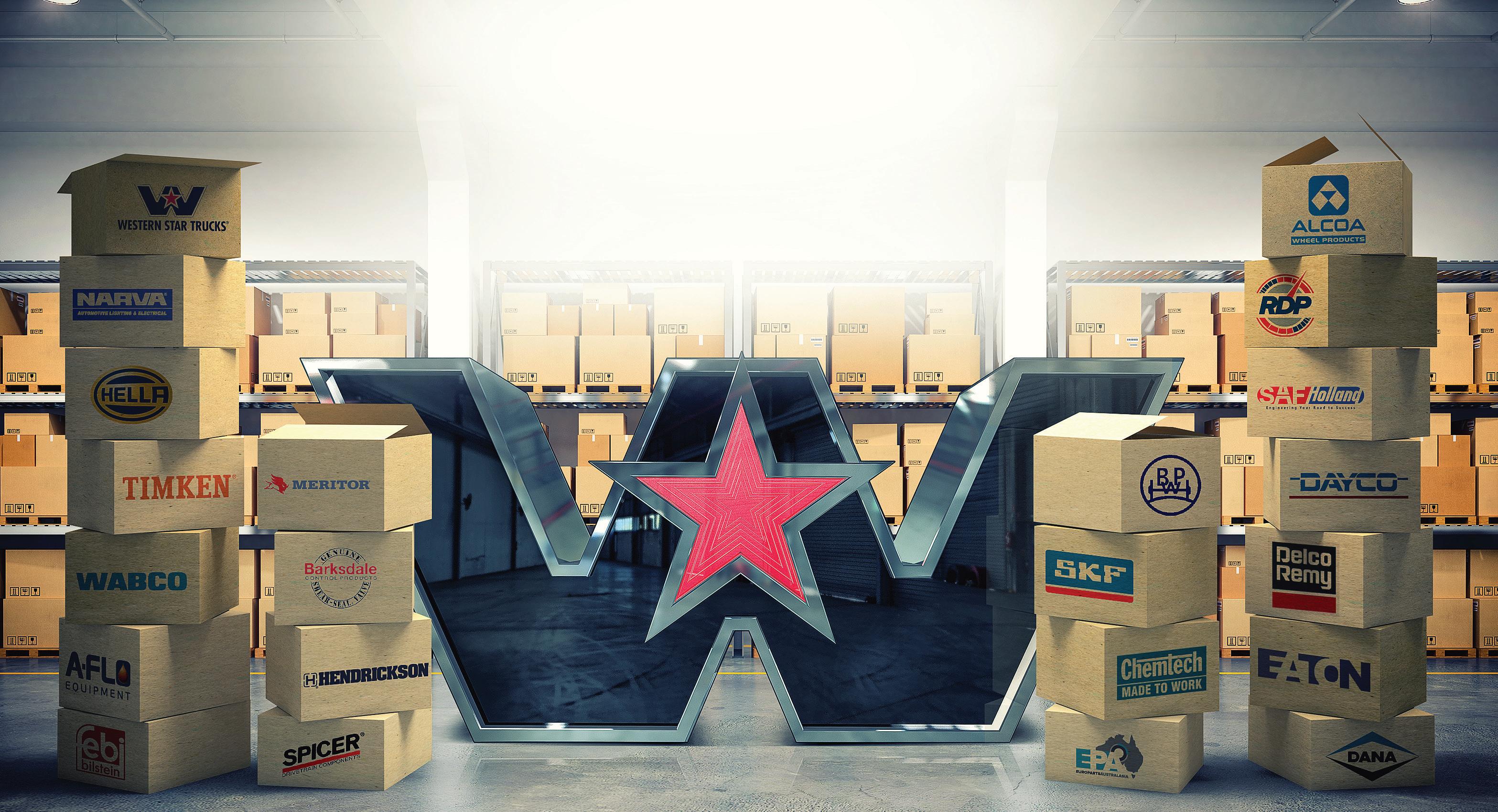
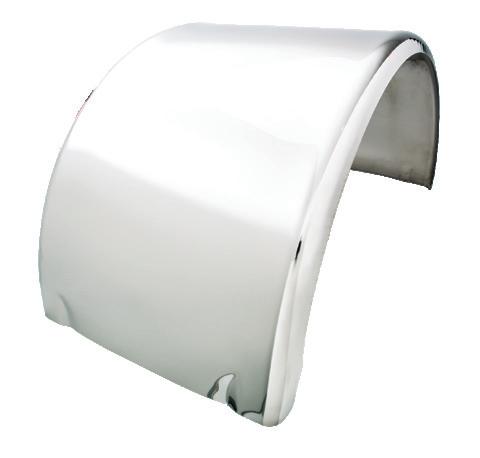
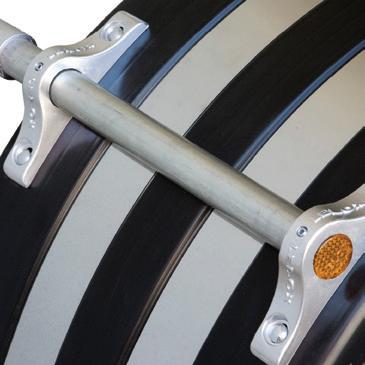
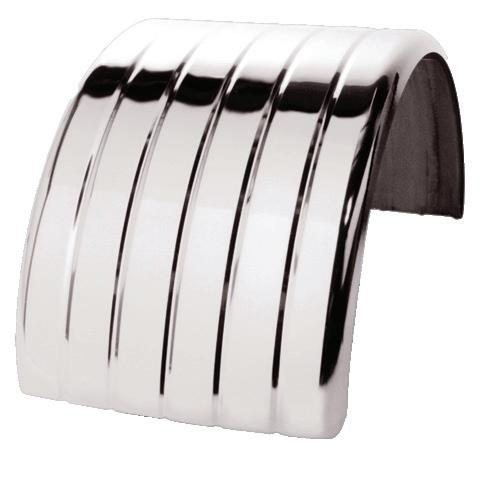
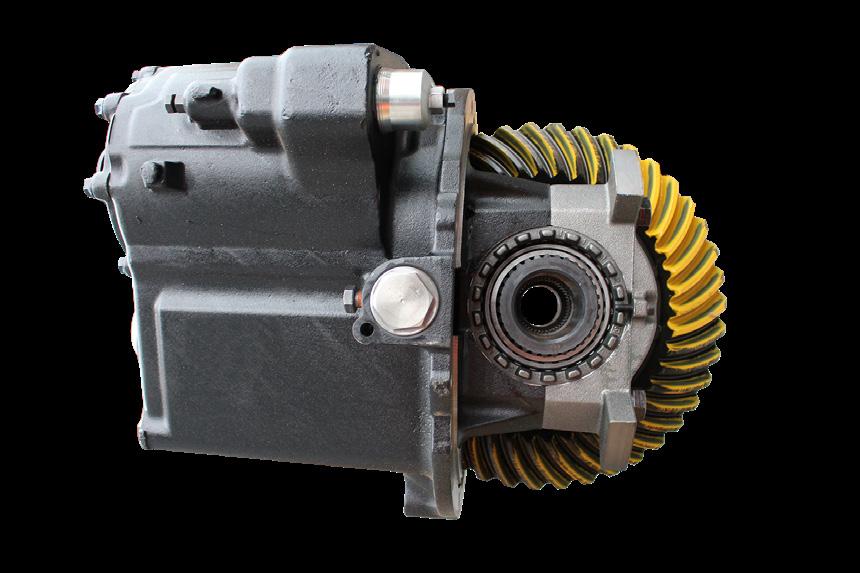


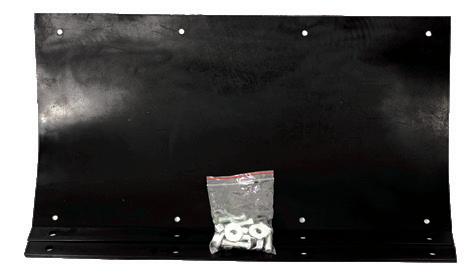
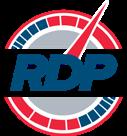
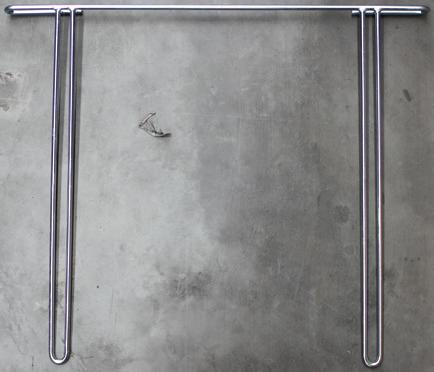
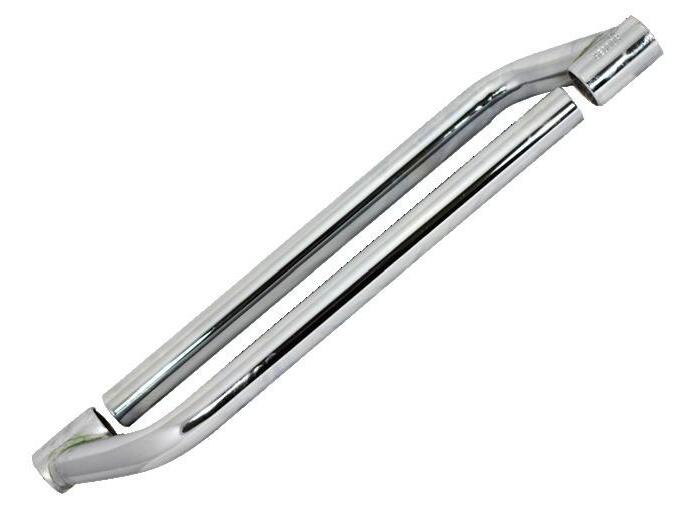


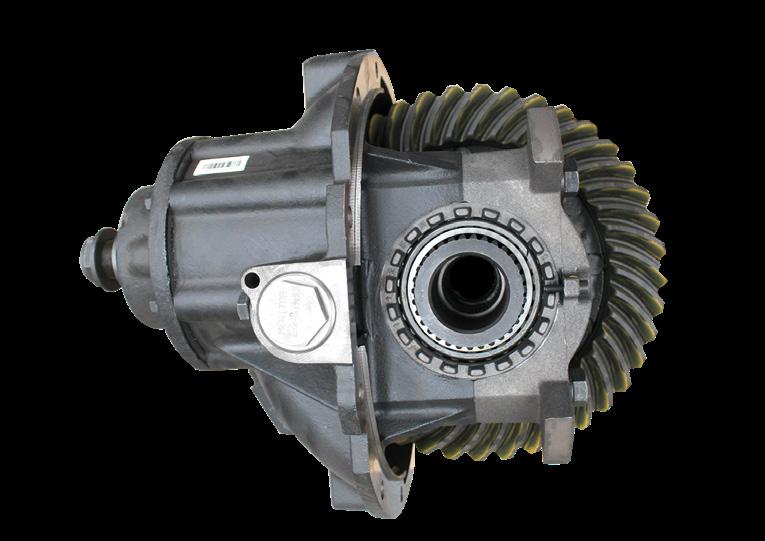
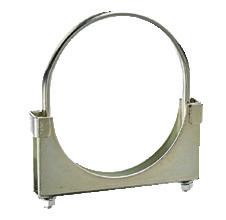
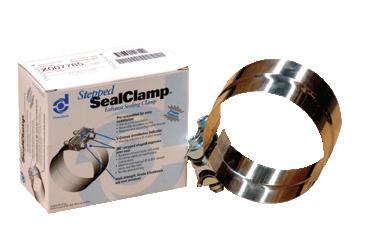
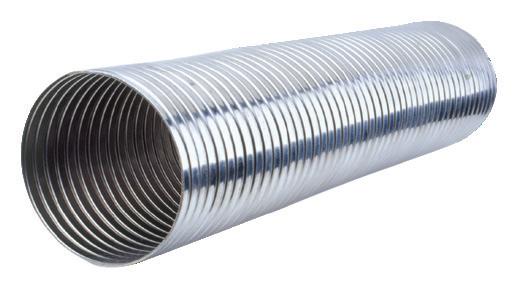
BY KAYLA WALSH
THIS year’s Mackay Konvoy 4 Kids saw record attendance, with 201 trucks taking part in aid of children’s charity Variety.
Trucks left Sarina Showgrounds at 10am on Sunday August 11, travelling along the Bruce Highway and ending
up at Mackay Showgrounds for a day of family fun.
The honour of lead truck was given to J.J. Richards & Sons Waste and Management, who donated $8000, making them the event’s top sponsor.
Centurion, WMT Transport, Kinetic, Veolia and Western Truck Group, Zarb Transport, Redline Trans-
port and Shannon’s Insurance weren’t far behind in the convoy, after they also rallied round to make sizeable donations.
The total money raised has yet to be confirmed, but convoy organisers Madonna Stevens and Johanna Wood said they were thrilled with the turnout and fundraising efforts.
“We think we’ve raised about $17,000,” Madonna said. “We were very happy with how the event went, we had a bit of rainy weather but there was still a great turnout and everyone enjoyed the day.”
Apart from taking in the trucks on display, attendees enjoyed live music, food and drink, and market stalls, with an animal farm, face painting and jumping castles for the
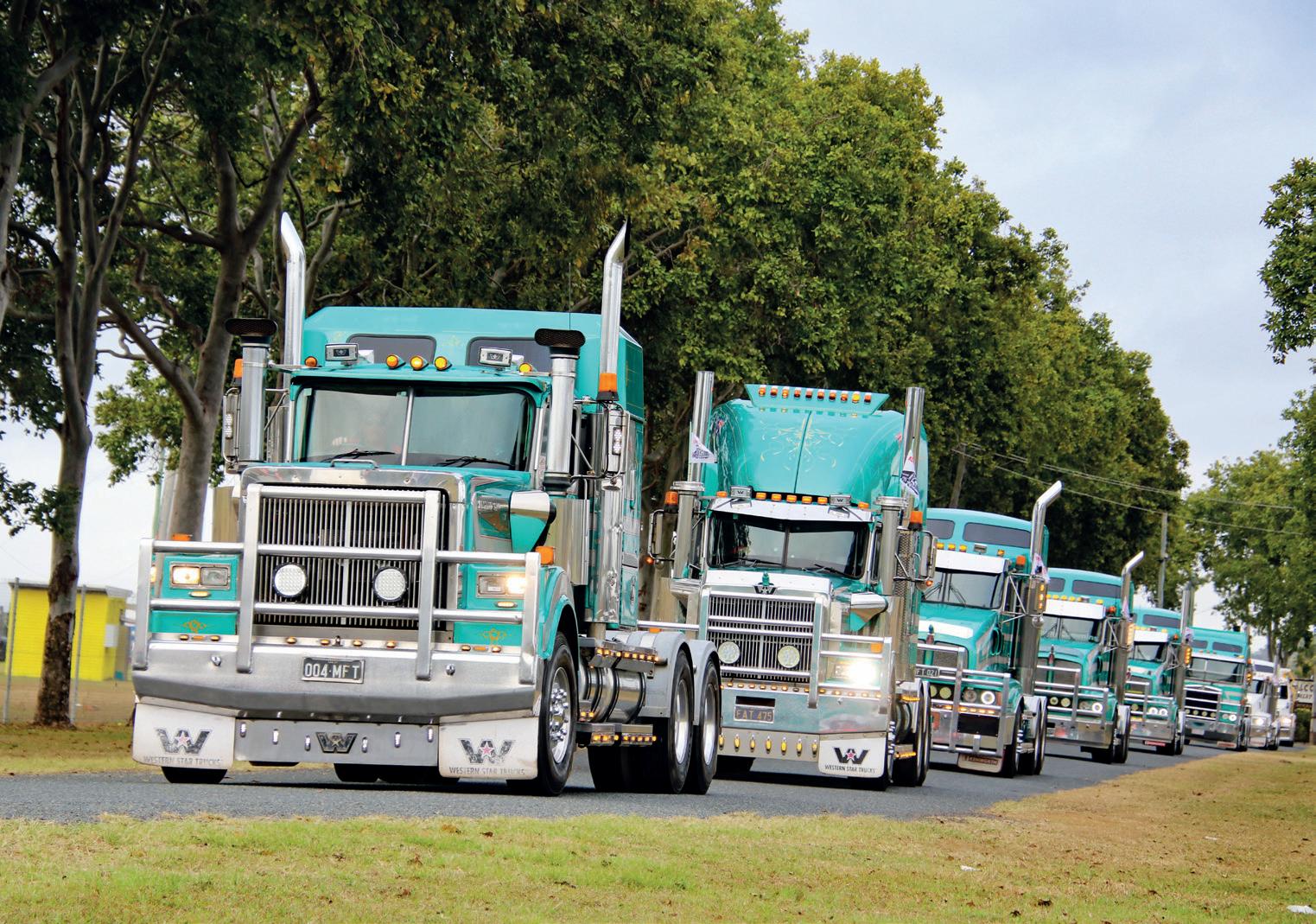
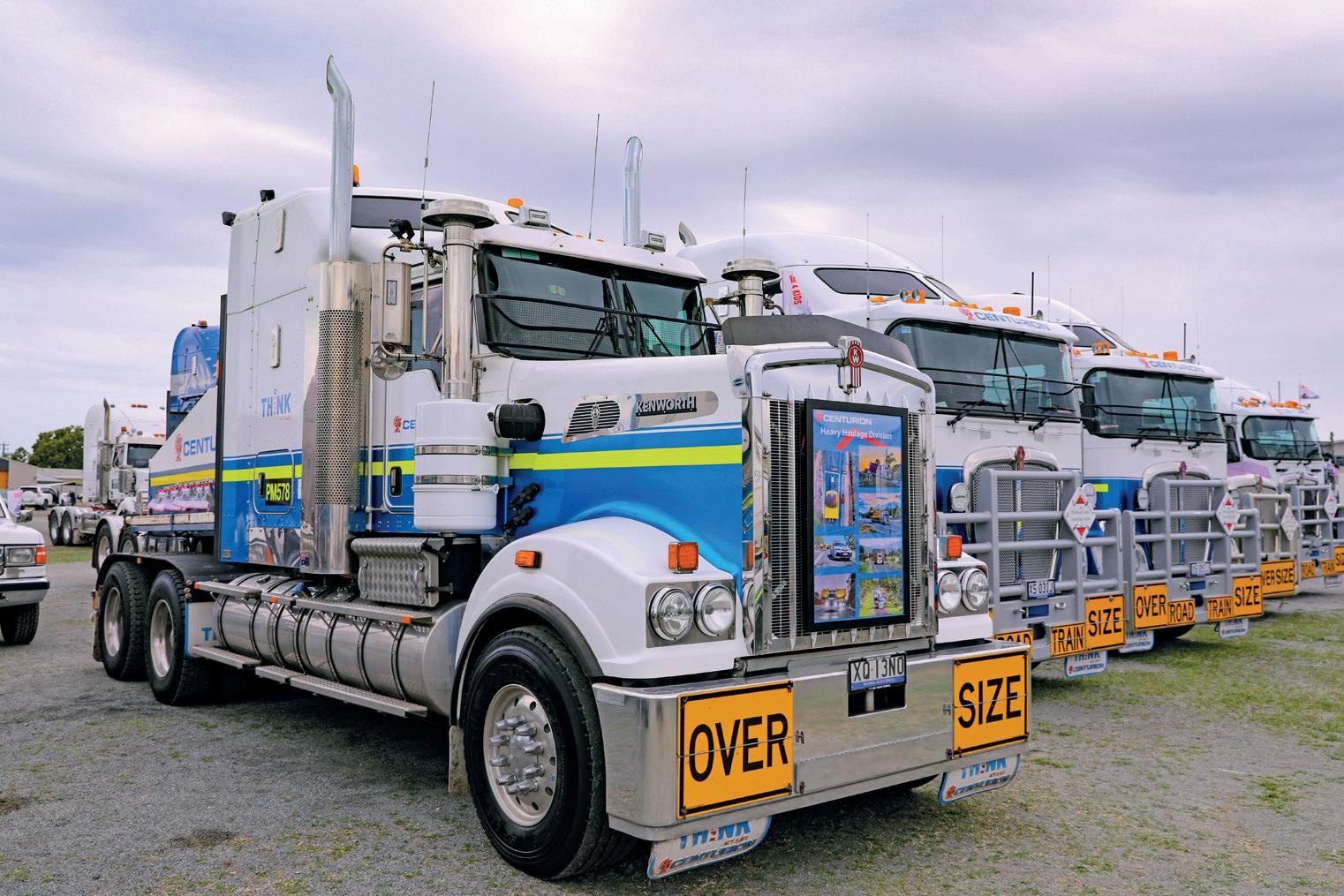
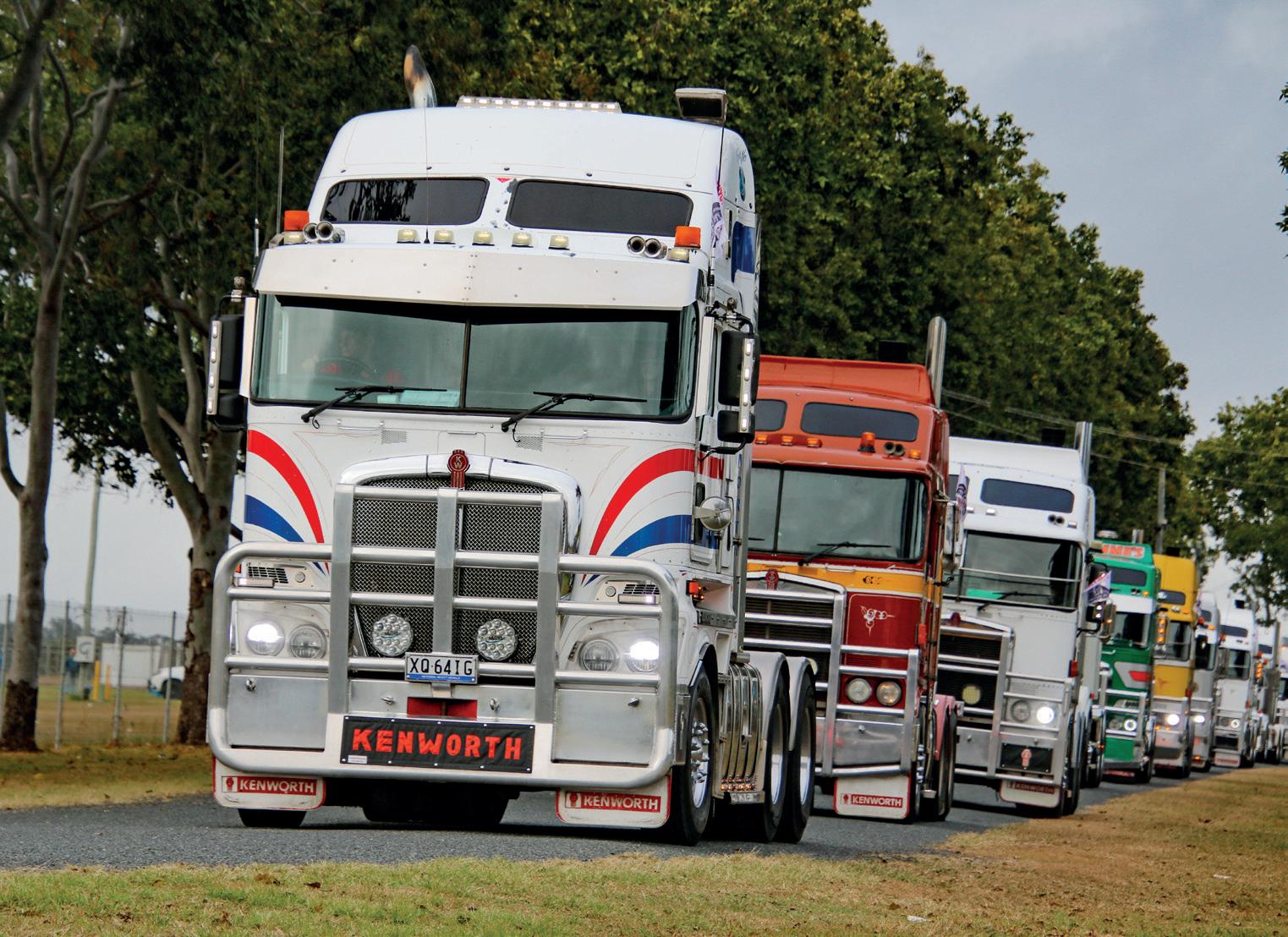
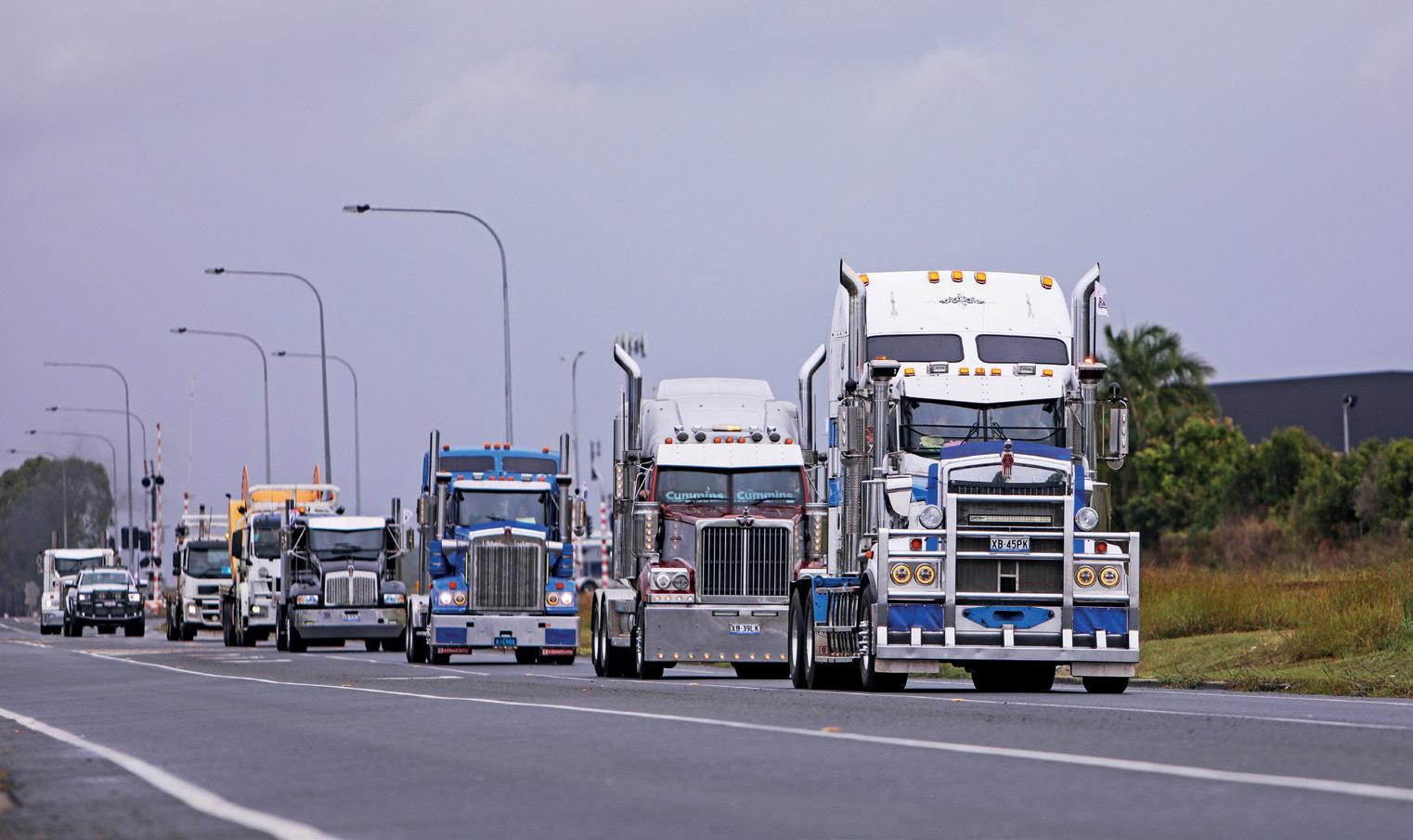
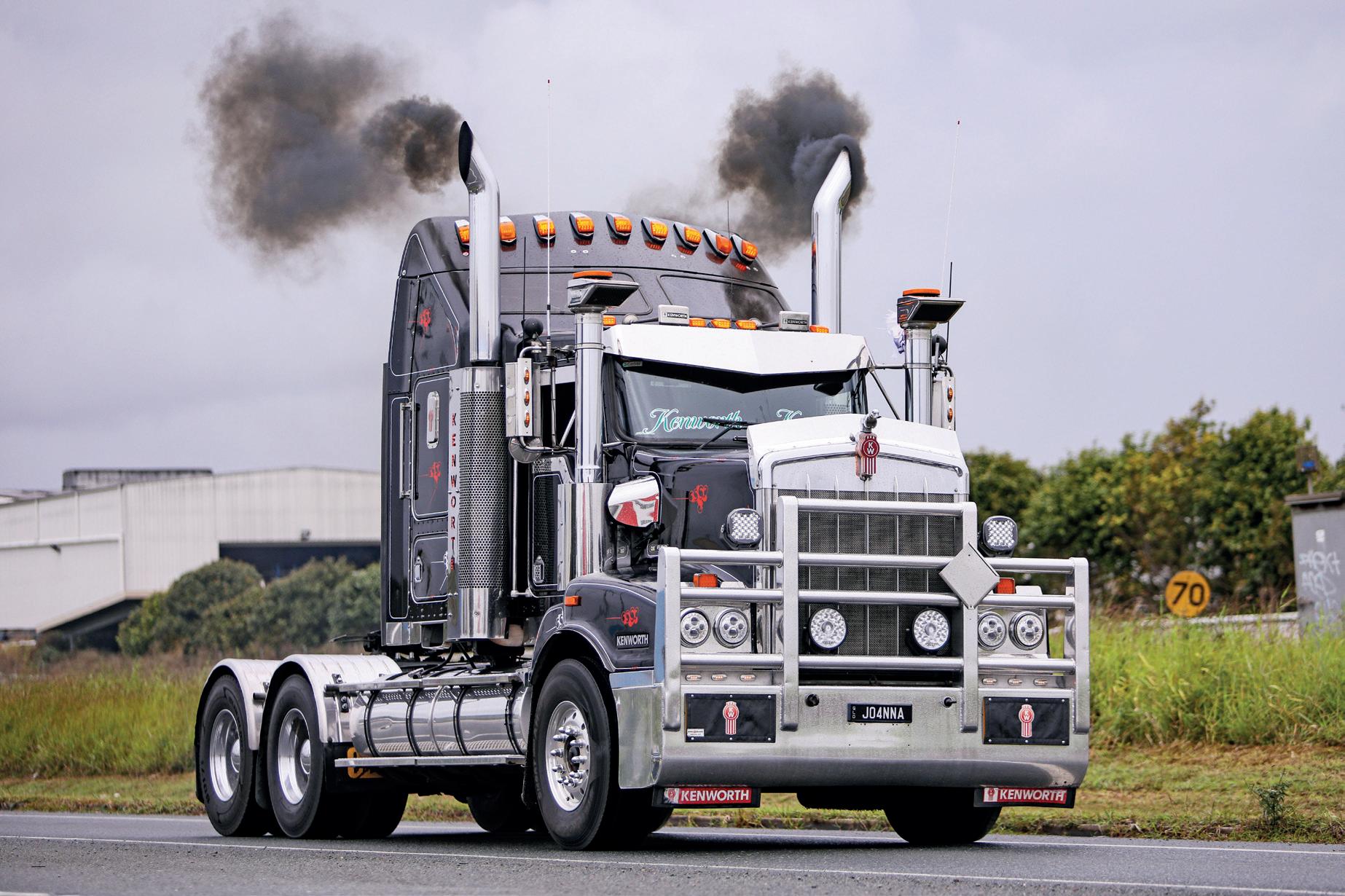
BY KAYLA WALSH
THIS year’s Golden Oldies Truck, Tractor and Quilt
For the first time ever, the event was held over two days rather than one, with about 3500 people taking part in
debut and a tractor pull was introduced, helping to draw a strong crowd.
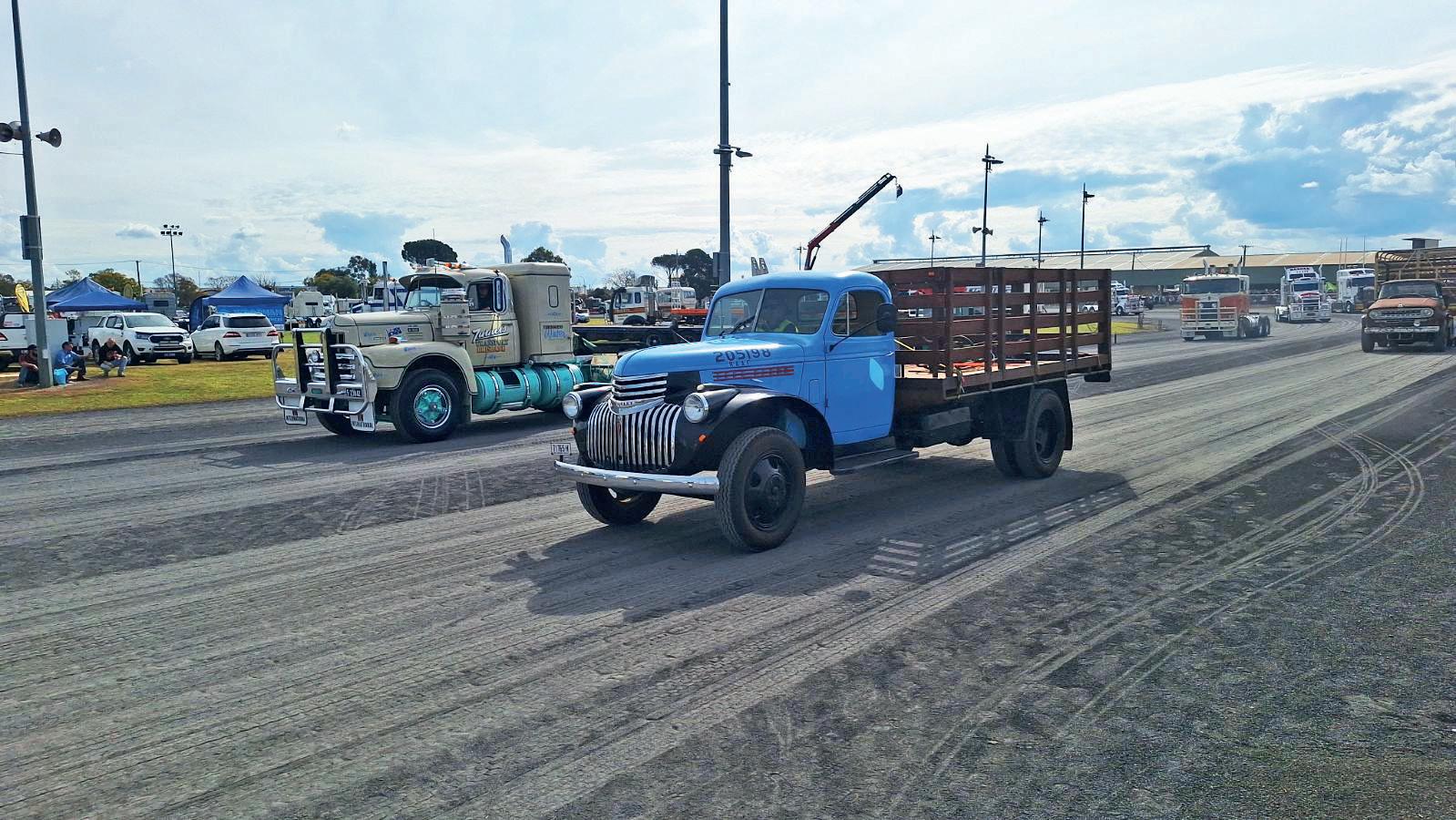
Organiser Jon Mancer told Big Rigs that he was delighted with how the event went.
“We had a great variety of trucks, from old renos dating back to the early 1900s right up to 909s that were just a couple of years old,” Jon said.
“We had C-lines, a couple of cabover Atkinsons, S-lines, Ford Louisvilles, W-model Kenworths, K-series cabover Kenworths – you name it, it
“We had people coming from Victoria and Queensland, and one bus
came up from Port Lincoln in South Australia – so we had people coming from every where, not just NSW.”
as a “laid-back” opportunity to catch up with friends and check out some retro rigs.
the only truck club in NSW,”
“Since then, other truck clubs have been established, but we still get a lot of interest. “We’re looking forward to the 20th anniversary – we will have to do something special
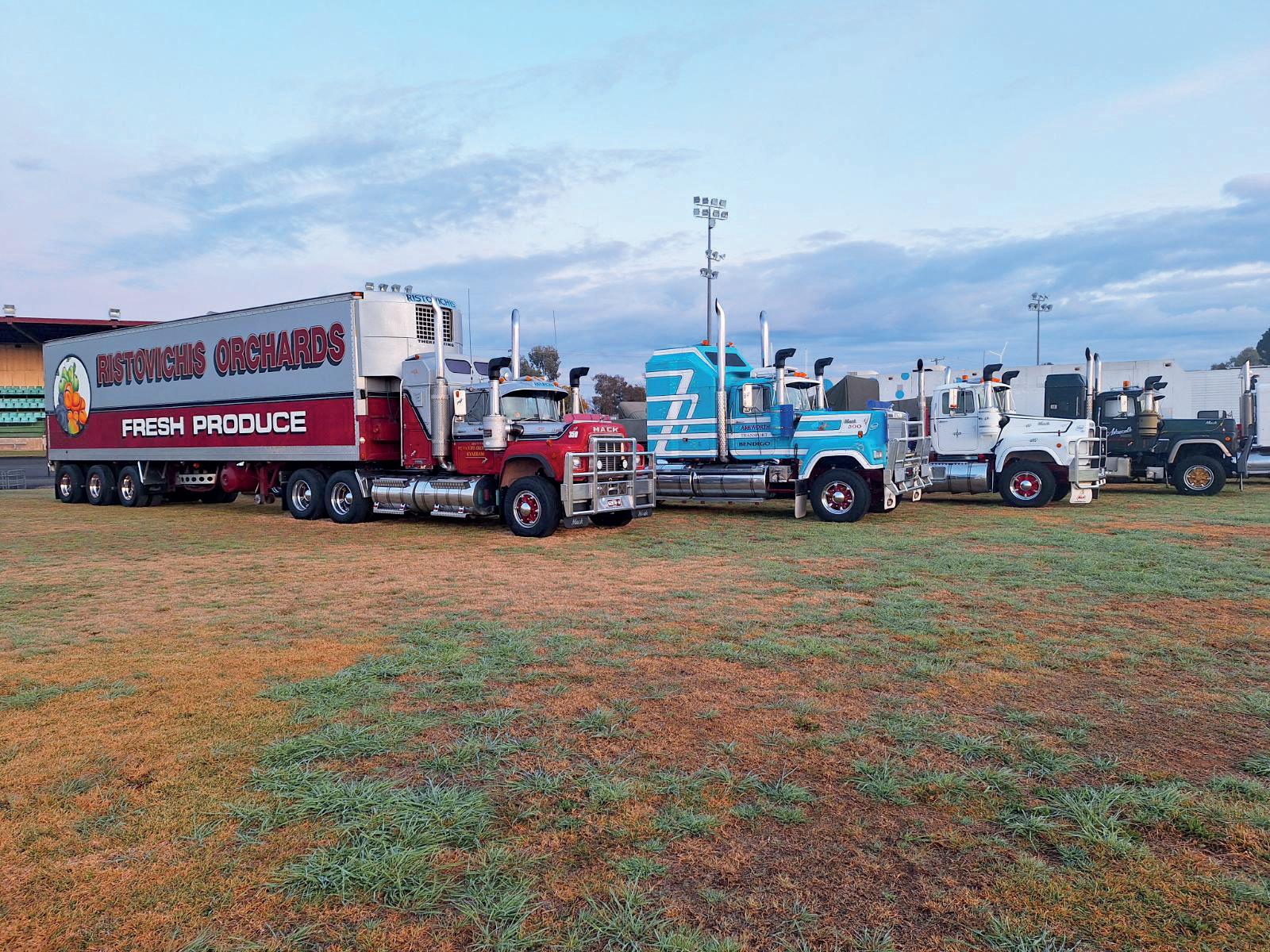


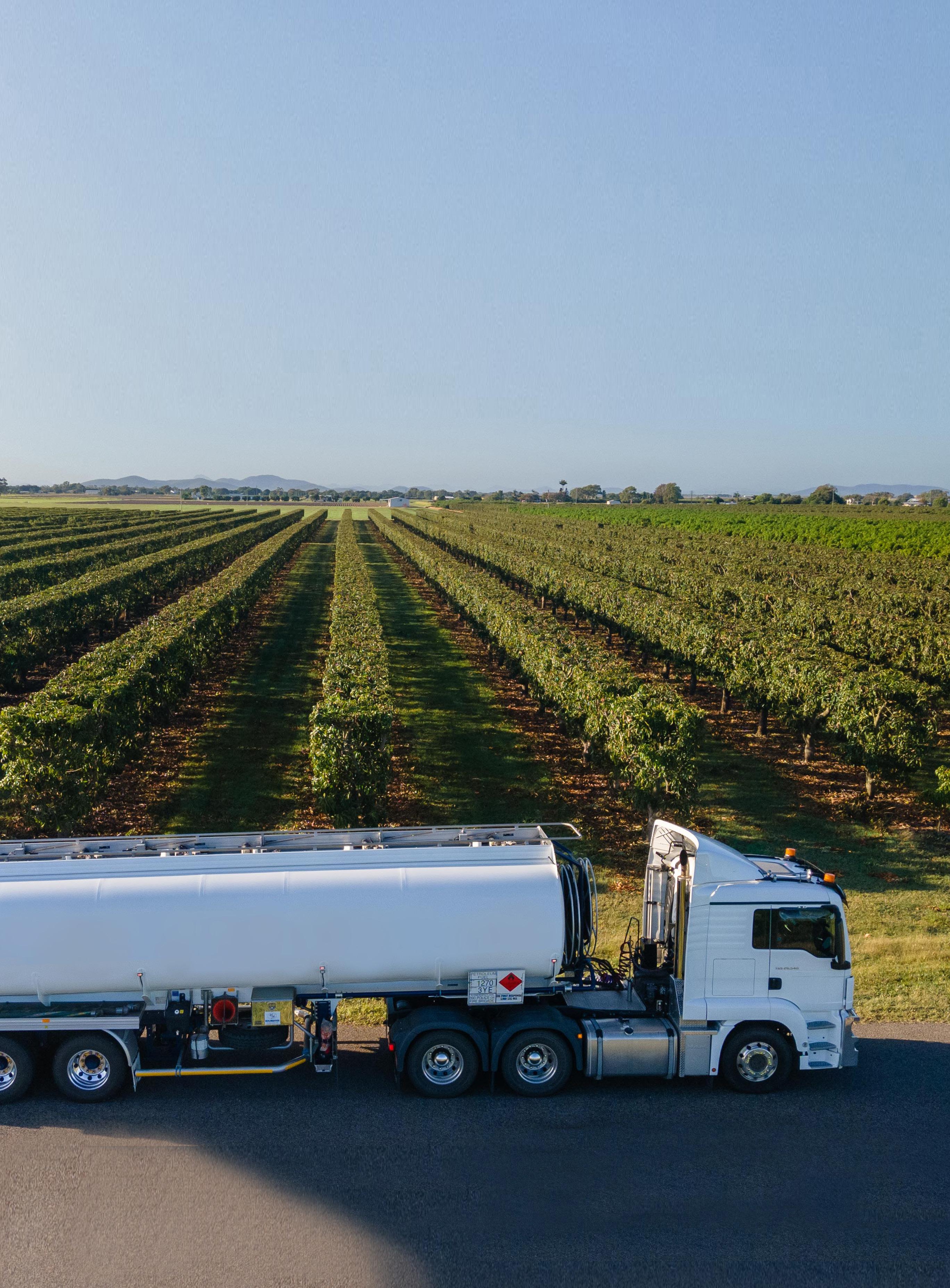
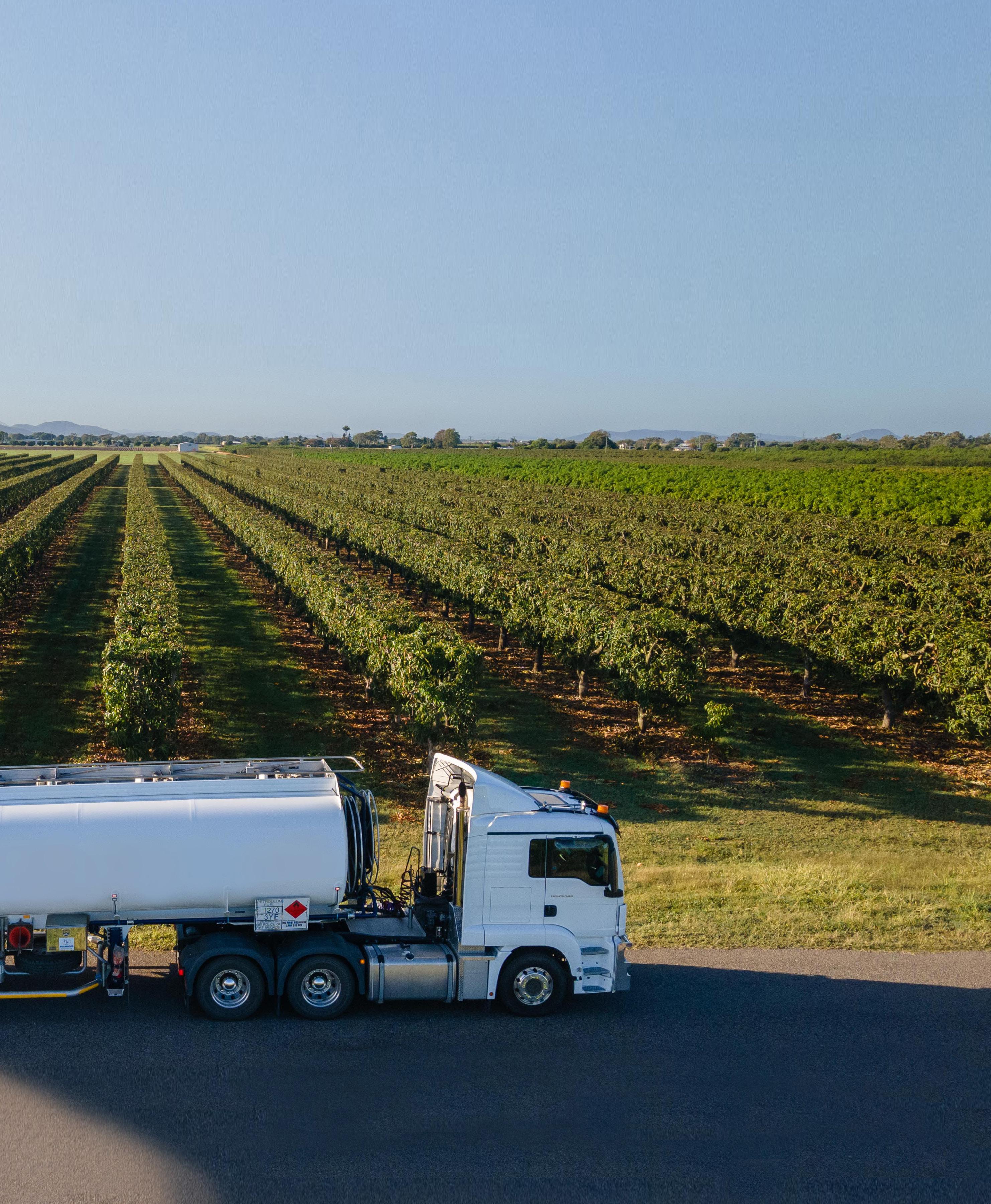
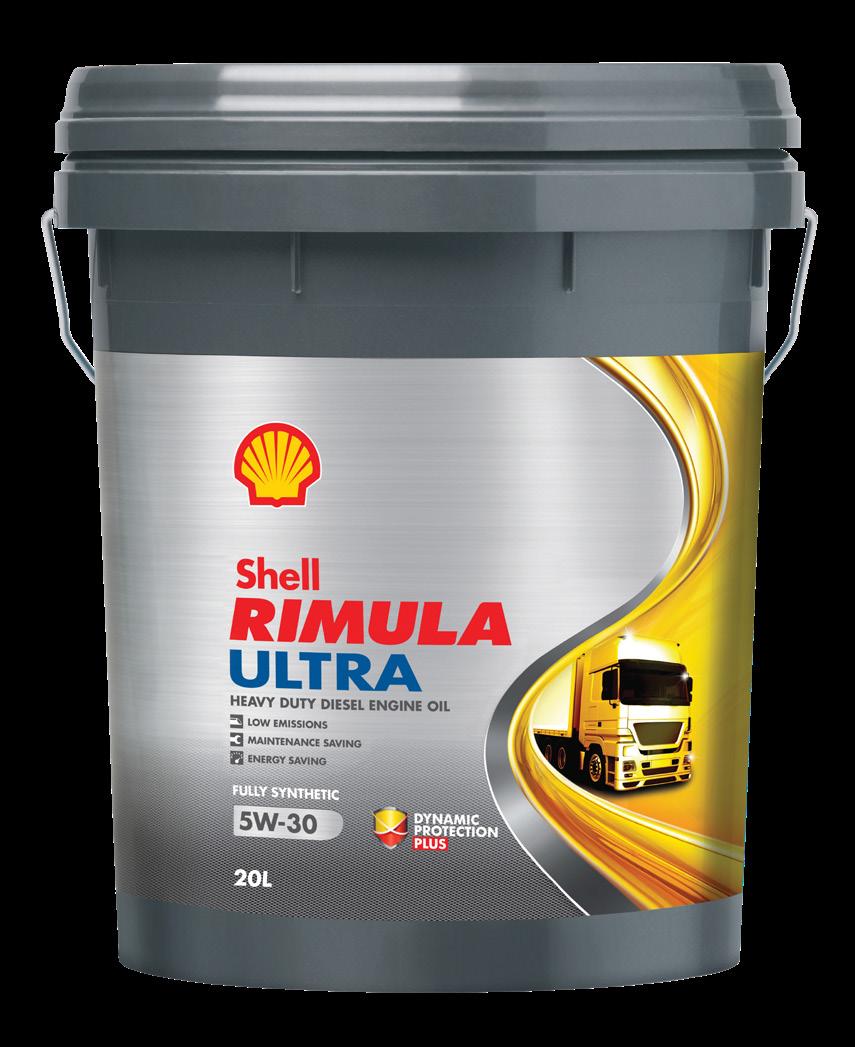
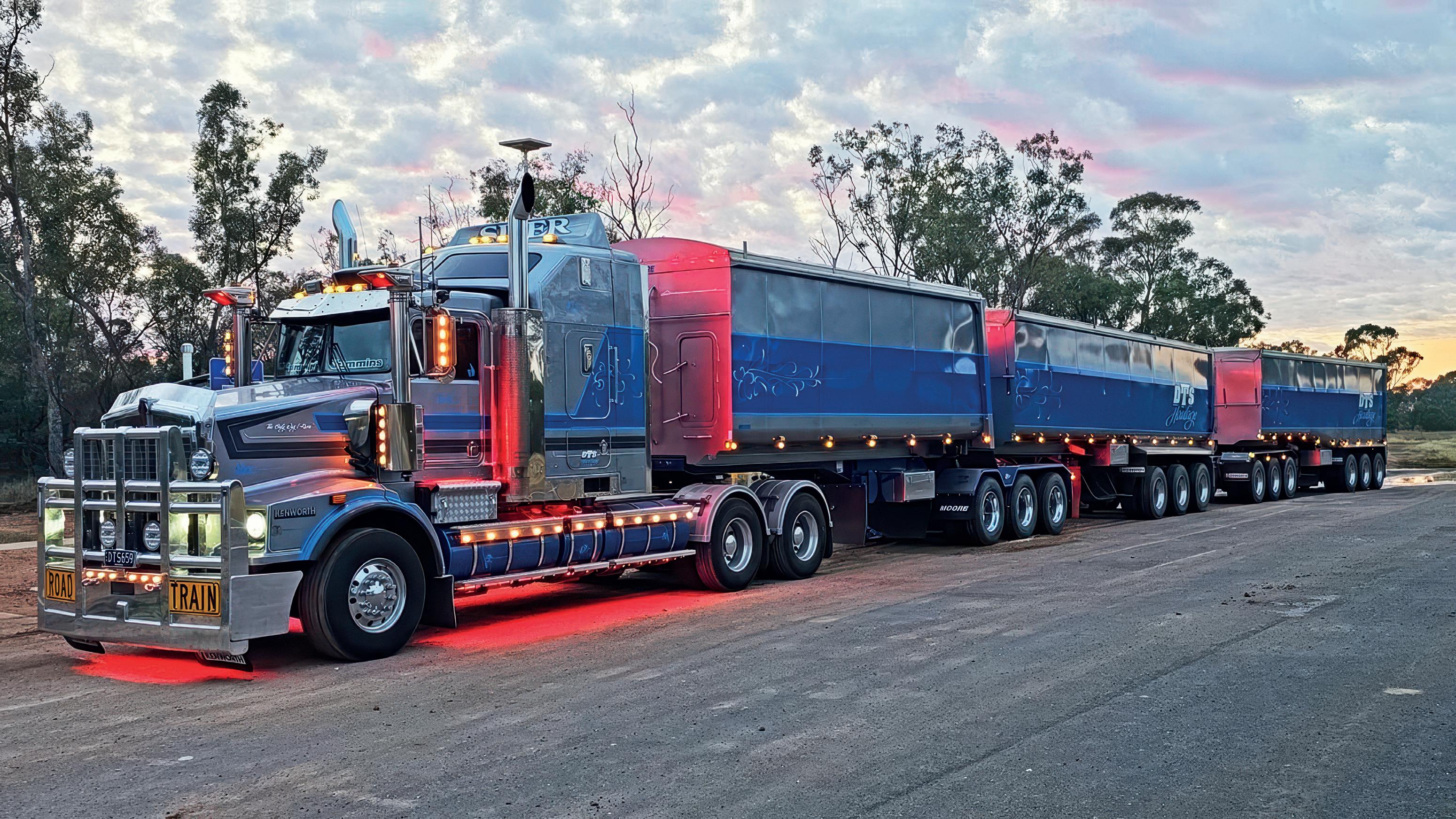
SHELL Rimula has partnered with Big Rigs in a big way – so there are even more reasons to send in your best truck shots.
Each month, the Big Rigs team will choose a #PicOfTheMonth, with the lucky winner receiving a $500 Shell Coles Express Gift Card.
Keep an eye out for our regular posts on the Big Rigs National Road Transport Newspaper Facebook page, calling
for your best truck photos and add yours in the comments, or email them to kayla.walsh@ primecreative.com.au.
Don’t forget to include a brief note about the truck and where the photo was taken. We’ll feature some of the best photos in each edition of Big Rigs Newspaper, with one winner announced each month. Keep those amazing truck pics coming!
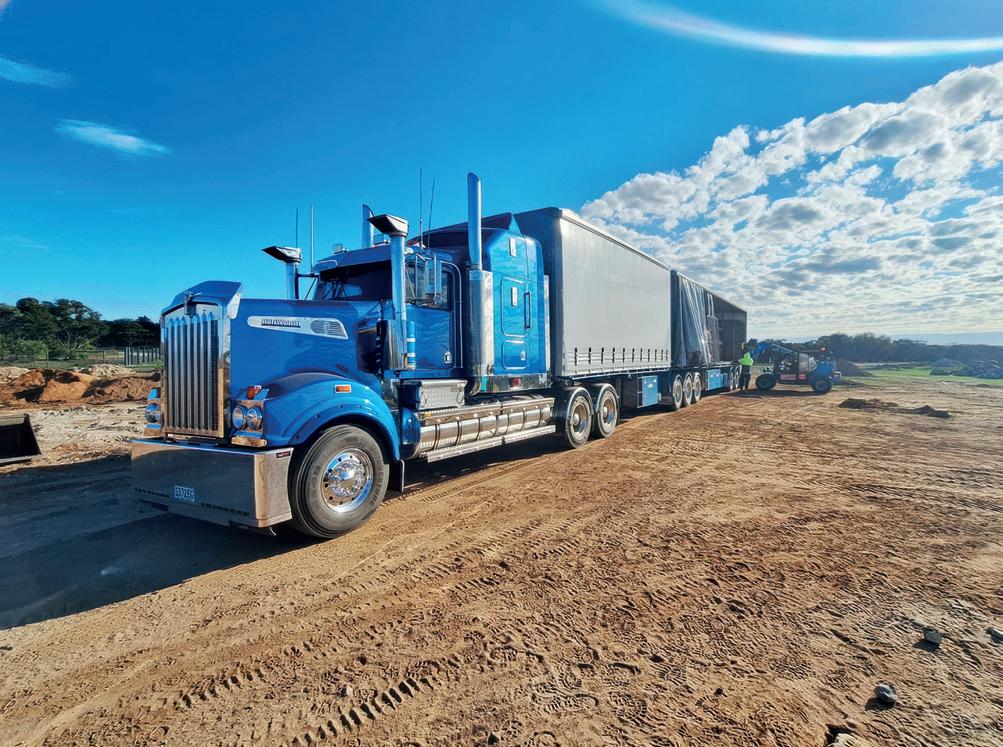
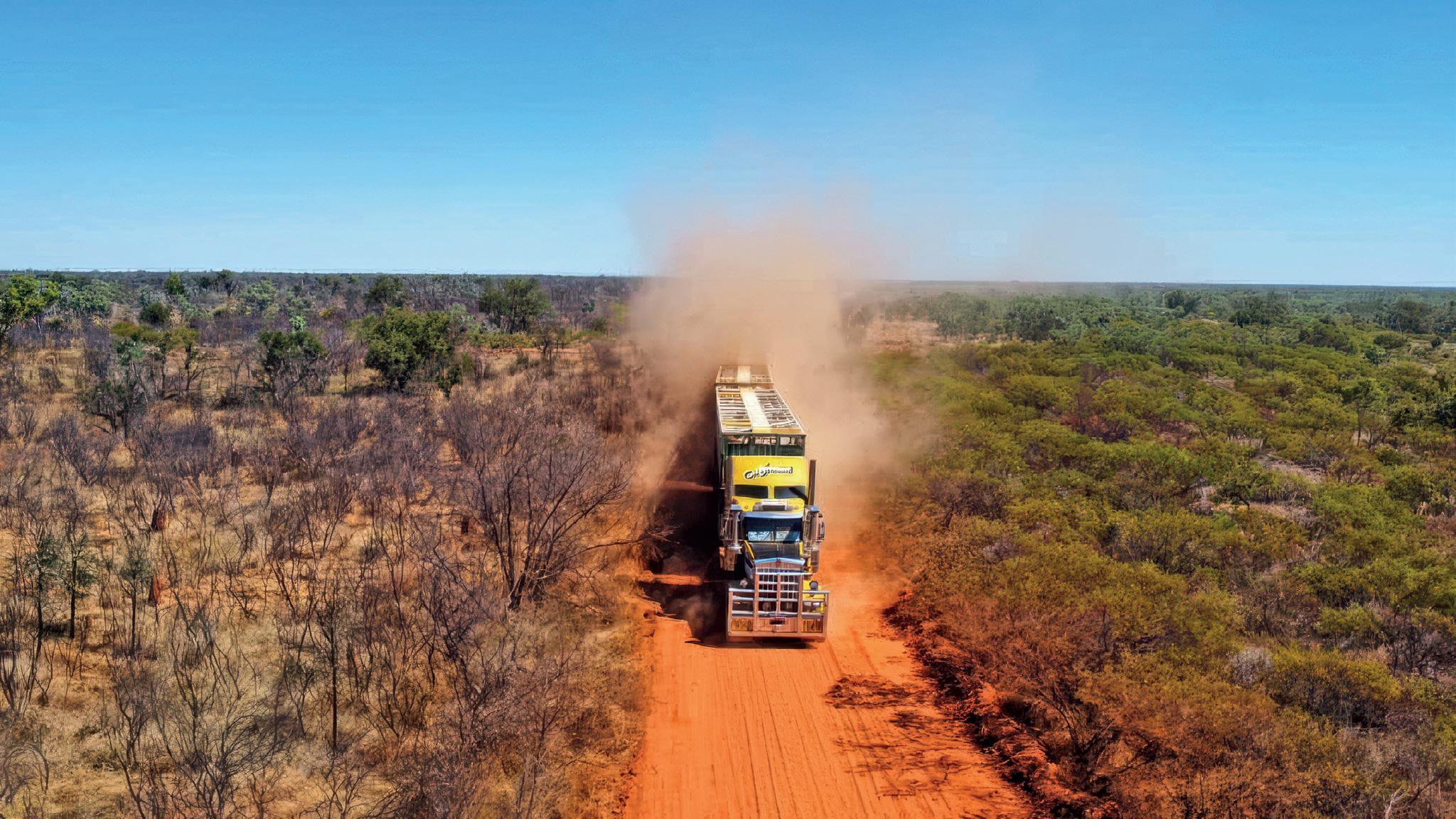
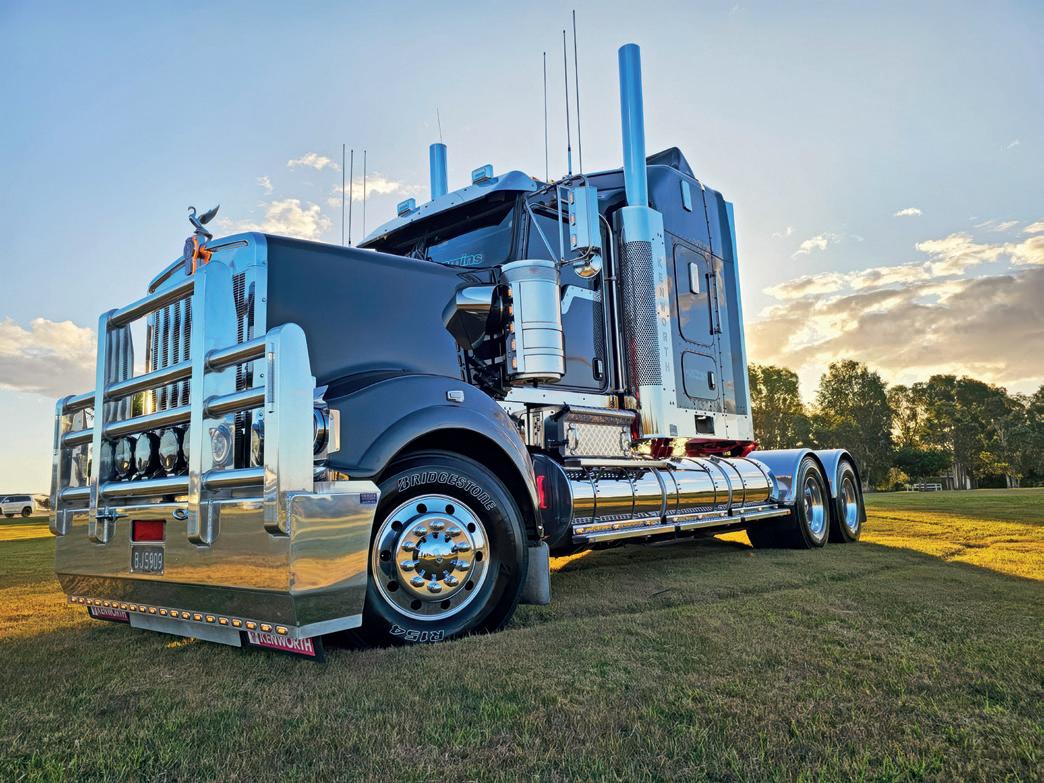
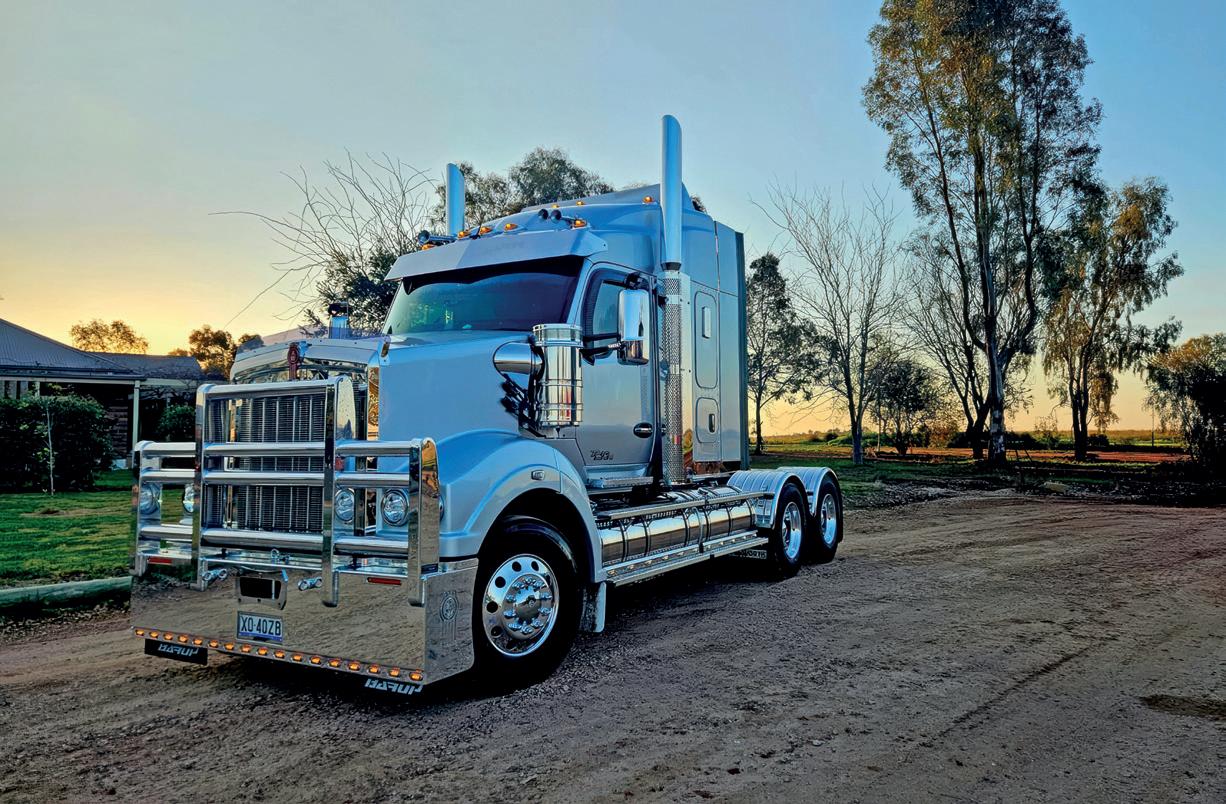

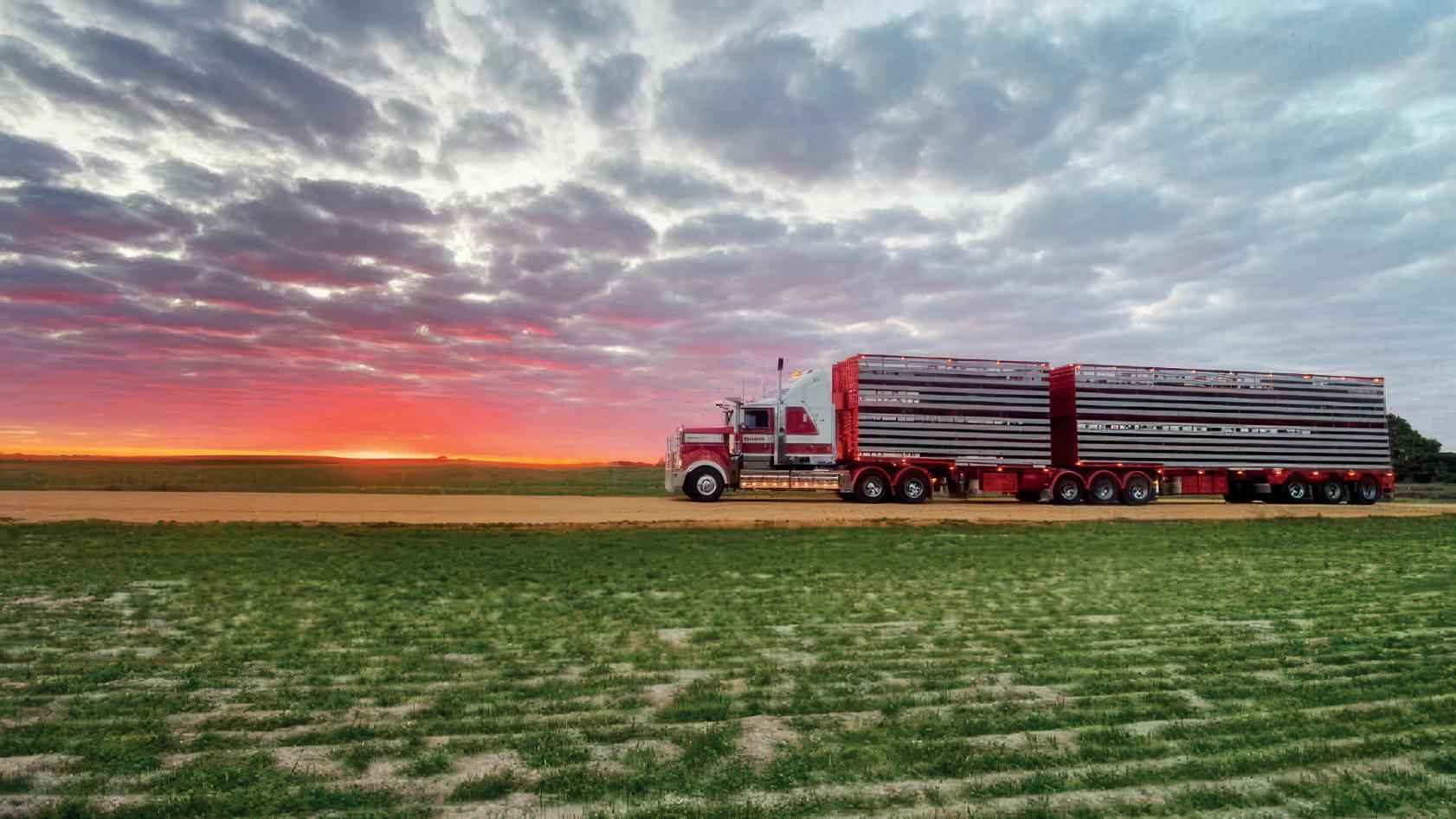
When the going gets tough, truckies keep everyone going
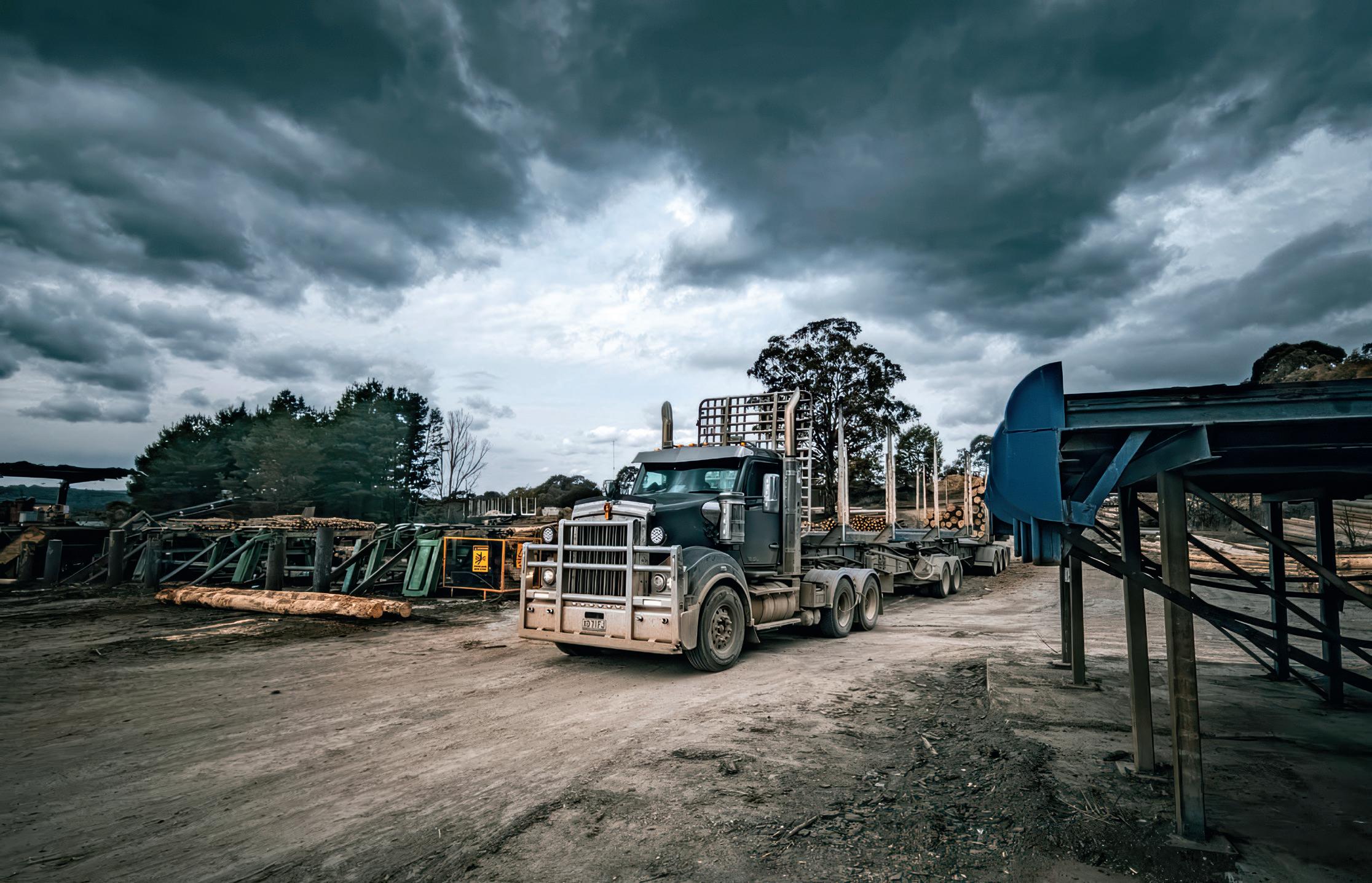
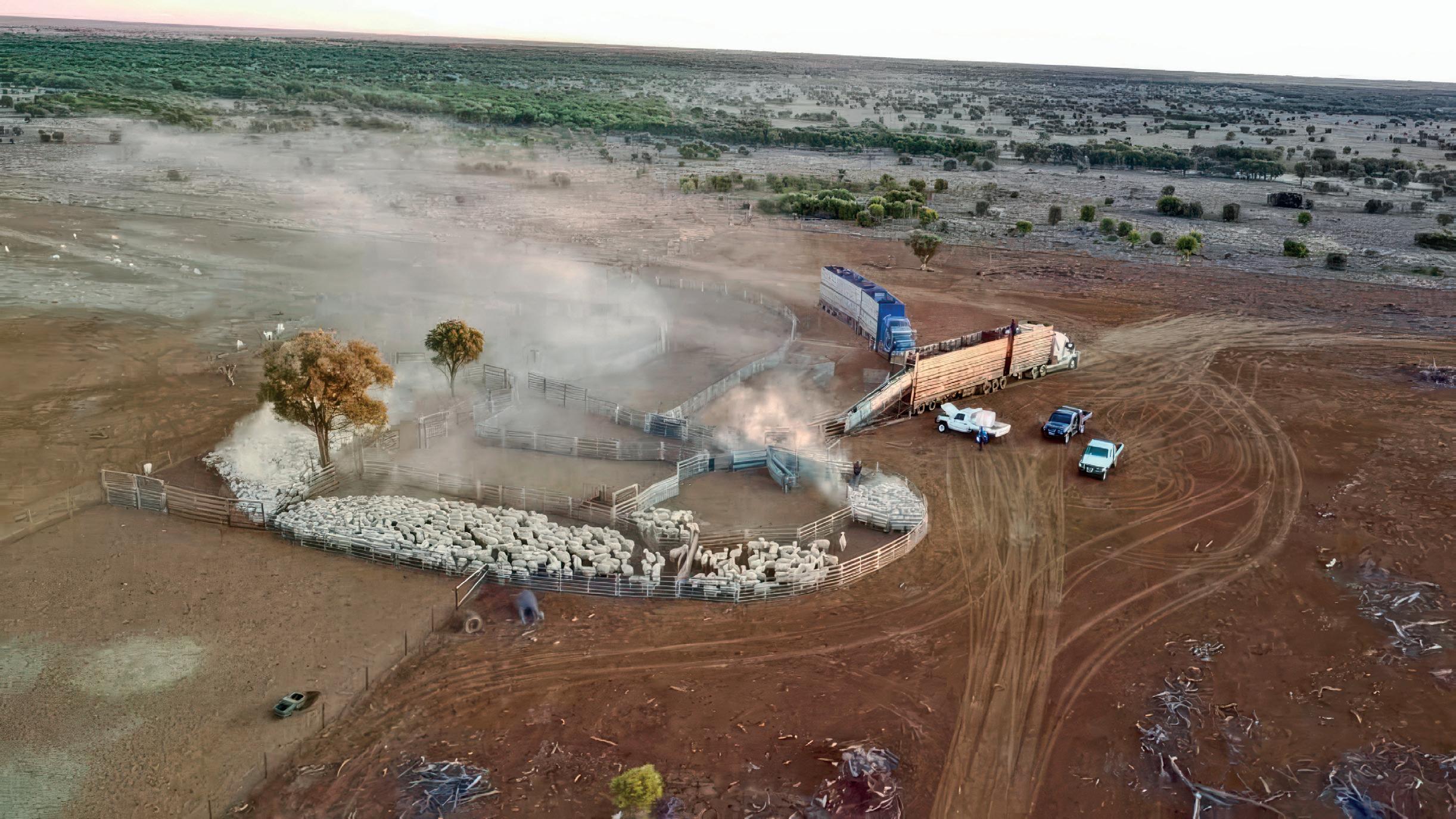
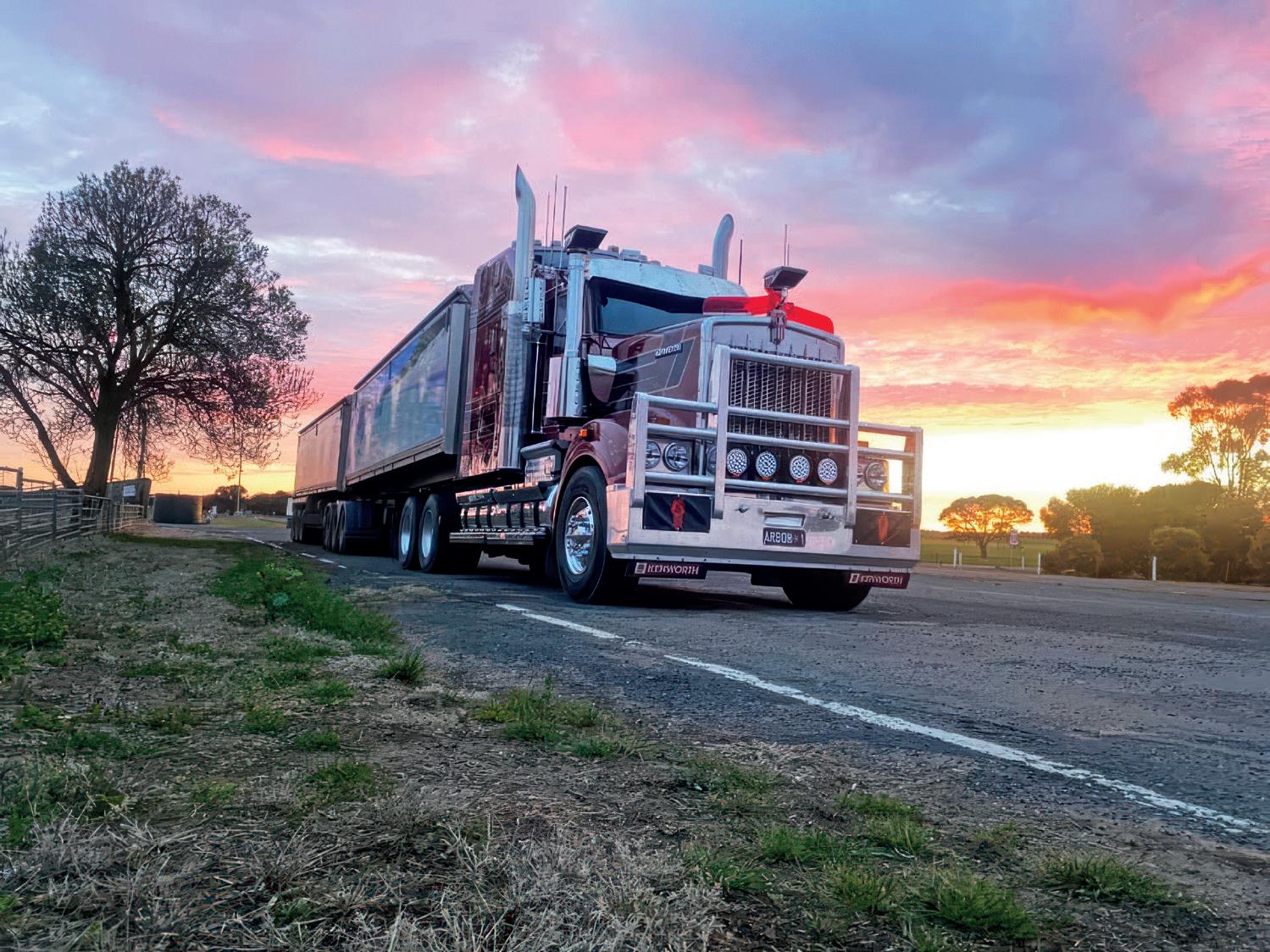
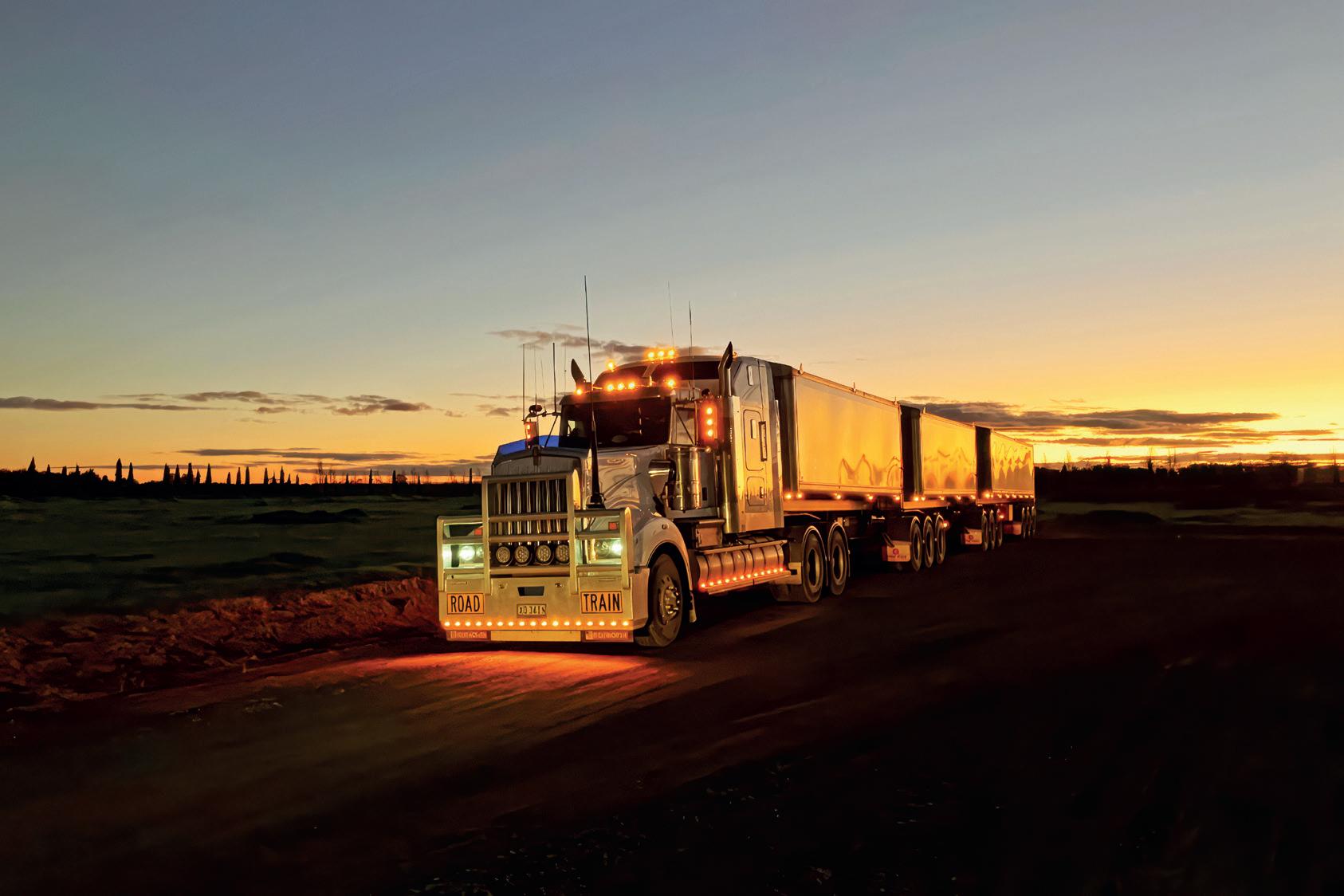
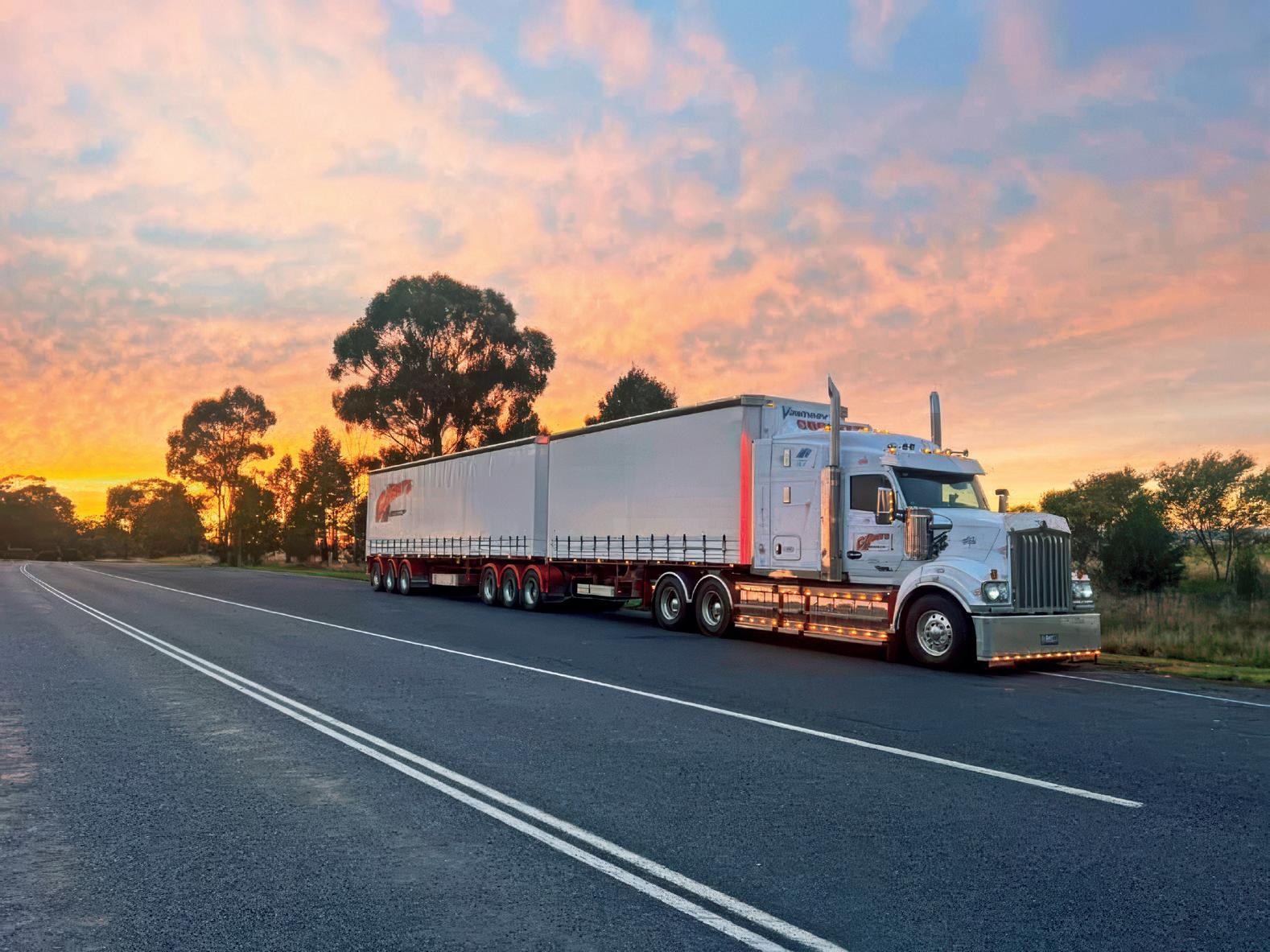
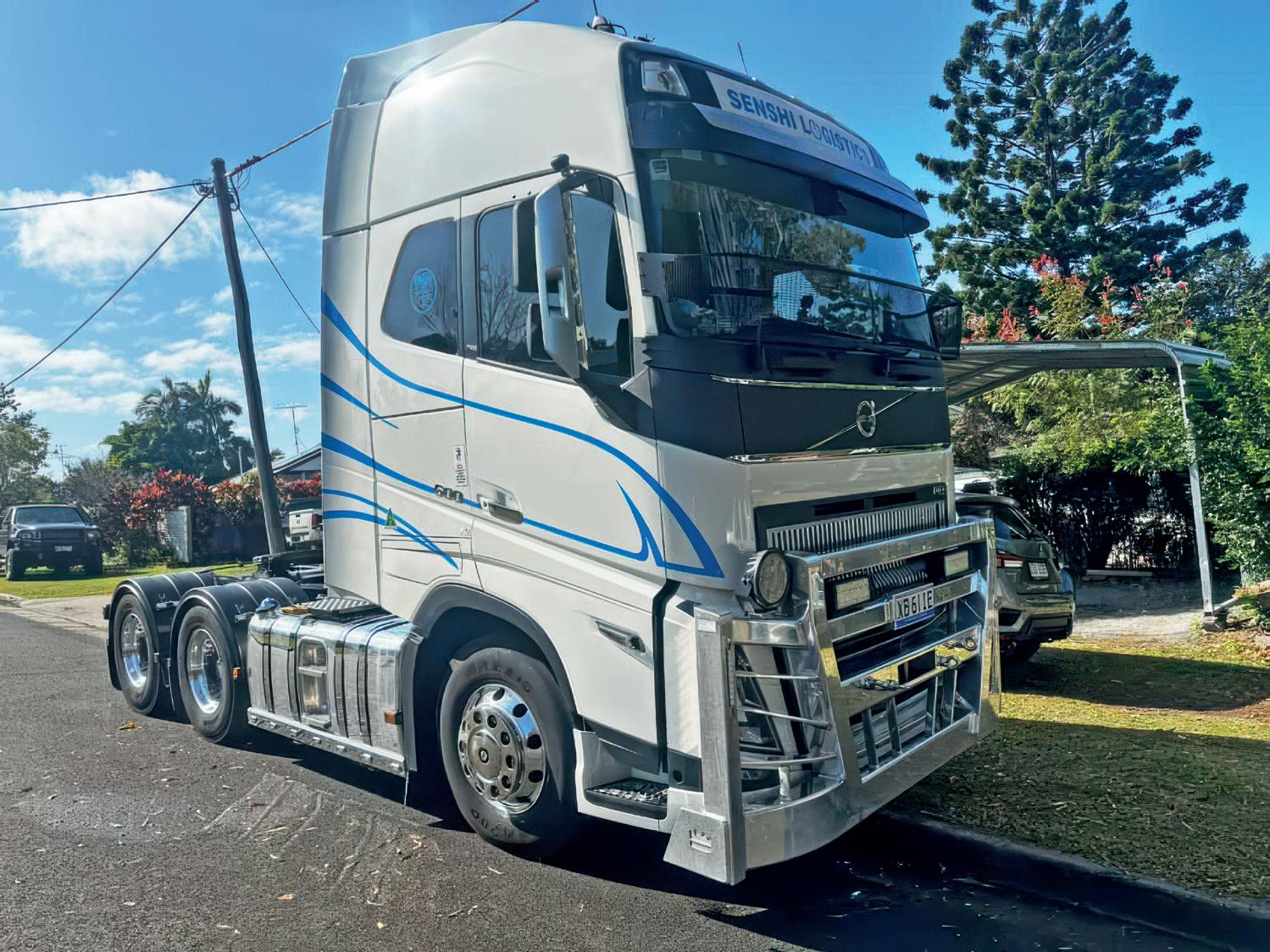
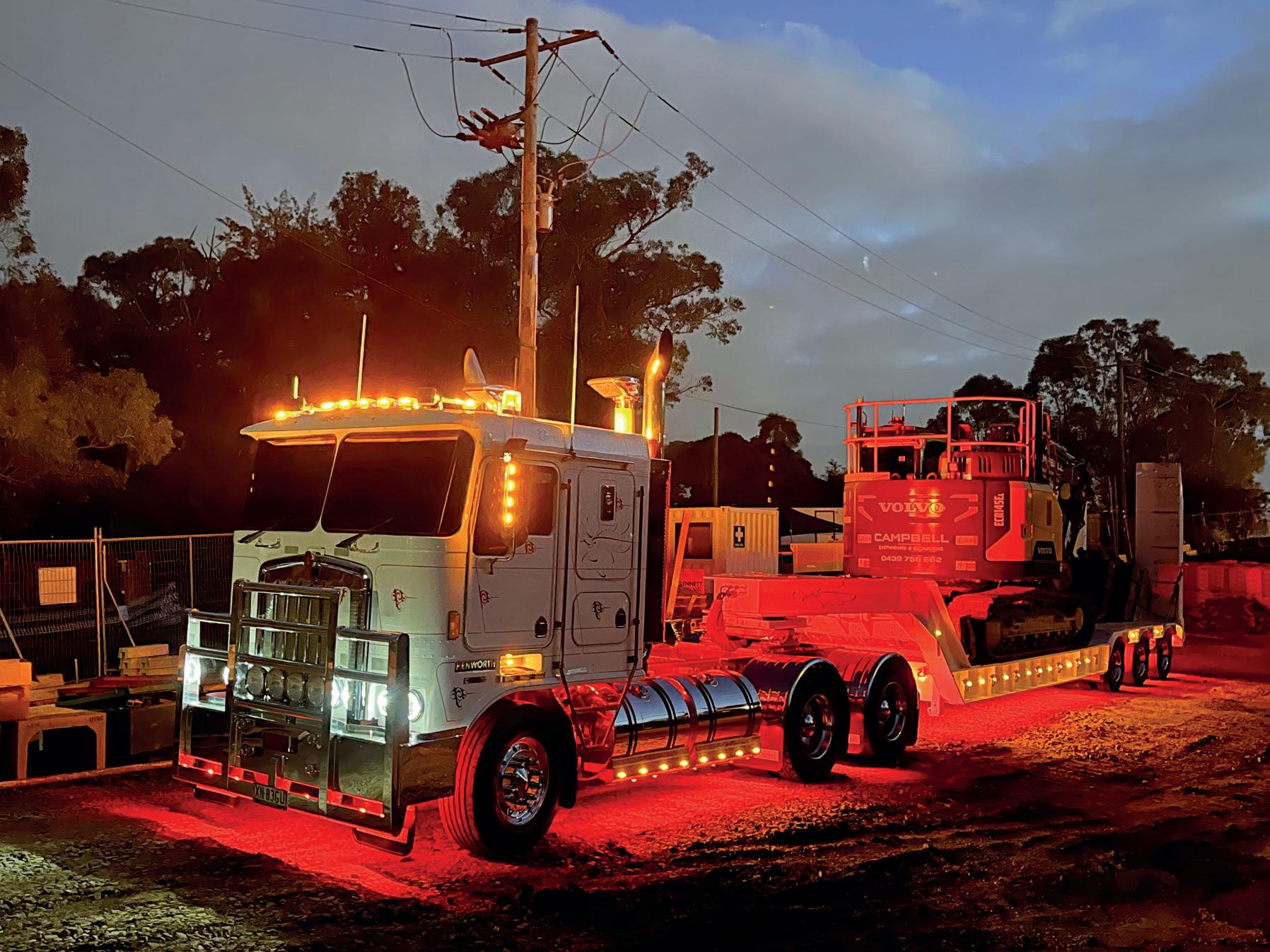



THOSE double centre lines which can be found along some sections of busy highways can save lives.
Spy can attest to that after witnessing an incident along the Flinders Highway when a van overtook a triple road train and came within seconds of a head on collision.
The incident occurred about 4pm on Tuesday August 6 at Reid River, which is 60km west of Townsville.
David Elms was driving the Kenworth triple and had to take swift action to avoid a head on between the idiot van driver and another vehicle travelling in the opposite direction.
A veteran truckie, David drives for Stockyard Transport and was carrying cattle for live export from Townsville Port.
I myself was in a Toyota RAV4 about 40 metres behind David’s road train when the van driver recklessly started to overtake.
David noticed the danger and slowed down as another van was coming in the opposite direction.
The other van driver realised the danger and took “evasive action” by pulling off the road and a tragedy was averted by a split second.
I managed to get David’s phone number from the back of his third trailer and spoke to him the following day.
David, 58, has been driving for 41 years and displayed all of the experience he has gained to avert a head-on.
“I had to slow down and veer off my line as far as I could. I had a full load of cattle to go to Vietnam and had a lot of weight in the trailers. It was fortunate there were two lines in the middle of the highway which gives you a bit more room.
There was a couple of seconds in it and we see these type of things often,” David said.
I spoke to a woman from the company office who said that there would have been dash cam footage of the incident.
Stockyard Transport has 16 trucks and has depots at Brookhill near Townsville and at Emerald.
Moved on by scalies
A truckie who was on a compulsory seven hour fatigue break was furious over the
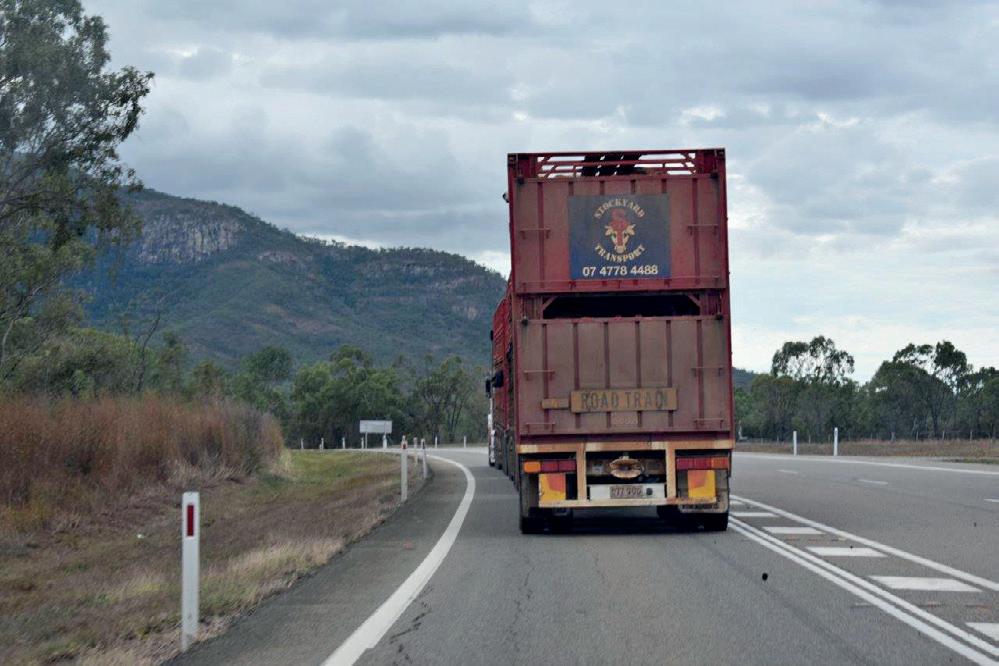
actions of scalies who told him to “move on” at 6am one morning recently.
He had stopped at the heavy vehicle inspection station at Maryborough in Queensland.
“I was told by a rude officer that I must leave and move to somewhere up the road. They impose all these logbook and fatigue laws and then this happens. It is sheer hypocrisy,” the NSW driver told Spy.
I spoke to other drivers about this and they all sympathised with him.
However, a Victorian owner operator said that whilst scalies have discretionary powers in this regard, the officer was acting by the book – pardon the pun.
“They do this everywhere,” he said.
99 bends in 11km
For truck drivers travelling along a notorious range road in south west Tasmania it can literally “send them around the bend”.
It is a winding section of the Lyell Highway after you leave Queenstown, aptly known as 99 Bends Road.
The road meanders through Queenstown Hills and truck drivers have told me of their reluctance to travel on it unless they have to.
It is on the way to Hobart and some drivers with freight for Queenstown or nearby Strahan 40km away prefer to go the extra distance and come from coastal Burnie on an easier highway.
I have been along many difficult range roads around Australia and found this one to be one of the most challenging.
At a distance of 11 kilometres, it takes you from the outskirts of Queenstown and
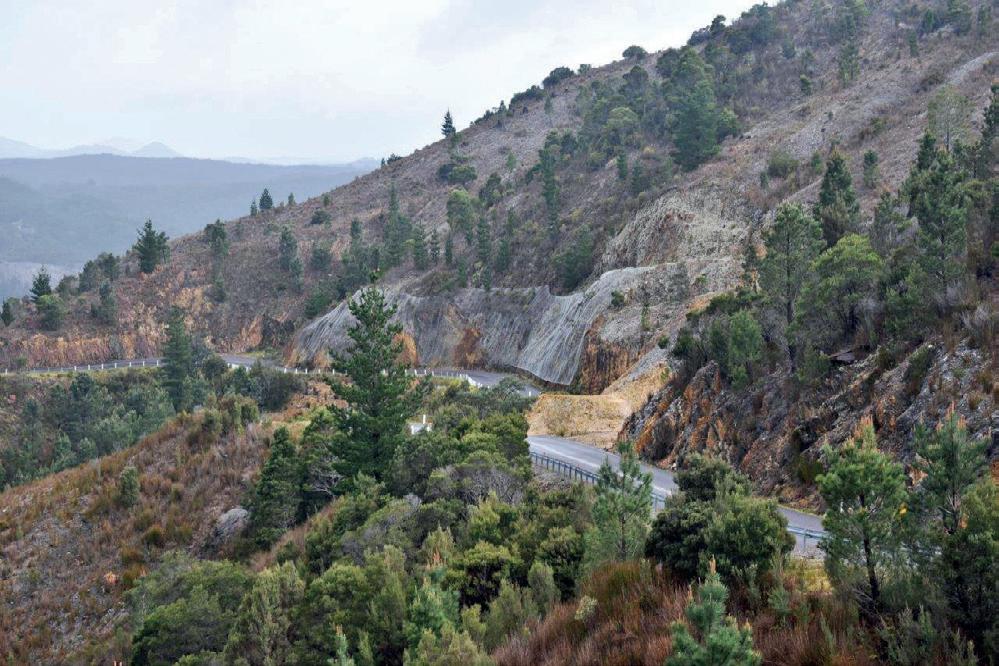
winds its way up to the summit of Mount Owen.
The views as you go along it are outstanding, although if you are a driver you are so careful that you may not even notice them.
It was constructed in the early 20th century to provide access to the rich copper mines that were once the lifeblood of the region and was an engineering marvel.
A NSW owner operator who is a self-confessed connoisseur of seafood stopped in at the Barkly Homestead Roadhouse in the NT and was surprised to see his favourite meal of squid on the menu.
“I see food and I want to eat it,” he quipped to Spy with a “pardon the pun” added.
He had parked his old rig out the front and ordered salt and pepper squid with salad and was delighted.
“It was a big serve and a delicacy and being so far from the sea I would never have thought it would be on the menu here,” he said.
It is located on the Barkly Highway, halfway between Tennant Creek in the NT and Camooweal just across the Queensland border.
Strategically located along the Flinders Highway between Townsville and Charters Towers, the Caltex Calcium Roadhouse is a good place for drivers to stop.
It is 50km west of Townsville and 80km from the Towers, with a huge dirt parking area for heavy trucks including triples and quads.
Trucks can also park on either side of the highway
which is a short walking dis tance from the roadhouse.
The fuel bowsers for trucks are separate to the ones for other vehicles and there are clean men’s and women’s toi lets inside and a shower.
There is comfortable seating in the eatery, a good selection of meals from the menu and lots of takeaway food.
I have stopped there twice in recent months and saw many truckies pulling up, including livestock trucks, many carry ing minerals, among others.
Recently, I spoke to friendly workers Terrinsse Sloan and Fern Kirby.
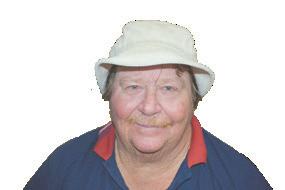

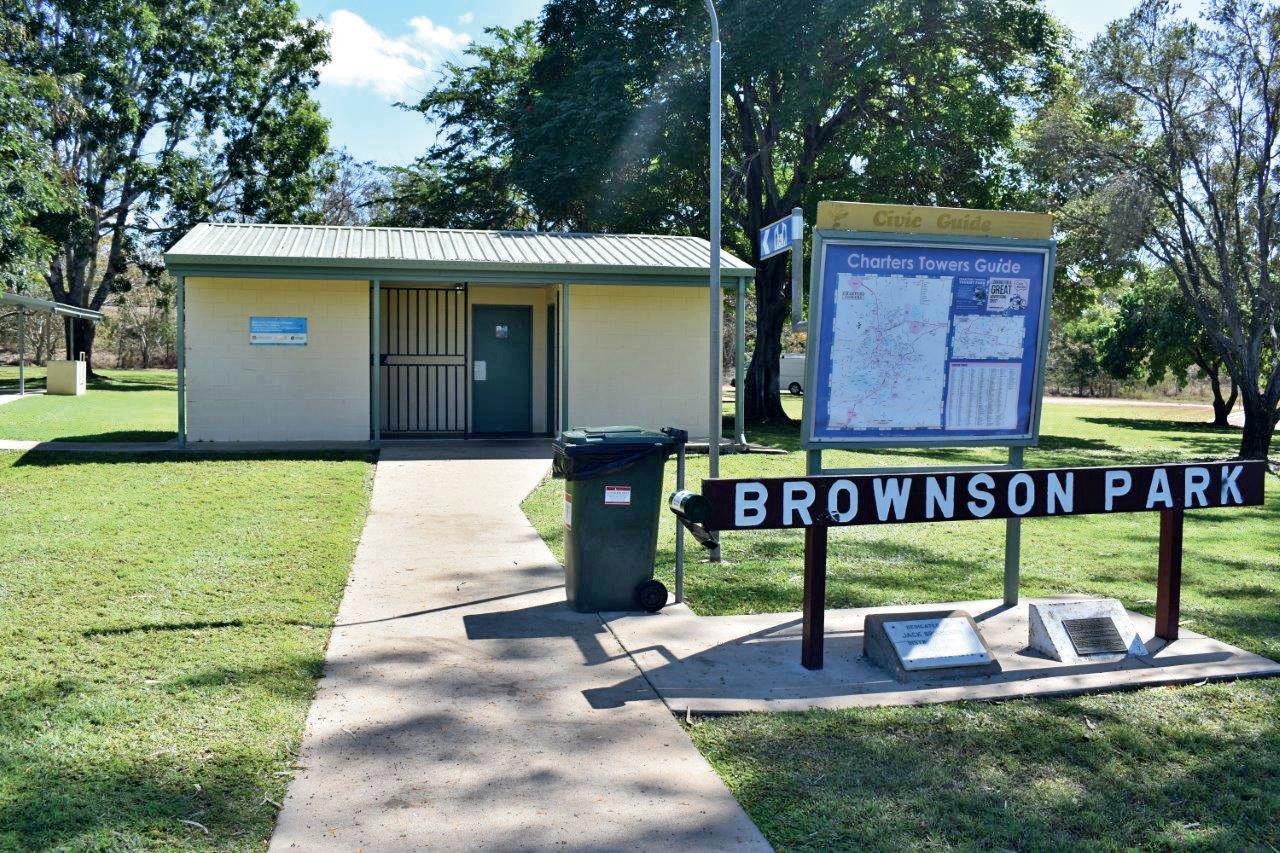
“We do get a lot of trucks who stop off here and it varies from day to day. Many purchase our battered fish which is freshly cooked but they also order other things. The ones in a hurry will get a takeaway of which we have a big selection,” Terrinsse said.
The nearest roadhouses are in Townsville, the Burdekin Duck at Macrossan about 55km away or the Gold City in Charters Towers.
Nice rest area
A great stop off for truckies driving through Charters Towers is Brownson Park and several drivers who told me about it reckon it is a “hidden secret”.
The reason is that a lot of drivers don’t pull up there because they feel there is a lack of parking.
That can be correct as lots of cars and vans use it, as do local residents of Charters Towers, especially on weekends. I checked it out and the day I visited saw enough parking space for two B-doubles on the road in front of it.
When I was there a truck had parked within five metres of the toilets and the driver was having a rest.
There is plenty of shade and it is situated on the Flinders Highway heading west out of Charters Towers.
There is also limited parking space behind the park.
The park has men’s and women’s as well as disabled toilets which are cleaned daily, gas barbeques, picnic tables and a shaded playground.
Dogs on leash are allowed in some areas of the park.
Ironically one of the drivers who mentioned it to me is a Victorian. He had travelled through Charters Towers af-
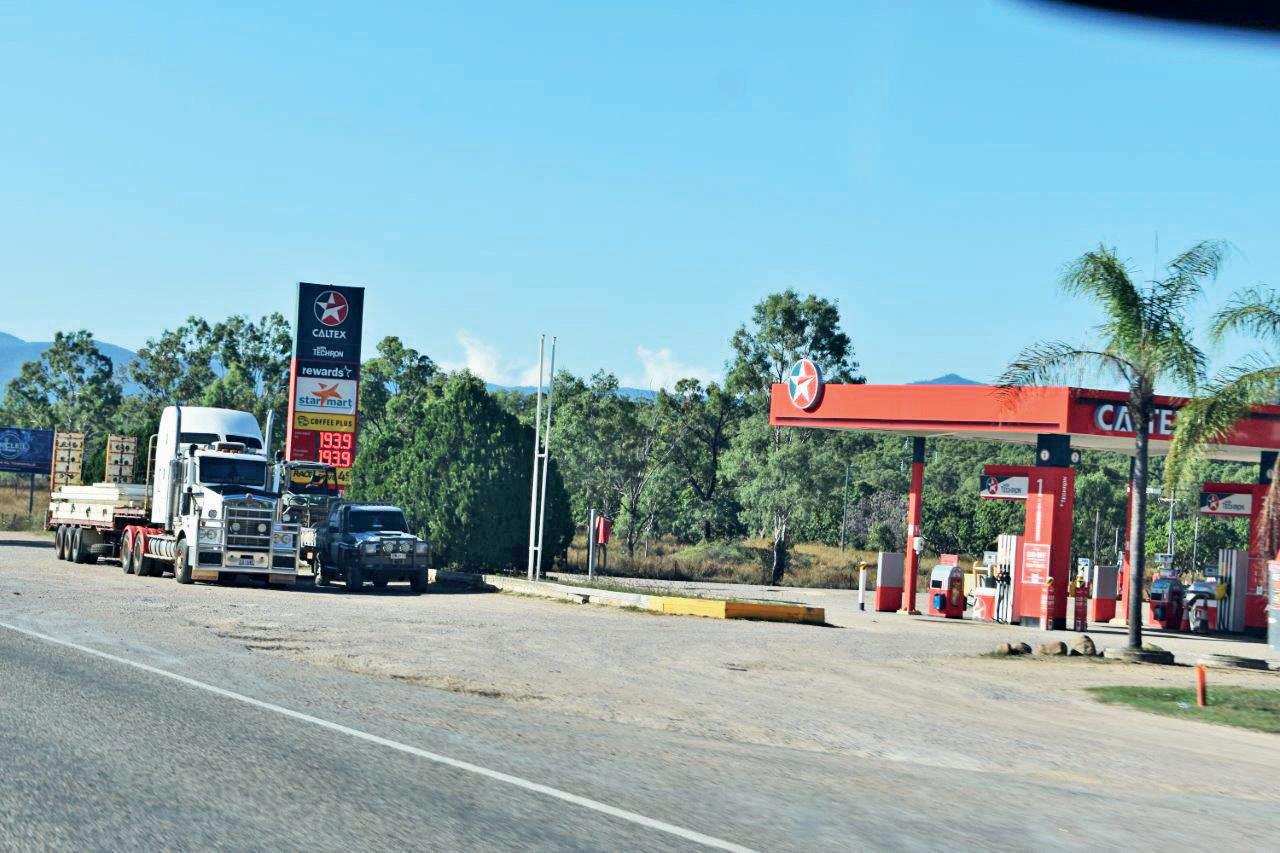
ter coming up through the back roads carrying general freight.
“I had a dog which comes with me and stopped there and it was a nice place,” he said.
If you are a truck driver and are in the area and need a break, I would recommend it.
NT rest areas earn praise
Several drivers who are reluctant to sleep in their boxes at Alice Springs have been stopping at nearby rest areas.
An interstate driver hauling pipes to the region said he came across a pull-off area which he found great.
“It is at the top of the hill near the Alice and I could fit my road train in comfortably. I had a good night’s sleep but I don’t think any more trucks would find space,” he said.
The driver said there was a very good bigger rest area a bit further out which was popular with drivers.
“Overall the NT rest areas are good and some have signs allowing trucks only. But still van drivers ignore those sometimes,” he said.
Spider bite pain
A South Australian driver was rushed to a medical centre after being bitten on a finger by a spider while unloading from his truck.
He felt pain almost immediately and it didn’t take long for a large blister to appear.
“The pain was terrible so I went to see a doctor who gave me some medication and it eased it,” he said.
He couldn’t identify the species of spider but was pretty sure it wasn’t one of the most poisonous types.
On the subject of spiders,
others drivers have reported seeing them inside toilets at rest areas.
Truckie returns lost phone
A Good Samaritan Victorian truck driver went to great lengths to find the owner of a lost mobile phone he came across on the ground outside a popular service centre. He walked inside the eatery and asked around to see if anybody had lost their phone.
There was not much response until a man sitting there checked the bag he was carrying and discovered that his phone was missing. It had fallen out of his bag as the fellow alighted from his vehicle.
The phone was returned and the family was thankful.
Shout a slab or two for an appearance.
When Spy pulled up at a roadhouse and saw several heavy Army vehicles parked there I asked one driver if he’d mind if I snapped his pics for Big Rigs.
“I love reading Big Rigs when I see one,” was his reply. But then faster that Penrith Panthers champion halfback Nathan Cleary can pass the ball, he flicked the offer onto a colleague.
On the quiet I asked another in the contingent if he knew the reason why.
“Oh yes, he is smart, if anybody at our barracks has a pic in a publication they have to shout two slabs (cartons) of beer for others at the local mess. That is more than $100,” he whispered.
Apparently it is a two carton tradition if it is a national paper or magazine and just one slab if it is a local one.
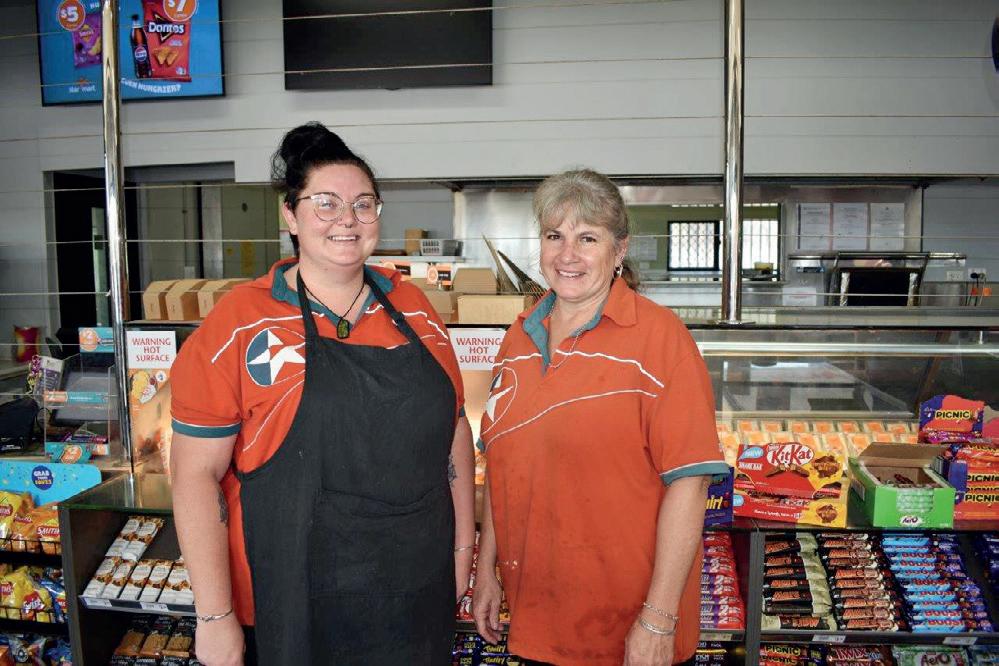


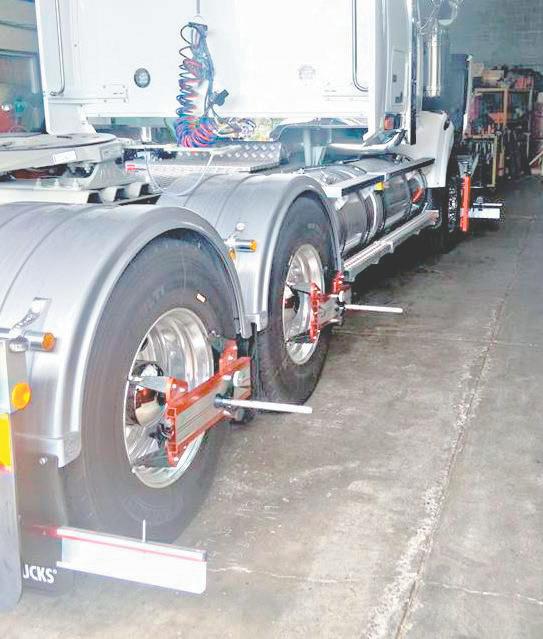
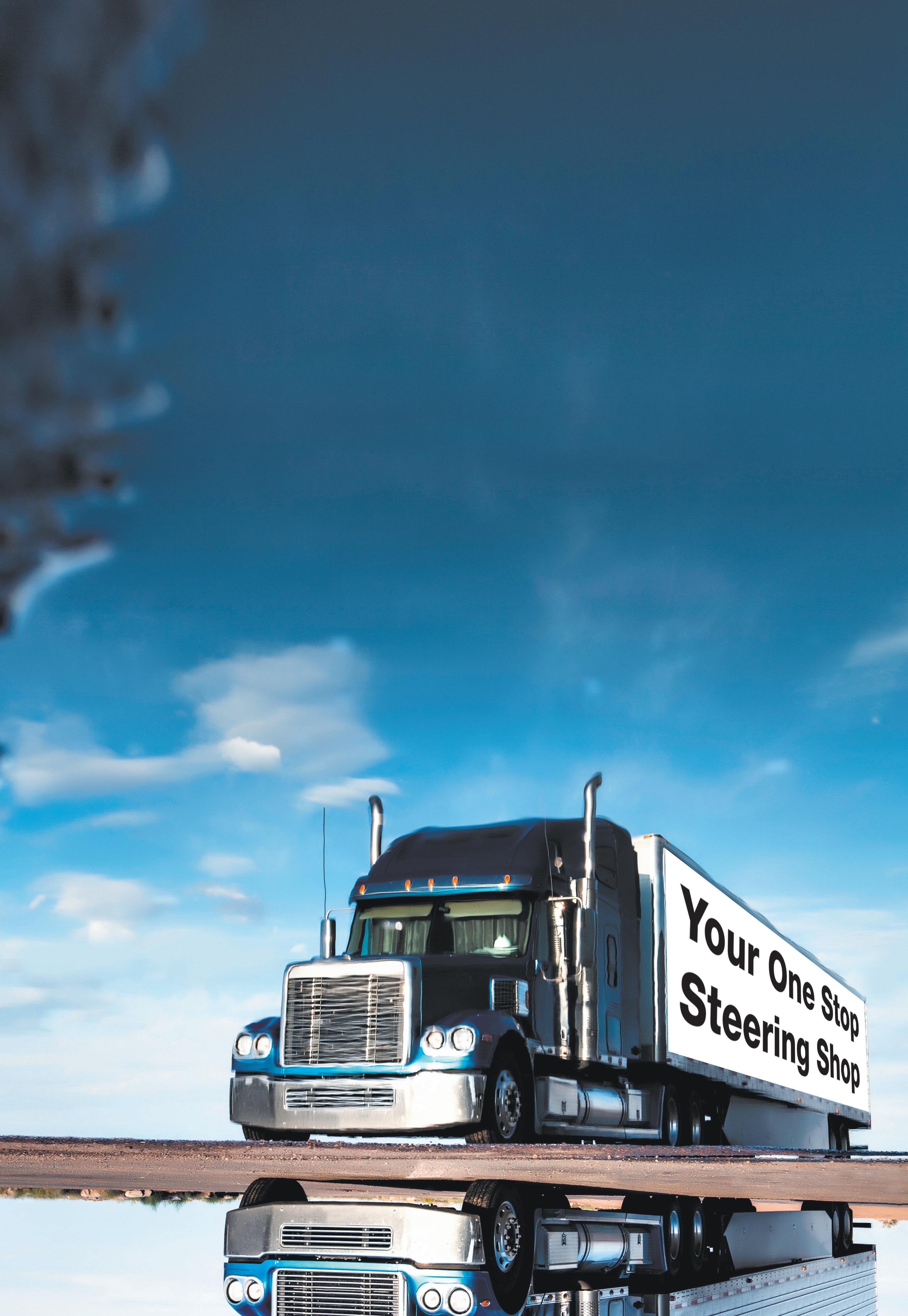
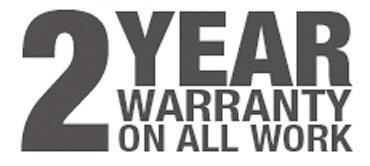



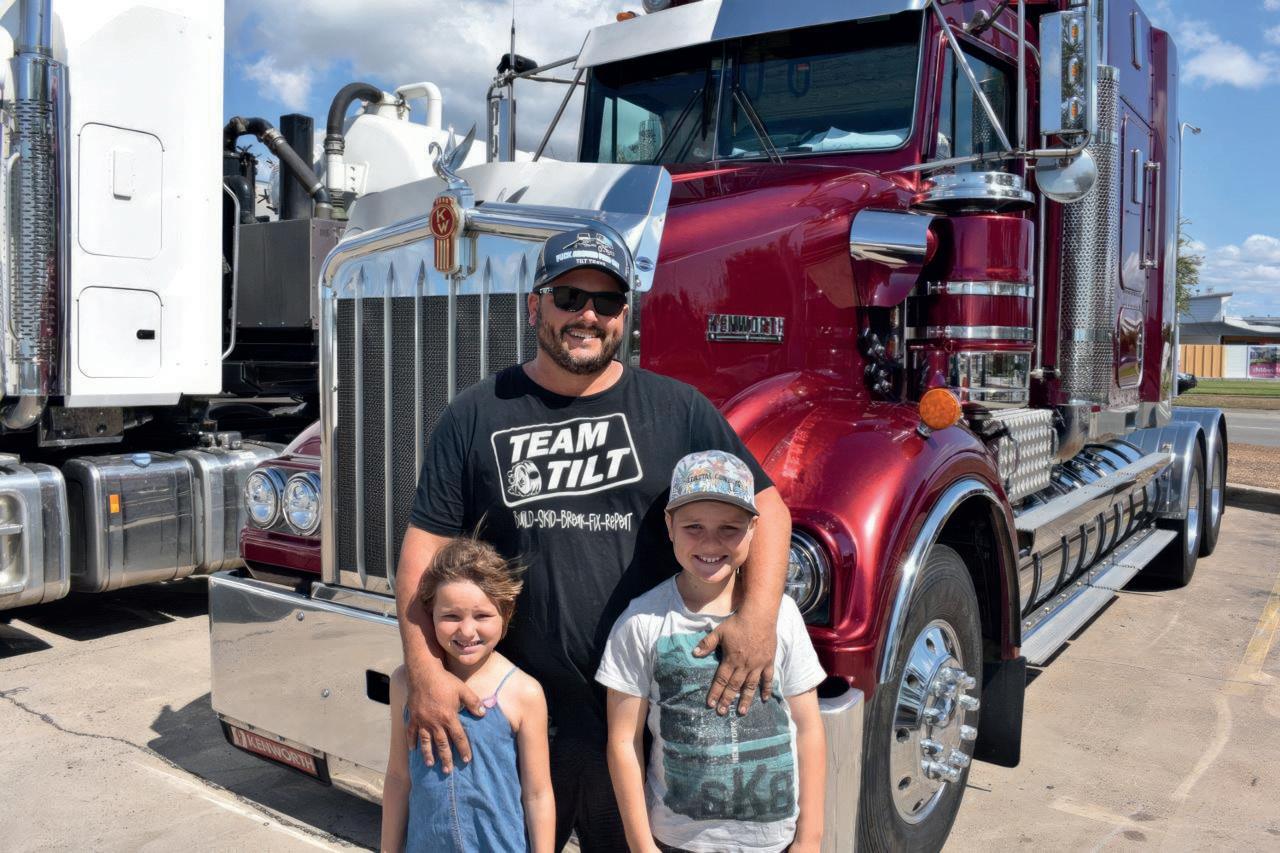
NEWCASTLE based Michael Wheeler, 38, was driving a Kenworth SAR Legend when he stopped for a chat recently, with his two kids by his side.
HE had travelled from Brisbane to Townsville and was preparing to pick up a backload of produce from Bowen for delivery to Melbourne.
Whilst Michael has his own truck as he is an owner-operator, on this particular trip he was working for BHT Lo-
gistics, which is a family run transport business. It was a wonderful trip for Michael who got to see his son Jaydon, aged 10, and daughter Lexi, seven, who live in Townsville.
They were delighted to have their pic taken together in front of the flashy truck, before heading to the shops to spend some quality time together.
Asked about his favourite roadhouses, Michael said he
enjoyed stopping at the Pimba Roadhouse in South Australia recently. “It was about a month ago and was really good,” he said, adding that more rest areas were needed for truck drivers. “Especially in Queensland.”
Whilst he believes there are many good rest areas in NSW along the Hume Highway, he often encountered the same problem with each of them. “It is hard to get a parking space,” he said.
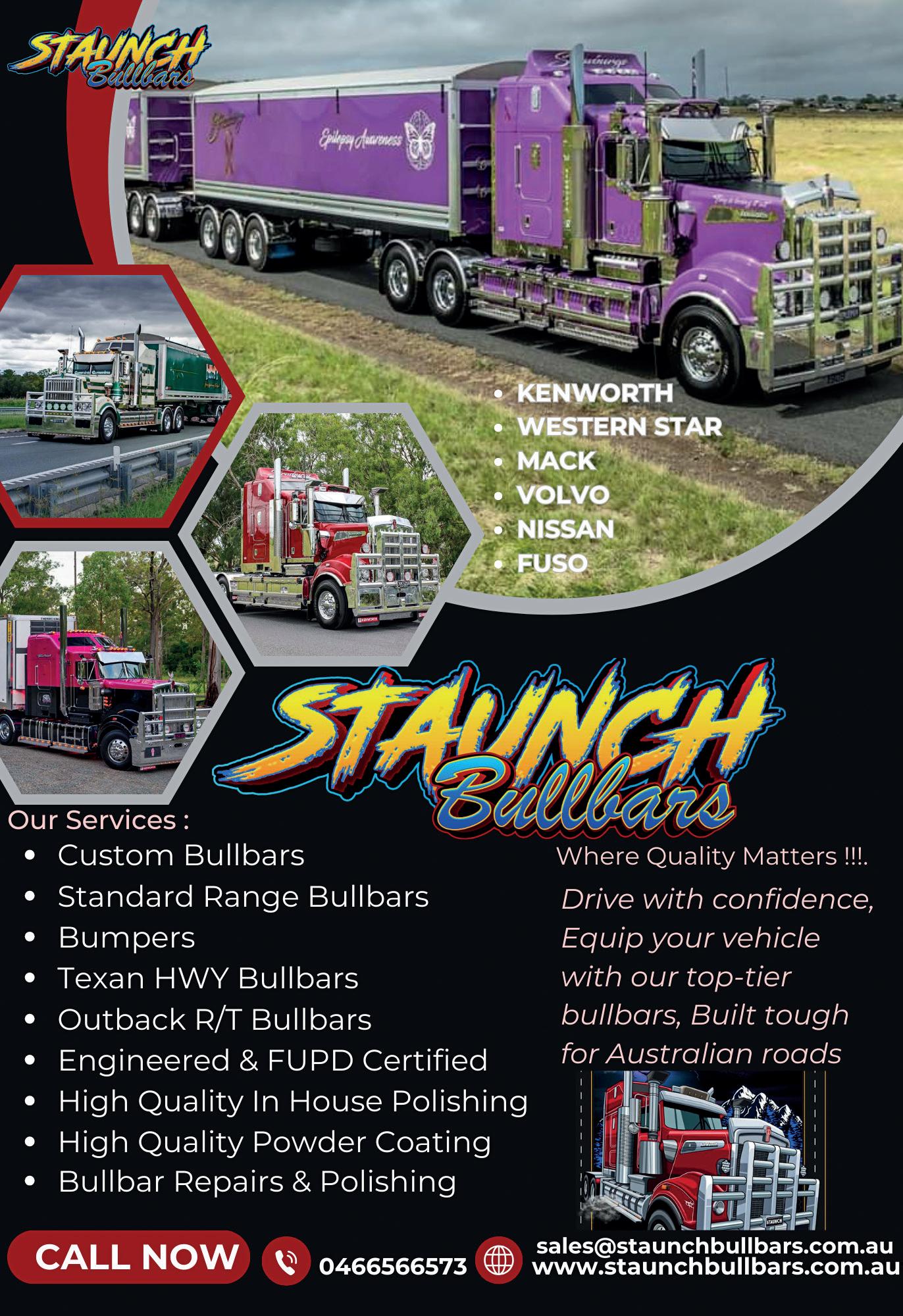
A BLUE Kenworth K100E owned by Victorian owner-driver Chris ‘Billy’ Keene has more than three million kilometres on the clock and is famous for playing a role in the popular Hollywood movie Ghost Rider.
I saw 52-year-old Billy, as he is affectionately known in the road transport industry, when he was parked up at a Townsville roadhouse.
“This is a very famous truck and had a part in the movie Ghost Rider, starring Nicolas Cage, when some of it was filmed in Melbourne in 2005,” he said.
A veteran driver, Billy is
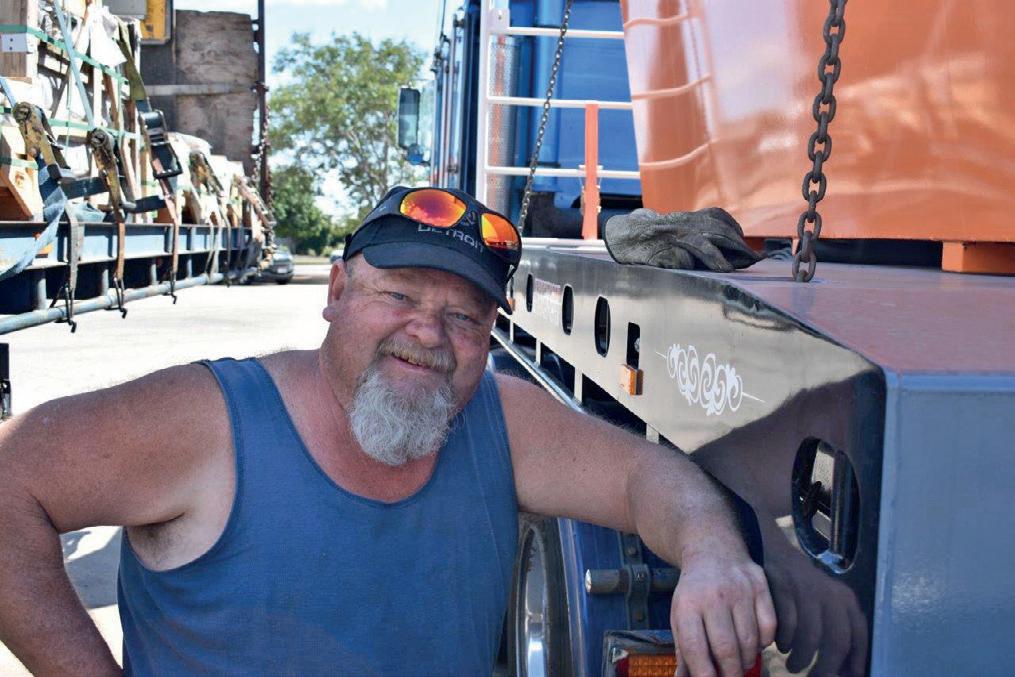
based at Melton in Victoria and has owned the Kenworth for 20 years.
While it has done more than three million kilometres, Billy said it does have a new motor.
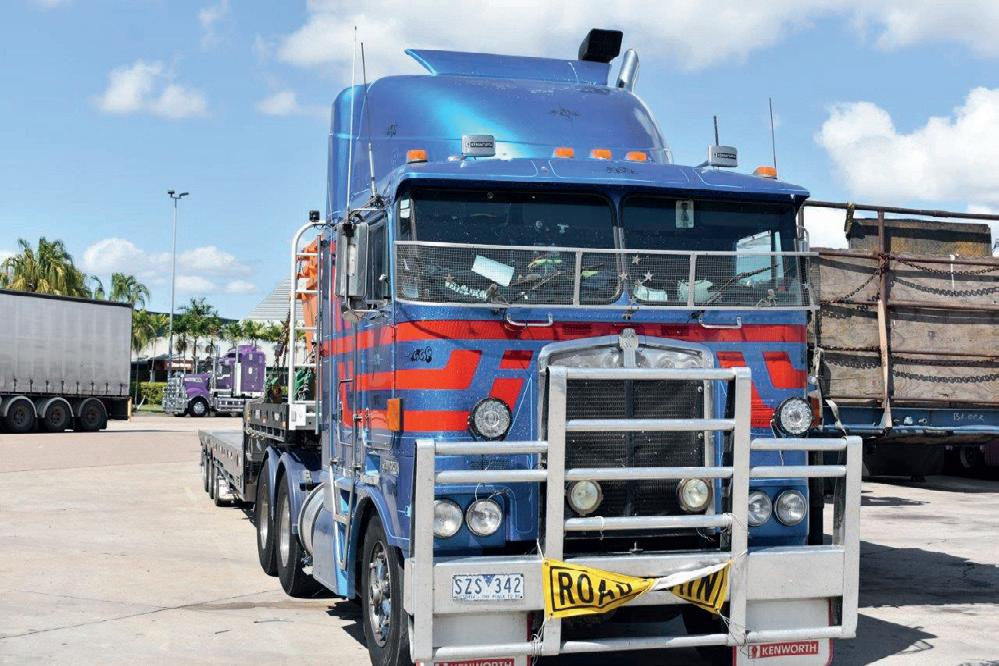
“This one has done about 100,000km,” he said. Billy had picked up tiles in Brisbane, bound for Cairns, and also dropped off an excavator to Townsville when he met up with Big Rigs. His truck had lots of dead insects in the front. “I ran into lots on the way up from Brisbane,” he said.
A supporter of the Richmond Tigers in the AFL, Billy said he was given the nickname by his much loved father who is now aged 95. “And it has stuck,” he said. Billy added that he rates the Newell Highway as bad to travel on and wants to see more rests area for truckies with toilets.

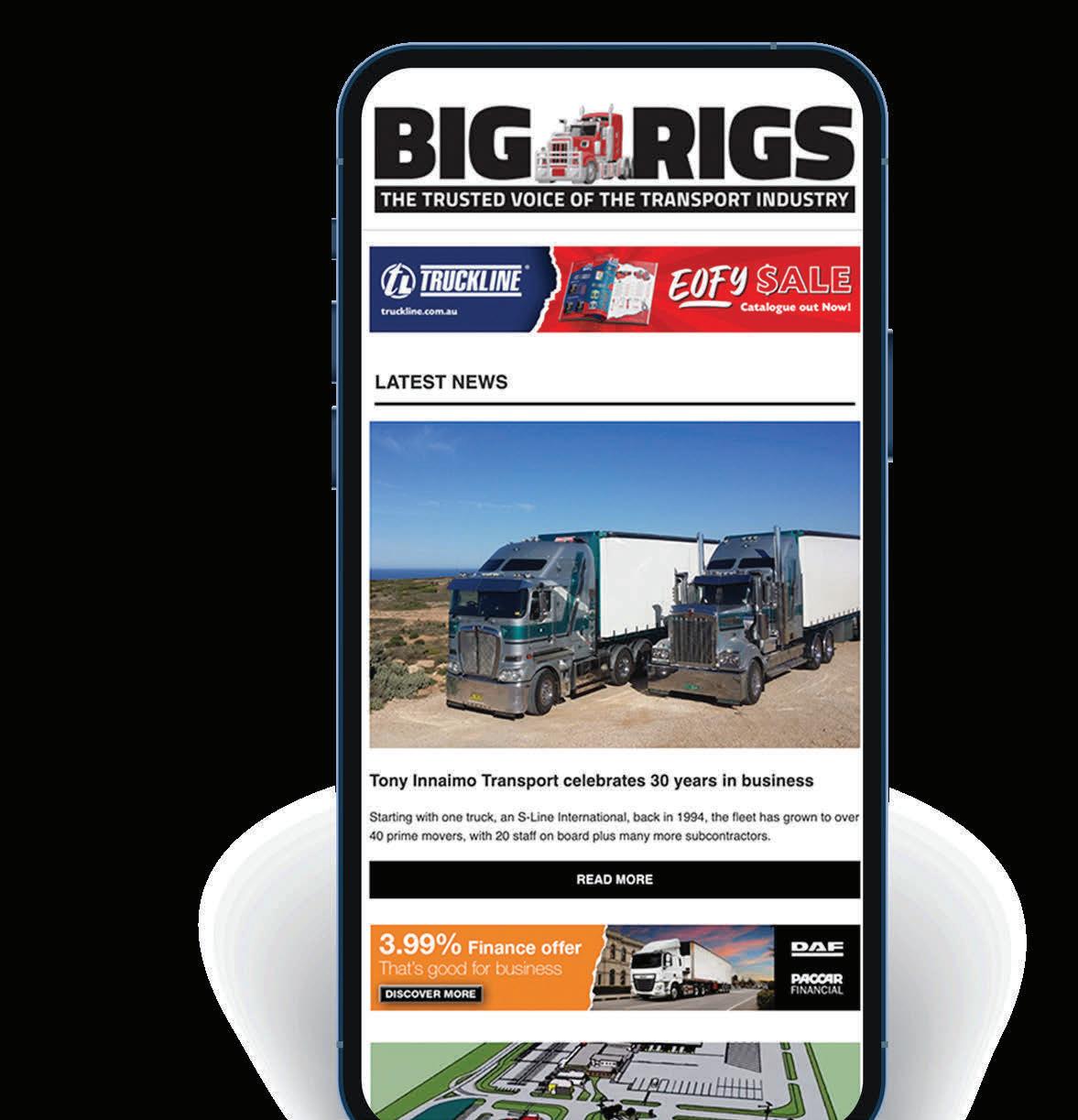
FROM Numurkah in Victoria, young driver Jason Kane had carted septic tanks from Shepparton to North Queensland in a Kenworth K200 when Big Rigs saw him recently.
Jason, 28, works for Numurkah Bulk Haulage and said he would be picking up a backload the next day.
“I will be stopping at Gladstone to take on aluminium tubes for Melbourne,” he said.
Jason added that he likes stopping at the Ampol Wyong in NSW for various reasons.
“The food is good and so are the showers, and the parking is okay. My favourite food is a chicken burger,” he said.
Jason also likes BP Roadhouses in his extensive travels.
He rates the worst road as the Gregory Development Highway between Clermont and Charters Towers, also known as the Belyando.
“I came along it on the way up and it is as rough as guts. Something needs to be done about it,” he said.
Jason’s hometown of Numurkah is located on the Goulburn Valley Highway, 37 kilometres north of Shepparton, with a population of 5000. “I like living there,” he said.
Jason added that he had been driving for five years and started out hauling grain.
“I worked my way up to running A-double road trains into the ports at Geelong, MelI am going into town here,” he said.
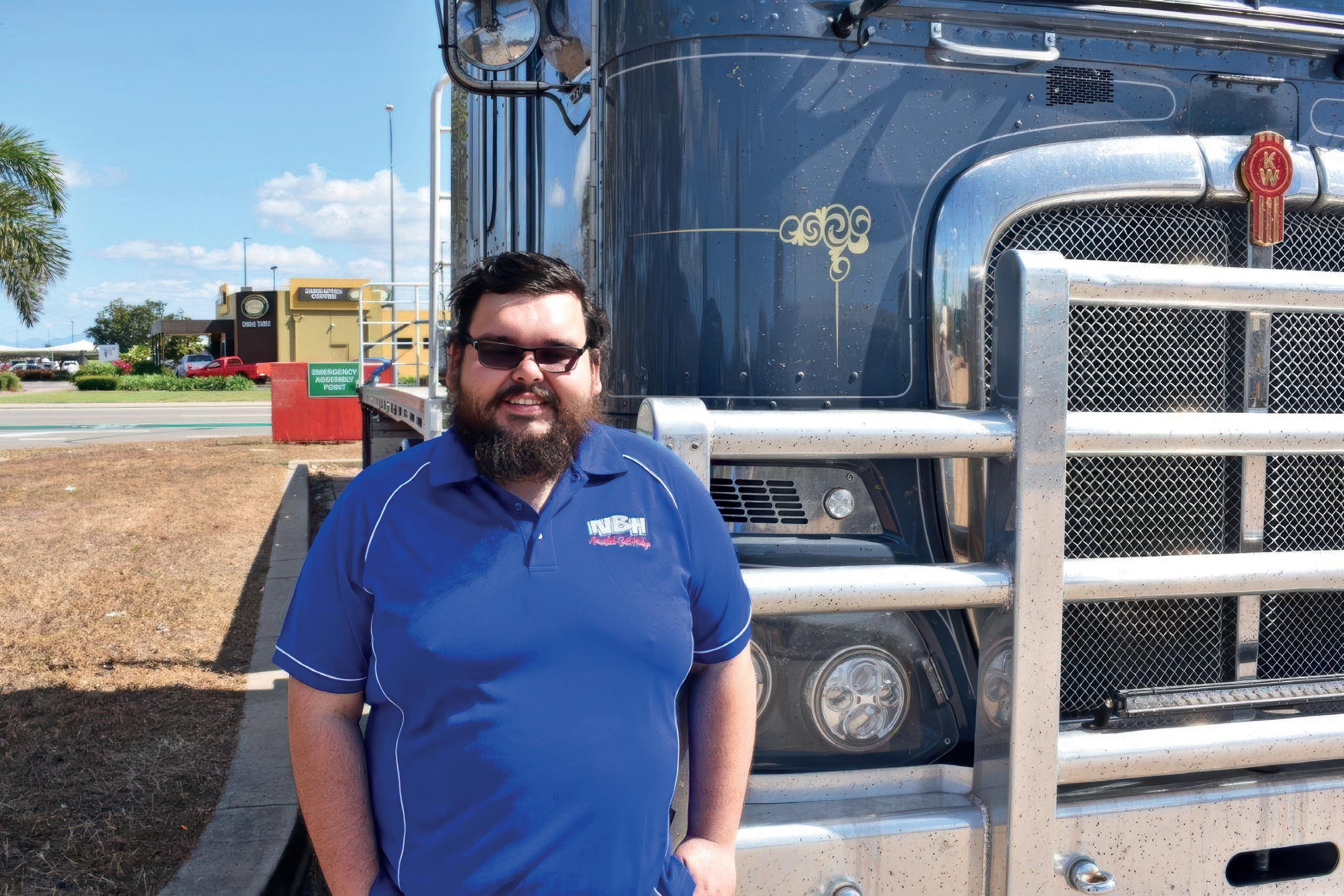
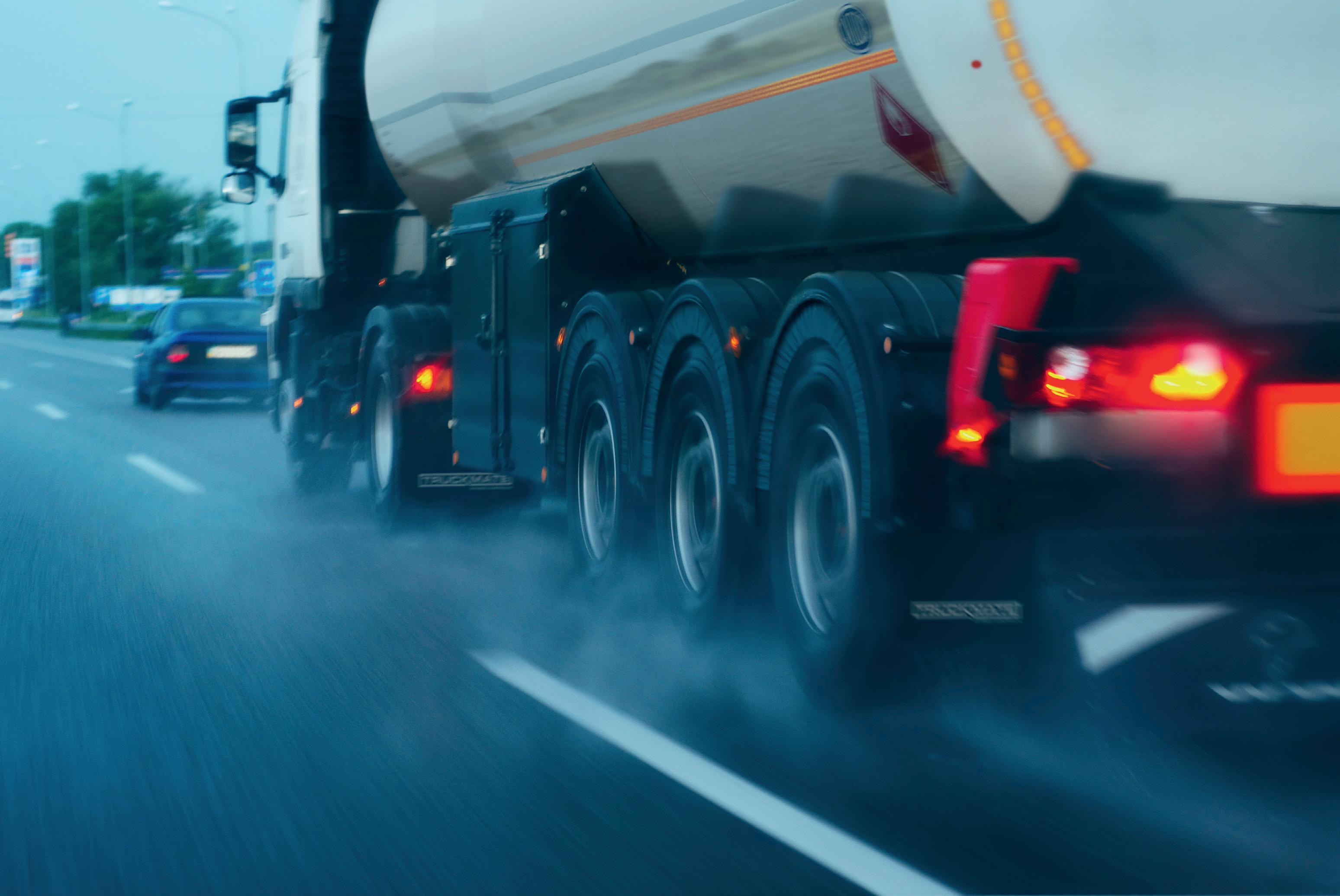
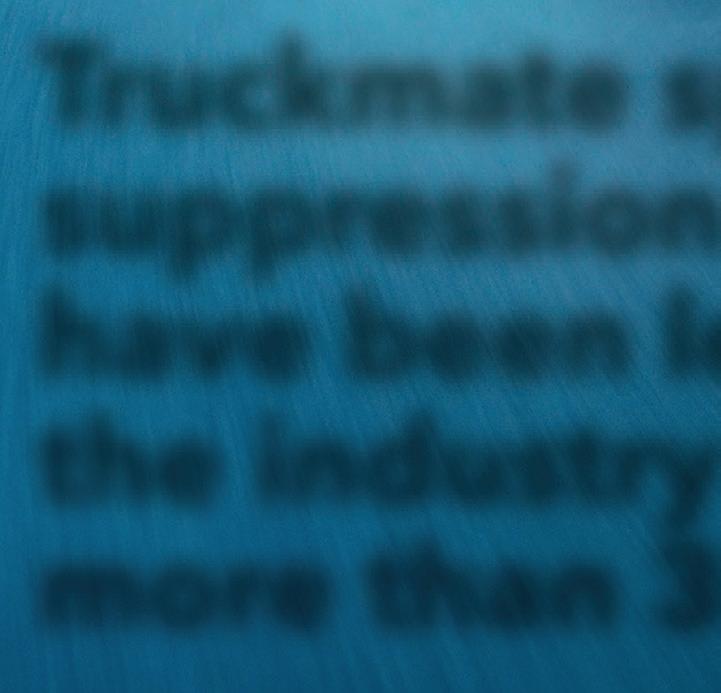

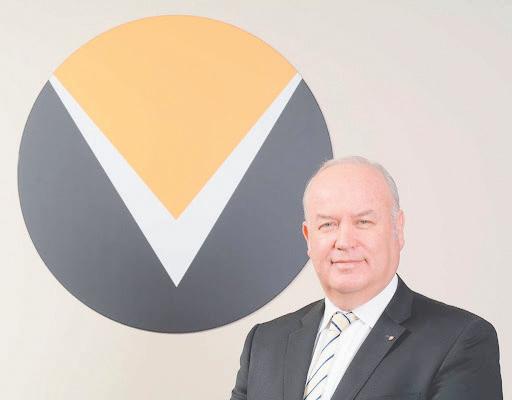
One of the most critical aspects of this legislation is its focus on closing the gaps in existing laws that have allowed for unfair practices to persist.
The transport industry, particularly in sectors like road freight and logistics, has been plagued by the exploitation of workers, especially those in vulnerable positions.
THE introduction of the Closing the Loopholes legislation, which took effect on August 26, marks a significant turning point for Australia’s transport industry.
As the CEO of the Victorian Transport Association (VTA), as well as national secretary for the Australian Road Transport Industrial Organisation which advocated for the legislation, I wholeheartedly support these new laws, and believe they will bring substantial benefits to transport operators and their workers.
For too long, our industry has grappled with challenges that stem from outdated regulations and exploitative practices.
The Closing the Loopholes legislation addresses these issues head-on, creating a fairer and more sustainable environment for all stakeholders.
Casual and contract workers, who make up a significant portion of our workforce, have often been subjected to insecure employment conditions, inadequate pay, and a lack of access to essential benefits.
The legislation introduces measures to ensure that these workers are treated fairly and with the respect they deserve. By tightening regulations around casual employment and contract work, the legislation will help prevent the exploitation of workers who have long been denied the stability and security they need. This is not just a win for the workers themselves but also for transport operators who strive to maintain ethical and sustainable business practices.
Safety has always been a paramount concern in the transport industry. However, the loopholes in current legis-
lation have sometimes led to practices that compromise the safety and wellbeing of workers. For example, some operators have taken advantage of ambiguities in the law to push drivers into working excessive hours, leading to fatigue and increased accident risks.
The new legislation addresses these concerns by implementing stricter regulations on working hours and conditions. This will not only protect workers from being overworked but also ensure that our roads are safer for everyone.
A well-rested driver is a safer driver, and by promoting better working conditions, we can reduce the number of accidents and incidents on our roads.
Moreover, the legislation will require transport operators to take greater responsibility for the wellbeing of their workers. This includes providing appropriate training, access to mental health resources, and ensuring that workers have the support they need to perform their jobs safely and effectively. In an industry where stress and long hours are common, these provisions are crucial for maintaining a healthy and produc-
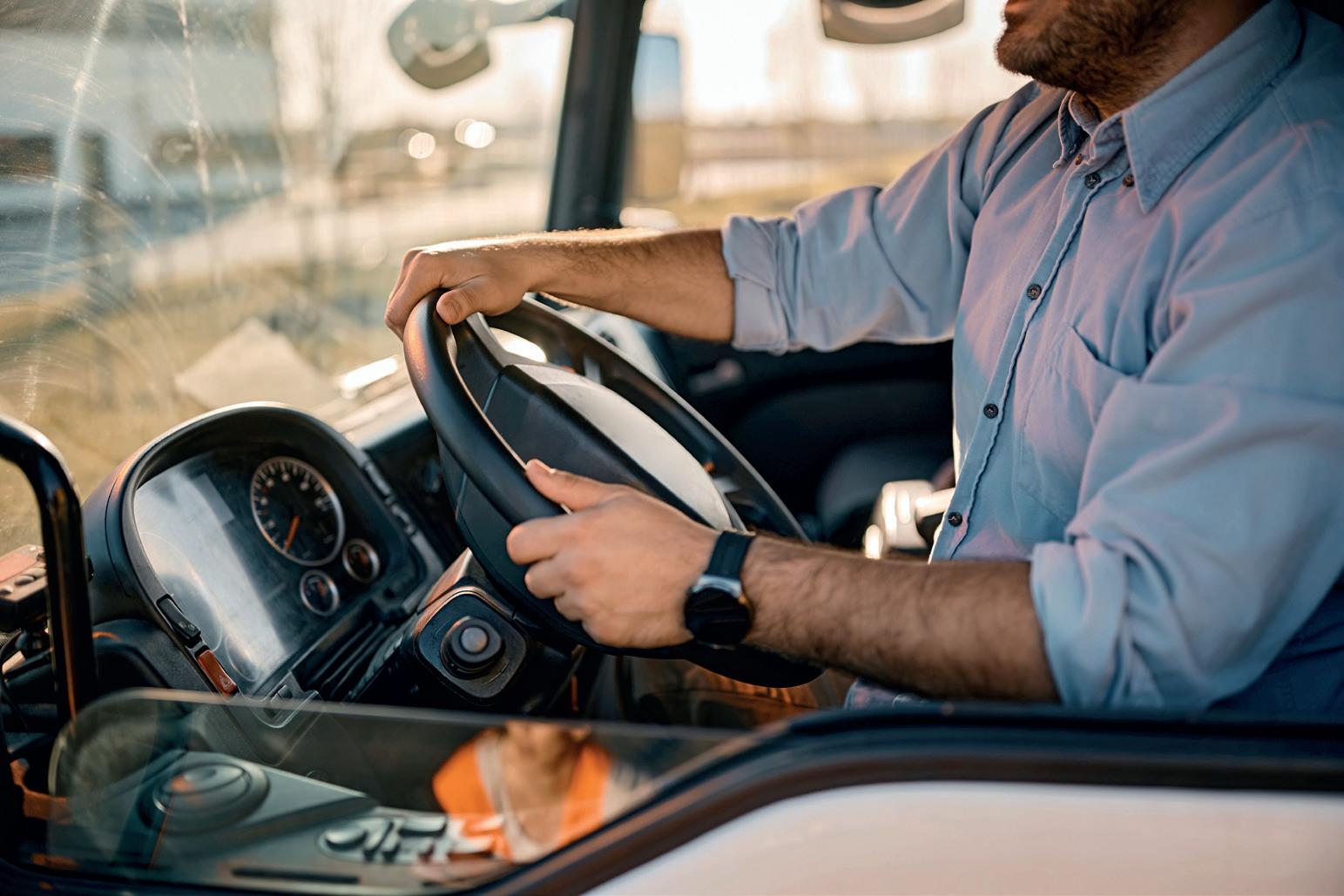
erators who already adhere to best practices, the Closing the Loopholes legislation is a welcome development.
By leveling the playing field, the legislation will help ensure that businesses that prioritise fair treatment and safety are not undercut by competitors who exploit loopholes to cut costs. This is particularly important in an industry where margins are often tight, and the pressure to reduce costs can lead to unethical practices. With the new regulations
can compete on a fairer basis, knowing that their commitment to doing the right thing is recognised and supported by the law.
This will foster a more sustainable industry, where businesses can thrive without compromising on the principles that matter most.
The Closing the Loopholes legislation represents a significant step forward for Australia’s transport industry.
By addressing the gaps in current laws, the legislation
more sustainable environment for both operators and workers.
As we move forward, it is essential that we continue to support and advocate for policies that promote fairness, safety, and wellbeing in our industry.
The VTA is committed to working with all stakeholders to ensure that the benefits of this legislation are realised and that the transport industry can continue to thrive in a fair and equitable manner.
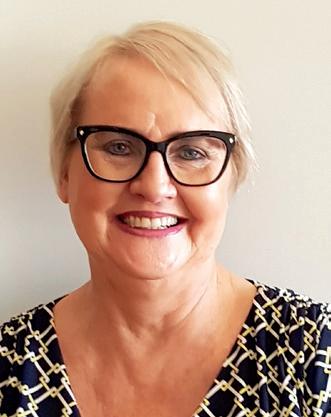
AT the Transport Women Australia Limited (TWAL) Living the Dream Conference held from May 30 to June 1 in Melbourne, TWAL celebrated it best conference ever.
We kicked off with a pre-conference lunch and tour of PACCAR Bayswater and concurrently ran a Healthy Heads in Trucks and Sheds session at the Hyatt Place. These were followed by the Volvo welcome drinks where Senator Bridget McKenzie, Leader of the Nationals in the Senate, and Senator for Victoria, opened the conference.
Day One started with the opening keynote, Cindy Parker, director of operations for Americold Arkansas.
Cindy was followed by speakers from our Foundation Business Partners, Volvo and NTI and the TWAL partner organisations, NRWC, AGEC and HHTS.
We had a standout panel of Trish Pickering Memorial Award winners Phyllis Jones, Hazel Whitmore, Merry Manton, and Sharon Middleton. They shared their amazing stories and brought laughter, tears, and inspiration to all.
The afternoon speakers were rounded out by RT Health, Viva Energy Australia, the NHVR and our joint venture partners Wodonga TAFE and Volvo.
Our first auction dinner was sponsored by Viva Energy Australia and conducted by veteran auctioneer, Denis Robertson, assisted by our
MC, Natalie Loughborough.
The audience was cheered on to greater heights by Ellen Voie telling the story of the Green Bay Packers in two parts while we auctioned the Jordan Love jerseys and Cindy Parker leading everyone in the Arkansas Razorbacks cheer as we sold the Max Fletcher #31 jersey. It was an inspiring sight amid lots of laughter.
Day Two started with our Driving the Difference Scholarship sponsor Daimler Truck Australia Pacific represented by Lauren Tormey interviewing two former recipients –Joana Feiteira and Ainsleigh Thomas.
This was followed by NHVR’s Sal Petroccitto and cyber security expert, Hannah Bloomfield before a career panel about attracting people wanting to change careers led by former director, True Sawrey who was joined by the president of human resources,

Linfox – Lauren Pemberton.
We had a TWAL update session which included myself, Coralie Chapman, and Samantha Palmer, TWAL co-founder and general manager, customer relations at Ron Finemore Transport and Raman Badekar an international consultant and TWAL mentor, frequent volunteer, and ardent TWAL supporter.
The penultimate session was a trade panel from PACCAR and Cummins about the amazing women in trades and how we attract and keep them.
Our closing keynote was the founder and former president and CEO of Women in Trucking USA, Ellen Voie on her amazing dream journey from the conception of her dream for the organisation and then building it to the incredible organisation it is today and the hard work and fun she has had along the way.
The conference was rounded
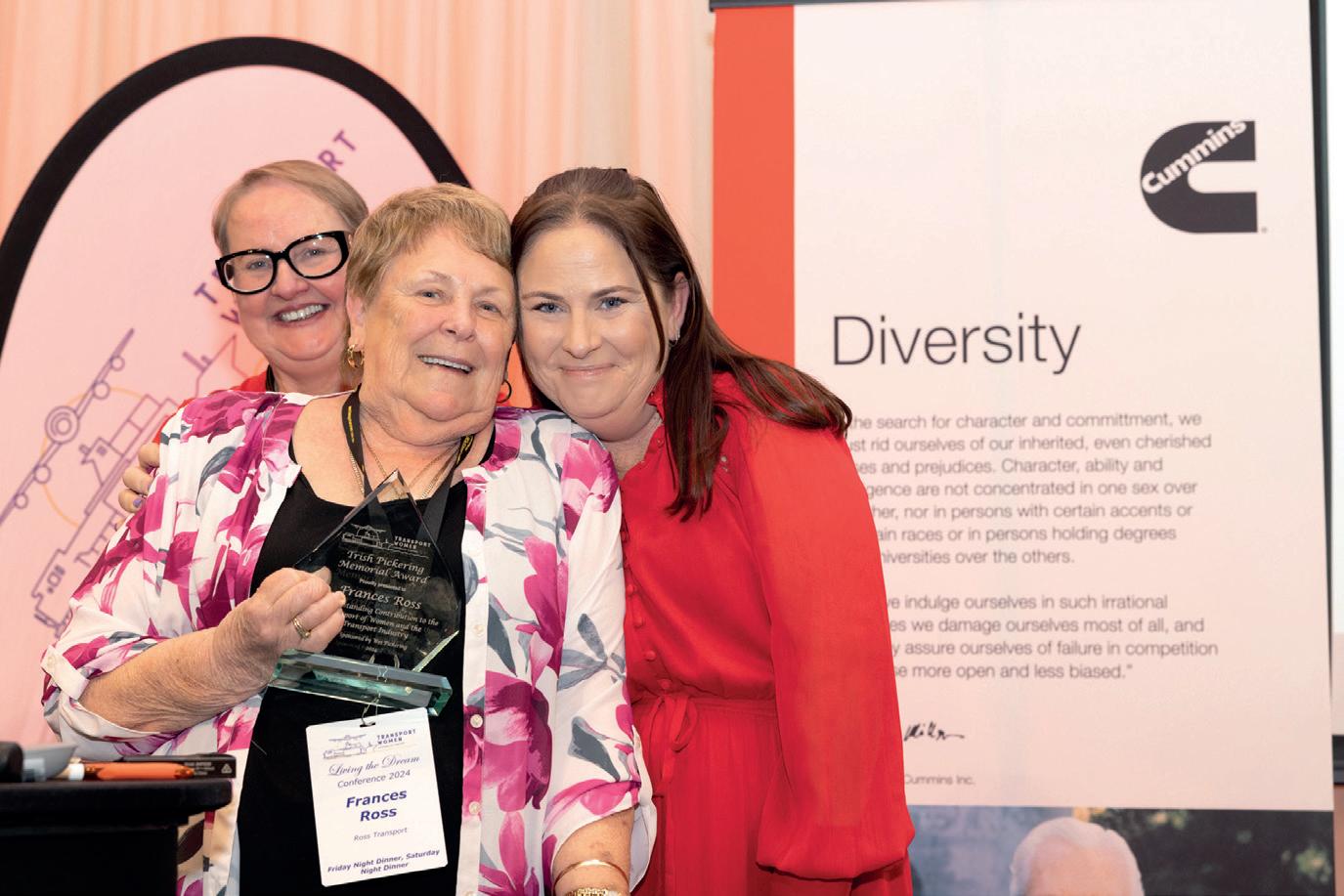
dinner on the Saturday night. We started by announcing the 2024 Photo Winner –Corrina Riley.
Coralie Chapman and Lora Miller, on highway product manager Asia Pacific at Cummins South Pacific presented the inaugural Young Gunnette Award to Ainsleigh Thomas, NSW/ACT linehaul
leigh is an outstanding young woman and a deserving recipient of this award. The final award was the 2024 Trish Pickering Memorial Award presented to Frances Ross. She has devoted her life to the trucking industry, her family, Ross Transport, and her Illawarra community.
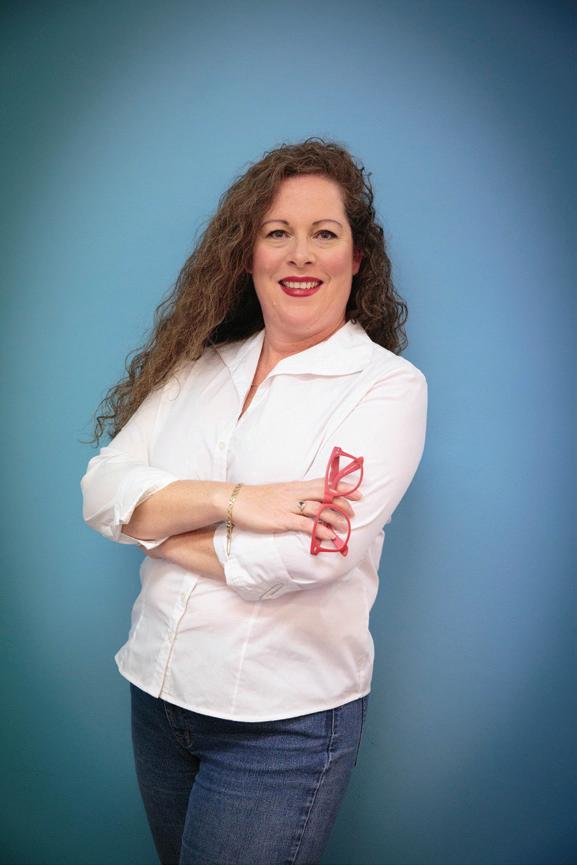
the 100-plus km radius, and how to work out where that invisible line is. But what happens when you’re the 100-plus km radius? Does all that fatigue stuff just get chucked out the window?
I know you probably wish that was the case – however, the rules are still pretty much the same. Completing work inside the 100km radius is commonly referred to as “local work”, but remember, if you’re operating under AFM or BFM, you need to keep your work diary regardless of the radius. This article is more likely to be of interest to those operating under standard hours.
As always, it’s important to remember that understanding and interpreting legislation in the Heavy Vehicle National Law (HVNL) isn’t easy. This article is not intended as legal advice – please seek legal advice if needed.
For drivers of fatigue-regulated heavy vehicles (weighing over 12 tonne, combinations over 12 tonne, or fatigue-regulated buses designed for over 12 adults including the driver), the HVNL fatigue provisions apply.
Despite common misconceptions, when doing “local work” a driver still has obligations to keep records of their work and rest, and this information is required to be kept by the record-keeper. Clause 317 of the HVNL defines who the record-keeper is:
317 Who is a driver’s record keeper
The following person is the record keeper for the driver of a fatigue-regulated heavy vehicle—
(a) if the driver is operating under a BFM accreditation or AFM accreditation of an operator of the vehicle or a work and rest hours exemption (permit) granted in combination with an operator’s BFM
accreditation or AFM accreditation—the operator; otherwise—
(i) for an employed driver of a fatigue-regulated heavy vehicle—the driver’s employer; or (ii) for a self-employed driver of a fatigue-regulated heavy vehicle—the driver.
The HVNL covers this record-keeping requirement, firstly in Clause 319, which relates to what information the record-keeper must keep – which is almost identical to the information you will see on a National Driver Work Diary page. In Clause 319A, the driver is required to make those records in some way for the record-keeper. The information the record-keeper is required to keep is as follows:
1. Driver’s name and contact details;
2. Driver’s current driver licence number and jurisdiction where it was issued;
3. Dates when driver drove the fatigue-regulated heavy vehicle on a road;
4. Registration number for the truck being driven (rigid or prime mover rego, not trailers);
5. Total work and rest times on each day the driver drove the truck;
6. Total work and rest times for each week the driver drove the truck;
7. Driver’s rosters and trip schedules, including details of driver changeovers;
8. Driver’s base;
9. If the driver’s base changes, the date it changed; and
10. Copies of payment records for the driver, including time sheet records if the driver is paid according to time at work.
Items 7 through to 10 are records that the driver isn’t required to keep, unless you’re an owner-driver. You can see here that the rest of the information is pretty much the same as what you need to keep in your work diary if you’re working outside the 100km radius.
As a driver, what do you have to do? The HVNL says you must, unless you have a
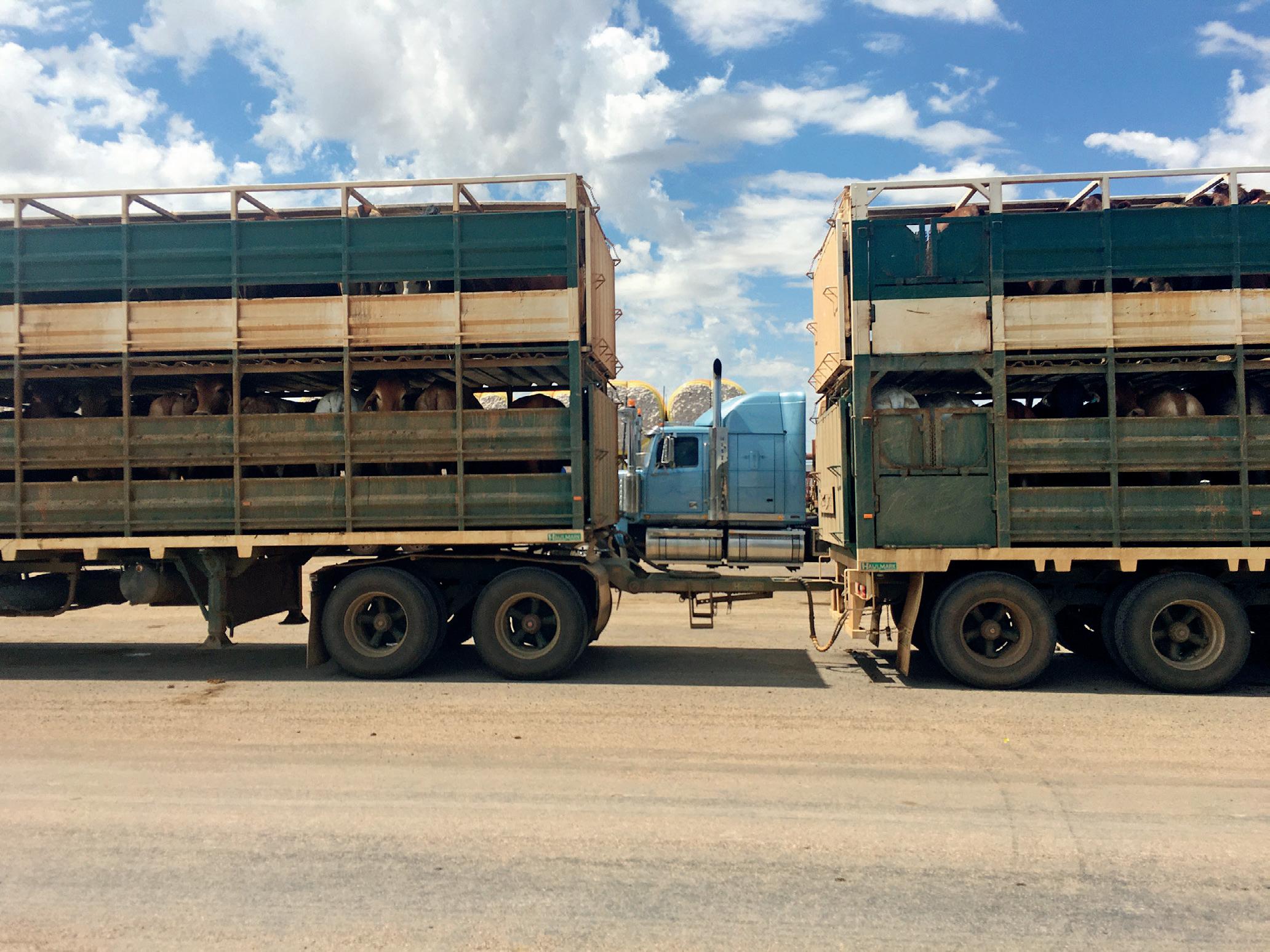
reasonable excuse:
• within 24 hours after the driver stops working, record the information from item 2 up t o and including item 6 on the list above; and
• within 21 days of that day, give the information to the record-keeper.
A professional transport operator will have a daily run sheet for you to complete, capturing the information you need to provide. If they don’t, you might want to ask why, because as a driver, you could be fined for not providing that information. If your employer doesn’t have a daily run sheet, how can you protect yourself? There are a couple of ways to manage your record keeping for “local work”.
1. Keep a written record. You can find a free weekly template that can help you manage this on knowtheroad.com.au. To be sure your employer receives it (and you have evidence you’ve given it to them) you can take a photo and text it to them, or send a copy by email. Always keep a copy for yourself so you’re covered.
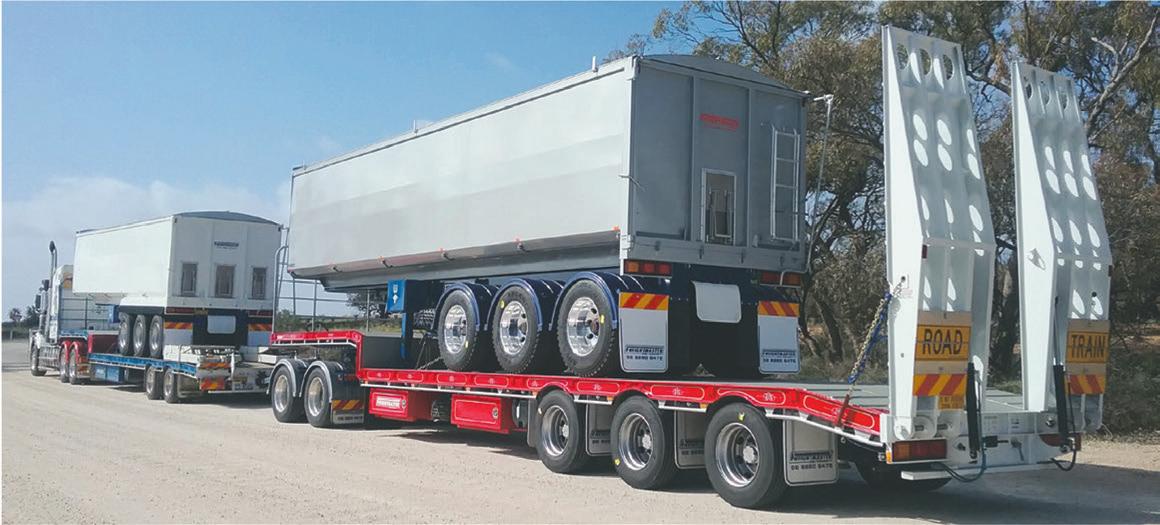
2. Use an electronic work diary (EWD). This tool keeps those records for you automatically, and can allow the record-keeper to access the records when needed. If your employer uses EWDs, I encourage you to use it to record “local work” and rest if operating under standard hours.
3. Use your National Driver Work Diary. This can be a nuisance though, remembering that unless you’re operating under BFM or AFM, you don’t need to use this tool for “local work”.

I hope this article has helped you understand some of your obligations when working inside the 100-plus km radius.
If you’re not sure, reach out to your industry association or contact Know The Road for more information.
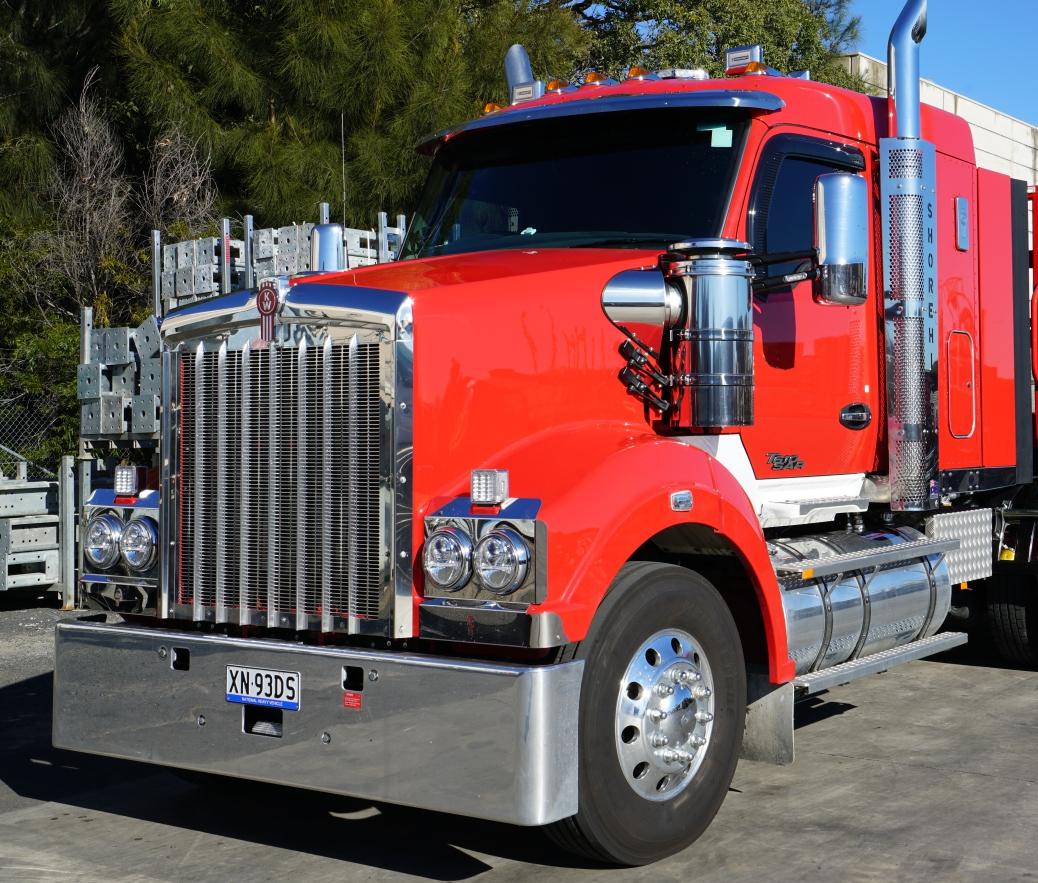
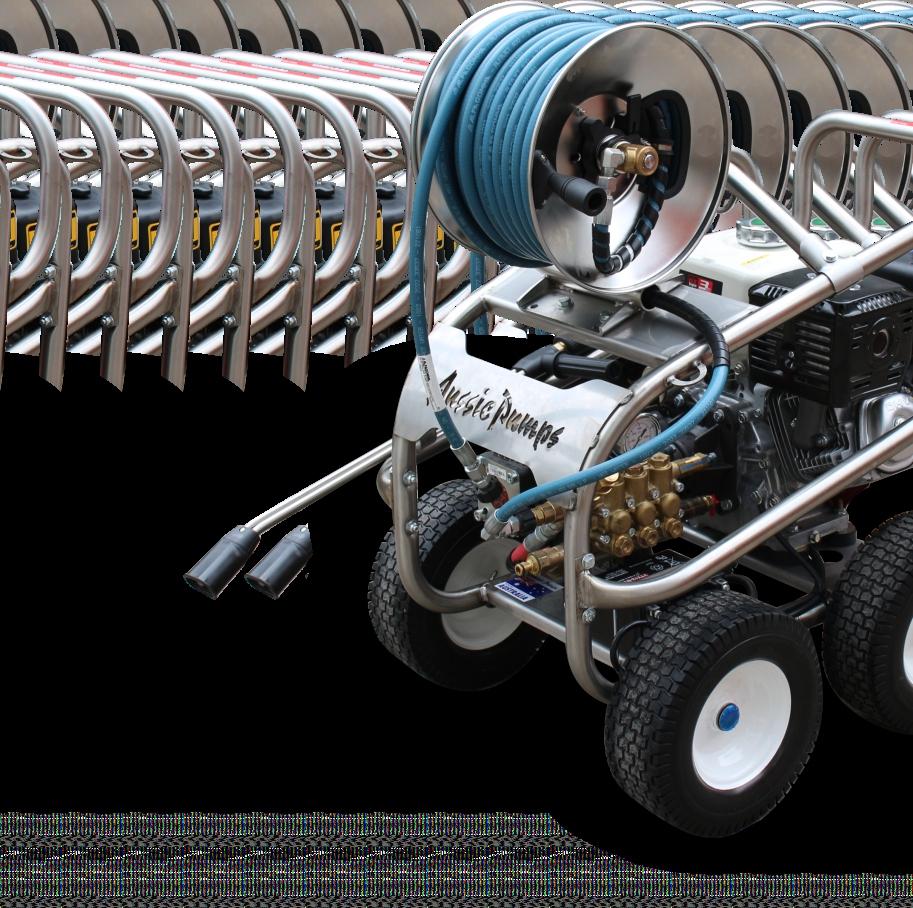
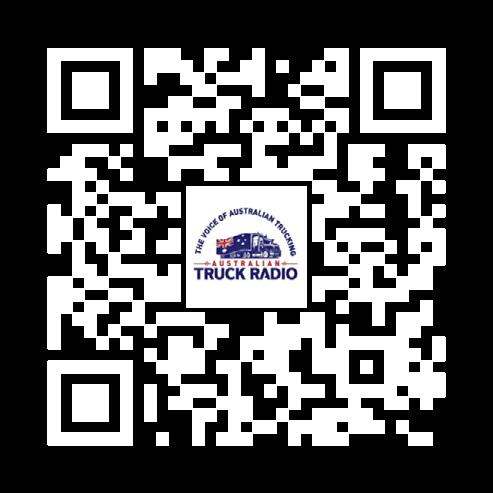


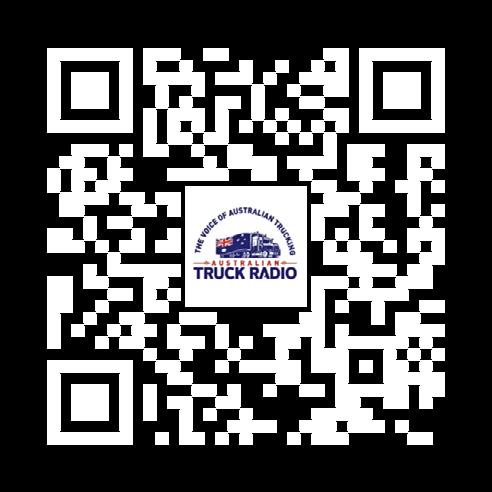









MERITOR Q PLUS DRUM BRAKES
• Genuine OEM performance, quality and durability
• Factory fitted by major truck and trailer brands
• Choose Meritor Q Plus for genuine peace of mind
